Past Events
Past Events
CSC GitHub Page
Our CSC GitHub page contains guides and documentation for all of our workshops.
2025-2026 Academic Year
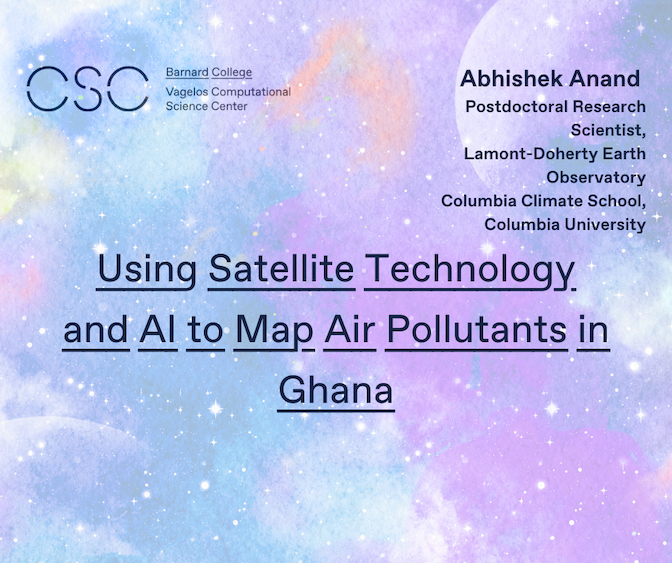
September 16, 2025 | 12:00pm - 2:00pm
516 Milstein (Register for link)
Air pollution from fine particulate matter is a leading cause of premature death, but many parts of the world lack the local data to accurately measure this particulate pollution. This workshop explores how satellite technology and artificial intelligence (AI) can fill this gap.
Workshop participants will learn how to analyze satellite and ground sensor data collected by NASA and the European Space Agency and construct spatial maps of air pollutants. No experience with Python or geospatial data analysis is necessary — all majors and experience levels are welcome!
This workshop is taught by Abhishek Anand (Postdoctoral Research Scientist, Lamont-Doherty Earth Observatory, Columbia Climate School, Columbia University).
This workshop is planned to take place in-person only (Milstein 516).
We look forward to seeing you there!
For more information about the Barnard CSC, go to https://www.csc.barnard.edu or follow us on Instagram and X (@barnard_csc).
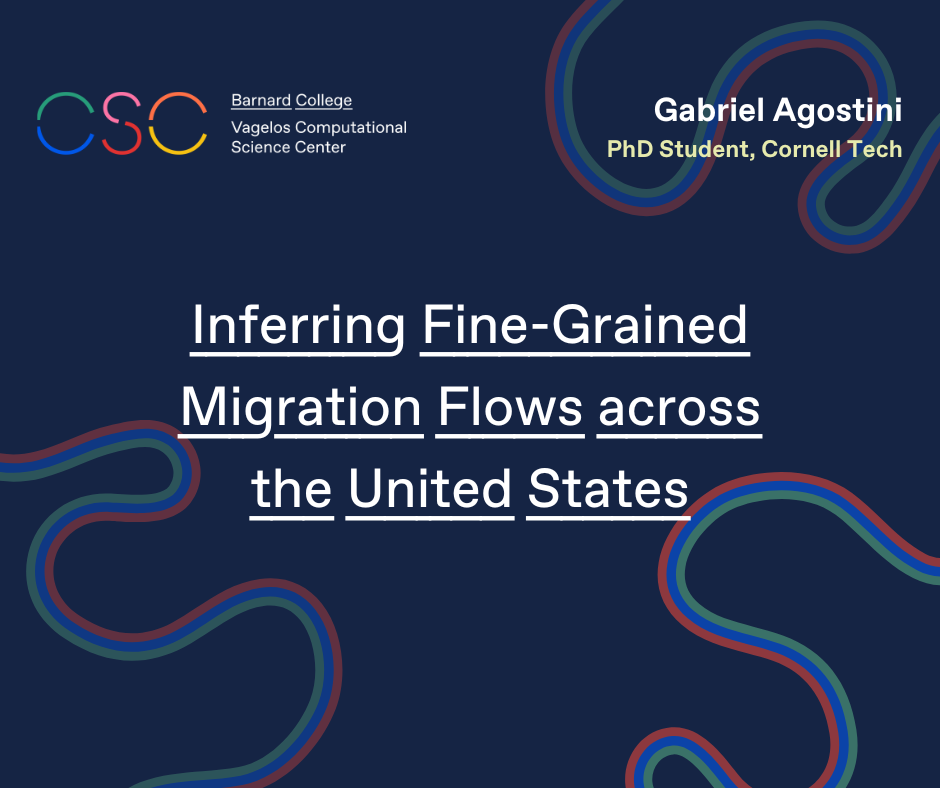
September 22, 2025 | 5:00pm - 7:00pm
516 Milstein (Register for link)
Migration shapes economic, environmental, and health outcomes, but most relevant datasets are either too coarse or demographically biased for robust analyses of migration patterns. This workshop will introduce attendees to advanced statistical techniques like iterative proportional fitting, which can help reconcile coarse census data with higher-resolution (but biased) proprietary data.
The workshop explores migration flows using these different datasets, in particular focusing on migration patterns for areas impacted by wildfires. Participants will learn more about statistical analysis and geospatial data visualization. No experience with Python or geospatial data analysis is necessary — all majors and experience levels are welcome!
This workshop is taught by Gabriel Agostini (PhD student in Information Science at Cornell Tech).
This workshop is planned to take place in-person only (Milstein 516).
We look forward to seeing you there!
For more information about the Barnard CSC, go to https://www.csc.barnard.edu or follow us on Instagram and X (@barnard_csc).
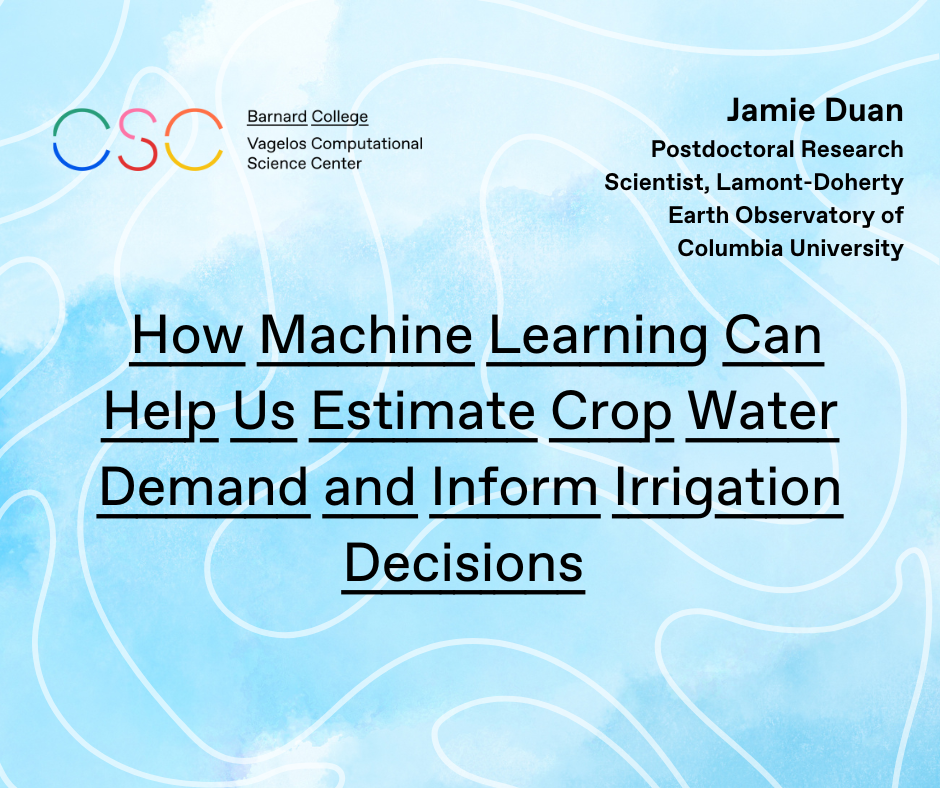
October 1, 2025 | 5:30pm - 7:30pm
516 Milstein (Register for link)
Precise irrigation is essential for sustainable agriculture, especially in arid and semi-arid regions. Determining when and how much water to apply is key to improving water use efficiency and supporting crop productivity. In this workshop, we will explore how various factors, including crop type, climate, and soil conditions, affect irrigation decisions, and how environmental monitoring tools can help guide these decisions.
Participants will be introduced to different types of datasets commonly used in irrigation management, including plant sensor data, weather observations, and remote sensing imagery. We will discuss how machine learning can be used to integrate these diverse data sources and estimate crop water demand. The session will conclude with a hands-on activity to build a simple machine learning model for irrigation support.
This workshop is taught by Jamie Duan (Postdoctoral Research Scientist at the Lamont-Doherty Earth Observatory of Columbia University).
This workshop is planned to take place in-person only (Milstein 516).
We look forward to seeing you there!
For more information about the Barnard CSC, go to https://www.csc.barnard.edu or follow us on Instagram and X (@barnard_csc).
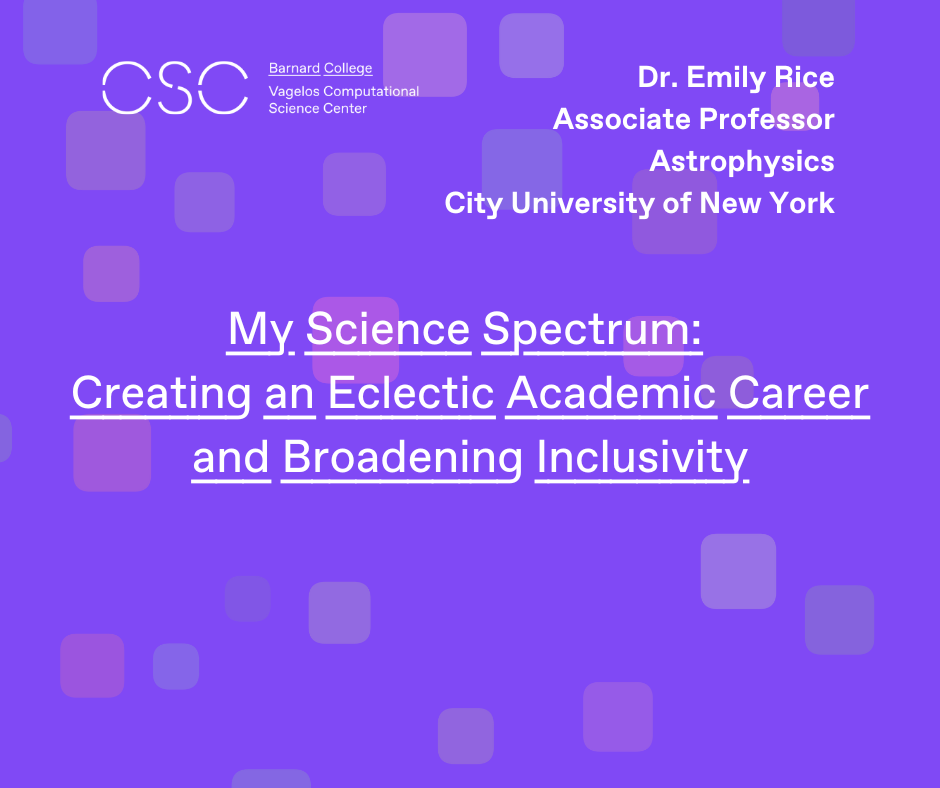
October 4, 2025 | 10:15am - 11:30am
516 Milstein
The Barnard CSC is participating remotely in the universal NASA Space Apps Challenge, and our NASA-inspired hackathon takes place this weekend! The talks and workshops are open to all. See the below description for our first public event.
Dr. Emily Rice, Associate Professor of Astrophysics at CUNY, shares her path to science and academia through a variety of projects she has been involved in along the way to becoming tenured faculty at the City University of New York, starting with astrophysics research on brown dwarfs to planetarium shows, parody music videos, media appearances, an concept-oriented lab manual, Astronomy on Tap public outreach events, and STARtorialist science fashion blog and shop. The implicit mission that connects these eclectic projects is to expand support for, participation in, and even the definition of science.
This workshop is planned to take place in-person only (Milstein 516).
We look forward to seeing you there!
For more information about the Barnard CSC, go to https://www.csc.barnard.edu or follow us on Instagram and X (@barnard_csc).
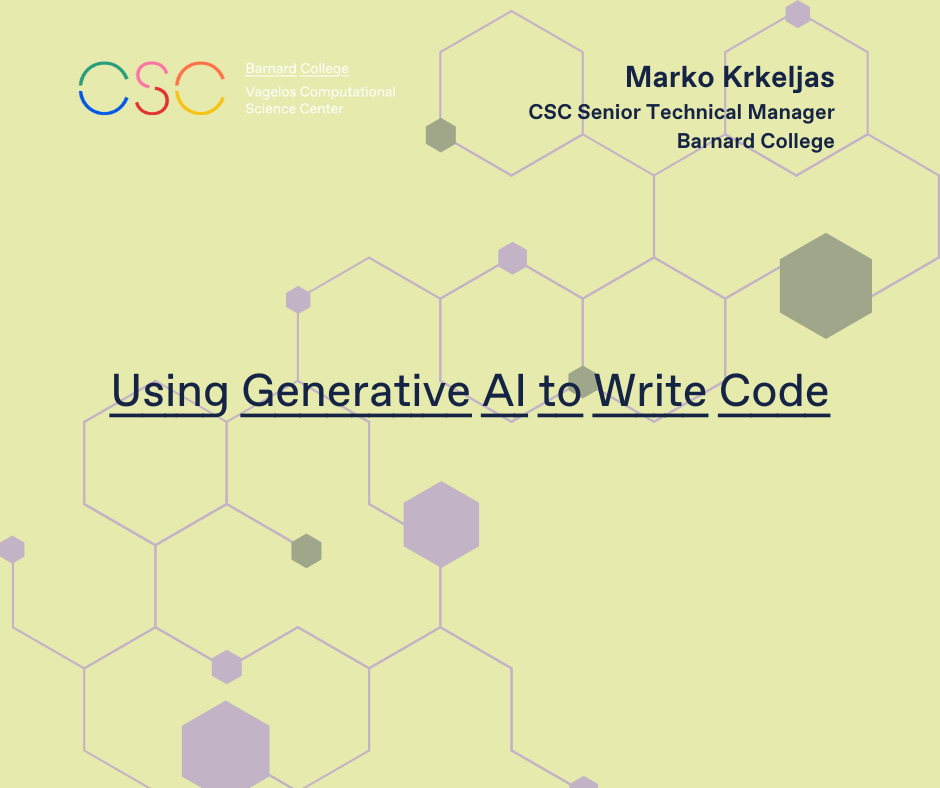
October 4, 2025 | 3:30pm - 5:00pm
516 Milstein
The Barnard CSC is participating remotely in the universal NASA Space Apps Challenge, and our NASA-inspired hackathon takes place this weekend! The talks and workshops are open to all. See the below description for our second workshop.
In this workshop, CSC Technical Manager & Software Developer Marko Krkeljas shows participants how to use Generative AI tools to produce code and interpret datasets, including how to build a quick user interface or to perform data analysis to create a visualization or infographic. This workshop is open to everyone, no coding background required.
This workshop is planned to take place in-person only (Milstein 516)
We look forward to seeing you there!
For more information about the Barnard CSC, go to https://www.csc.barnard.edu or follow us on Instagram and X (@barnard_csc).

October 5, 2025 | 12:15pm - 1:45pm
516 Milstein
The Barnard CSC is participating remotely in the universal NASA Space Apps Challenge, and our NASA-inspired hackathon takes place this weekend! The talks and workshops are open to all. See the below description for our third and final event.
Citizen Science: A Symphony of Human Power is a data science docuseries that delves into the extraordinary world of data and AI. In this series, the creators will show participants how curiosity, intellect, and the tools of the digital age can equip them to tackle real-world challenges. The second episode of the series will be screened, which delves into the world of recycling in New York City. How does NYC stack up against other major cities when it comes to recycling? Just how crucial is recycling for our bustling metropolis? And why do some neighborhoods seem to be recycling champs while others lag? To help answer these questions, series director Azadeh Keivani is joined by filmmaker and cinematographer Setare Gholipour. After the screening, the director and the director of photography will answer questions and guide talk about how to translate data into engaging stories.
This workshop is planned to take place in-person only (Milstein 516)
We look forward to seeing you there!
For more information about the Barnard CSC, go to https://www.csc.barnard.edu or follow us on Instagram and X (@barnard_csc).
To kick off the new academic year, CSC hosted a NASA Space Apps Challenge Hackathon, which took place on Oct 4-5, 2025. We had three amazing workshops leading up to the event.
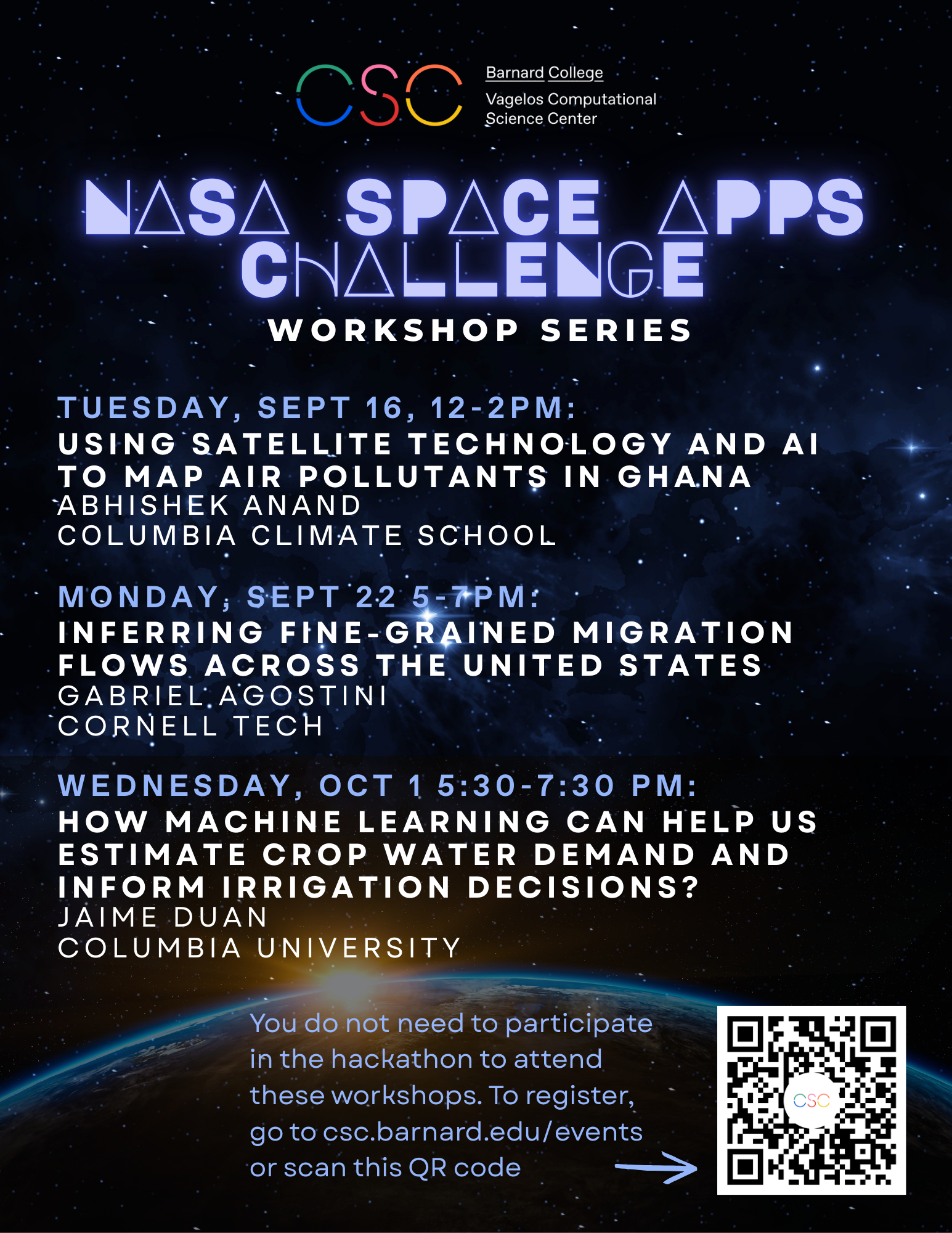
Here is the recap of our hackathon schedule.
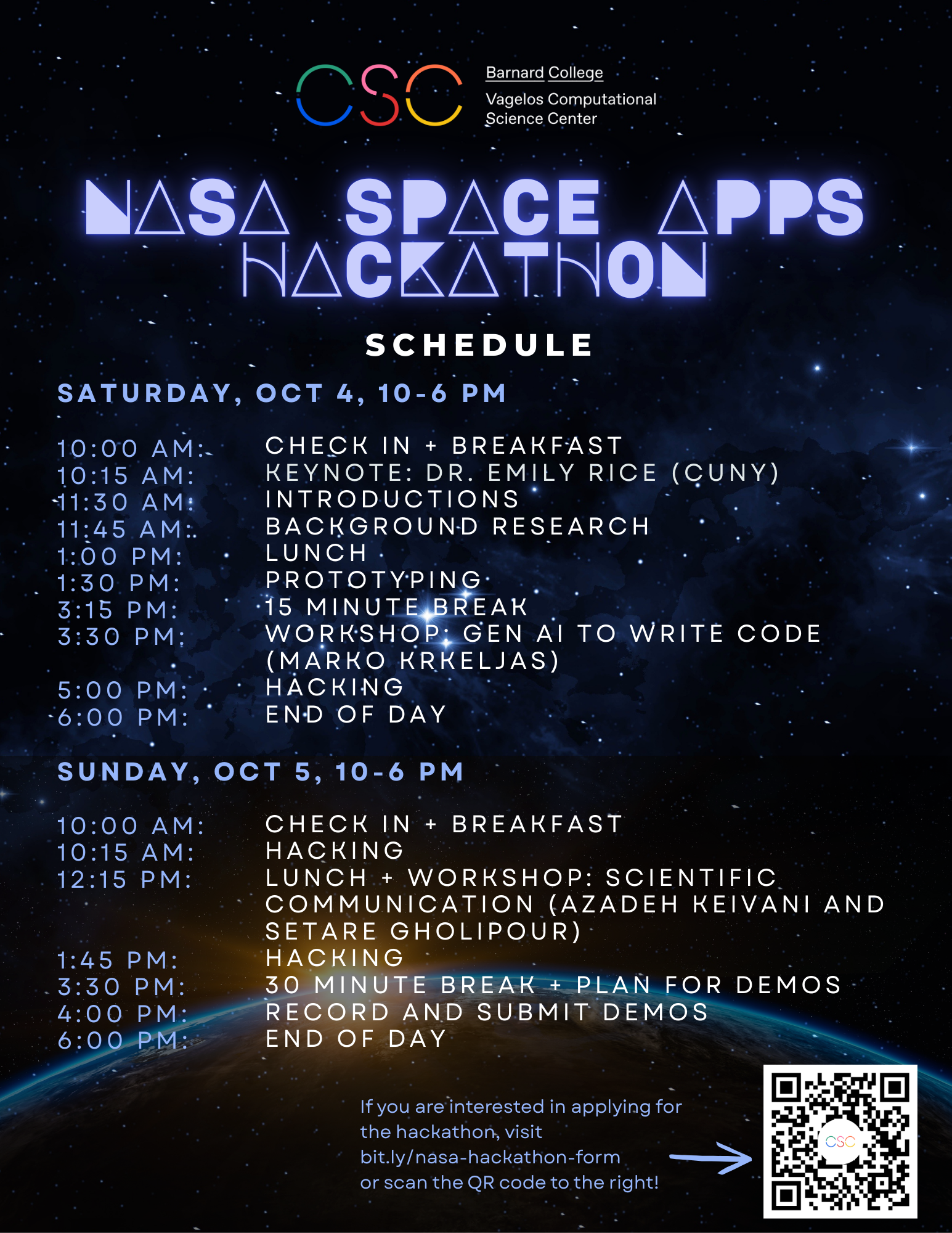
Saturday, October 4 — 10:00 AM to 6:00 PM
10:00 AM – Check-in & Breakfast
10:15 AM – Opening talk: My Science Spectrum: Creating an Eclectic Academic Career and Broadening Inclusivity with Dr. Emily Rice (Associate Professor of Astrophysics at CUNY)
11:30 AM – Introductions
11:45 AM – Background Research
1:00 PM – Lunch
1:30 PM – Prototyping
3:15 PM – Break & Snacks
3:30 PM – Workshop: Using Generative AI to Write Code with Marko Krkeljas (CSC Technical Manager & Software Developer)
5:00 PM – Hacking Begins
6:00 PM – End of Day
Sunday, October 5 — 10:00 AM to 6:00 PM
10:00 AM – Check-in & Breakfast
10:15 AM – Hacking
12:15 PM – Lunch + Workshop: Science Communication with Azadeh Keivani (Physicist and Creator of Citizen Science) and Setare Gholipour (Filmmaker and Cinematographer)
1:45 PM – Hacking
3:30 PM – 30 Minute Break + Plan for Demos
4:00 PM – Record & Submit Demos
6:00 PM – End of Day
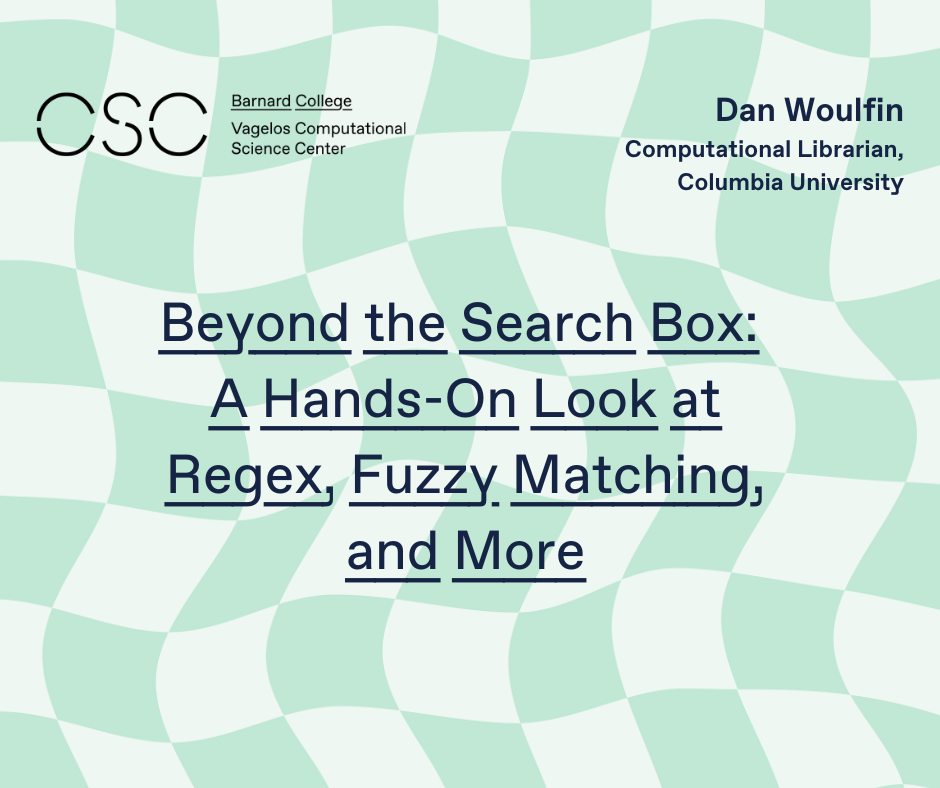
October 21, 2025 | 12:00pm - 2:00pm | 516 Milstein
Join us behind the scenes to meet some of the methods behind search. CUL librarian Dan Woulfin returns to the CSC to show you some ways that computers can find patterns, spot words despite typos, and make 'sense' of texts. We'll play in sandboxes like regex101.com and Google Colab, experiment with real-world platforms like GitHub and Semantic Scholar, and talk through what these tools can and cannot do.
This workshop is designed to benefit you no matter where you are on your computational journey. All majors and experience levels are welcome.
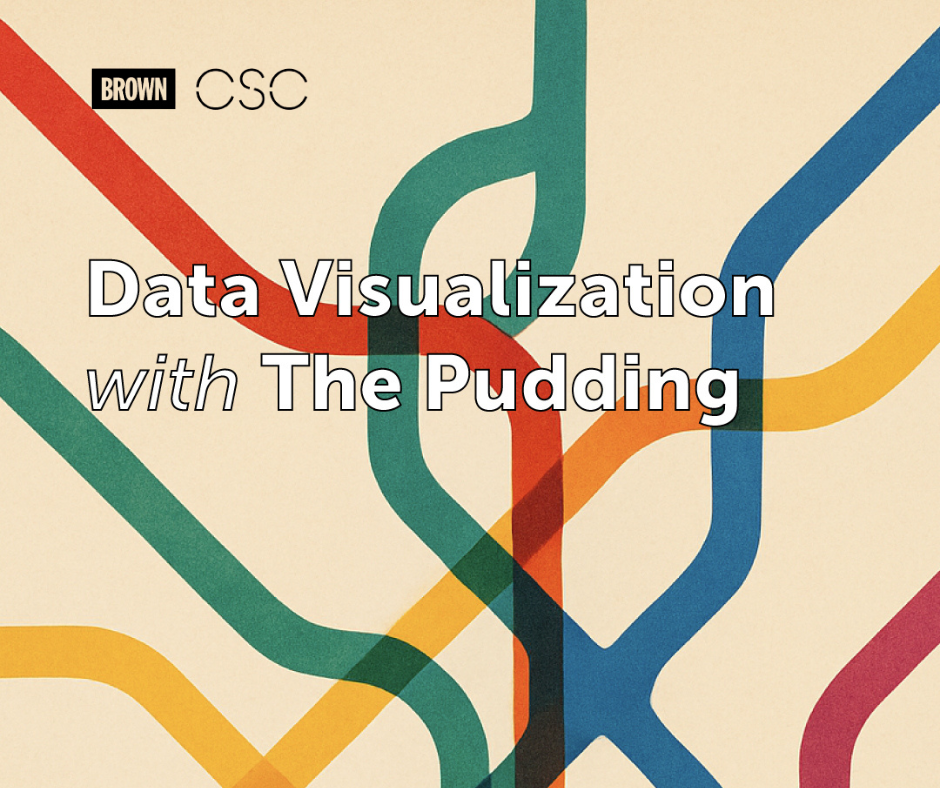
November 1, 2025 | 10:00am - 4:00pm | Pulitzer Hall (In-person only)
Graphical (or pictorial) presentations of data have become an almost essential part of journalistic practice. Data visualization helps us see patterns in data and is an important tool for finding stories. Over the past decade, major outlets including The New York Times, Washington Post, and Reuters have been publishing data visualizations that push the idea of storytelling, creating new data-driven ways to inform and entertain. Alongside these graphics are newsrooms based entirely on data visualization, including the Kontinentalist and The Pudding.
In this day-long workshop co-sponsored by the Brown Institute and Barnard Vagelos Computational Science Center, members of The Pudding will immerse participants in their tried-and-true design process, segmented into four stages: story, data, design, and development. To learn more click here.
This workshop will only be able to accommodate 24 students. Applications are due by 11:59pm on Friday, October 17th. Notices will be sent out on Monday, October 20.
This workshop is planned to take place in-person only (Pulitzer Hall).
We look forward to seeing you there!
For more information about the Barnard CSC, go to https://www.csc.barnard.edu or follow us on Instagram and X (@barnard_csc).
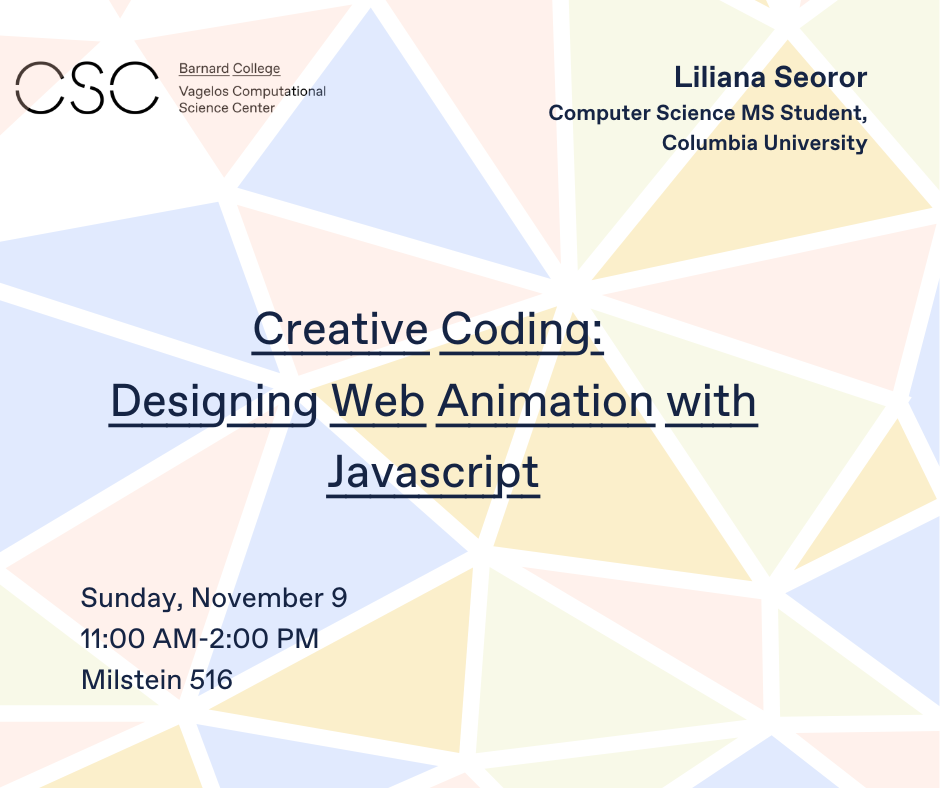
November 9, 2025 | 11:00am - 2:00pm | 516 Milstein (Application Required)
Learn how to create web animations using the Anime.js Javascript animation engine! During this workshop, you'll learn to combine HTML, CSS, and Javascript to build animated illustrations. You'll be using a new programming environment that integrates AI features to support beginners with creative coding, designed by the Design Tools Lab in the Barnard Computer Sciences Department. This workshop is designed for participants with some basic HTML and CSS experience but are either new to Javascript or new to creating animations with JS – no prior Javascript experience is needed. Food will be provided!
This workshop is taught by Liliana Seoror (BC '24) MS CS Candidate at Columbia SEAS.
The affiliated research project is designed by Tiffany Tseng (Assistant Professor, Department of Computer Science, Barnard College).
We will be accepting a maximum of 10 students. The deadline to apply is November 5, 2025, at 11:59 PM.
This workshop is planned to take place in-person only (Milstein 516).
We look forward to seeing you there!
For more information about the Barnard CSC, go to https://www.csc.barnard.edu or follow us on Instagram and X (@barnard_csc).
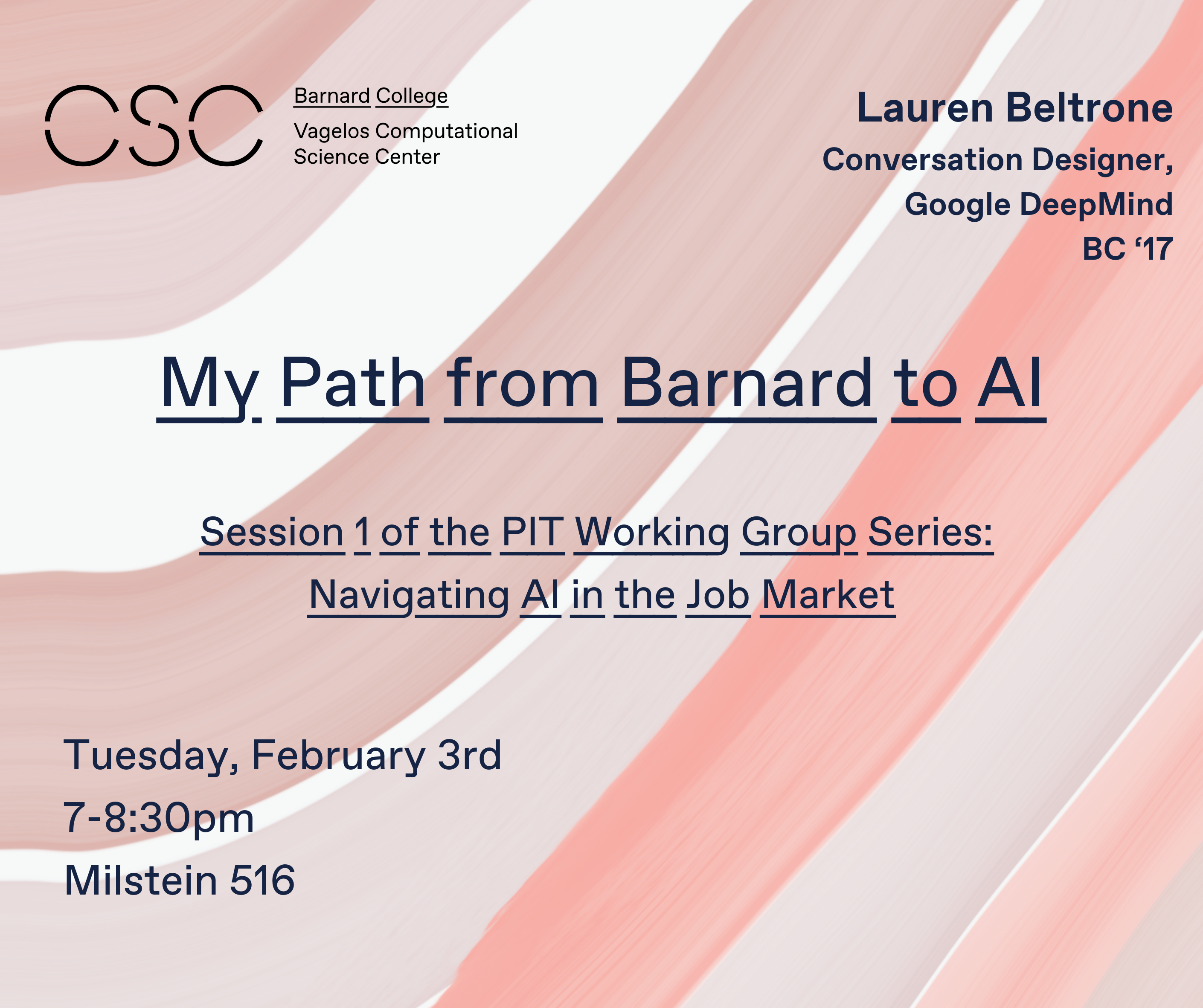
February 3, 2026 | 7-8:30PM ET | Milstein 516
How do you go from a liberal arts environment to the forefront of a technical revolution? In this opening session, we traced the journey from the Barnard campus to the heart of the AI industry. Lauren shared the three most important lessons she had picked up while building everything from enterprise chatbots to the consumer tools you use today. We moved beyond the “listen and learn” format to help students get hands-on: students walked away with a professional narrative that captures their unique story, a clearer definition of their ideal role, and a practical roadmap for building their own perspective on where this industry is headed.
Lauren Beltrone is a Conversation Designer at Google DeepMind, where she gives Gemini the gift of gab using machine learning techniques. She recently filed her first patent and once accidentally went viral on TikTok describing her job. Passionate about human-AI interaction, she has been researching and designing conversational interfaces since 2014. She studied Cognitive Science at Barnard College, where she received the Intellectual Frontiers Prize for her speech perception research.
This workshop took place in-person only (Milstein 516).
We look forward to seeing you there!
For more information about the Barnard CSC, go to https://www.csc.barnard.edu or follow us on Instagram and X (@barnard_csc).

February 6, 2026 | 9:30am - 3:30pm | Lefrak Theater & James Room, Barnard Hall
What would responsible AI mean for the liberal arts? AI is already impacting classrooms, workplaces, media, and the environment in ways that bring both risks as well as new possibilities. Research and public debate have highlighted AI’s potential to accelerate scientific and medical discovery, increase accessibility to an array of content and materials, speed translation across languages, and process large amounts of archival data. At the same time, scholars and critics have raised concerns that uneven access to AI could widen inequality, that its use may undermine privacy, and that its reliance on energy-intensive data centers is contributing to environmental damage. Like other major technological and cultural shifts, these systems demand that educators and researchers ask hard questions about how they work, whose interests they serve, how they influence academic disciplines and career paths, and how they affect the world we share. What role ought Barnard and the liberal arts play in framing the conversation, contributing to research on AI, and educating the broader public?
Schedule at a Glance
9:30-10:00am
Arrival and opening remarks in the Lefrak Theater
10:00-11:30am
Keynote and Q&A with Kathleen McKeown, Henry and Gertrude Rothschild Professor of Computer Science and Founding Director of Columbia’s Data Science Institute (Lefrak)
11:45am-1:00pm
Barnard Alumnae Panel: Responsible AI across Fields (Lefrak)
1:00-1:45pm
Catered lunch and table discussion (James Room)
1:45-3:30pm
Community Showcase and closing discussion (James Room)

Feb. 8th | 12PM ET | Barnard Gates
Need a study break? The CSC Student Advisory Board invited students to come and explore art & technology in Brooklyn with them!
The SAB explored exhibits at Pioneer Works, an artist- and scientist-led cultural hub that brings together art, technology, music, and science in unexpected ways. Think exhibitions, performances, and hands-on creativity—all in one space!
Learn more about Pioneer Works' Second Sundays here.

Google is looking for undergraduate Barnard participants who can travel to the Google New York office to provide feedback on Gemini app experiences.
At a glance:
- When: Tuesday, 2/10
- Duration: 60 minutes
- Where: Google New York Office
- Compensation: $150
Requirements to participate:
- Be at least 18 years old.
- Be able to travel to Google New York Office (Chelsea)
- Have an active Gemini Pro account
- Accept the terms of our Informed Consent Form (sent to selected to participate)
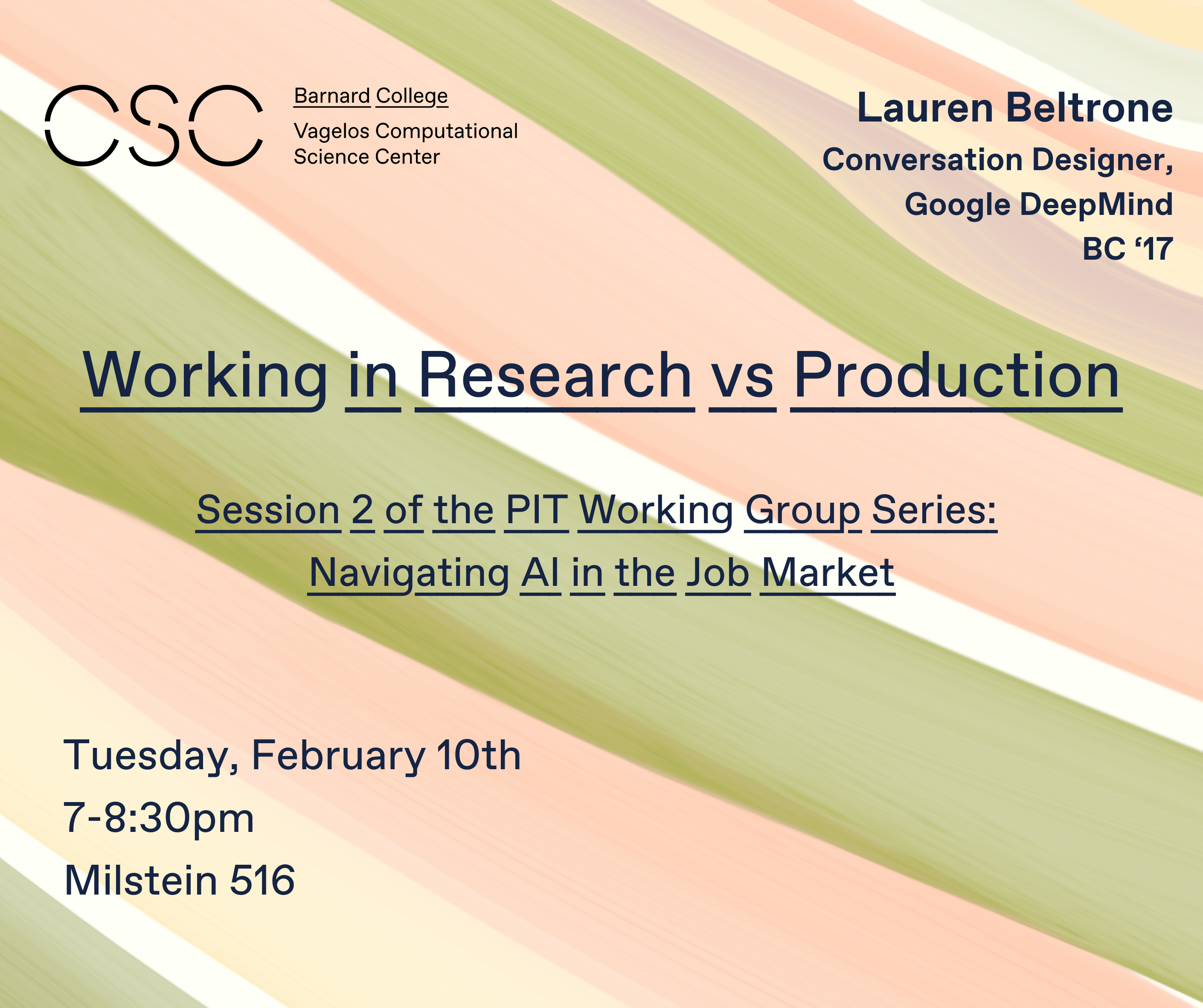
February 10, 2026 | 7-8:30PM ET | Milstein 516
Is the future of AI found in a lab or in a product? These days, the line between academia and industry is getting increasingly blurry. This week, we explored how research and production roles differ – and more importantly, where they are starting to merge. We looked at the theoretical goals of research versus the product-driven goals of industry to help students decide which path feels like the right fit for their personality and skills. To bring this to life, we were joined by Lara and Alexandra, two Google DeepMind engineers who have successfully navigated these transitions. We wrapped up with a journaling session to help students pinpoint their own academic interests.
Lauren Beltrone is a Conversation Designer at Google DeepMind, where she gives Gemini the gift of gab using machine learning techniques. She recently filed her first patent and once accidentally went viral on TikTok describing her job. Passionate about human-AI interaction, she has been researching and designing conversational interfaces since 2014. She studied Cognitive Science at Barnard College, where she received the Intellectual Frontiers Prize for her speech perception research.
This talk took place in-person only (Milstein 516).
We look forward to seeing you there!
For more information about the Barnard CSC, go to https://www.csc.barnard.edu or follow us on Instagram and X (@barnard_csc).
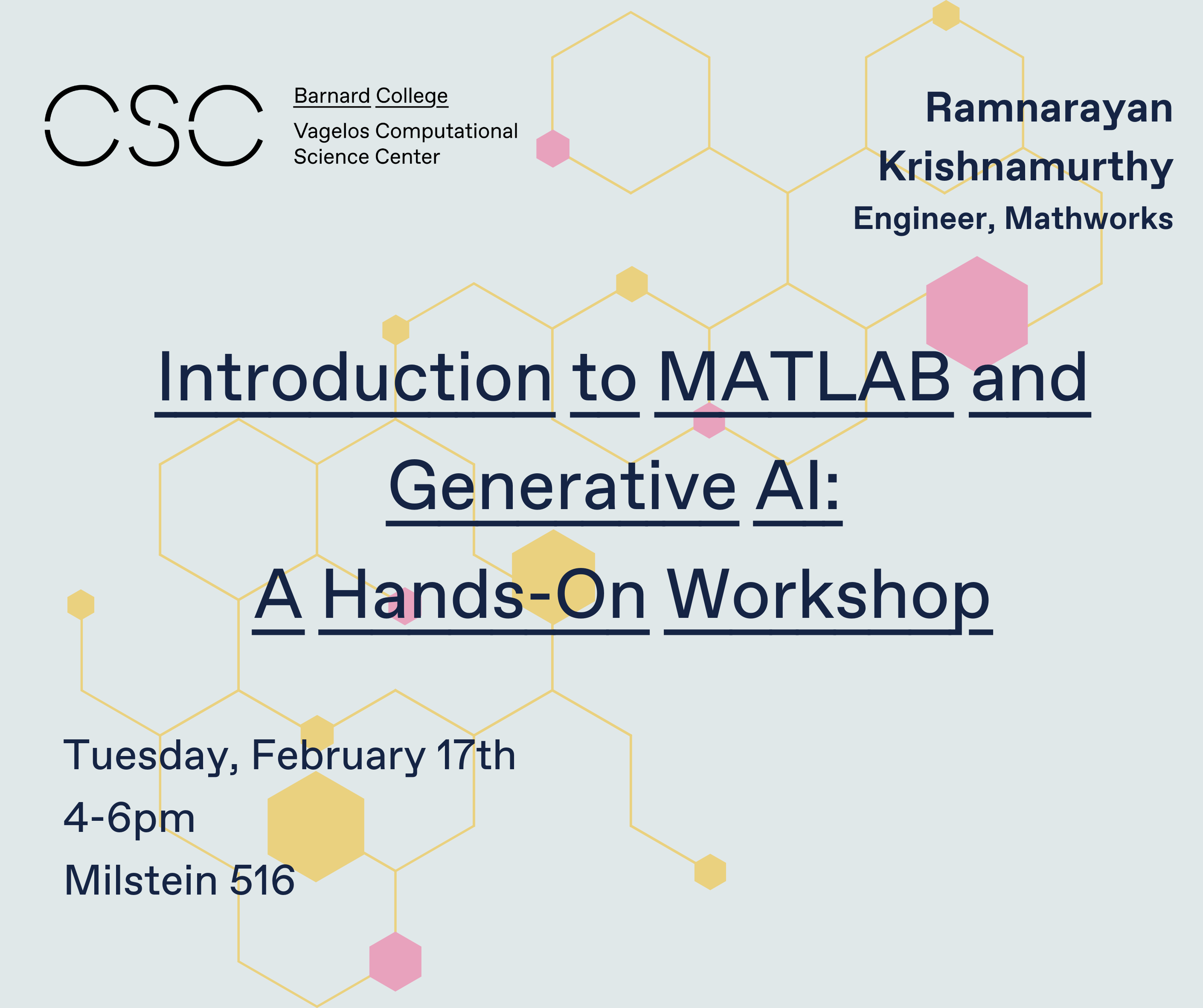
February 17, 2026 | 4-6PM ET | Milstein 516
In this session, participants learned how MATLAB can be used to visualize and analyze data, perform numerical computations, and develop algorithms. Through hands-on exercises and examples, participants were able to see how MATLAB can help them become more effective in their work.
Highlights include:
- Accessing data from many sources (files, other software, hardware, etc.)
- Using interactive tools for iterative exploration, design, and problem solving
- Automating and capturing your work in easy-to-write scripts and programs
- Building and deploying interactive applications
- Utilizing MATLAB Copilot as programming tutor
We also explored MATLAB Copilot, a generative AI assistant that can accelerate work by helping users understand existing codebases, generate code through natural language prompts, and enhance both curriculum development and research productivity.
This workshop took place in-person only (Milstein 516).
For more information about the Barnard CSC, go to https://www.csc.barnard.edu or follow us on Instagram and X (@barnard_csc).
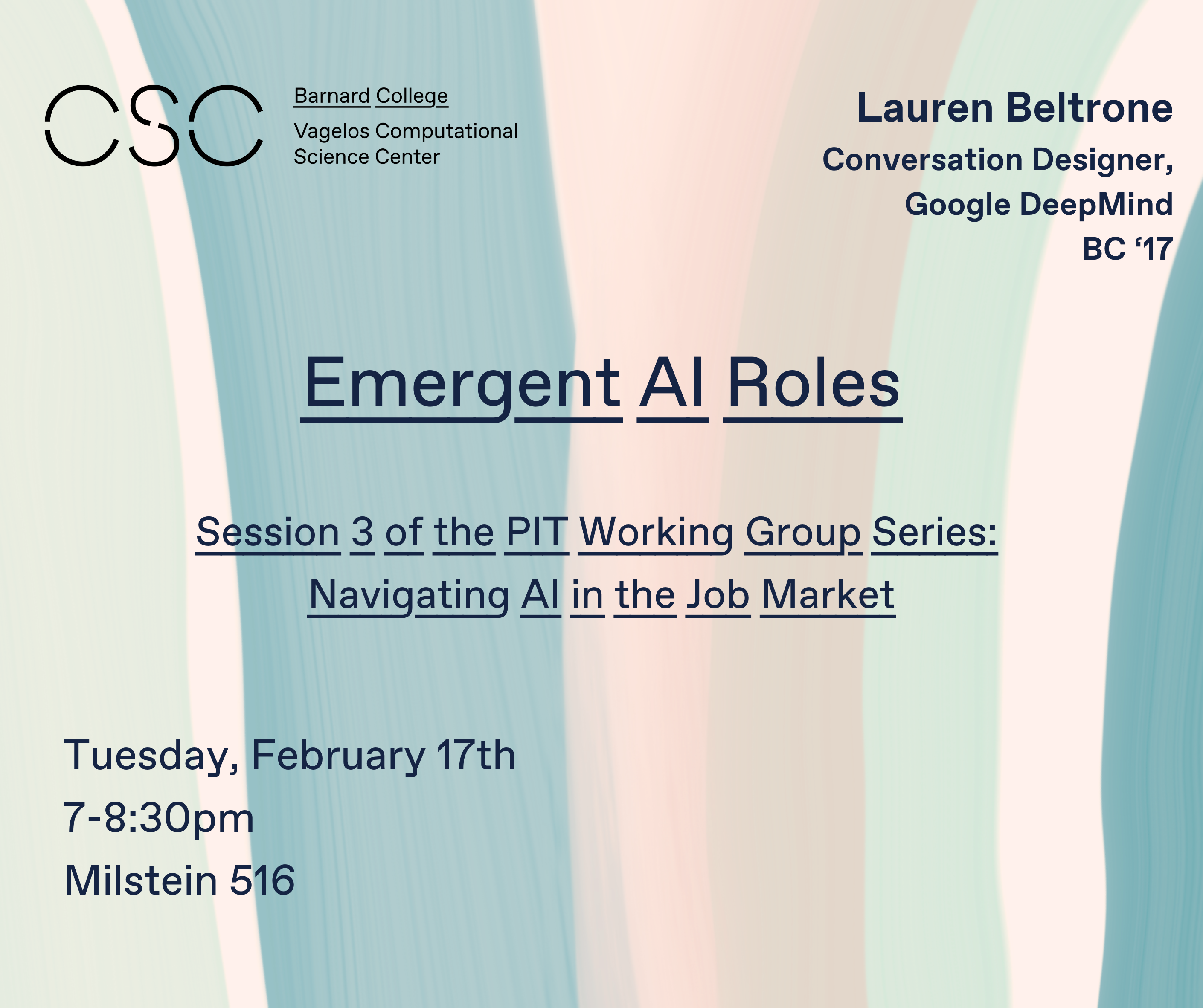
February 3, 2026 | 7-8:30PM ET | Milstein 516
Session 3: Emergent AI Roles. Ever wonder what it actually takes to get an LLM out into the wild? It’s not just about the code; it’s a massive cross-functional effort. This session demystifies the LLM production cycle, from the initial scope to training and testing. We looked at the day-to-day responsibilities of Product Managers, Engineers, and UX Designers, showing you where research fits into the build process. Lauren also brought in colleagues from Google DeepMind’s design and research teams to share more about how they think about their jobs.
We wrapped up with a journaling session to help students pinpoint their own academic interests.
Lauren Beltrone is a Conversation Designer at Google DeepMind, where she gives Gemini the gift of gab using machine learning techniques. She recently filed her first patent and once accidentally went viral on TikTok describing her job. Passionate about human-AI interaction, she has been researching and designing conversational interfaces since 2014. She studied Cognitive Science at Barnard College, where she received the Intellectual Frontiers Prize for her speech perception research.
This talk took place in-person only (Milstein 516).
For more information about the Barnard CSC, go to https://www.csc.barnard.edu or follow us on Instagram and X (@barnard_csc).
2024-2025 Academic Year
September 5, 2024 | 6:00pm - 6:30pm
Interested in learning the basics of web design and development?
Join the virtual info session for Pixel @ CSC!
Pixel @ CSC is a free, non-credit, 10-week in-person course where you can learn how to build a simple website in community with other Barnard students! This course is open to students from all majors, and no coding experience or computer science background is required. At the info session, you have an opportunity to learn more about the course and how you can apply to join the Fall 2024 cohort!
This event takes place on Zoom only.
For more information about the Barnard CSC, go to https://www.csc.barnard.edu or follow us on Instagram and X (@barnard_csc).
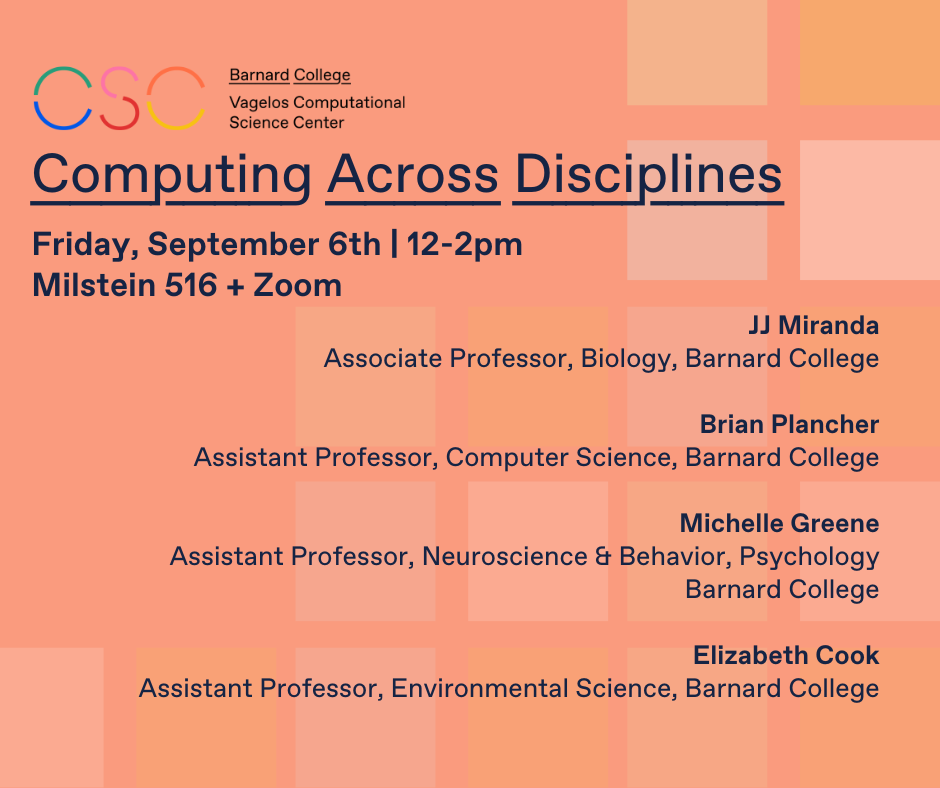
September 6, 2024 | 12:00pm - 2:00pm
Hybrid / 516 Milstein + Zoom
We're kicking off our workshop series with an exciting introductory workshop featuring four Barnard faculty whose work engages with computing. Each presenter gives 15 to 20 minute overviews of how they use and apply computing to topics across disciplines.
Presenters and topics include:
Machine Learning and AI for Pandemic Biology, JJ Miranda, Associate Professor of Biology, Barnard College
We discuss our own previous work and emerging trends in the field that use machine learning to understand how viruses interact with humans from the cellular to the population level.
Optimization for Robotics through Co-Design, Brian Plancher, Assistant Professor of Computer Science, Barnard College
Today's robots range from humanoids to autonomous cars to micro-drones and have a wide variety of different computational platforms on board (e.g., CPUs, GPUs, MCUs). Across all of these scales, optimization algorithms are a core underlying operation and yet often remain a computational bottleneck at the edge. In this presentation, we explore some of our recent work unlocking real-time optimization at the edge through hardware-software co-design.
Computing for Insights into Mind and Brain, Michelle Greene, Assistant Professor of Neuroscience & Behavior and Psychology, Barnard College
Have you ever wondered how you can instantly make sense of the world the moment you open your eyes? In this talk, we explore the hidden computational challenges behind visual perception and show how cutting-edge computing is helping scientists decode the brain's ability to understand the complex scenes around us in a fraction of a second.
Monitoring long-term success in urban forests: A 10 year case study from NYC Million Trees Initiative, Elizabeth Cook, Assistant Professor of Environmental Science, Barnard College
Urban reforestation is an increasingly common strategy cities use to address pressing social and environmental changes, yet there is little long-term data on urban tree growth and the success of urban reforestation. I share results from 10 years of monitoring reforestation success in the NYC Million Trees Initiative.
This workshop takes place in person (516 Milstein) and on Zoom.
For more information about the Barnard CSC, go to https://www.csc.barnard.edu or follow us on Instagram and X (@barnard_csc).
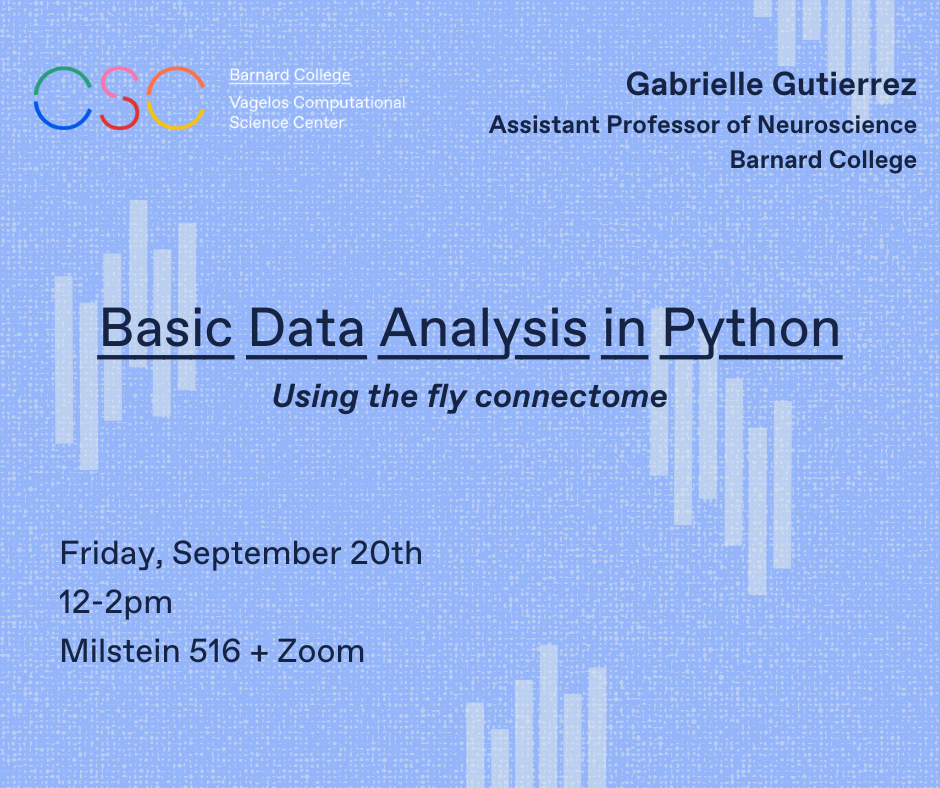
September 20, 2024 | 12:00pm - 2:00pm
Hybrid / 516 Milstein + Zoom
This workshop is designed for beginners to get their feet wet working with Pandas dataframes and doing basic statistical analyses on real neuroscience data. The Drosophila connectome has data about the neurons and connections within a single fruit fly brain. Participants are given access to a Jupyter notebook that is populated with starter code. During this workshop, we walk through some simple analyses using Pandas dataframes, such as taking the sum of values in a column, creating a pivot table, and visualizing data. With the remaining time, participants work in small groups to do analyses of their choice with the connectome data and to customize their visualizations.
This workshop is taught by Gabrielle Gutierrez, Assistant Professor of Neuroscience at Barnard College.
This workshop takes place in person (516 Milstein) and on Zoom.
For more information about the Barnard CSC, go to https://www.csc.barnard.edu or follow us on Instagram and X (@barnard_csc).

September 26, 2024 | 4:00pm - 5:00pm
The Generative AI Learning Community continues to meet throughout the academic year. Join us for an AI Show and Tell.
This workshop takes place in person only.
For more information about the Barnard CSC, go to https://www.csc.barnard.edu or follow us on Instagram and X (@barnard_csc).
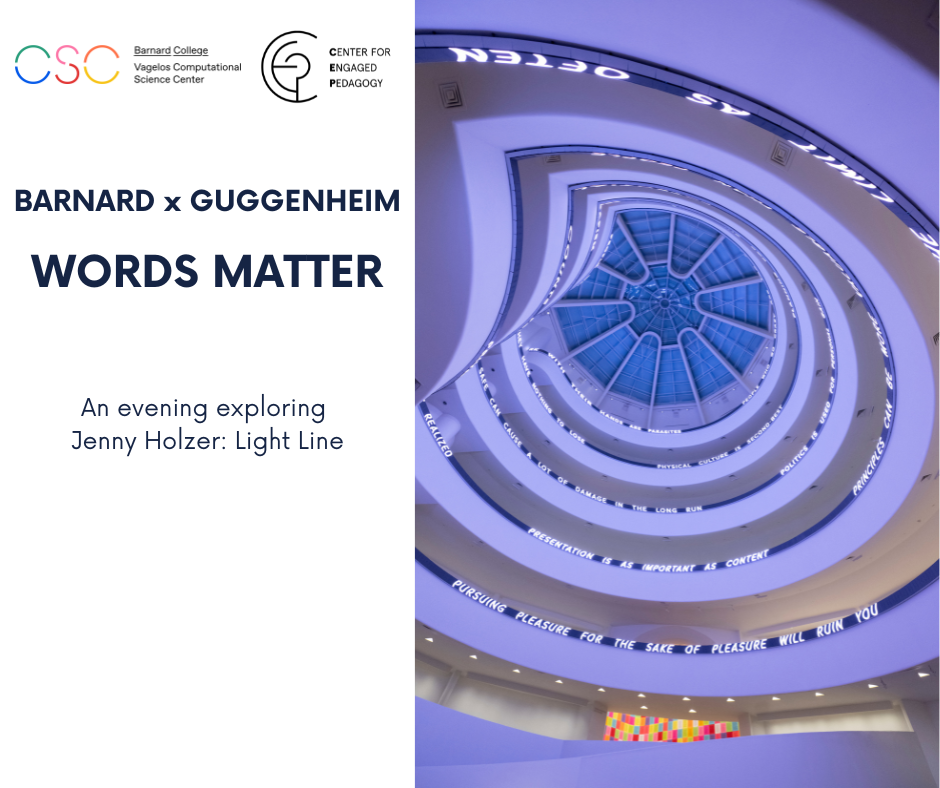
September 26, 2024 | 5:00pm - 7:30pm
Guggenheim Museum
Have you ever been provoked by the marble bench on Barnard's campus inscribed with comforting, inspiring, disturbing, moving, or just perplexing all-caps one-liners such as "MUCH WAS DECIDED BEFORE YOU WERE BORN," "THERE'S NOTHING EXCEPT WHAT YOU SENSE," and "ABUSE OF POWER COMES AS NO SURPRISE"? These and other texts by the artist Jenny Holzer have been set in motion across town at the Guggenheim Museum.
Join the CSC & CEP for an evening at the Guggenheim Museum to view and experience the exhibition Jenny Holzer: Light Line. We discuss issues related to technology's role in art curation and practice and engage with the themes of the exhibition, which include authorship and authenticity; technology and aesthetic form; text as a medium; and rights to political speech in public spaces. This event, open to up to 60 Barnard students, consists of a self-guided exploration, an interactive tour, facilitated discussion, and hands-on collaborative activities.
This program is co-sponsored and co-organized by the CSC, CEP, and the Guggenheim Innovation Lab, an experiential learning program run by the Guggenheim’s Academic Engagement department. In collaboration with university and college partners, the Innovation Lab cultivates pedagogy and practice in the humanities and creative fields in a way that is interdisciplinary, collaborative, publicly engaged, and experimental.
Photo credit: Installation for the Solomon R. Guggenheim Museum, 1989/2024; LED with blue, green & red diodes; 16.375 x 1944 in. / 41.6 x 4937.8 cm; Text: Truisms, 1977–79; Installation: Jenny Holzer: Light Line, Solomon R. Guggenheim Museum, New York, 2024; © 2024 Jenny Holzer, member Artists Rights Society (ARS), NY; Photo: Filip Wolak
This event takes place in person only (Guggenheim Museum).
For more information about the Barnard CSC, go to https://www.csc.barnard.edu or follow us on Instagram and X (@barnard_csc).
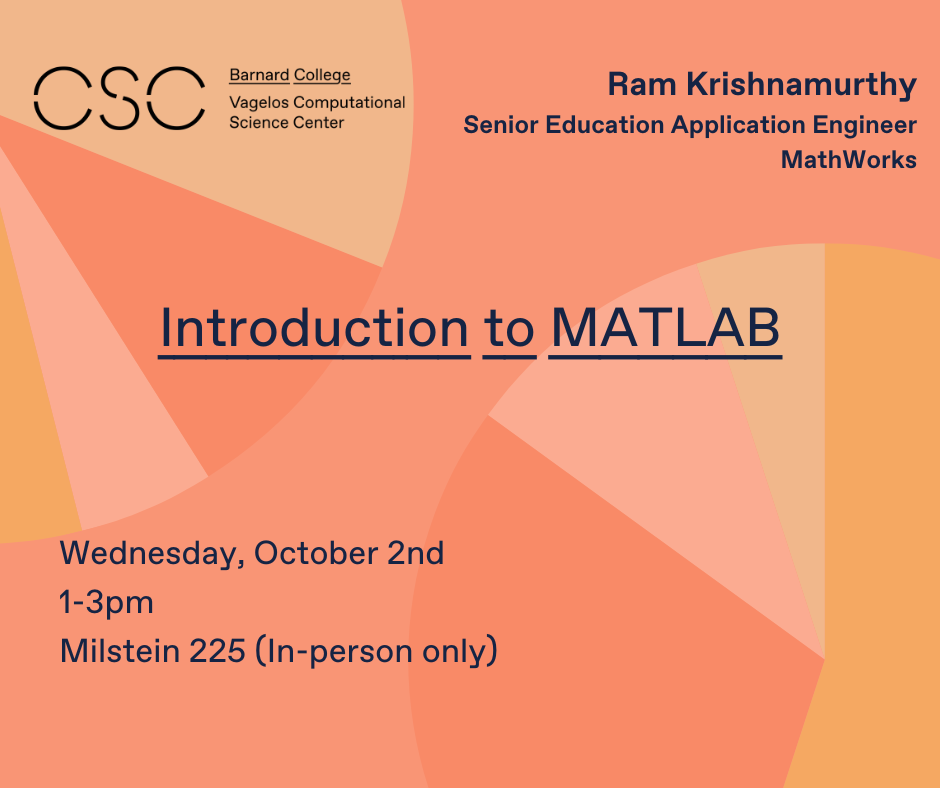
October 2, 2024 | 1:00pm - 3:00pm
In-person / 225 Milstein
In this session, participants learn how MATLAB can be used to visualize and analyze data, perform numerical computations, and develop algorithms. Through live demonstrations and examples, we see how MATLAB can help us become more effective in our work.
Highlights include:
- Accessing data from many sources (files, other software, hardware, etc.)
- Using interactive tools for iterative exploration, design, and problem solving
- Automating and capturing your work in easy-to-write scripts and programs
- Building and deploying interactive applications
This workshop is taught by Ram Krishnamurthy, a Senior Education Application Engineer with MathWorks. He assists faculty, researchers, and students in doing their best work by collaborating with them on curriculum and research matters. He received his Master's degree in Computer Engineering from the University of Colorado, Boulder in 2016. His expertise is in the applications of Artificial Intelligence techniques for Image and Signal workflows.
This event takes place in person only (225 Milstein).
For more information about the Barnard CSC, go to https://www.csc.barnard.edu or follow us on Instagram and X (@barnard_csc).
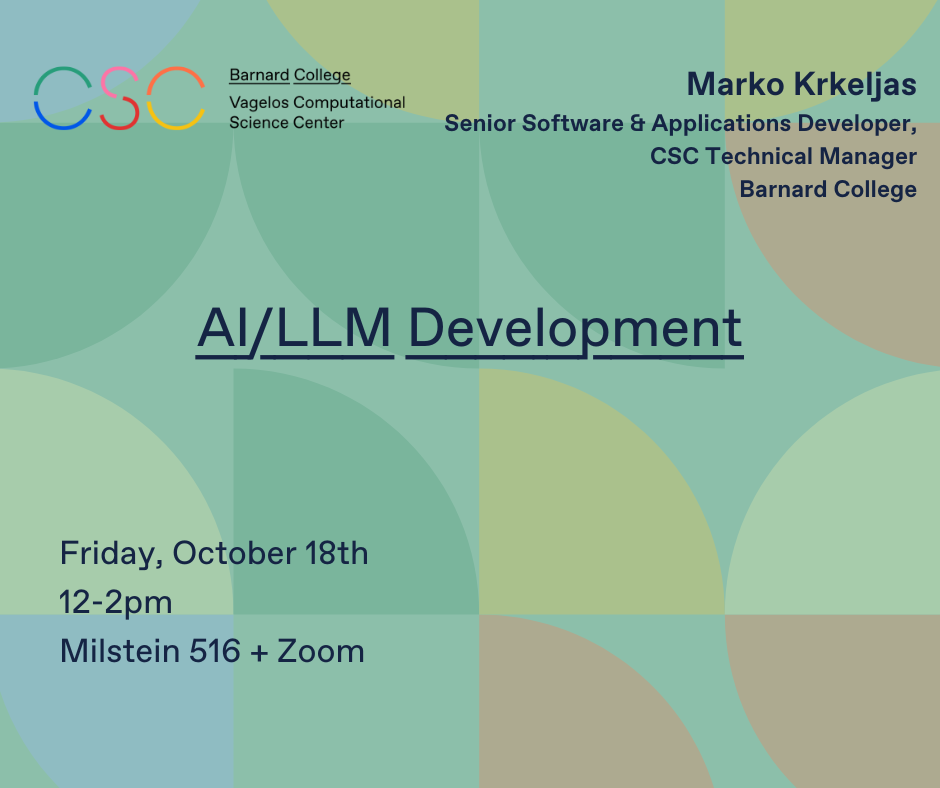
October 18, 2024 | 12:00pm - 2:00pm
Hybrid / 516 Milstein + Zoom
This workshop explores incorporating AI language models directly into software development. We focus on using these models to turn unstructured information into structured data to create smarter, more capable applications.
This workshop is taught by Marko Krkeljas, Senior Software & Applications Developer and CSC Technical Manager at Barnard College.
This workshop takes place in person (516 Milstein) and on Zoom.
For more information about the Barnard CSC, go to https://www.csc.barnard.edu or follow us on Instagram and X (@barnard_csc).
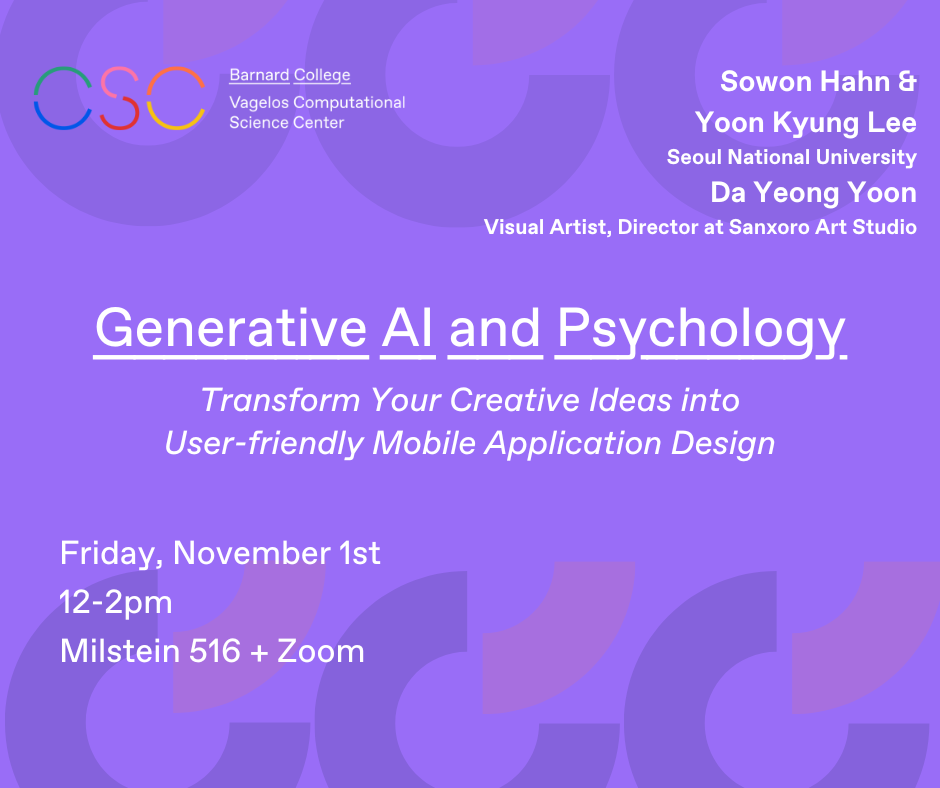
November 1, 2024 | 12:00pm - 2:00pm
Hybrid / 516 Milstein + Zoom
This workshop is designed to transform your ideas into mobile app prototypes—no prior coding experience required. Discover how to seamlessly integrate AI-generated images into your designs and gain practical experience with AI prompts through hands-on sessions. Participants learn how to adjust large language model prompts to meet expectations as a user, and discuss how to align prompts that accurately portray aesthetics and emotions. Using Figma's intuitive visual tools, participants explore the power of AI technologies to create digital artwork, illustrations, and more. This workshop offers a unique opportunity to collaborate with AI, turning your creative vision into impactful, real-world applications.
This workshop is taught by Sowon Hahn (Department of Psychology, Seoul National University), Yoon Kyung Lee (Ph.D., Postdoc at Institute of Psychological Sciences, Seoul National University), and Da Yeong Yoon (Visual Artist, Director at Sanxoro Art Studio).
This workshop takes place in person (516 Milstein) and on Zoom.
For more information about the Barnard CSC, go to https://www.csc.barnard.edu or follow us on Instagram and X (@barnard_csc).
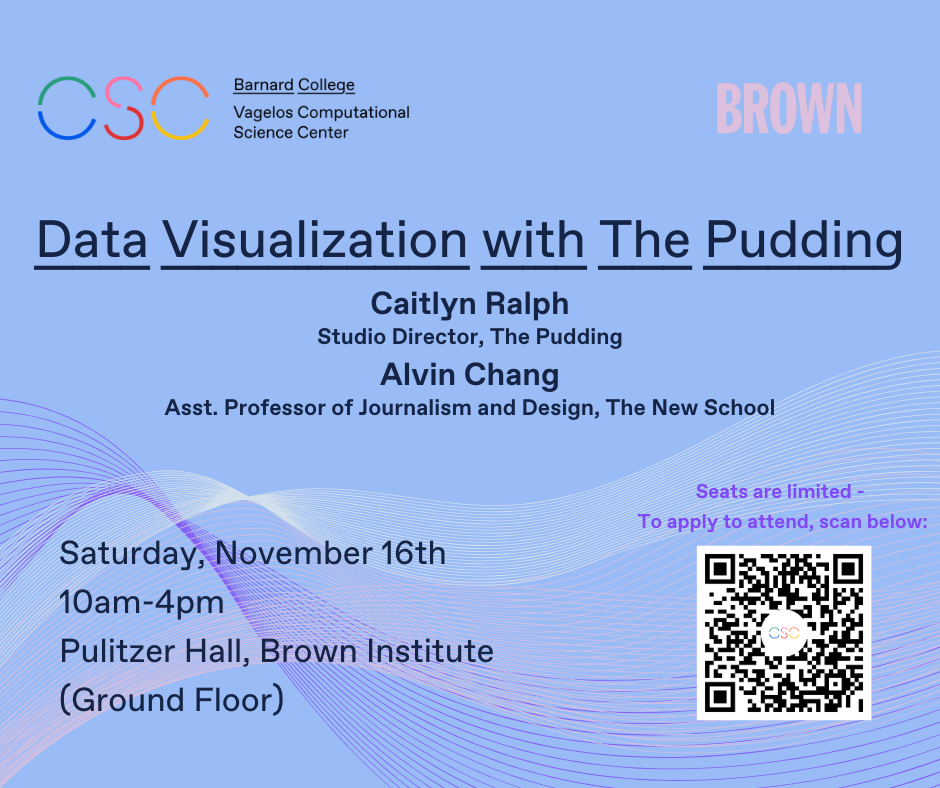
November 16, 2024 | 10:00am - 4:00pm
In-person / Pulitzer Hall, Brown Institute (Ground Floor)
Graphical (or pictorial) presentations of data have become an almost essential part of journalistic practice. Data visualization helps us see patterns in data and is an important tool for finding stories. Over the past decade, major outlets including The New York Times, Washington Post, and Reuters have been publishing data visualizations that push the idea of storytelling, creating new data-driven ways to inform and entertain. Alongside these graphics are newsrooms based entirely on data visualization, including the Kontinentalist and The Pudding.
In this day-long workshop co-sponsored by the Brown Institute and Barnard Vagelos Computational Science Center, members of The Pudding immerse participants in their tried-and-true design process, segmented into four stages: story, data, design, and development.
In the week leading up to the workshop, accepted participants are asked to embark on a creative journey to collect data about the NYC subway system. This data might be methodical and sourced from the MTA turnstile API, capturing the flow of commuters through the city. Or it could be more personal and observational—hand-documented notes from your daily treks, sketches of the subway’s unique quirks, maps of broken lights, or a visual catalog of tile murals across stations. Inspired by the work of Denis Wood, who mapped his neighborhood in surprising ways, and Giorgia Lupi, known for blending data and personal stories, we encourage you to be creative! Use whatever tools come natural to you, whether it’s pen and paper, a spreadsheet, or a snippet of code. Every one of us has a unique story shaped by these subterranean journeys, and we can’t wait to see what data you find interesting and valuable. Do not spend more than an hour or two on this effort.
The session begins with Story, a throughline that resonates with all participants of the program. As we’ve all experienced, the strongest visualizations are those with equally strong narratives. Diving deeper, students are introduced to the realm of Data. Using curated datasets around key topics, students seek to uncover the nuances of integrating specific, meaningful data with their narratives. The emphasis then shifts to the visual canvas, focusing on the core elements of Design. The goal is to ensure that every story is captivating both visually and narratively. And culminating the day is a glimpse into Development. While the intricacies of programming might remain in the backdrop, attendees understand and appreciate the development scaffolding that turns their narratives and designs into dynamic interactive features.
This workshop accommodates 24 students.
About the Presenters
Caitlyn Ralph is the Studio Director at The Pudding’s in-house data journalism agency called Polygraph, where we do the same type of visual storytelling work with the same team for different brands and organizations. Her BA is in Computer Science, her MS is in Data Viz, and her prior professional experience is in magazine journalism. She spends her working days explaining this practice as clearly as possible to clients with varying backgrounds, managing projects and the team, and crafting future strategy for both Polygraph and its sister publication The Pudding. She spends her non-working days running, taking film pictures, and on a K-pop group called Stray Kids.
Alvin Chang is an assistant professor of Journalism and Design at the New School. He's a data and visual journalist who has worked in several newsrooms, most recently as Head of Visuals and Data at Guardian US. His work as a journalist often combines deep reporting with data analysis to help readers clearly understand the world around them. His stories often show how small decisions accrue into invisible problems like discrimination, segregation, and ultimately dehumanization. And he makes those things visible using data viz, interactives, cartoons, and videos.
This workshop takes place in person at Pulitzer Hall, Brown Institute (Ground Floor).
For more information about the Barnard CSC, go to https://www.csc.barnard.edu or follow us on Instagram and X (@barnard_csc).
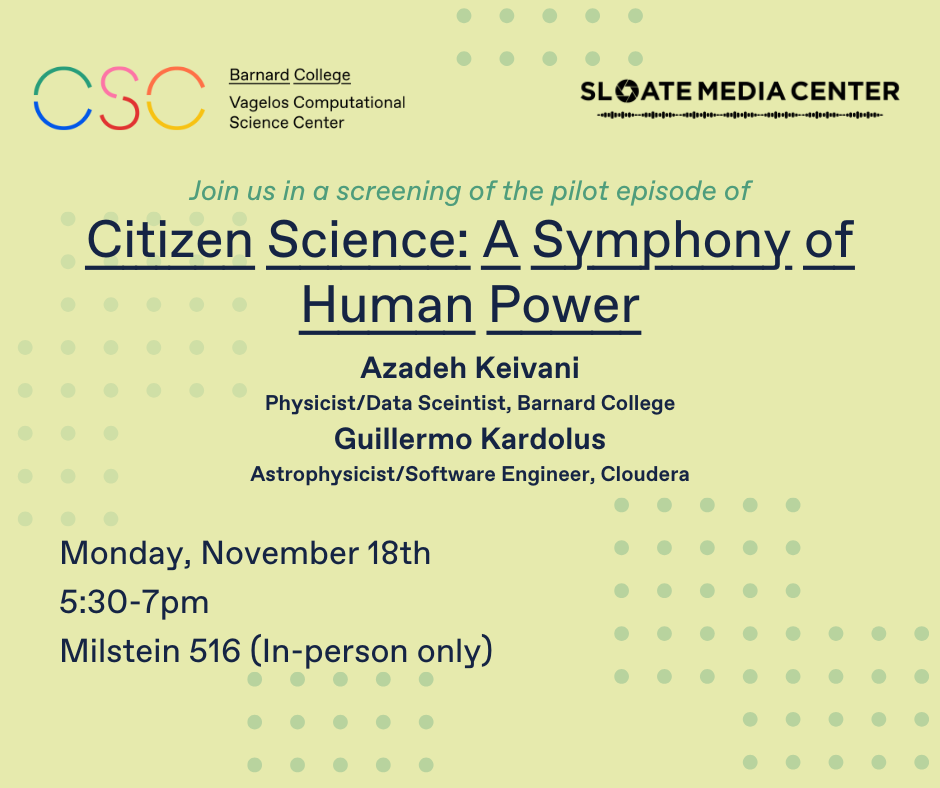
November 18, 2024 | 5:30pm - 7:00pm
In-person / 516 Milstein
Join the CSC and Media Center in celebrating the release of Digital Age Academy's new docuseries "Citizen Science: A Symphony of Human Power" with a screening of the pilot episode. The series models how one can utilize data science and public data to address some of the issues they identify in their own communities. The pilot focuses on Citi Bike's lack of available docks in Red Hook.
The screening is paired with talks from creator Azadeh Keivani (Co-Founder of Digital Age Academy, Physicist/Data Scientist at Barnard College) and Guillermo Kardolus (Astrophysicist/Software Engineer at Cloudera), followed by a discussion and Q&A with the audience. Refreshments are served.
This event takes place in person only (516 Milstein).
For more information about the Barnard CSC, go to https://www.csc.barnard.edu or follow us on Instagram and X (@barnard_csc).
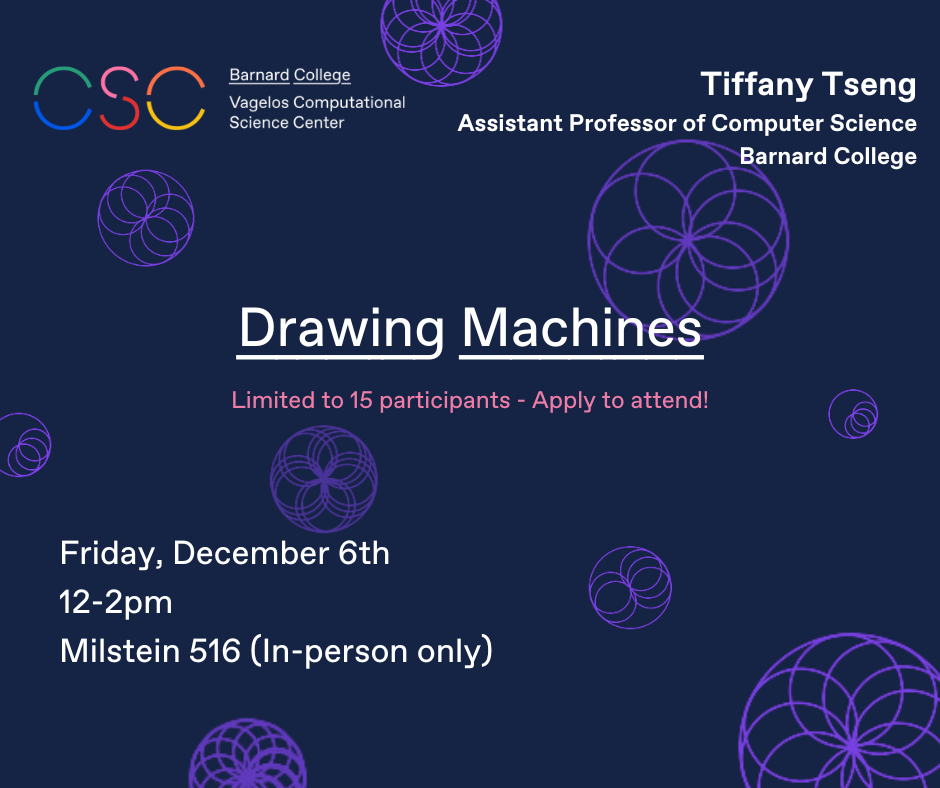
December 6, 2024 | 12:00pm - 2:00pm
In-person / 516 Milstein
Learn how to design generative art using code! In this workshop, participants learn the basics of creating computational art using Processing, including drawing basic shapes, creating patterns, and introducing randomness to add character to your designs. We then use the AxiDraw computer-controlled machine to create physical postcards of the art you create. Through this process, participants are able to take home a piece of art that they create and learn about the history of computer code and digital art.
This workshop takes place in person only (516 Milstein).
For more information about the Barnard CSC, go to https://www.csc.barnard.edu or follow us on Instagram and X (@barnard_csc).
![]()
January 22, 2025 | 6:00pm - 6:30pm
Zoom
Interested in learning the basics of web design and development?
Join a virtual info session for Pixel @ CSC!
Pixel @ CSC is a free, non-credit, 8-week in-person course where you can learn how to build a simple website in community with other students! This course is open to Barnard and Columbia students from all majors, and no coding experience or computer science background is required. At the info session, you have an opportunity to learn more about the course and how you can apply to join the Spring 2025 cohort!
This event takes place on Zoom only.
For more information about the Barnard CSC, go to https://www.csc.barnard.edu or follow us on Instagram and X (@barnard_csc).
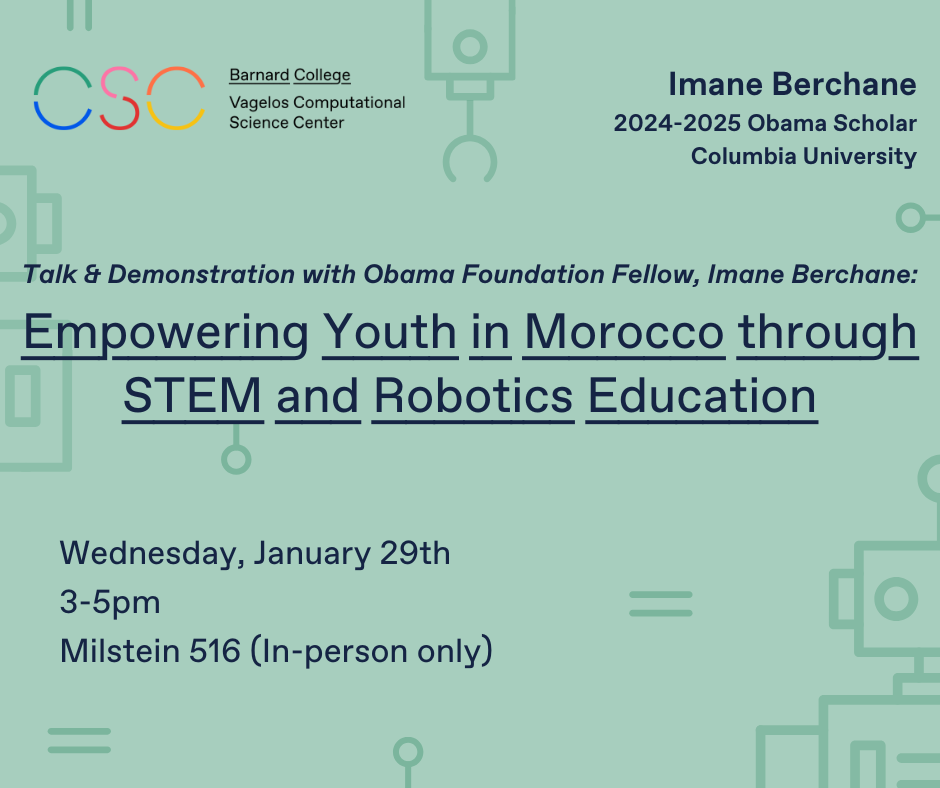
January 29, 2025 | 3:00pm - 5:00pm
In-person / 516 Milstein
In this talk and demo, Imane Berchane shares her ten-year journey into the world of social entrepreneurship and how it can be a powerful tool for positive change in Morocco and in Africa more broadly. She discusses the importance of equipping young people with essential skills and elaborates on the impact it has had on their lives and communities. The talk is followed by a robotics demonstration.
This event is led by Imane Berchane (2024-2025 Obama Scholar, Columbia University; Co-Founder, Robots & More; Co-Founder, LOOP for Science & Technology).
This event takes place in person only (516 Milstein).
For more information about the Barnard CSC, go to https://www.csc.barnard.edu or follow us on Instagram and X (@barnard_csc).
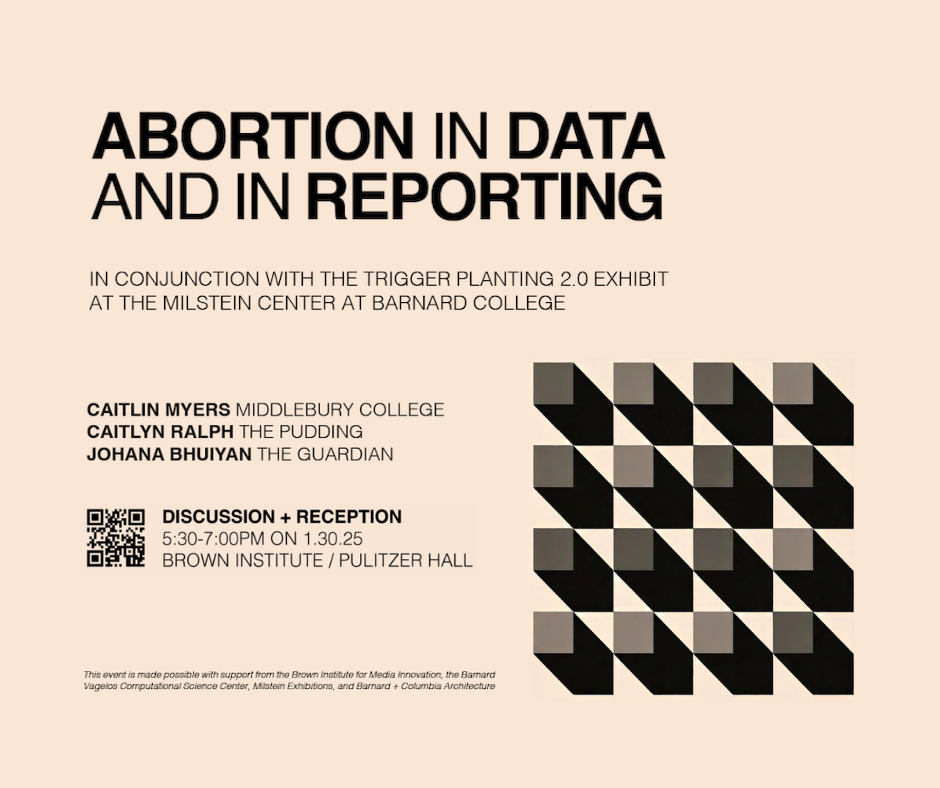
January 30, 2025 | 5:30pm - 7:00pm
Brown Institute for Media Innovation
Inspired by Barnard College’s launch of Trigger Planting 2.0, an exhibition that explores the impact of the 2022 Dobbs vs. Jackson Supreme Court decision on abortion access, this event convenes investigative journalists and researchers who share their experiences reporting on abortion in the US. Panelists discuss how they access, analyze and represent data, and the obstacles they may face while navigating a shifting legal landscape and issues of privacy and security. The conversation also considers stories left out of the frame of mainstream coverage, including challenges faced by underrepresented communities and the informal nature of community care outside of medicalized settings. The panel is followed by a reception.
Panelists:
Caitlin Myers, Middlebury College
Caitlyn Ralph, The Pudding
Johana Bhuiyan, The Guardian
This event is made possible with support from the Brown Institute for Media Innovation, the Barnard Vagelos Computational Science Center (CSC), Milstein Exhibitions, and Barnard + Columbia Architecture
This event takes place in person at The Brown Institute for Media Innovation.
For more information about the Barnard CSC, go to https://www.csc.barnard.edu or follow us on Instagram and X (@barnard_csc).
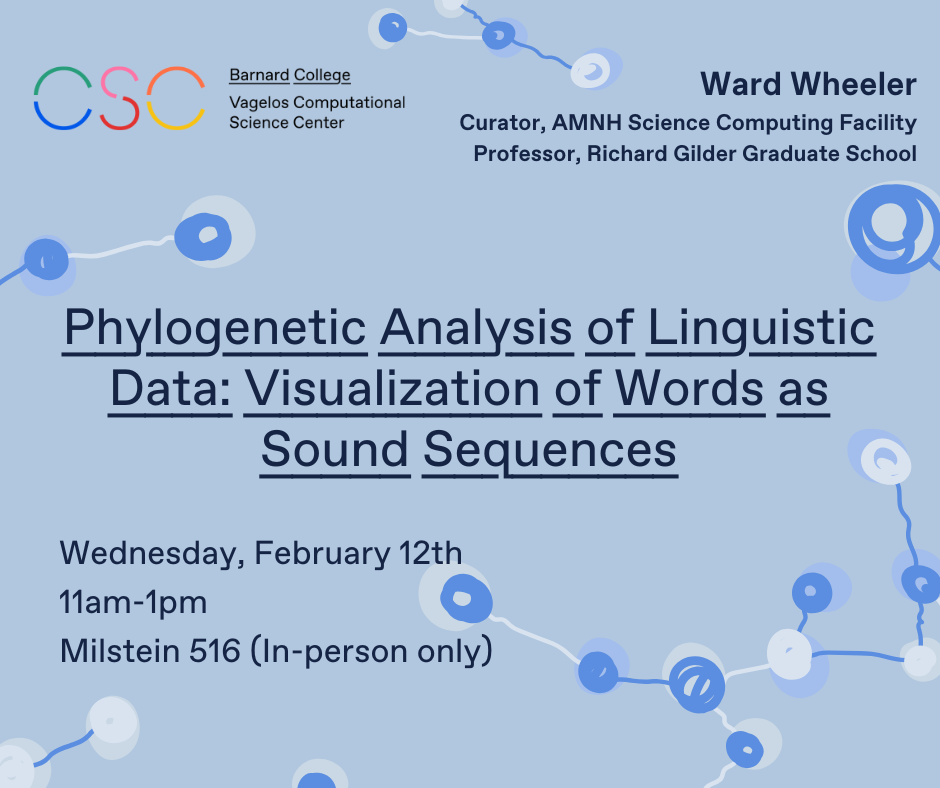
February 12, 2025 | 11:00am - 1:00pm
In-person / 516 Milstein
The presentation discusses aspects of phylogenetic analysis and how it is applied to linguistic data including the algorithms used to create, optimize, and search for phylogenetic graphs. The use case is Indo-European languages. The visualization tool allows users to explore alternate hypotheses of linguistic evolution and their impact on comparative optimality scores. No prior coding knowledge needed.
This workshop is taught by Ward Wheeler (Curator, AMNH Science Computing Facility; Professor, Richard Gilder Graduate School).
This workshop takes place in person only (Milstein 516).
For more information about the Barnard CSC, go to https://www.csc.barnard.edu or follow us on Instagram and X (@barnard_csc).
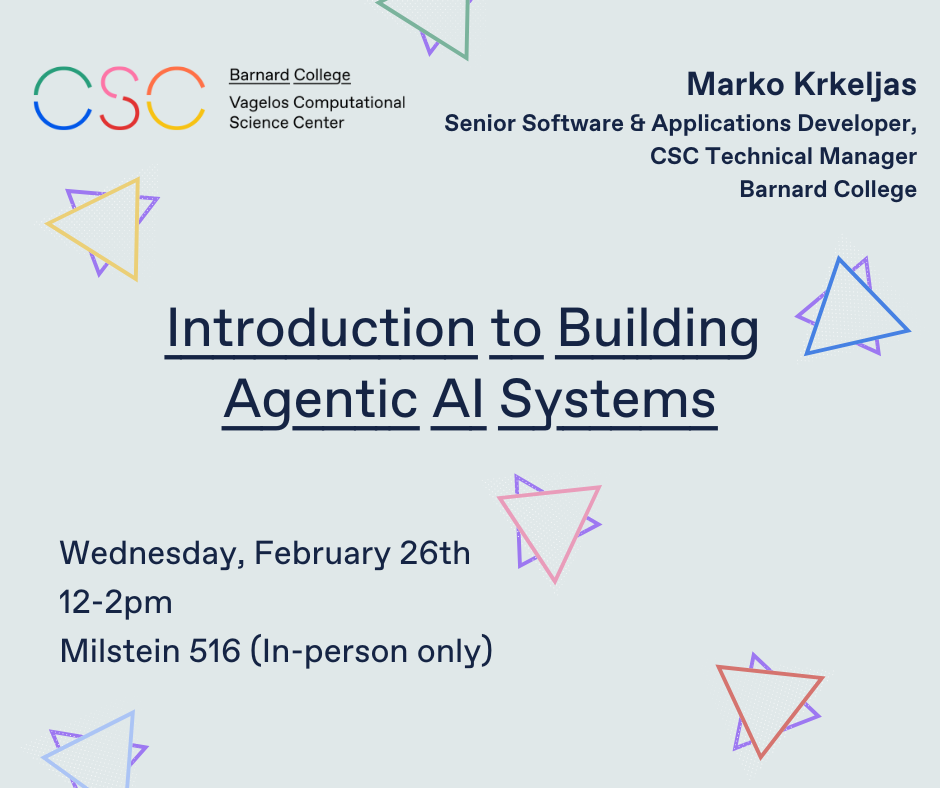
February 26, 2025 | 12:00pm - 2:00pm
In-person / 516 Milstein
The final part of this three-part series introduces building "agentic" AI systems. We explore OpenAI's Assistants API, function calling, and document search.
This workshop is taught by Marko Krkeljas (Senior Software & Applications Developer and CSC Technical Manager, Barnard College).
This workshop takes place in person only (Milstein 516).
For more information about the Barnard CSC, go to https://www.csc.barnard.edu or follow us on Instagram and X (@barnard_csc).
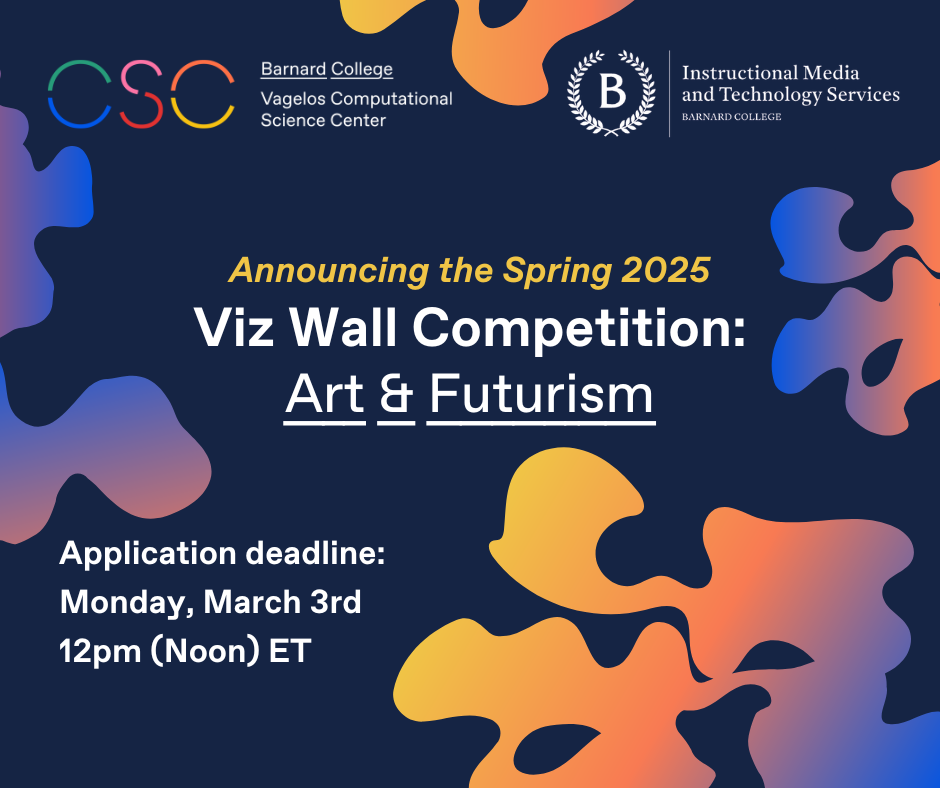
March 3, 2025 | 12:00pm
516 Milstein
Overview
Barnard Academic Technology and the Vagelos Computational Science Center (CSC) are excited to announce the fourth annual Visualization Wall competition with the theme of Art & Futurism. This competition is open to all undergraduate students in any discipline at Barnard and Columbia – the top four winning submissions will receive a $500 grant to develop their proposals. Show us what you’ve got!
We are specifically looking for proposals that thoughtfully engage with ideations about the future. How might social, economic, environmental, medical, and/or other fields look in the future? What are your hopes and curiosities? Your fears and apprehensions? Your proposal should find imaginative ways to showcase your perspective and approach to the future, in any aspect(s) that may resonate with you. Your proposal should also embrace the medium and capacities of the Visualization Wall. Consider the following example sub-topics as a starting point: (1) public interest initiatives; (2) working with public data; (3) envisioning yourself in the future; (4) the future of digital platforms and communications; and (5) analyzing cause and effect among various sectors of a singular community.
Winning proposals will be innovative projects, ranging from data visualizations to immersive storytelling, that push boundaries — you can use Generative AI or design programs, filmmaking, coding, and more to make artistic interventions that explore the relationship between Art & Futurism.
Winners will receive a $500 grant and mentorship to help to develop their proposals. We're keen to see how you can creatively use the Visualization Wall, with its unique touch-sensitive capabilities, to bring your future-inspired visions to life.
-
1 large touch-enabled screen
-
Runs on Windows 10
-
Equipped with speakers
How to enter
Fill out this form by 12pm (Noon) ET on Monday, March 3, 2025.
Timeline
You must upload your proposal by 12pm (Noon) ET on March 3, 2025.
Winners will be selected by the following week. Grantees will be awarded $500 to develop their proposals and receive feedback and mentorship before the showcase.
Questions? Email csc@barnard.edu.
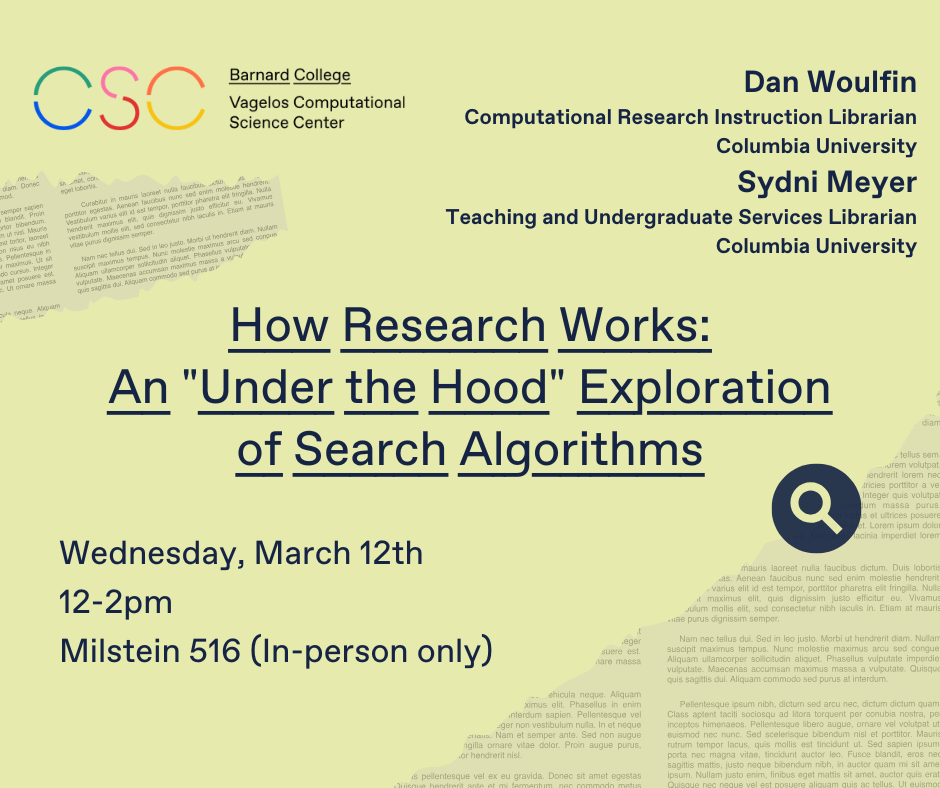
March 12, 2025 | 12:00pm - 2:00pm
In-person / 516 Milstein
Have you ever wondered how library databases produce results, or why one result seems more relevant than another? Join Dan Woulfin, the Computational Research Instruction Librarian, and Sydni Meyer, the Teaching and Undergraduate Services Librarian, from Columbia University Libraries to go "under the hood" of database search through discussion and code. Participants leave this workshop as better researchers with a new understanding of how search works.
Some prior coding knowledge for this workshop may be helpful – but all code is explained step by step, making it accessible for those with little to no coding familiarity while still being engaging for more experienced programmers.
This workshop takes place in person only (Milstein 516).
For more information about the Barnard CSC, go to https://www.csc.barnard.edu or follow us on Instagram and X (@barnard_csc).
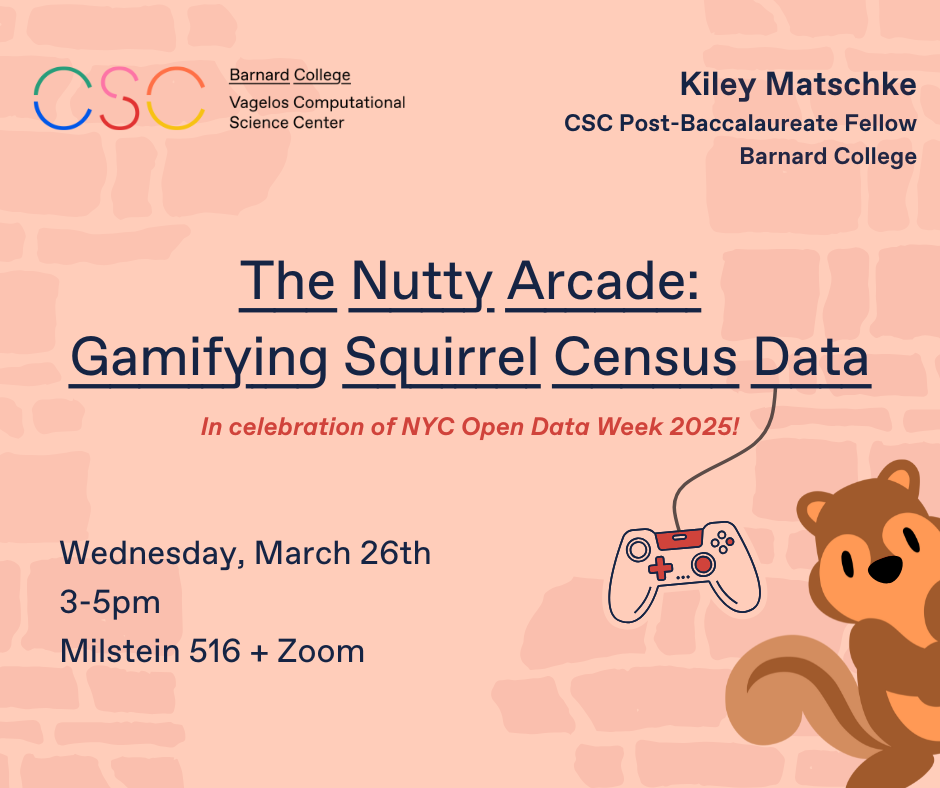
March 26, 2025 | 3:00pm - 5:00pm
Hybrid / 516 Milstein + Zoom
Join us in celebrating NYC Open Data Week by playing with squirrel data! Presented by Kiley Matschke (Post-Baccalaureate Fellow, Barnard College Vagelos Computational Science Center), this workshop explores the intersection of data visualization and gameplay using real NYC squirrel census data. Participants learn how to use the game engine LÖVE to work creatively with data through the lens of game design principles.
This workshop is open to people from all backgrounds and coding levels! Beginner friendly. To follow along, participants may bring a laptop and download Visual Studio Code and the LÖVE game engine (both free!).
This workshop takes place in person (516 Milstein) and on Zoom.
For more information about the Barnard CSC, go to https://www.csc.barnard.edu or follow us on Instagram and X (@barnard_csc).
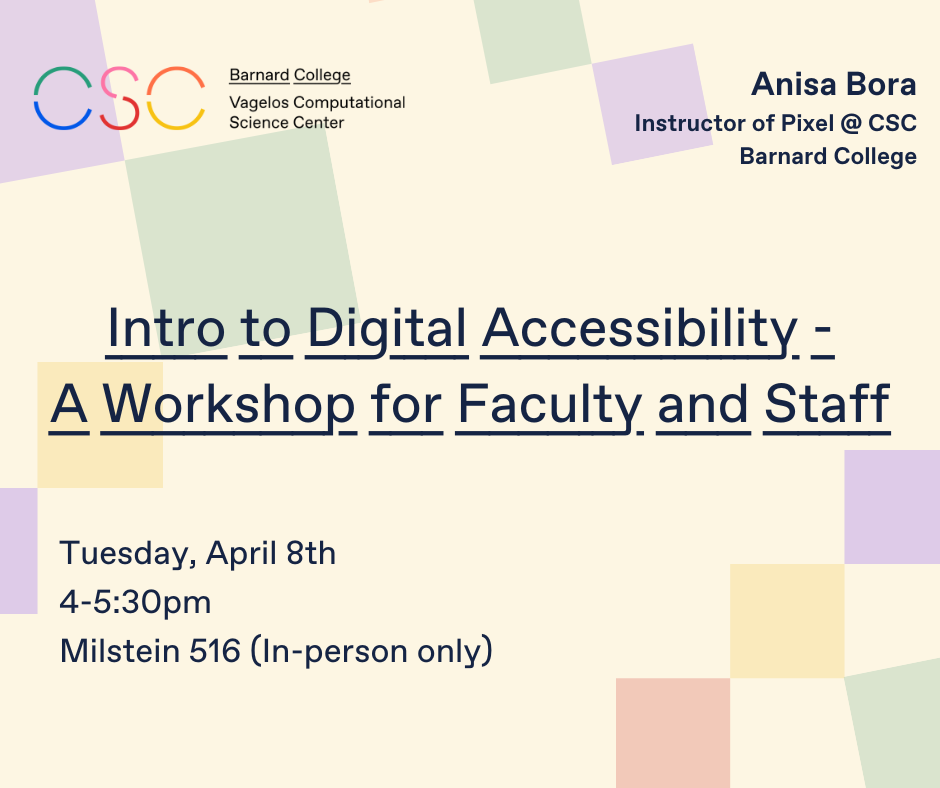
April 8, 2025 | 4:00pm - 5:30pm
In-person / 516 Milstein
Learn about the basics of digital accessibility and explore how to design accessible digital content. Topics explore digital accessibility in relation to color contrast, headings, images, and links. No coding experience is required. Participants bring a laptop to engage in the activity. Please note this workshop is for faculty and staff only. The workshop takes place from 4-5PM. Participants may stay for snacks and mingling from 5-5:30PM.
This workshop is taught by Anisa Bora (Instructor of Pixel @ CSC, Barnard College).
This workshop takes place in person only (Milstein 516).
For more information about the Barnard CSC, go to https://www.csc.barnard.edu or follow us on Instagram and X (@barnard_csc).
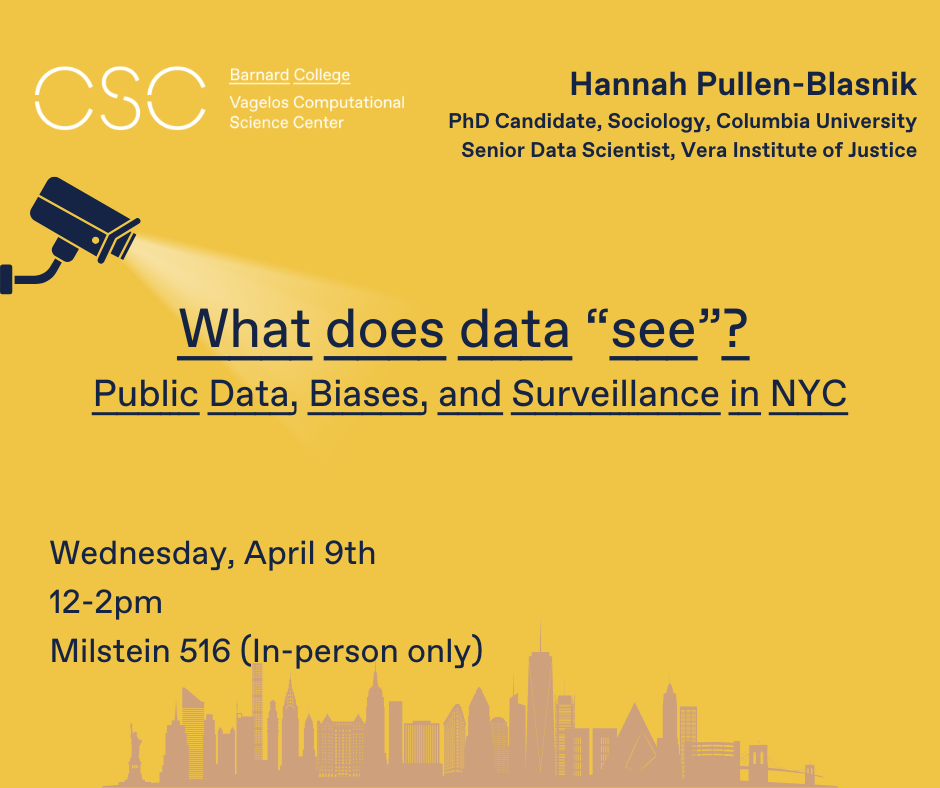
April 9, 2025 | 12:00pm - 2:00pm
In-person / 516 Milstein
This workshop explores public data, its potential biases, and the role of surveillance in shaping urban environments. Looking at data available for New York City, we look at what types of data get collected or left out and how that impacts punishment and regulation. No prior coding experience needed.
This workshop is taught by Hannah Pullen-Blasnik (PhD Candidate, Sociology, Columbia University; Senior Data Scientist, Vera Institute of Justice).
This workshop takes place in person only (Milstein 516).
For more information about the Barnard CSC, go to https://www.csc.barnard.edu or follow us on Instagram and X (@barnard_csc).
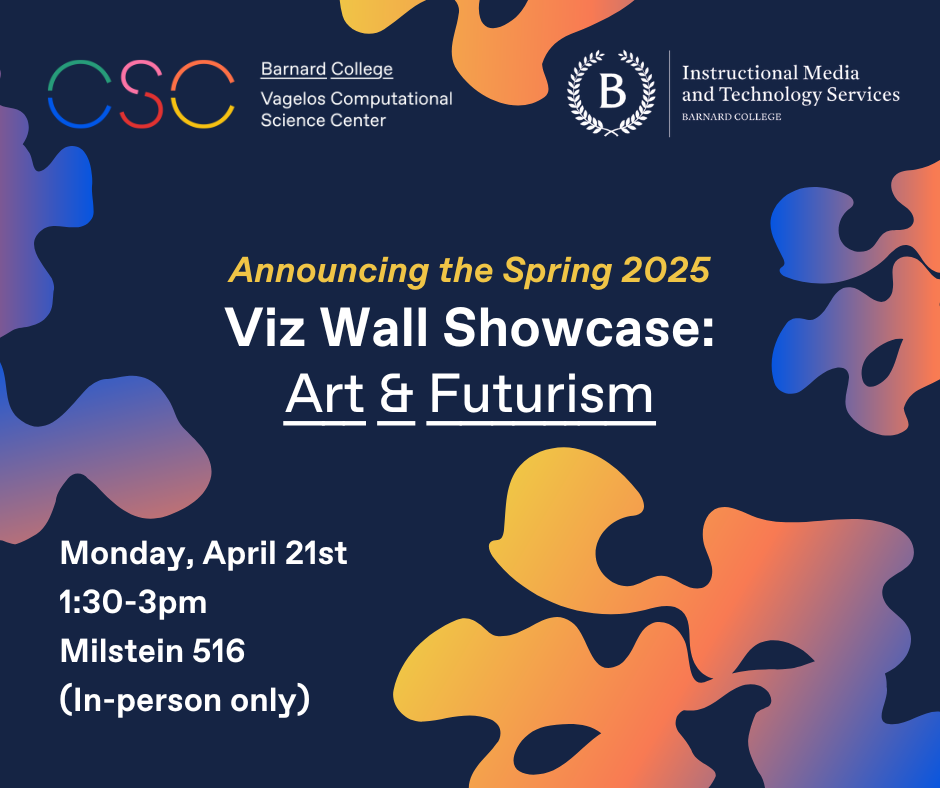
April 21, 2025 | 1:30pm - 3:00pm
In-person / 516 Milstein
Join the CSC and Academic Technology as the Art & Futurism finalists present their interactive projects. The finalists are Anupam Bhakta (CU '25, Mathematics), Chloe Lee (CU '25, CS), Lulu Wang (CU '26, Visual Arts and CS), Gwendolyn Seto (CU '25, Operations Research), and Rayhana Mouaouia (BC '27, Anthropology and CS).
Come by, ask questions, and interact with the wall!
This event takes place in person only (Milstein 516).
For more information about the Barnard CSC, go to https://www.csc.barnard.edu or follow us on Instagram and X (@barnard_csc).
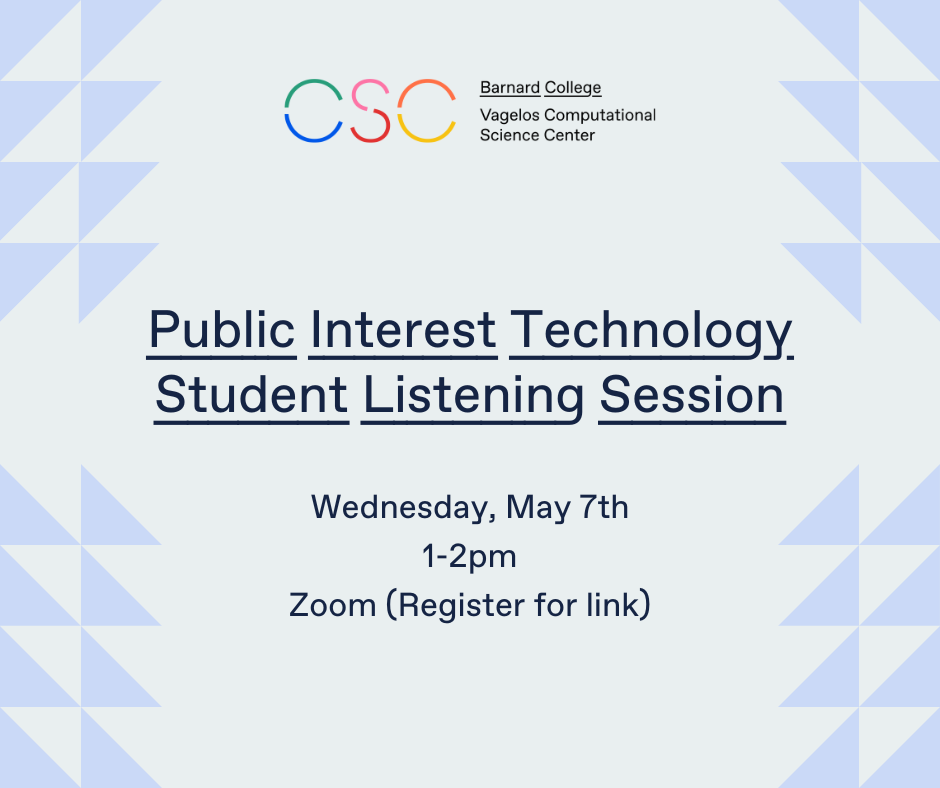
May 7, 2025 | 1:00pm - 2:00pm
Zoom
The CSC is hosting a one-hour focus group to hear from students about how our center can better support public interest technology (PIT) initiatives at Barnard College. If you are interested in the design, deployment, application or governance of technology for the public good, we invite you to share your thoughts!
This event takes place on Zoom only.
For more information about the Barnard CSC, go to https://www.csc.barnard.edu or follow us on Instagram and X (@barnard_csc).
2023-2024 Academic Year
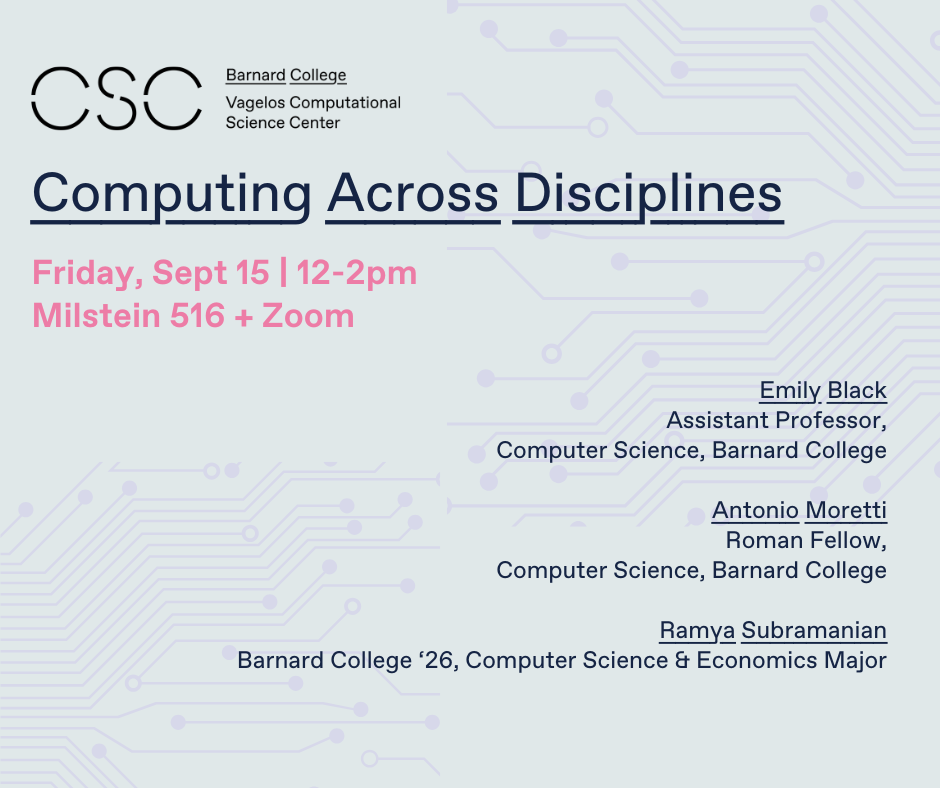
September 15, 2023 | 12:00pm - 2:00pm
Hybrid / 516 Milstein + Zoom
Welcome back!
We're kicking off our workshop series for the year with an exciting introductory workshop featuring three folks working in Computer Science. Each presenter gives 30 to 45 minute overviews of how they use and apply computing to topics across disciplines.
Presenters and topics include:
Algorithmic Fairness and its Applications to Law and Policy, Emily Black, Assistant Professor of Computer Science @ Barnard College
Prof. Black is new faculty at Barnard and her research is about algorithmic fairness and machine learning (ML). This presentation gives a brief overview of what algorithmic fairness is and then describes Prof. Black's current project, which is to highlight recent research showing how there are many interchangeable ML models for every prediction task. Namely, this work shows that are several easily-discoverable models with similar accuracy, but different levels of discrimination across demographic groups, and shows how to translate this research into proposed updates to anti-discrimination law (the disparate impact standard).
Monte Carlo Methods for Reconstructing Jet Structures in Particle Physics, Antonio Moretti, Roman Fellow in Computer Science @ Barnard College
This presentation discusses the use of Monte Carlo methods in analyzing data generated by experiments at the Large Hadron Collider at CERN.
Learning About Database Applications, Ramya Subramanian, BC ' 26, majoring in Computer Science and Economics
Ramya gives an overview of a project she's working on with Columbia University faculty, which is developing an open-source suite of cyberinfrastructure tools, called the Decision Engine for Socioeconomic Disaster Risk (DESDR), to fill data voids by collecting and cleaning disaster risk data directly from affected populations from natural disasters. Learn how the DESDR model incorporates databases through Typescript, Svelte, and DBT. This application is useful because it is a reproducible model that allows farmers to input their own data files and create an interactive model to view insurance payouts and other such charts.
This workshop takes place in person (516 Milstein) and on Zoom.
For more information about the Barnard CSC, go to https://www.csc.barnard.edu or follow us on Instagram and Twitter (@barnard_csc).
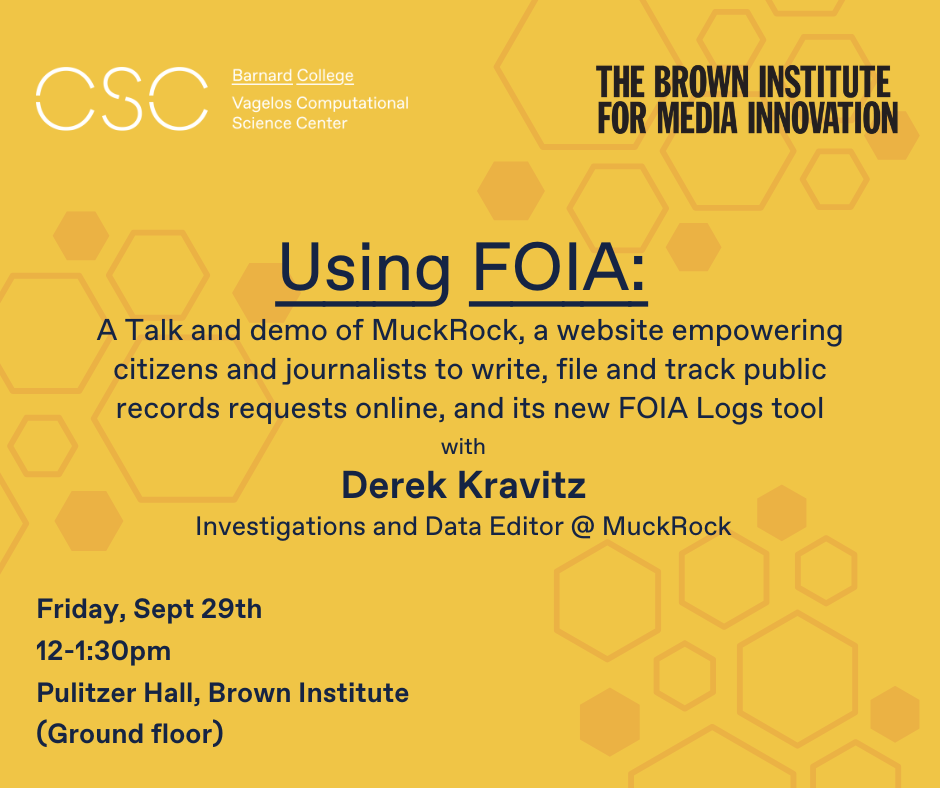
September 29, 2023 | 12:00pm - 1:30pm
The Brown Institute, Pulitzer Hall (Ground Floor), Columbia University School of Journalism
Using FOIA: A Talk and Demo of MuckRock, a website empowering citizens and journalists to write, file and track public records requests online, and its new FOIA Logs tool with Derek Kravitz, Investigations and Data Editor at MuckRock
This talk and demonstration is an invitation to play, experiment with, and learn about MuckRock, an open-source web transparency platform that assists citizens in preparing, filing, and tracking public record requests to government agencies. The site enables users to access government documents and data covered by the Freedom of Information Act (FOIA) and state open-records laws, ensuring that citizens can acquire information vital to the functioning of their government. As part of the training, participants are given a tour of a new service launching from MuckRock called FOIA Logs, which allows users to lookup, review, and download previous FOIA requests placed to various departments and agencies across the government. Learn about the interface, discover how the site integrates NLP and Machine Learning principles, and understand how the tools might impact your workflow as a journalist and storyteller.
Leading the session is Derek Kravitz, MuckRock's investigations and data editor. With an illustrious career that includes roles as research director at ProPublica, and stints at The Wall Street Journal, The Associated Press, and The Washington Post, Kravitz brings a wealth of experience. He has been recognized multiple times for his contributions to journalism, being a two-time Livingston Award finalist, participating in three Pulitzer Prize finalist teams, and having projects he edited or reported on receive numerous accolades. Derek's endeavors also extend to grant-funded initiatives through Columbia and Stanford's Brown Institute for Media Innovation, as well as the founding of the Documenting COVID-19 project and the MISSING THEM project at THE CITY.
Co-hosted by The Vagelos Computational Science Center (CSC) at Barnard College and The Brown Institute at Columbia Journalism School
__________________________________________________________________________________
This event takes place in person at the Brown Institute in Pulitzer Hall (Columbia Journalism School).
For more information about the Barnard CSC, go to https://www.csc.barnard.edu or follow us on Instagram and X (@barnard_csc).
For more information about the The Brown Institute at Columbia Journalism School, go to https://brown.columbia.edu or follow them on X (@BrownInstitute).
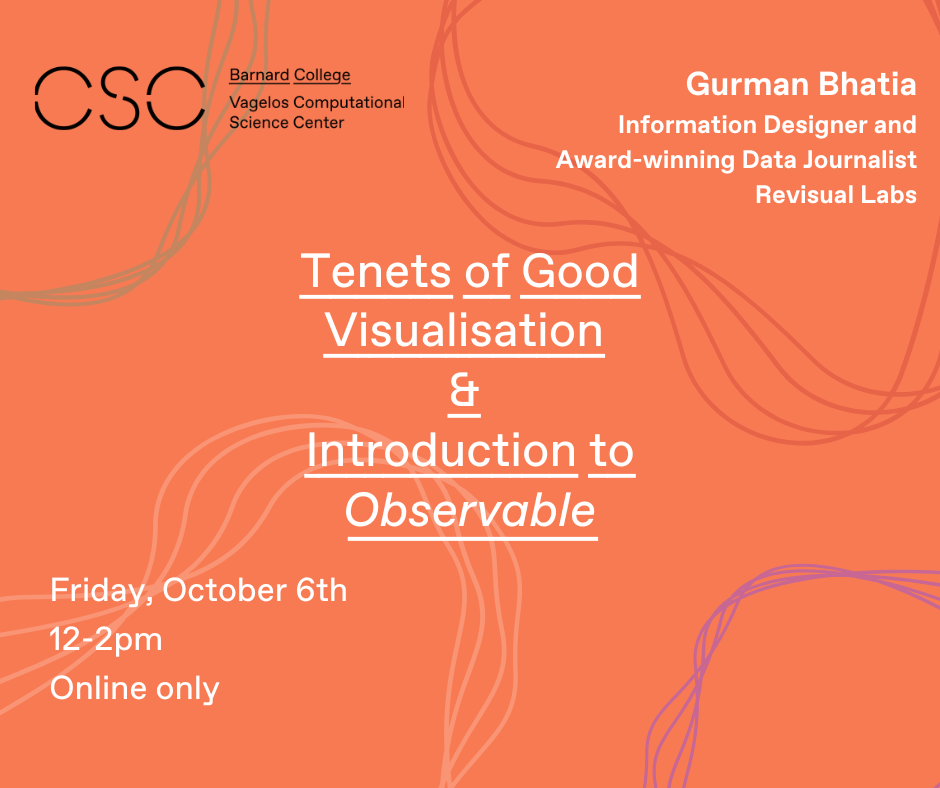
October 6, 2023 | 12:00pm - 2:00pm
Zoom
What makes a good chart? How can you ideate the right chart for the story you want to tell? Which charts call for bespoke solutions? When is it good to follow the rules and when is it good to break them? We answer these questions and more, and introduce you to Observable for quick prototyping and exploratory data visualizations.
This workshop is led by Gurman Bhatia, information designer, data visualization trainer, award-winning data journalist, and Director of Revisual Labs.
This workshop takes place on Zoom only.
For more information about the Barnard CSC, go to https://www.csc.barnard.edu or follow us on Instagram and Twitter (@barnard_csc), and Facebook.
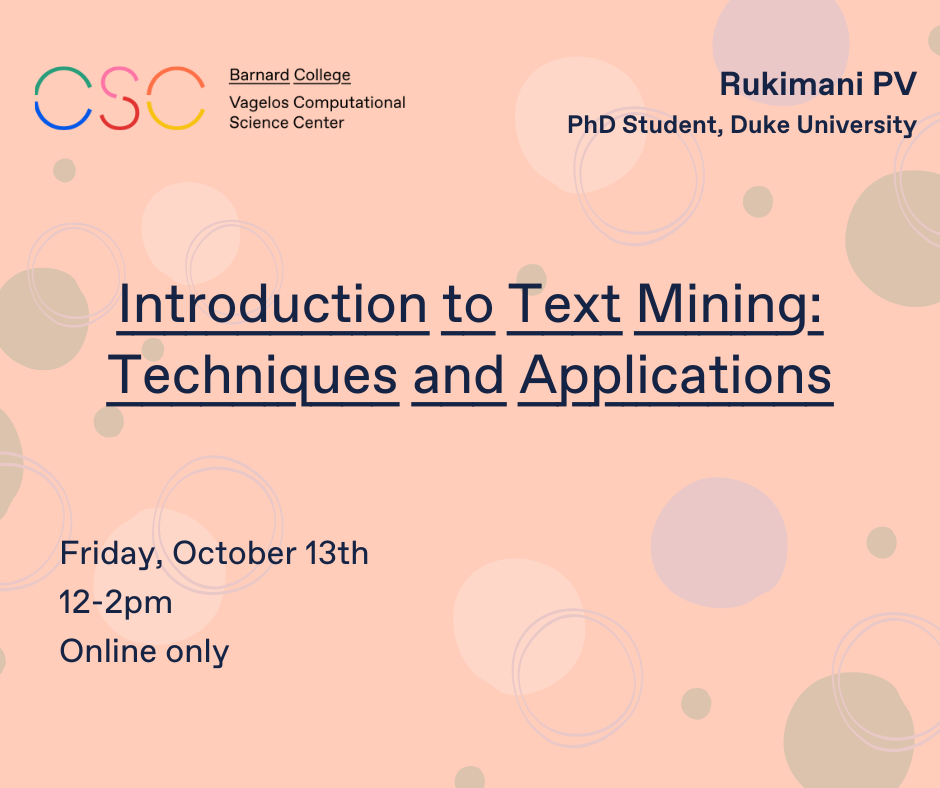
October 13, 2023 | 12:00pm - 2:00pm
Zoom
What is text mining? Text mining has become a popular technique for data analysis both in industry and the academic sector. This beginner-friendly workshop introduces the basics of text-mining, explores pre-processing techniques, and leaves attendees with the basic tools to get started in text analysis for their own work. This workshop is great for those in the humanities and social sciences who are interested in incorporating more technological methods in their work as a tool for understanding. No coding experience needed.
Rukimani PV is a PhD student in Literature at Duke University focusing on critical race theory. They have a background in Computer Science and work at the intersection of CS and Critical Technology Studies, including anti-surveillance work.
Workshop Level: Beginner
Requirements: Basic Knowledge Python + Laptop (with the ability to install software)
Schedule:
12:00 PM - 12:30 PM: Introduction: What is Text Mining?
12:30 PM - 1:15 PM: Demo of Text-Mining
1:15 PM - 1:30 PM: Wrap-Up + Applications of Text-Mining in Digital Humanities Research/Social Sciences
This workshop takes place on Zoom only.
For more information about the Barnard CSC, go to https://www.csc.barnard.edu or follow us on Instagram and X (@barnard_csc).
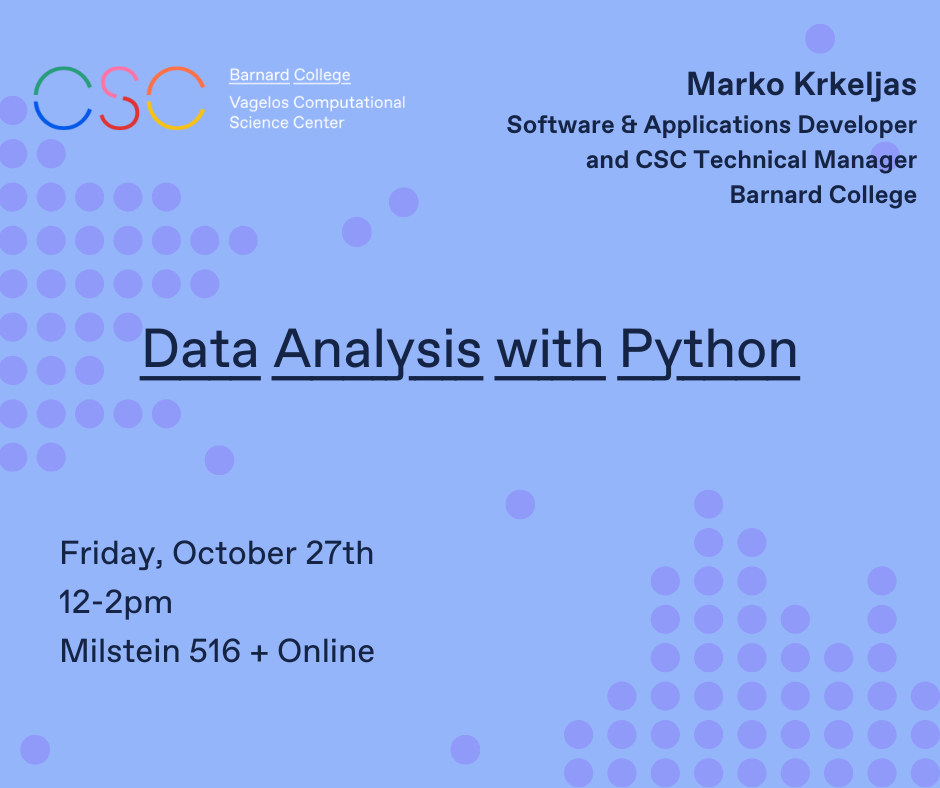
October 27, 2023 | 12:00pm - 2:00pm
Hybrid / 516 Milstein + Virtual
Join Marko Krkeljas, Sr. Software & Applications Developer and CSC Technical Manager, on learning the basics of data analysis using Python. This workshop covers commonly used data and visualization tools in the Python ecosystem. It also covers basic statistics, problem solving techniques, and making predictions.
This workshop takes place in person (516 Milstein) and on Zoom.
For more information about the Barnard CSC, go to https://www.csc.barnard.edu or follow us on Instagram and X (@barnard_csc).
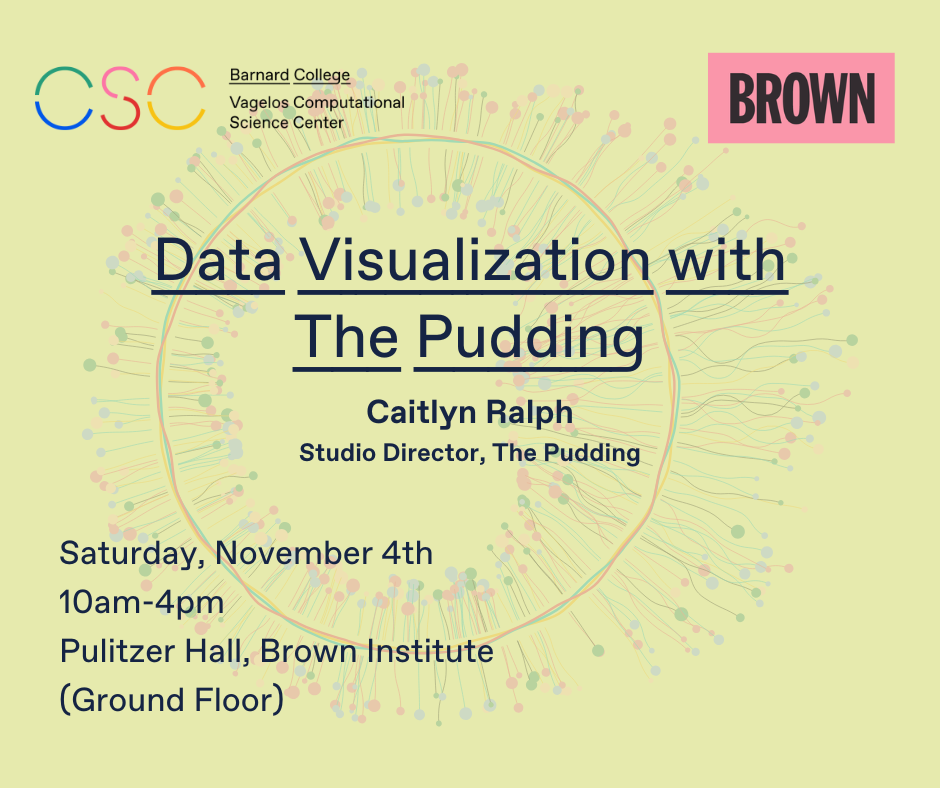
November 4, 2023 | 10:00am - 4:00pm
In-person / Pulitzer Hall, Brown Institute (Ground Floor)
Graphical (or pictorial) presentations of data have become an almost essential part of journalistic practice. Data visualization helps us see patterns in data and is an important tool for finding stories. Over the past decade, major outlets including The New York Times, Washington Post, and Reuters are publishing data visualizations that push the idea of storytelling, creating new data-driven ways to inform and entertain. Alongside these graphics are newsrooms based entirely on data visualization, including the Kontinentalist and The Pudding.
In this day-long workshop co-sponsored by the Brown Institute and Barnard Vagelos Computational Science Center, members of The Pudding immerse participants in their tried-and-true design process, segmented into four stages: story, data, design, and development. The session begins with Story, a throughline that should resonate with all participants of the program. As we’ve all experienced, the strongest visualizations are those with equally strong narratives. Diving deeper, students are introduced to the realm of Data. Using curated datasets around key topics, students seek to uncover the nuances of integrating specific, meaningful data with their narratives. The emphasis then shifts to the visual canvas, focusing on the core elements of Design. The goal is to ensure that every story is captivating both visually and narratively. And culminating the day is a glimpse into Development. While the intricacies of programming might remain in the backdrop, attendees understand and appreciate the development scaffolding that turns their narratives and designs into dynamic interactive features.
This event is only able to accommodate 24 students.
About the Presenters
Caitlyn Ralph is the Studio Director at Polygraph. She likes film photography, running, Animal Crossing, a band called Inhaler, and a K-pop group called Stray Kids. Mostly Stray Kids. Mostly Jeongin. 🦊🐶🐁 You can follow her on the socials or check out her website. She has worked on seven stories to date.
Alvin Chang is an assistant professor of Journalism and Design at the New School. He’s a data and visual journalist who has worked in several newsrooms, most recently as Head of Visuals and Data at Guardian US. His work as a journalist often combines deep reporting with data analysis to help readers clearly understand the world around them. His stories often show how small decisions accrue into invisible problems like discrimination, segregation, and ultimately dehumanization. And he makes those things visible using data viz, interactives, cartoons, and videos.
This workshop takes place in person at Pulitzer Hall, Brown Institute (Ground Floor).
For more information about the Barnard CSC, go to https://www.csc.barnard.edu or follow us on Instagram and X (@barnard_csc).
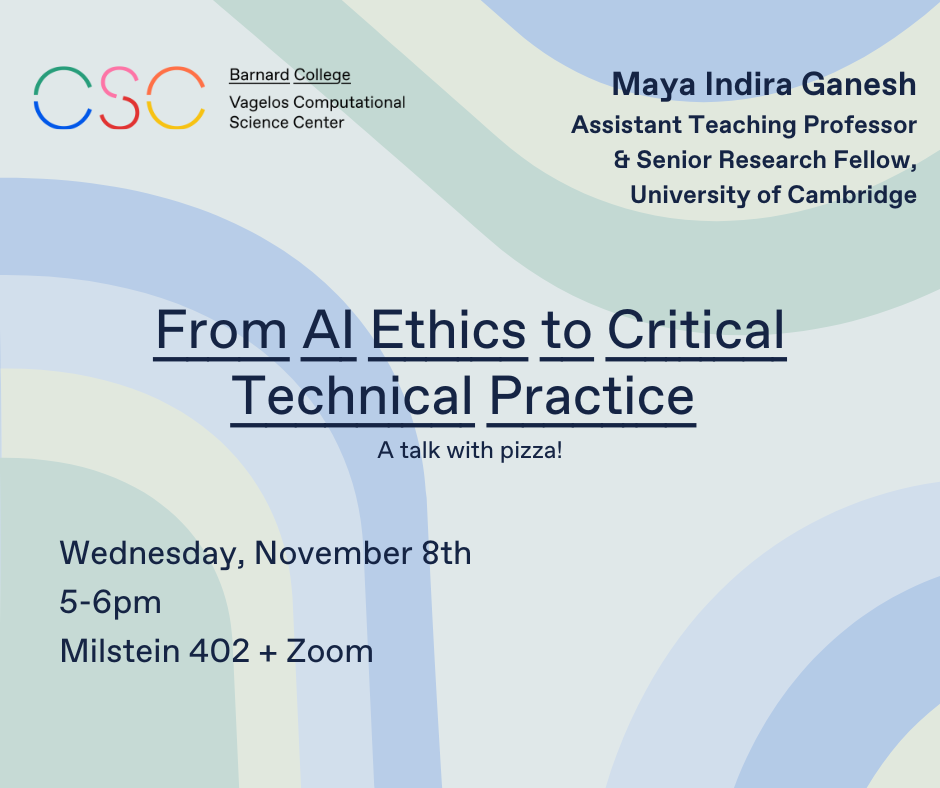
November 8, 2023 | 5:00pm - 6:00pm
Hybrid / Milstein 402 + Virtual
This talk traces a brief history of the academic-industrial conceptual formation of ‘AI ethics’ and evaluates its purchase at a moment when AI is poised to become its own ethicist and regulator. As a critical feminist practitioner and scholar bringing Humanities and Social Sciences scholarship to working professionals keen to build ethical AI, Maya Indira Ganesh -- assistant teaching professor and senior research fellow at the University of Cambridge -- argues that ‘AI Ethics’ should be translated and transformed into a critical technical practice.
This talk takes place in person (Milstein 402) and on Zoom.
For more information about the Barnard CSC, go to https://www.csc.barnard.edu or follow us on Instagram and X (@barnard_csc).
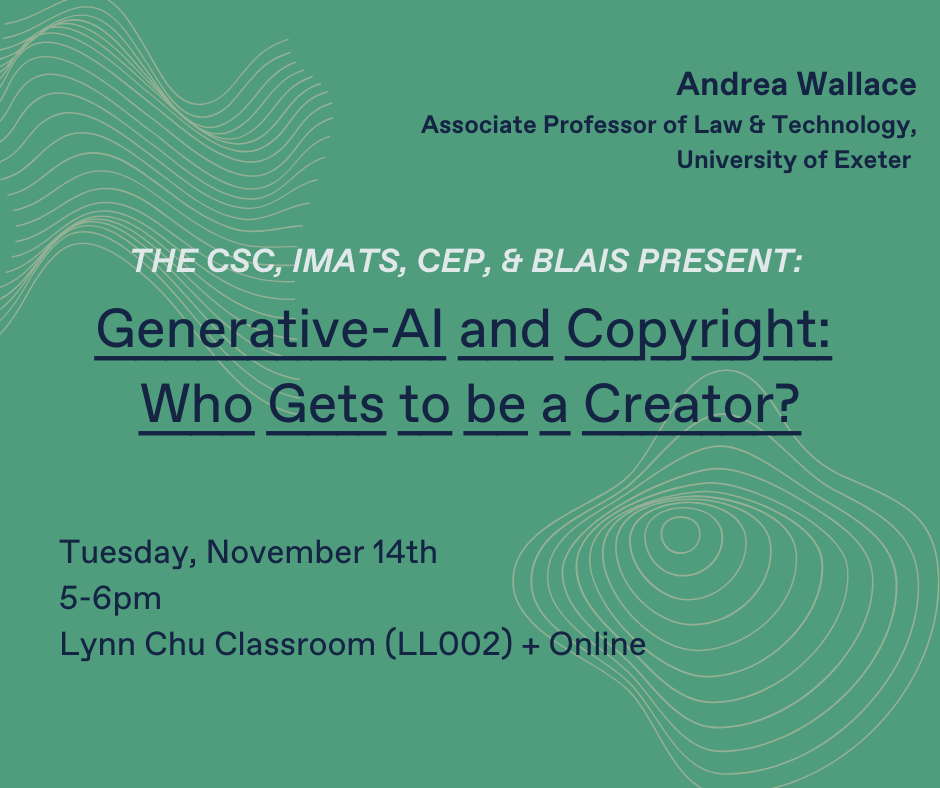
November 14, 2023 | 5:00pm - 6:00pm
Hybrid / Lynn Chu Classroom (LL002) + Virtual
Generative-AI is here to stay, impacting everything from the markets for human- and AI-generated works to who gets to be a creator under copyright law. A Midjourney image recently won first prize at the Colorado State Fair, beating out dozens of submissions by human-creators. Getty has launched a “commercially safe” image generator trained on the large corpus of images made by Getty’s artists and photographers. Adobe has built AI generators for Photoshop, promising “accountability, responsibility and transparency” in their announcement for a range of new AI-driven tools. But are AI-generated works protected by copyright? Should they be? And what about the human-creators whose works are used to train AI? Do AI companies violate these copyrights when developing generative-AI tools?
Courts are grappling with these questions across the globe. Lawsuits against AI companies will soon reveal whether exceptions in copyright law, like fair use or text and data mining, permit the use of copyright-protected works by AI systems. Should the human-creators win, the effect may be that AI companies are required to license creative works en masse for AI training. What might be the follow-on impacts for creative industries and the market for creative works? What new barriers to entry might arise for smaller tech companies with limited resources to spend on licensing for new AI-technology development? What will be the impact for consumers, both in terms of competition and diversity in AI technologies, as well as the outputs they produce?
Fortunately, in-copyright creative works are not the only materials available for training. A growing corpus of public domain works unrestricted by copyright is being published as part of an open GLAM movement (Galleries, Libraries, Archives and Museums). Globally, at least 1,616 cultural institutions have published more than 95 million digital surrogates of public domain works for unfettered reuse. These range from digital surrogates of books, sculptures, paintings, drawings, scientific illustrations, music, letters, and other creative works, to transcriptions, descriptions, collections data, provenance data, metadata. Given copyright’s long term of protection, the demographic of this public domain reveals many of the biases that advocates for critical approaches to AI have fought diligently to expose in large image and language models. How might biases long-embedded in our cultural collections be operationalised for AI, leading to similar harms and outcomes that we know to be present?
This session begins with a talk to problematize generative-AI through the lens of copyright. We explore power imbalances in the data, technology and capital required to develop and shape AI, the (un)fairness of using human-creators’ works to train AI systems, and ask who shares (or not) in the profits—and how? We also ask: could the underlying justifications for copyright shape new policies that result in more equitable outcomes? We think about policy making in practice using copyright’s (alleged) goals to decide: what to do with generative-AI?
- Nuria Rodrïguez-Ortega. (2018). “Canon, Value and Cultural Heritage: New Processes of Assigning Value in the Postdigital Realm,” Multimodal Technologies and Interaction 2(2)
- Authors Alliance. (2018). “Amanda Levandowski on Fair Use for Fairer AI”
- Pamela Samuelson. (2023). “Generative AI meets copyright,” Science 981(6654), (or podcast option)
- Creative Commons. (2023). “Making AI Work for Creators and the Commons”
Andrea Wallace is an Associate Professor of Law & Technology at the University of Exeter in the UK. Her work examines the role of law and technology in transforming how we understand, consume and disseminate art and cultural heritage in the digital realm.
This talk takes place in person (Lynn Chu Classroom LL002) and on Zoom.
For more information about the Barnard CSC, go to https://www.csc.barnard.edu or follow us on Instagram and X (@barnard_csc).
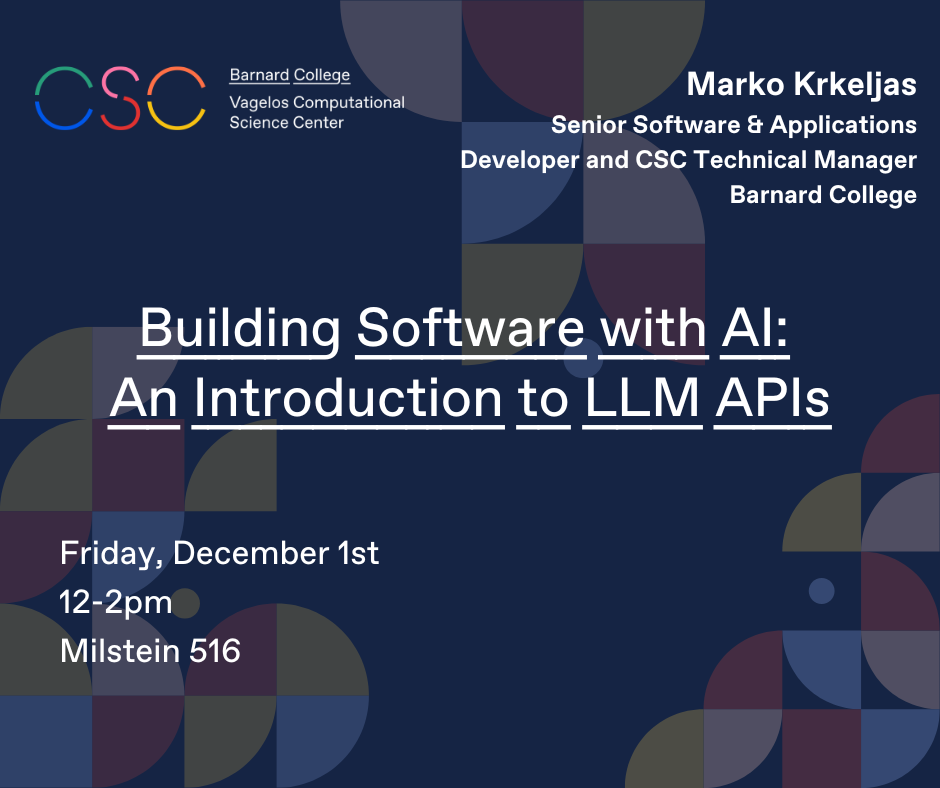
December 1, 2023 | 12:00pm - 2:00pm
In-person / 516 Milstein
Explore the use of Large Language Models (LLMs) in software development. We focus on steering models with prompt engineering, differences between 'instruct' and 'completion' models, streaming responses, and function calling. Prior experience with Python is recommended.
This workshop takes place in person only (516 Milstein).
For more information about the Barnard CSC, go to https://www.csc.barnard.edu or follow us on Instagram and X (@barnard_csc).
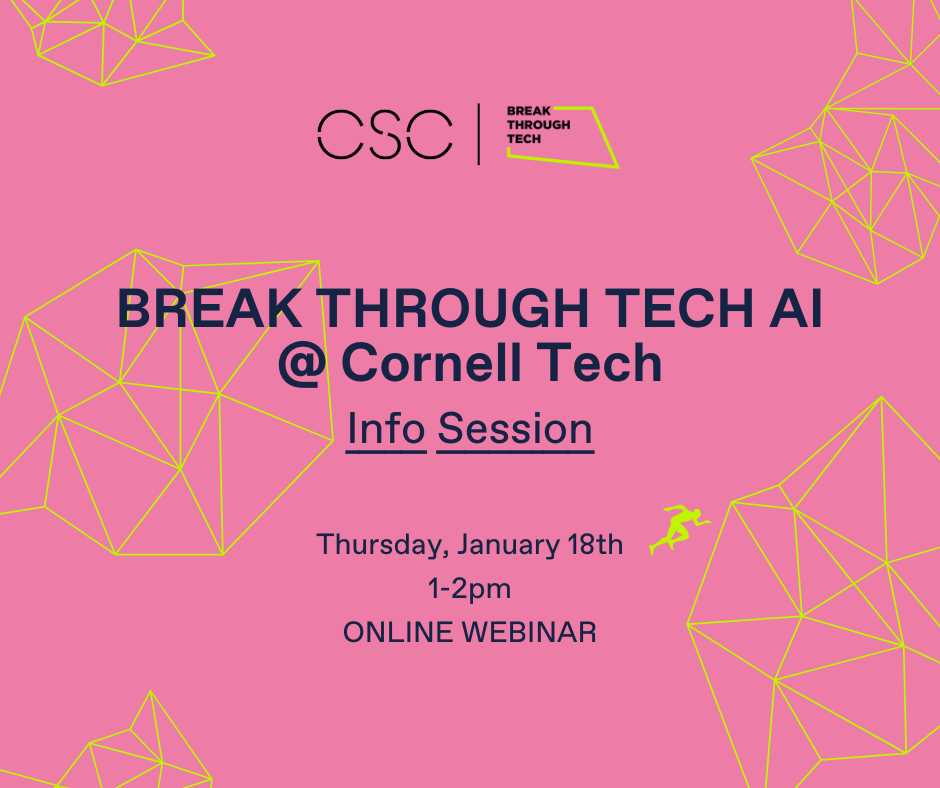
January 18, 2024 | 1:00pm - 2:00pm
Virtual
Join the Break Through Tech AI team on for a Virtual Information Session covering key details about the 2024/25 program which begins in June 2024!
Break Through Tech AI, an initiative of Cornell Tech, is a paid, 1-year extracurricular experience that helps undergraduate college women (trans and cis), nonbinary, and other underrepresented groups in tech gain the skills they need to get jobs in data science, machine learning, and artificial intelligence.
The program includes an online Machine Learning course over the summer, followed by industry challenges and mentorship and career coaching during the Fall and Spring - all meant to help you launch your career in AI and Machine Learning. All accepted participants who successfully complete the program receive a $2,000 award.
Apply by February 5 for priority admission, and register HERE for the January 18 Information Session.
This event takes place online only.
For more information about the Barnard CSC, go to https://www.csc.barnard.edu or follow us on Instagram and X (@barnard_csc).
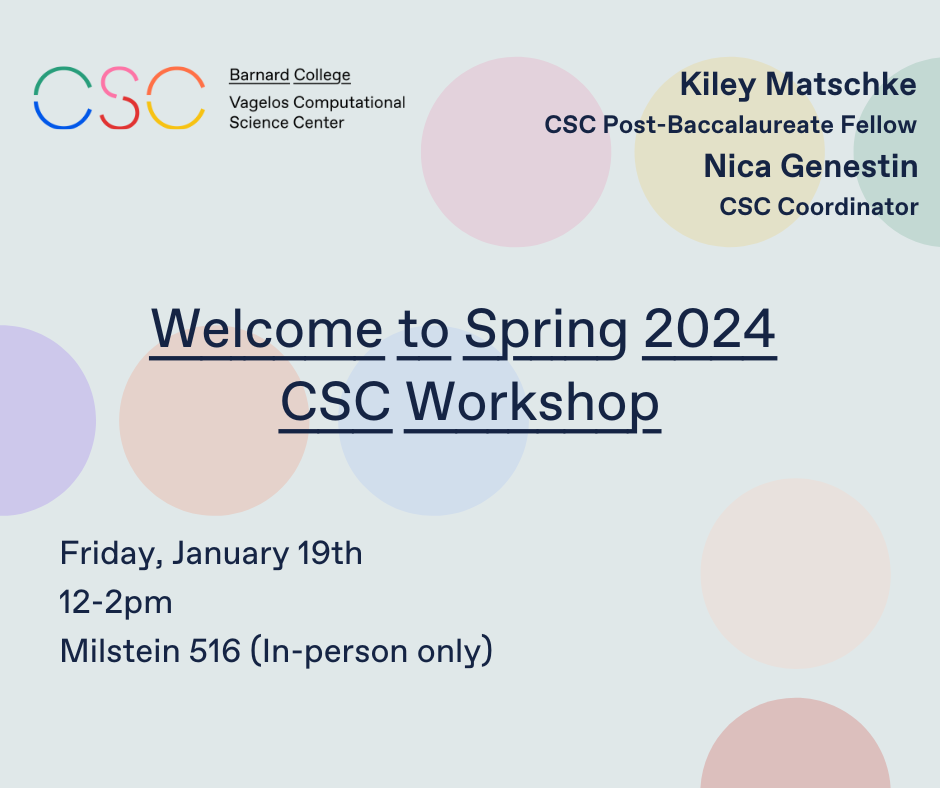
January 19, 2024 | 12:00pm - 2:00pm
In-person / 516 Milstein
Kick off the Spring Semester with a warm welcome back to the CSC! Join us for beginner friendly coding games, take part in our Python coding quiz for a chance to win exciting prizes, and grab some snacks!
This workshop is led by Kiley Matschke (CSC Post-Baccalaureate Fellow) and Nica Genestin (CSC Coordinator).
This workshop takes place in person only (516 Milstein).
For more information about the Barnard CSC, go to https://www.csc.barnard.edu or follow us on Instagram and X (@barnard_csc).
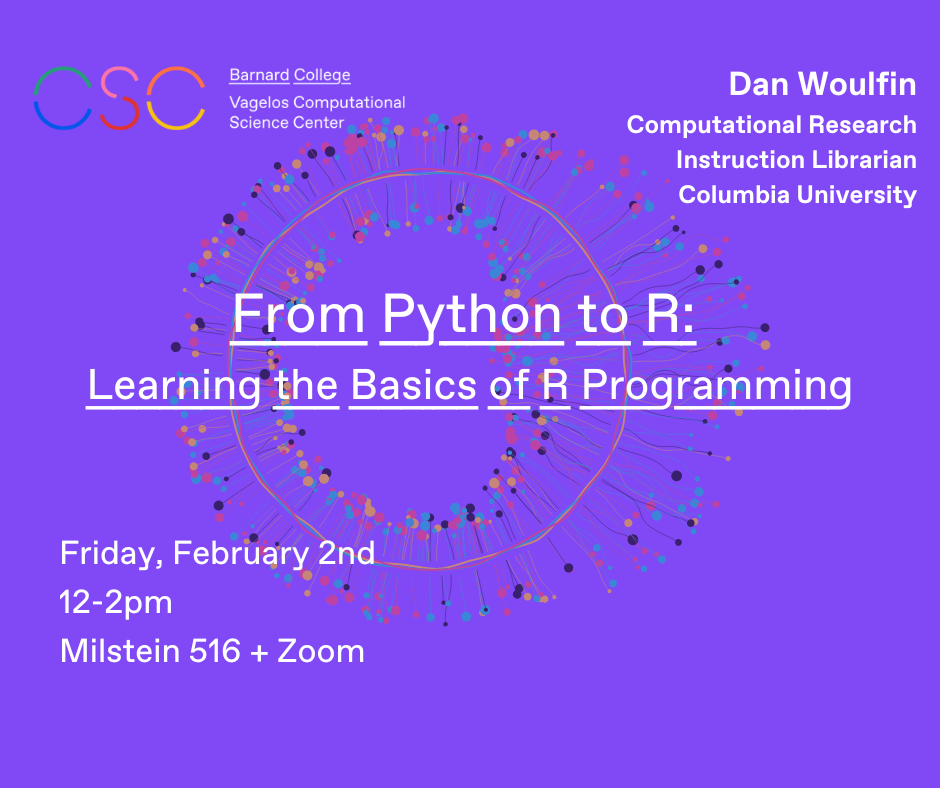
February 2, 2024 | 12:00pm - 2:00pm
Hybrid / 516 Milstein + Zoom
This workshop explores the basics of the R programming language from a Python user's perspective, paying particular attention to some of the structural, as well as syntactic and idiomatic differences between the two languages. We look at R's strengths and weaknesses with the goal of exposing non-R users to the language using practical hands-on exercises. Suitable for beginning/novice programmers but based on the practicalities of working with real-world data.
This workshop is taught by Dan Woulfin, Ph.D., M.L.S., Computational Research Instruction Librarian at Columbia Libraries.
Dan Woulfin is currently the Computational Research Instruction librarian at Columbia University Libraries. Prior to this position, he was the Senior Data Associate at Global TIES for Children, an international social science research center at NYU. There, he worked daily in R which he used to curate, clean, wrangle and engineer research data throughout the research data lifecycle and to prepare for archiving. He is also a coauthor of 'rddi', an R package on CRAN, and an accompanying shiny application, 'diyddi'.
This workshop takes place in person (516 Milstein) and on Zoom.
For more information about the Barnard CSC, go to https://www.csc.barnard.edu or follow us on Instagram and X (@barnard_csc).
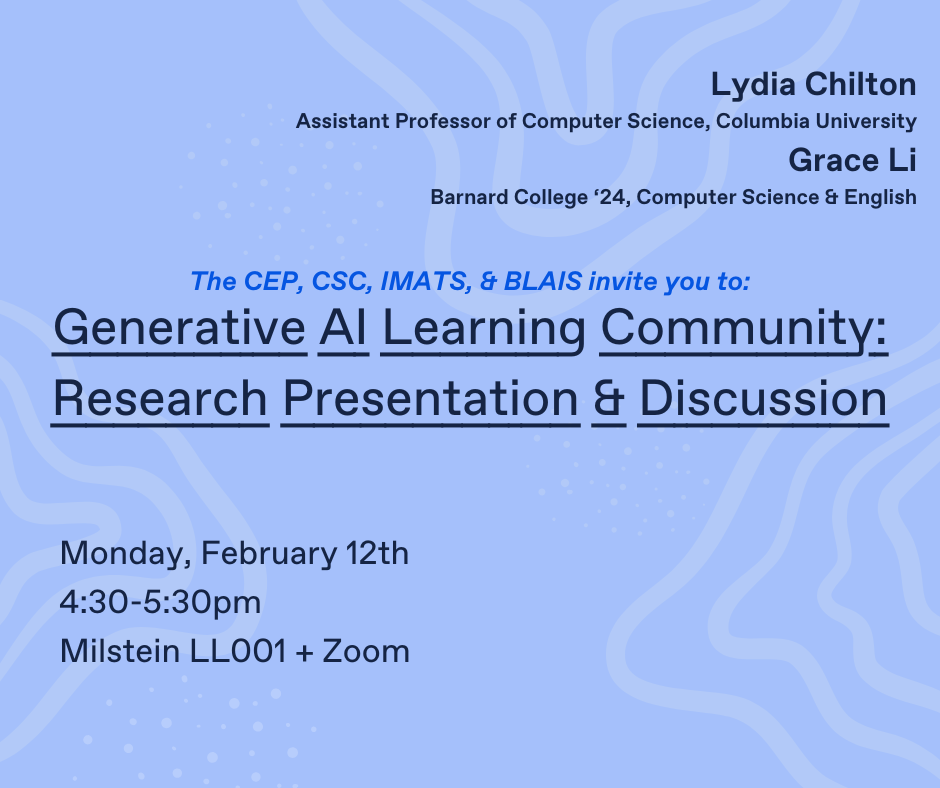
February 12, 2024 | 4:30pm - 5:30pm
Hybrid / LL001 Milstein + Zoom
In this Generative AI Learning Community session (co-hosted by the CSC, CEP, IMATS, and BLAIS), Prof. Lydia Chilton and Grace Li BC '24 share their research on on how AI tools can support science communication on social media. There is ample time for questions and discussion with the audience. You can find a description of Prof. Chilton and Grace Li's research below.
In this project, we focus on how we can build AI-tools to support science communication on social media. We explore Tweetorials, in which we help scientists communicate STEM topics in a more engaging and accessible way through Twitter threads. Our research focuses on three different areas of support for Tweetorial writing: Topic Scoping, Hook Generation, and Narrative Structure Generation. Through Tweetorials, we focus on specific aspects of the writing process that people often struggle with when trying to make scientific writing more engaging and reduce the cognitive load of brainstorming.
This event takes place in person (LL001 Milstein) and on Zoom.
For more information about the Barnard CSC, go to https://www.csc.barnard.edu or follow us on Instagram and X (@barnard_csc).
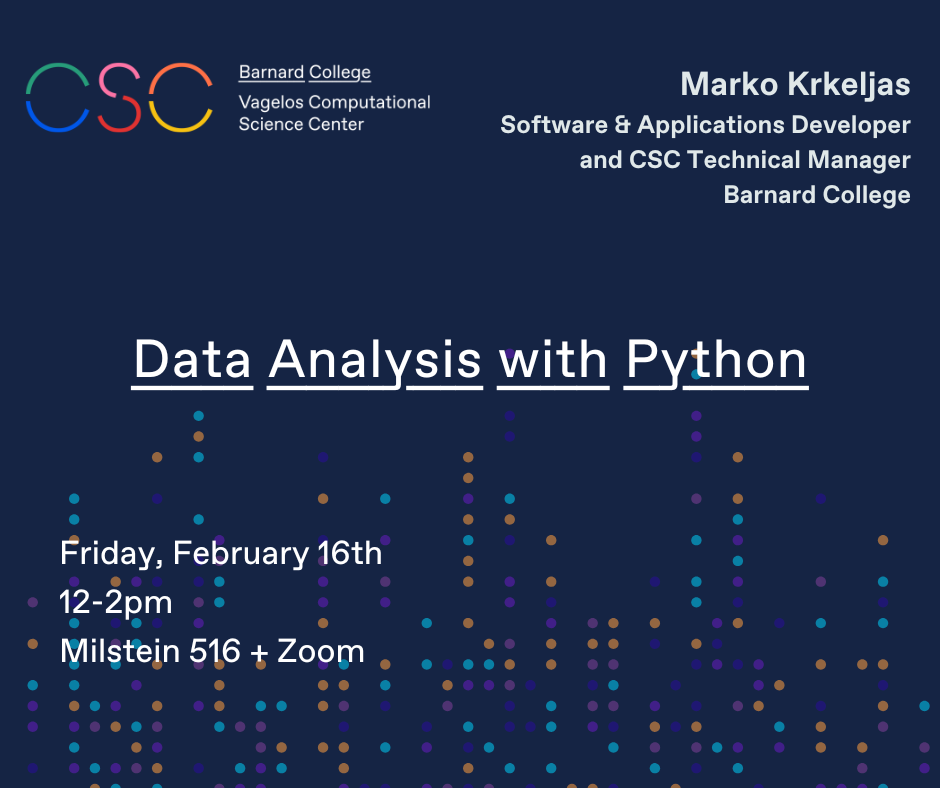
February 16, 2024 | 12:00pm - 2:00pm
Hybrid / 516 Milstein + Zoom
This workshop covers the fundamentals of data analysis using Python. We cover retrieving, processing, and analyzing data using Polars, a new library in the Python data science ecosystem.
This workshop is taught by Marko Krkeljas, Senior Software & Applications Developer and CSC Technical Manager at Barnard College.
This workshop takes place in person (516 Milstein) and on Zoom.
For more information about the Barnard CSC, go to https://www.csc.barnard.edu or follow us on Instagram and X (@barnard_csc).
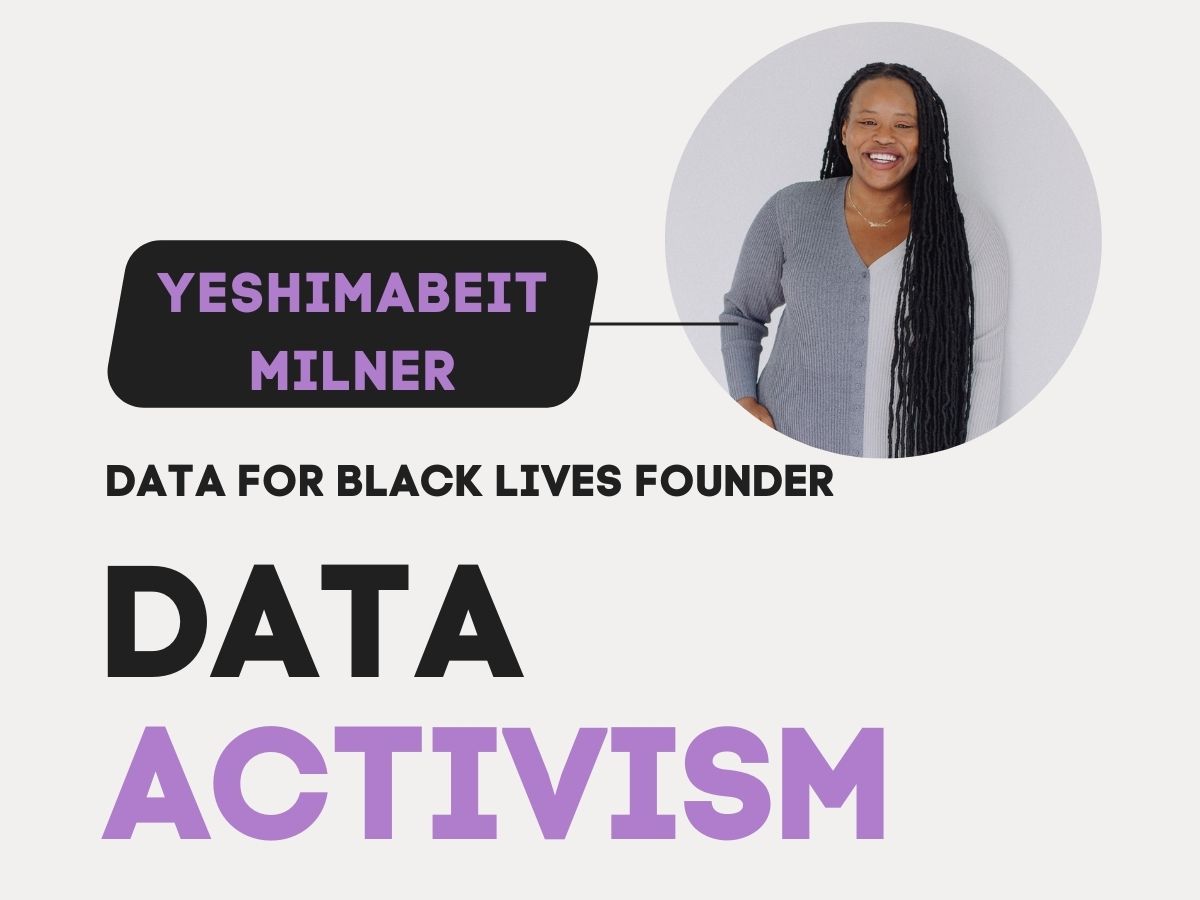
February 23, 2024 | 5:00pm - 9:00pm
Shabazz Center
Getting Critical with Data: Data 4 Black Lives
This event, hosted by BLAIS and the ERC, is proudly co-sponsored by IMATS, CEP, CSC, Africana Studies Department, Barnard Computer Science, and The Movement Lab.
In her keynote, Data 4 Black Lives Founder Yeshimebeit Milner demystifies how to use data for resistance in the fight for Black Lives.
After the keynote, there is a ‘Decompress’ session hosted by Data 4 Black Lives. ‘Decompress’ is a DIY multidisciplinary event space and movement laboratory that centers music as a Black technology, featuring DJs, dancing, and rest.
This event is part of the Getting Critical with Data Series.
Location & Time:
5:00-9:00 pm Shabazz Center
About the “Getting Critical with Data” Series:
The year-long Getting Critical with Data series is a collaboration between the Empirical Reasoning Center and BLAIS. Our series highlights how we can engage critically with data as creators, consumers, and learners, ranging from how data impacts marginalized communities historically and now, how census data collection is racialized, how to use data for activism and resistance, and the connections between surveillance and public health data.
About Data 4 Black Lives:
Data for Black Lives is a movement of activists, organizers, and scientists committed to the mission of using data to create concrete and measurable change in the lives of Black people. Through research, advocacy, and movement-building, we are working to support the vital work of grassroots racial justice organizations to challenge discriminatory uses of data and algorithms across systems.
About the Empirical Reasoning Center:
The Empirical Reasoning Center (ERC) helps faculty, students, staff, and alumnae engage critically with data, quantitative, qualitative, and spatial. ERC staff provide empirical research support and technology training at all levels -- from introductory to advanced -- in statistical, textual and spatial analysis, and data visualization methods. The ERC also hosts events and discussions on the role of data in the fight for justice and data ethics.
About BLAIS:
The Teaching, Learning, and Research Services team at BLAIS is composed of Personal Librarians that help students find joy in doing research.
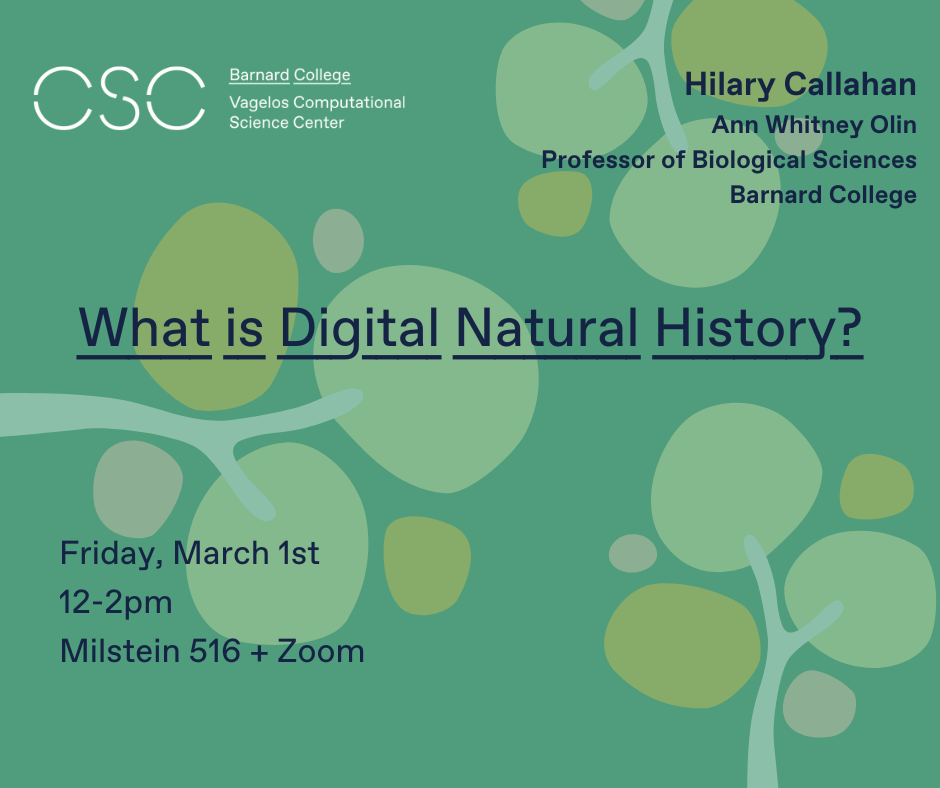
March 1, 2024 | 12:00pm - 2:00pm
Hybrid / 516 Milstein + Zoom
This workshop demonstrates one highly accessible app (such as I-Naturalist) and how it interfaces with a more technical platform (I-DigBio.org) and explicitly discusses how there are opportunities for amateurs and aspiring professionals. We look mostly at plants and maybe a few insect examples, like butterflies and other pollinators.
For those interested in the computing and data science side, you can also see some specimens from Barnard's herbarium to show how the digital world is built firmly on the foundation of material and analogue predecessors. All levels welcome.
This workshop is taught by Hilary Callahan, Ann Whitney Olin Professor of Biological Sciences at Barnard College.
This workshop takes place in person (516 Milstein) and on Zoom.
For more information about the Barnard CSC, go to https://www.csc.barnard.edu or follow us on Instagram and X (@barnard_csc).
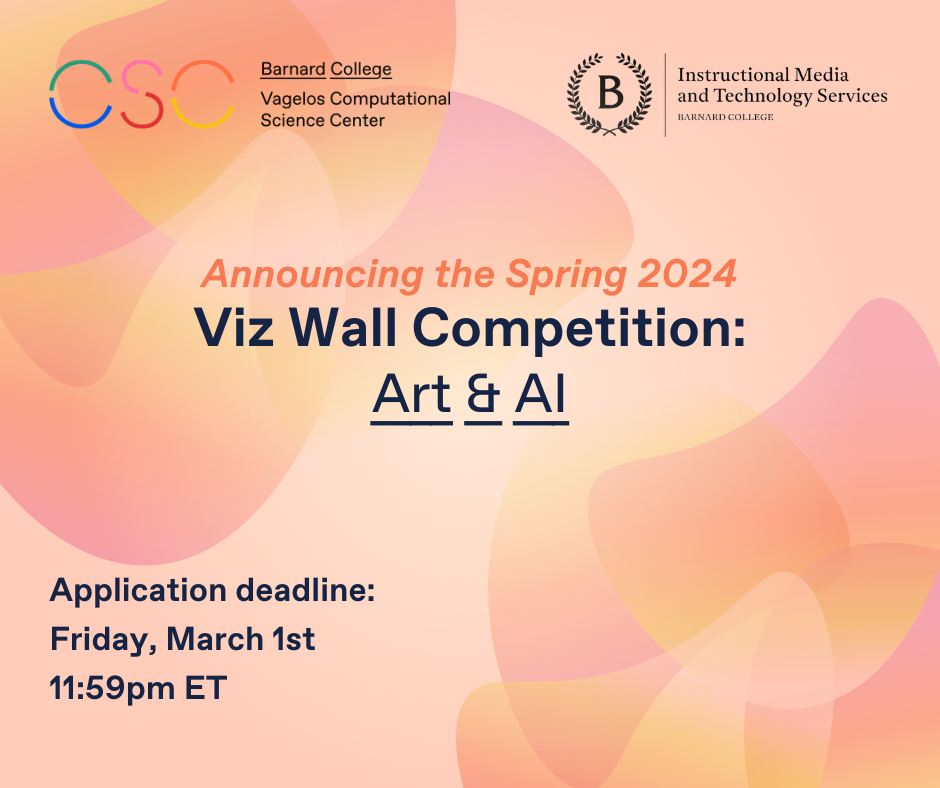
March 1, 2024 | 11:59pm
516 Milstein
Overview
Barnard IMATS and the Vagelos Computational Science Center (CSC) are excited to announce the third annual Visualization Wall competition with the theme of Art & AI. This competition is open to all undergraduate students in any discipline at Barnard and Columbia – the top four winning submissions will receive a $500 grant to develop their proposals. Show us what you’ve got!
We are specifically looking for proposals that either utilize AI in their execution or thoughtfully engage with, critique, or find innovative ways to integrate AI into various aspects of your project. Your proposal should also embrace the medium and capabilities of the Visualization Wall.
Winning proposals will be innovative projects, ranging from data visualizations to immersive storytelling, that push boundaries — you can use Generative AI or design programs, filmmaking, coding, and more to make artistic interventions that explore the relationship between Art & AI.
Winners will receive a $500 grant and mentorship to help to develop their proposals.
We're keen to see how you can creatively use the Visualization Wall, with its unique touch-sensitive capabilities, to bring your AI-inspired visions to life.
- 6 interconnected (3x2) touch-enabled panels
- Option to use panels individually for up to 6 different sources
- Runs on Windows 10
- Equipped with speakers
How to enter
Fill out this form by 11:59pm ET on Friday, March 1, 2024.
Timeline
You must upload your proposal by 11:59pm ET on March 1, 2024.
Winners will be selected by the following week. Grantees will be awarded $500 to develop their proposals and receive feedback and mentorship before the showcase on April 26, 2024.
Questions? Email csc@barnard.edu.
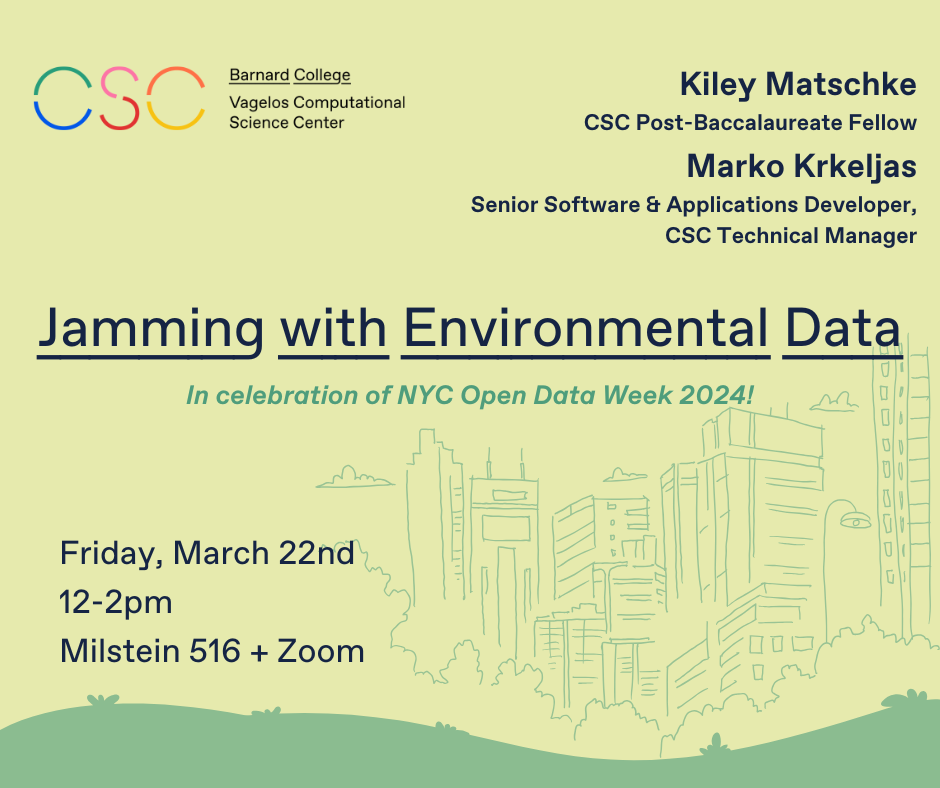
March 22, 2024 | 12:00pm - 2:00pm
Hybrid / 516 Milstein + Zoom
Join us in celebrating NYC Open Data Week! This two-part workshop and data jam explores data analysis and visualization utilizing NYC environmental data. In the first half of this workshop, participants explore ChatGPT’s data capabilities and contrast them with their own analyses via Google Co-lab. In the second half, participants work in small groups to ideate and produce creative, accessible projects that showcase their data findings (i.e; in the form of collages, songs, stories, etc.). This workshop explores the importance of data presentations and their impact on viewer perceptions. People from all backgrounds and coding levels are welcome! Beginner friendly.
This workshop is developed and taught by Kiley Matschke (BC ‘23), CSC Post-Baccalaureate Fellow and supported by Marko Krkeljas, Senior Software & Applications Developer and CSC Technical Manager at Barnard College.
This workshop takes place in person (516 Milstein) and on Zoom.
For more information about the Barnard CSC, go to https://www.csc.barnard.edu or follow us on Instagram and X (@barnard_csc).
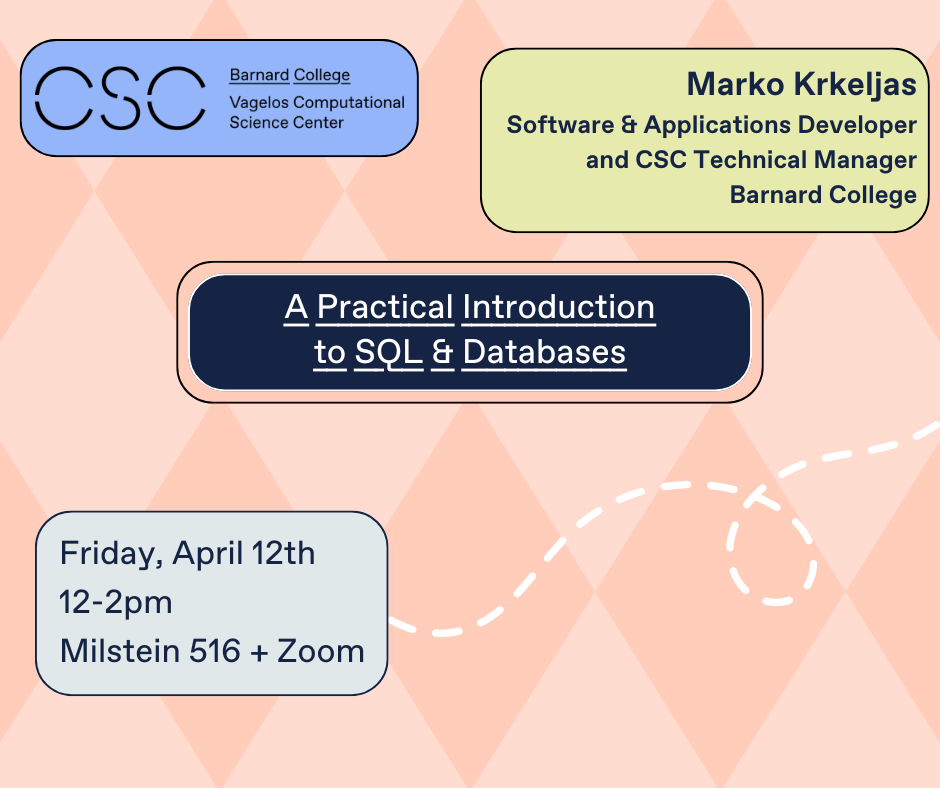
April 12, 2024 | 12:00pm - 2:00pm
Hybrid / 516 Milstein + Zoom
Learn to set up, organize, and efficiently handle databases, preparing you for real-world data analysis and storage challenges.
This workshop is taught by Marko Krkeljas, Senior Software & Applications Developer and CSC Technical Manager at Barnard College.
This workshop takes place in person (516 Milstein) and on Zoom.
For more information about the Barnard CSC, go to https://www.csc.barnard.edu or follow us on Instagram and X (@barnard_csc).
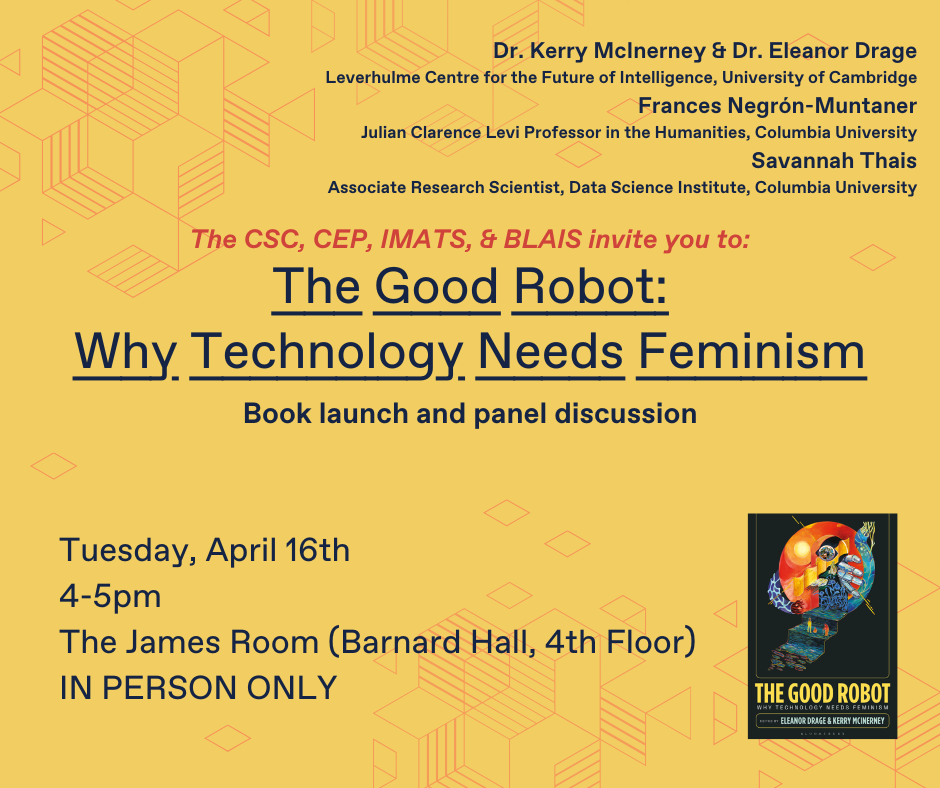
April 16, 2024 | 4:00pm - 5:00pm
In-person / The James Room (Barnard Hall, 4th Floor)
Join us for our next Generative AI Learning Community event - co-sponsored by Barnard CSC, CEP, IMATS, and BLAIS:
What is good technology? Is it even possible? And how can feminism help us work towards it? Join Dr. Kerry McInerney and Dr. Eleanor Drage (Leverhulme Centre for the Future of Intelligence, University of Cambridge), as they provide a snapshot of key challenges, questions and provocations in the field of feminism and technology, from Prometheus, protests and policing, to collective efforts to map out pleasurable and life-sustaining interactions with technology. The Good Robot: Why Technology Needs Feminism is a collection of short essays by leading technologists, philosophers, artists, and activists that grapples with the priceless, though frequently commodified question: "what is good technology?" Drs. McInerney and Drage are joined by co-author Frances Negrón-Muntaner (Columbia University) and the discussion is moderated by Savannah Thais (Data Science Institute, Columbia University).
Run of Show
- First 25 attendees receive a free copy of the book & refreshments are served
- Book overview and Introduction: 20-25 minutes
- Moderator discussion with Panelists: 15-20 minutes
- Q&A with Audience: 10 minutes
Speaker Biographies
Eleanor Drage is a Senior Research Fellow at The Leverhulme Centre for the Future of Intelligence, University of Cambridge. Dr. Drage teaches AI professionals about AI ethics on a Masters course at Cambridge. She is the co-editor of The Good Robot: Feminist Voices on the Future of Technology, and Feminist AI: Critical Perspectives on Algorithms, Data and Intelligent Machines. She specialises in using feminist ideas to make AI better and safer for everyone. She is also currently building the world's first free and open access tool that helps companies meet the EU AI act's obligations. Drage co-hosts The Good Robot Podcast, where she asks key thinkers 'what is good technology?'. She is also also an expert on women writers of speculative and science fiction from 1666 to the present - An Experience of the Impossible: The Planetary Humanism of European Women’s Science Fiction.
Kerry McInerney is a Senior Research Fellow at The Leverhulme Centre for the Future of Intelligence, University of Cambridge. Dr. McInerney co-leads the Global Politics of AI project on how AI is impacting international relations. She is also a Research Fellow at the AI Now Institute (a leading AI policy thinktank in New York) and a Visiting Fellow at the Institute of Advanced Studies, UCL for 2023-2024. She is also co-editor of The Good Robot: Feminist Voices on the Future of Technology and Feminist AI: Critical Perspectives on Algorithms, Data, and Intelligent Machines. Her work explores the intersections between race, gender, political violence, and artificial intelligence. Her work has been published or is forthcoming in Signs, Big Data and Society, New Media and Society, Philosophy and Technology, Public Understanding of Science, Feminist Review, Ethics and Information Technology, Gender, Place and Culture, and the National Political Science Review. Dr McInerney is also the co-author of the forthcoming book Reprogram: Why Big Tech is Broken and How Feminism Can Fix It (2026, Princeton University Press).
Frances Negrón-Muntaner (Panelist) is a Julian Clarence Levi Professor in the Humanities at Columbia University. She is an award-winning filmmaker, writer, and scholar. She is the recipient of Ford, Truman, Scripps Howard, Rockefeller, and Pew fellowships as well as a Social Science Research Council and Andy Warhol Foundation grants. She is the author of Boricua Pop: Puerto Ricans and the Latinization of American Culture (winner, 2004 CHOICE Award), and the editor of several books, including Puerto Rican Jam: Rethinking Nationalism and Colonialism; None of the Above: Puerto Ricans in the Global Era, and Sovereign Acts. Among Negrón-Muntaner's films are AIDS in the Barrio, Brincando el charco: Portrait of a Puerto Rican, and War for Guam. She is currently completing various films, including on Valor y Cambio, her award-winning just economy public art installation of the same name, and writing an intellectual biography on Arthur Schomburg.
Savannah Thais (Moderator) is an Associate Research Scientist at the Data Science Institute, Columbia University. Dr. Thais is interested in how designing and performing measurements impacts systems and societies. With a background in high energy particle physics, her recent work has focused on geometric deep learning, methods to incorporate physics-based inductive biases into machine learning (ML) models, regulation of emerging technology, social determinants of health, and community education. She is the founder and Research Director of Community Insight and Impact, a non-profit organization focused on data-driven community needs assessments for vulnerable populations and effective resource allocation. She also currently serves on the Executive Board of Women in Machine Learning and the Executive Committee of the APS Group on Data Science, and is a Founding Editor of the Springer AI Ethics journal.
This event takes place in person only (The James Room, Barnard Hall 4th Floor).
For more information about the Barnard CSC, go to https://www.csc.barnard.edu or follow us on Instagram and X (@barnard_csc).
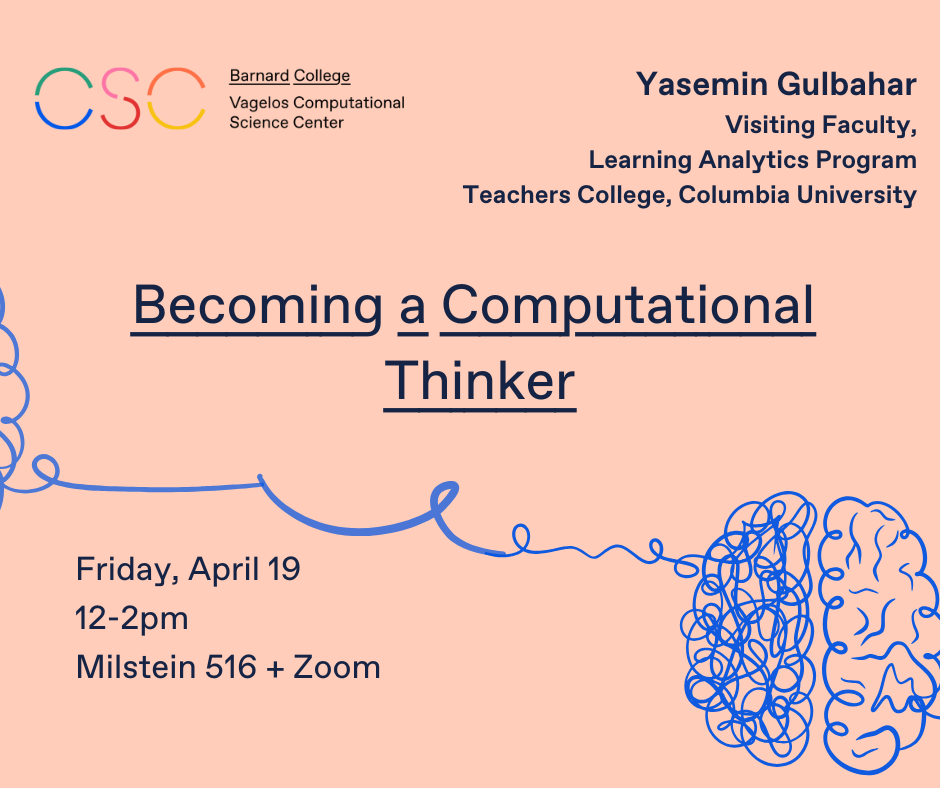
April 19, 2024 | 12:00pm - 2:00pm
Hybrid / 516 Milstein + Zoom
What is computational thinking? Computational Thinking (CT) has become a skill for the 21st century that is becoming ever-more important in today’s increasingly technological world for problem solving both in industry and the academic sector. In this workshop, participants not only understand various dimensions of CT but also explore these dimensions through different solutions for the same problems. This workshop is useful for everybody who wants to understand the way we make computers work.
Although no coding experience is needed, depending on your prior knowledge you are welcome to use Python instead of Pseudocode. The workshop starts with a short presentation about CT definitions, dimensions, and processes followed by a problem solving session. The workshop ends by a discussion on the comparison of CT processes based on the problem solving experiences.
This workshop is taught by Yasemin Gulbahar, Visiting Faculty, Learning Analytics Program at Teachers College, Columbia University.
This workshop takes place in person (516 Milstein) and on Zoom.
For more information about the Barnard CSC, go to https://www.csc.barnard.edu or follow us on Instagram and X (@barnard_csc).
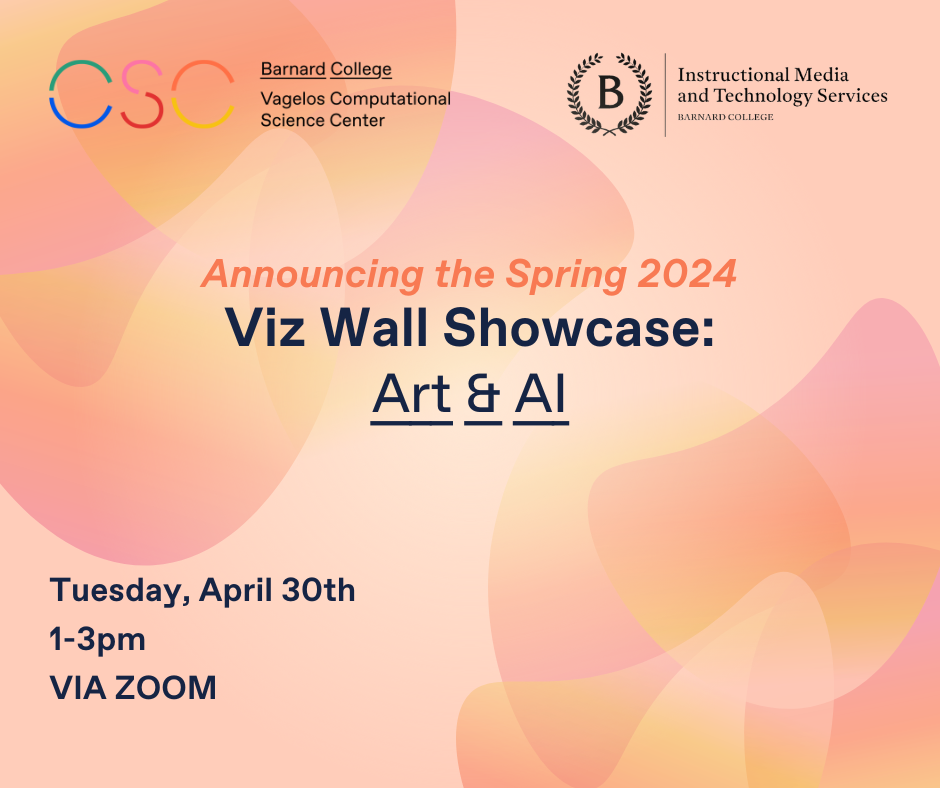
April 30, 2024 | 1:00pm - 3:00pm
Zoom
Barnard IMATS and CSC Art & AI Viz Wall Showcase
Please note that this event is *postponed* to Tuesday, April 30th from 1-3pm.
Join us online as the Art & AI finalists present their interactive projects. The finalists are Lana Levine (BC '25, CS), Em Sieler (CU '24, CS and Visual Arts), Hana Memon (BC '24, CS), Audrey Acken (CU '26, CS), Eris Gao (BC '24, CS), and David Jihwan Lee (CU '25, CS).
This event takes place on Zoom only.
For more information about the Barnard CSC, go to https://www.csc.barnard.edu or follow us on Instagram and X (@barnard_csc).
2022-2023 Academic Year
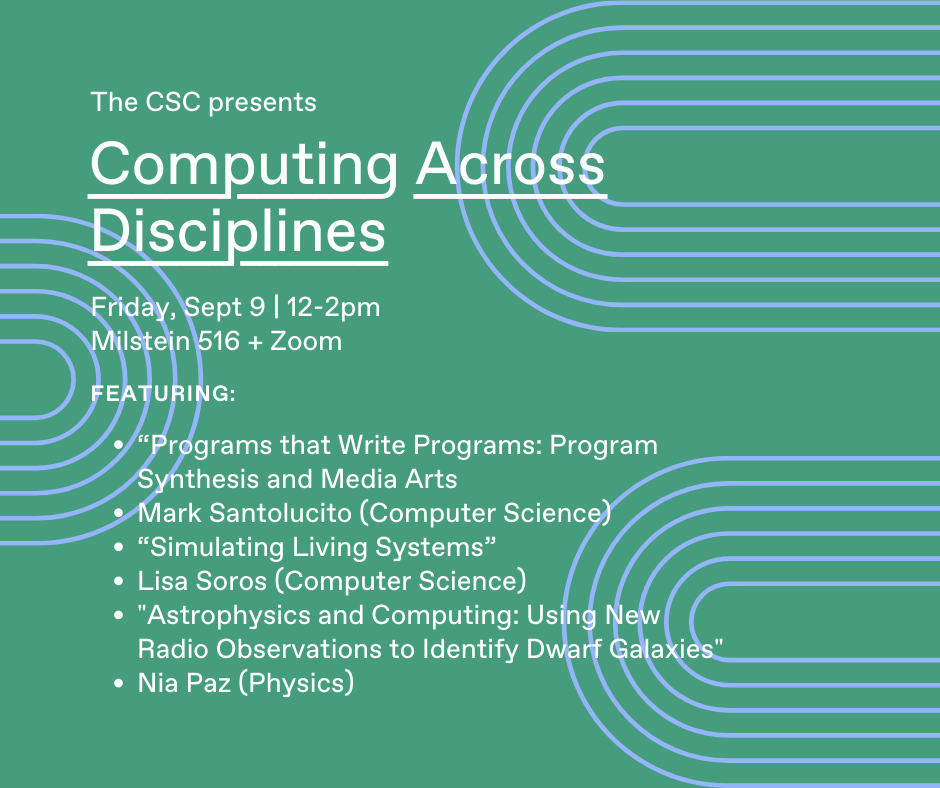
September 9, 2022 | 12:00pm - 2:00pm
Hybrid / 516 Milstein + Zoom
Welcome back! We're kicking off our workshop series for the year with an exciting introductory workshop featuring folks from across the sciences, social sciences, arts, and humanities. Each presenter gives a 30-minute overview of how and why they use computation in their work. Presenters include: Mark Santolucito (Asst. Prof., Computer Science) on computational music and sound, Lisa Soros (Roman Fellow, Computer Science) on simulating living systems, and Nia Paz (BC '24) on uses of computing in astrophysics.
Programs that Write Programs: Program Synthesis and Media Arts
Mark Santolucito, Assistant Professor of Computer Science
In this workshop, we explore program synthesis, where programs write programs. We have an interactive demo of tools for automatically constructing programs that write music and make interactive visualizations. Join to learn about the future of programming. No prior programming experience needed, and no installation needed for the tools!
Simulating Living Systems
Lisa Soros, Roman Fellow, Computer Science
This seminar gives an overview of the field of artificial life and surveys key methodologies for creating lifelike and nature-inspired algorithms inside computational systems.
Astrophysics and Computing: Using New Radio Observations to Identify Dwarf Galaxies
Nia Paz, BC 2024, Physics
This talk is about how most astrophysics research is from telescope data. Using Jupyter Notebooks, you learn how to read and use that data for multiple research questions. Nia also shares a little more about the specifics of her research and how she was able to use a broad radio telescope data for a specific dwarf galaxy project.
This workshop takes place in person (516 Milstein) and on Zoom.
For more information about the Barnard CSC, go to https://www.csc.barnard.edu or follow us on Instagram and Twitter (@barnard_csc), and Facebook.
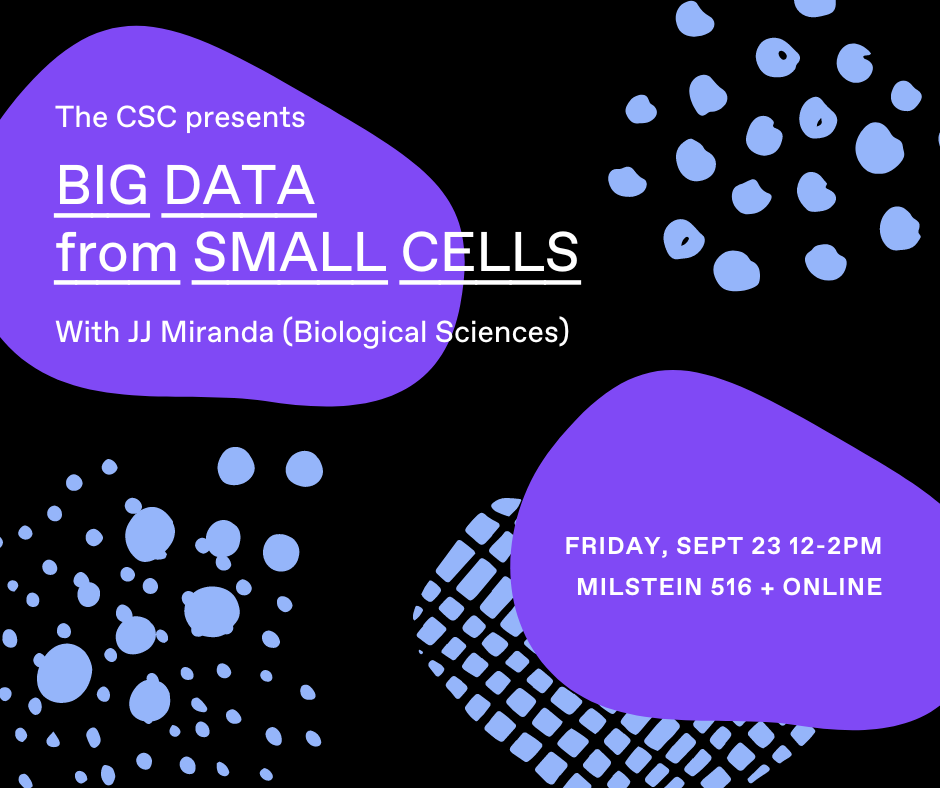
September 23, 2022 | 12:00pm - 2:00pm
Hybrid / 516 Milstein + Virtual
In this introductory workshop, JJ Miranda, Assistant Professor of Biology at Barnard, gives an overview of computational methods to study how populations of cancer cells behave like diverse individuals. This workshop includes an interactive element—no prior coding experience is necessary, just be ready to have fun!
This workshop takes place in person (516 Milstein) and on Zoom.
For more information about the Barnard CSC, go to https://www.csc.barnard.edu or follow us on Instagram and Twitter (@barnard_csc).
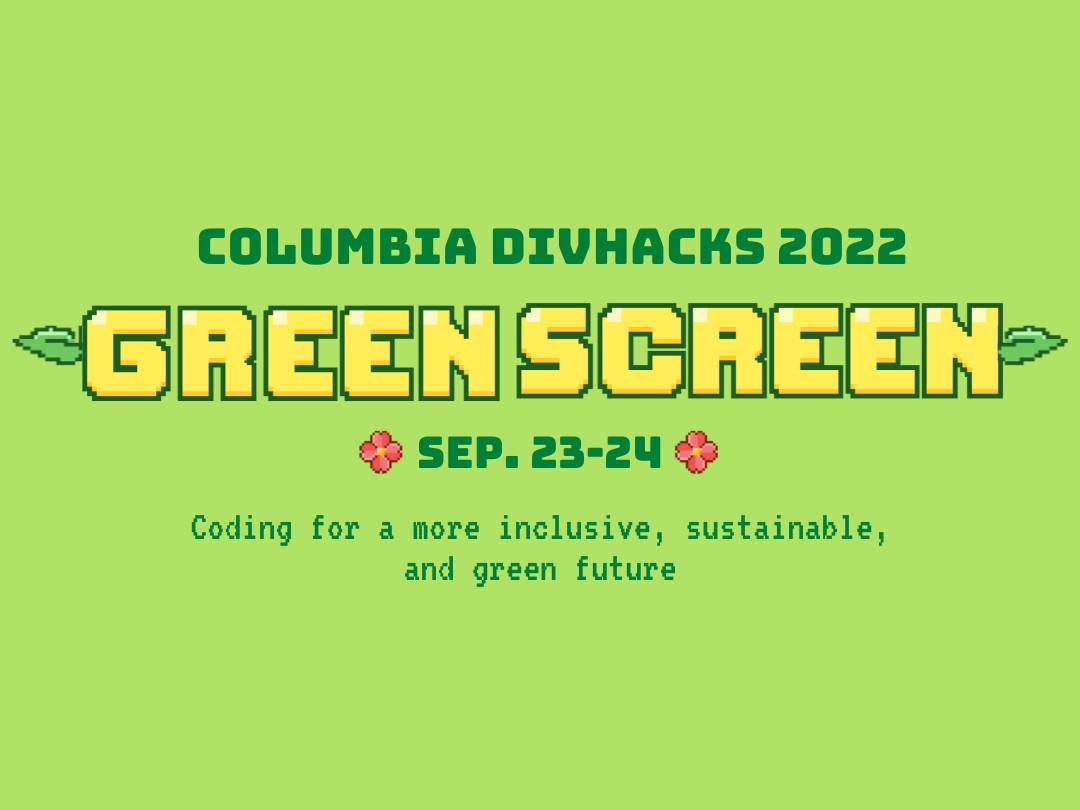
September 23, 2022 - September 24, 2022
Computer Science at Barnard College and the Vagelos Computational Science Center are co-hosting the Fall 2022 Diversity Hackathon (DivHacks) on September 23-24, 2022. DivHacks, founded in 2017, is Columbia University's premier student-led annual diversity hackathon. Over the past four years, DivHacks has welcomed attendees from all over the tri-state area. DivHacks strives to create an empowering and inspirational space for students who are historically underrepresented in the tech industry.
The goal of DivHacks is to create an experience that not only reimagines what diversity should look like in the tech industry but gives students the tools to use technology to implement change
Learn more at https://columbiadivhacks.com/
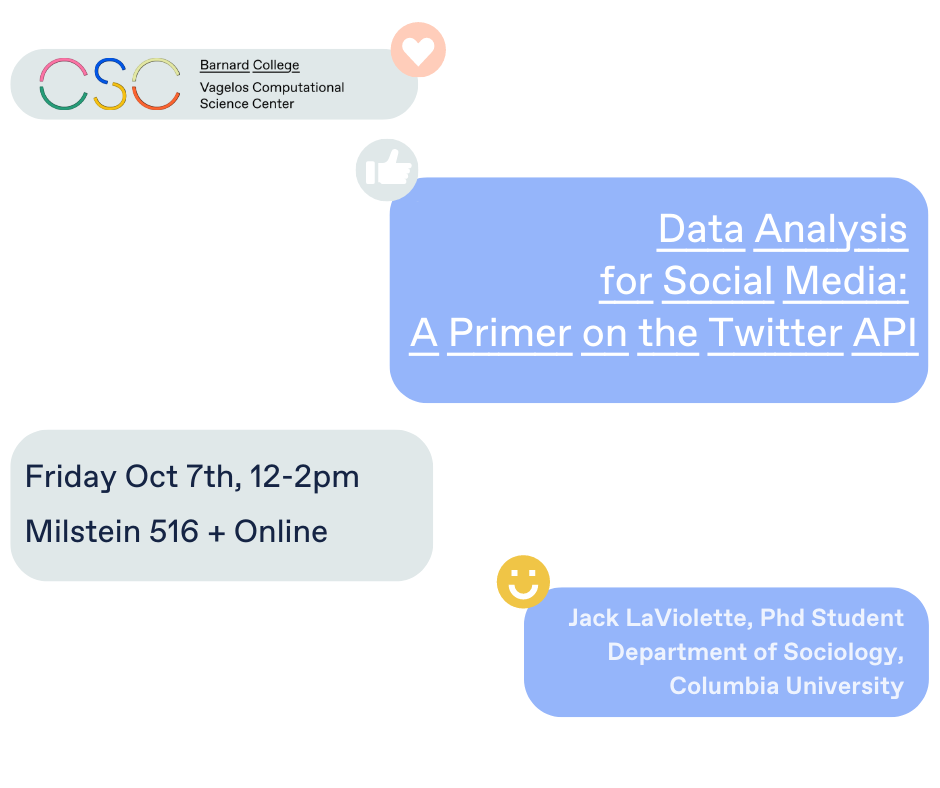
October 7, 2022 | 12:00pm - 2:00pm
Hybrid / 516 Milstein + Virtual
In this introductory workshop, Jack LaViolette (PhD Student in Sociology at Columbia University) demonstrates how to pull, process, and visualize social media data using the Twitter API. No prior coding experience needed.
This workshop takes place in person (516 Milstein) and on Zoom.
For more information about the Barnard CSC, go to https://www.csc.barnard.edu or follow us on Instagram and Twitter (@barnard_csc).
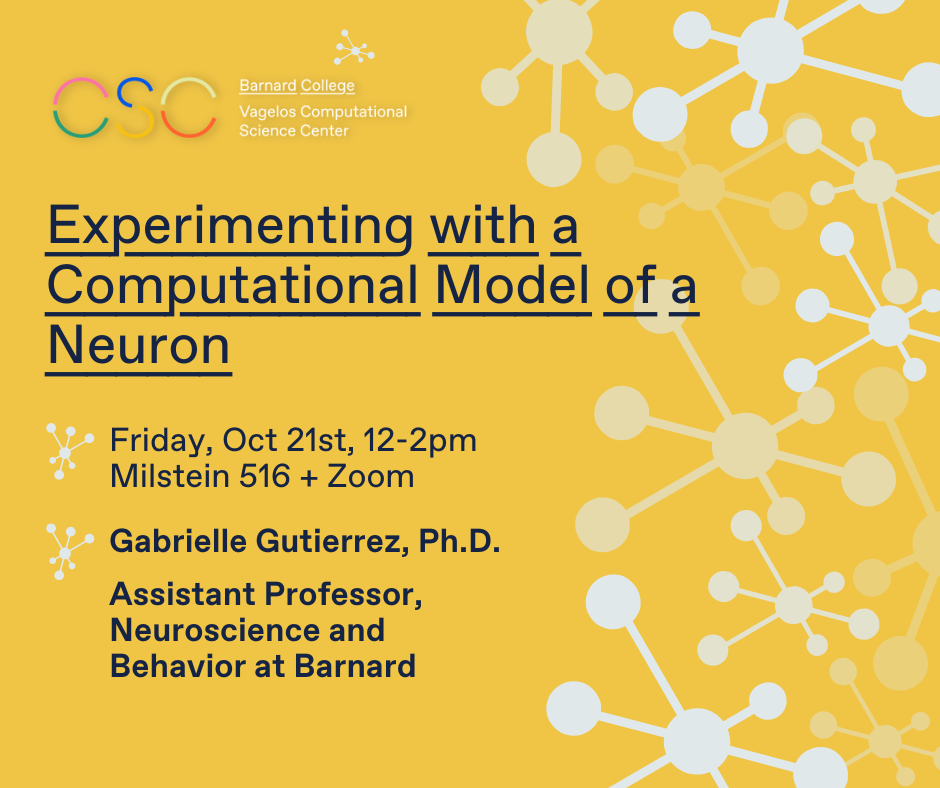
October 21, 2022 | 12:00pm - 2:00pm
Hybrid / 516 Milstein + Zoom
In this workshop, participants explore a computational model of a neuron in a Matlab LiveScript. No previous coding experience is required. We discuss the origins of the model, demonstrate it, and then participants have a chance to play with the model code and customize it and design their own experiments with it.
This workshop is taught by Gabrielle Gutierrez, PhD, Assistant Professor, Neuroscience and Behavior at Barnard College.
This workshop takes place in person (516 Milstein) and on Zoom.
For more information about the Barnard CSC, go to https://www.csc.barnard.edu or follow us on Instagram and Twitter (@barnard_csc).
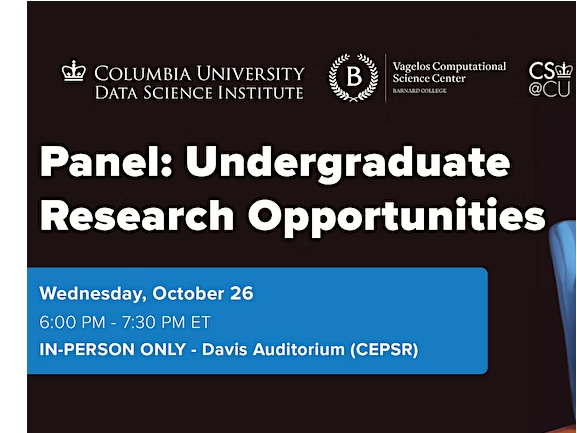
October 26, 2022 | 6:00pm - 7:30pm
Davis Auditorium (CEPSR), 4th Floor (Campus Level)
Undergraduate Computer and Data Science Research Panel
Join this special panel event to learn about research and career opportunities for undergraduate students in data and computer science. Student moderators pose questions related to research practices, mentorship, continuing education, successes, and more to an esteemed panel of Columbia faculty members. This panel helps undergrads in related disciplines plan for their future in emerging scientific fields.
This event is part of the Columbia-Barnard Undergraduate Computer and Data Science Research Fair, held on Friday, November 11.
Panelists:
- Martha Kim, Associate Professor of Computer Science, Columbia Engineering
- Henry Yuen, Assistant Professor of Computer Science, Columbia Engineering
- Matthew J. Connelly, Professor of History, Columbia University
- Student Moderator: Angel Liang, Undergraduate, Barnard College
- Student Moderator: Samuel Hutchinson, Undergraduate, Columbia College
Organized by: The Data, Media and Society Center at The Data Science Institute, Columbia University; the Barnard Program in Computer Science and the Vagelos Computational Science Center; and the Department of Computer Science at Columbia Engineering
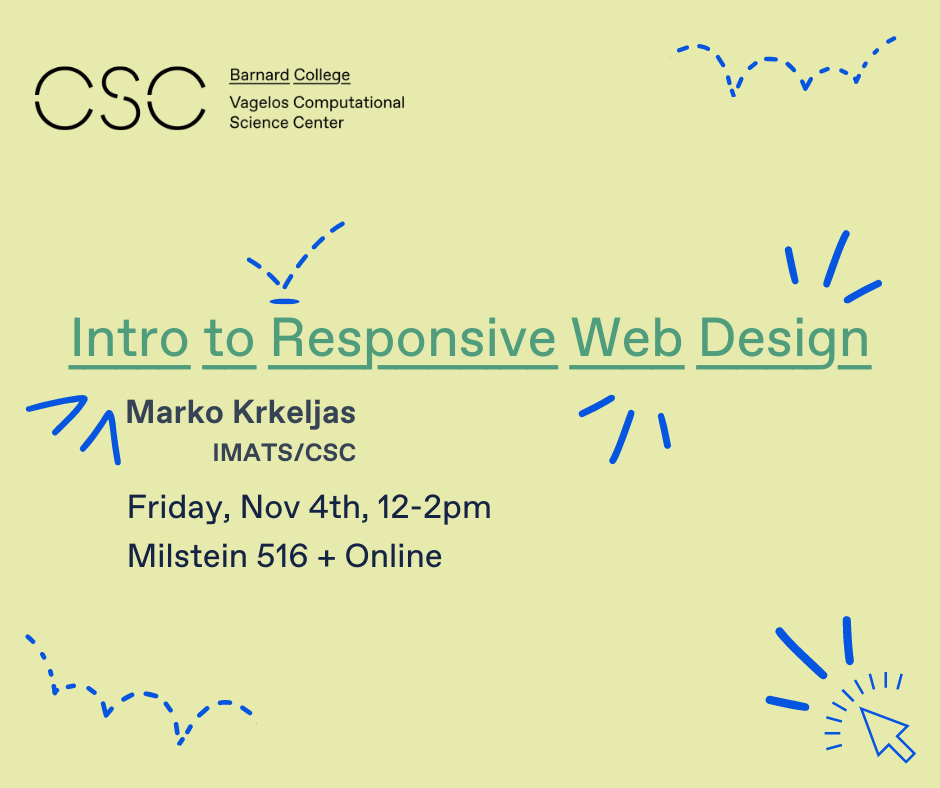
November 4, 2022 | 12:00pm - 2:00pm
Hybrid / 516 Milstein + Zoom
This workshop is a primer on responsive web design. We cover media queries, the Grid and Flexbox APIs, and creating fluid images. Basic HTML & CSS knowledge is helpful, but not strictly necessary.
This workshop is taught by Marko Krkeljas, Senior Software & Applications Developer and CSC Technical Manager/IMATS.
This workshop takes place in person (516 Milstein) and on Zoom.
For more information about the Barnard CSC, go to https://www.csc.barnard.edu or follow us on Instagram and Twitter (@barnard_csc).
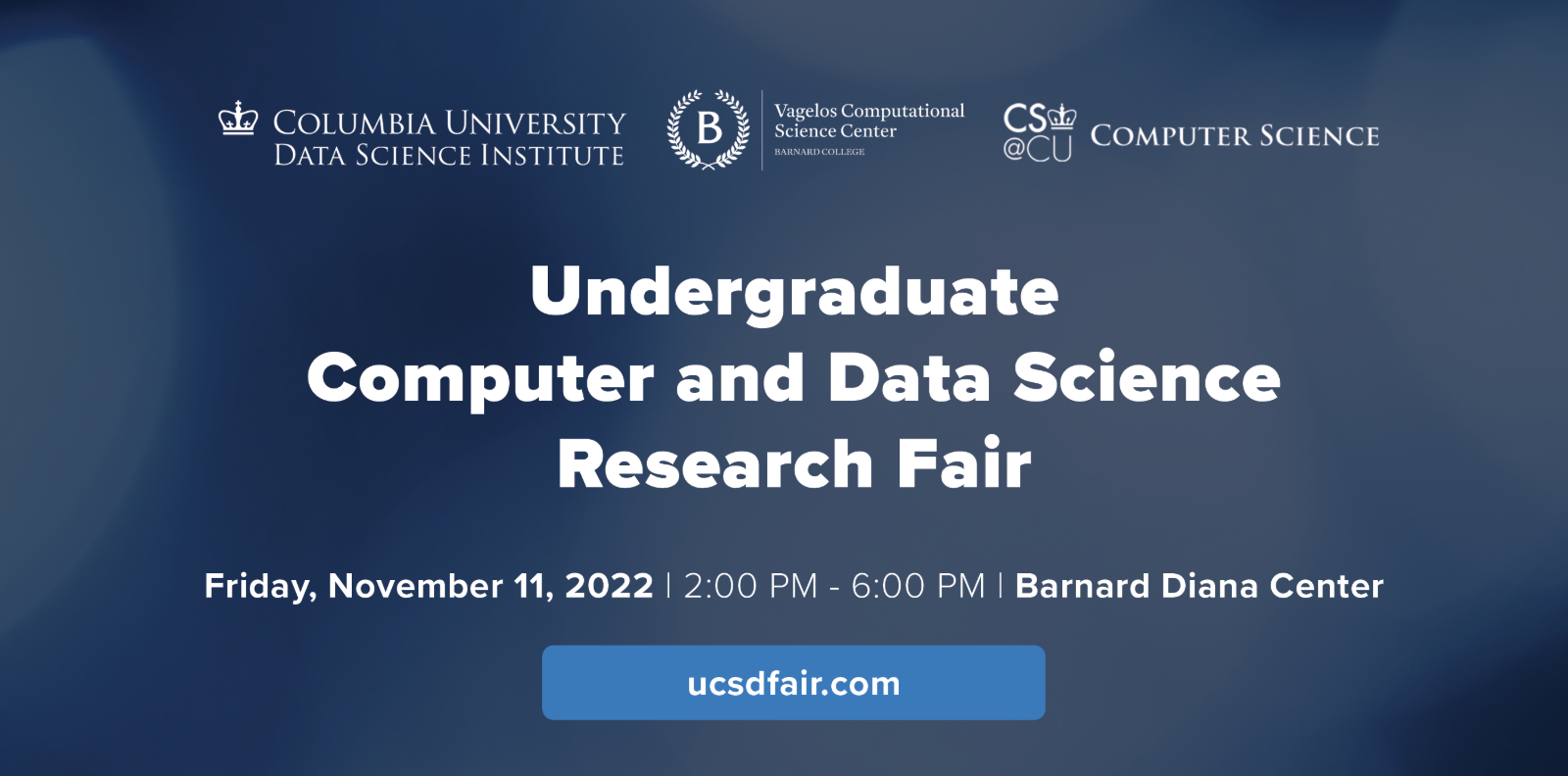
November 11, 2022 | 2:00pm - 6:00pm
Diana Center, Event Oval (LL1)
Columbia-Barnard Undergraduate Computer and Data Science Research Fair
The inaugural Columbia-Barnard Undergraduate Computer and Data Science Research Fair takes place this fall semester. Whether you have a classic research poster to present, a new application or startup to pitch, or a creative work showcasing tech and data science, we want your projects!
MORE INFO HERE: Undergraduate Computer and Data Science Research Fair
Key Details:
-
Application Deadline: Monday, October 17, 2022
-
Event Date: Friday, November 11, 2022
-
Event Location: Barnard Diana Center, The Event Oval (LL1)
-
Contact Info: datascience@columbia.edu
Benefits: Meet students across the data science and computer science communities at Columbia, and receive feedback from Columbia professors and NYC startups! Swag and prizes for the top exhibiting projects!
The fair includes three thematic tracks:
-
Data Science and Society
-
Interdisciplinary Data Science Applications
-
Data Science and Computer Science Research
You have the opportunity to present your projects to industry experts and senior faculty members, network with companies and other students, and gain valuable experience for advancing your projects.
Organized by: The Data, Media and Society Center at The Data Science Institute, Columbia University; the Barnard Program in Computer Science and the Vagelos Computational Science Center; and the Department of Computer Science at Columbia Engineering
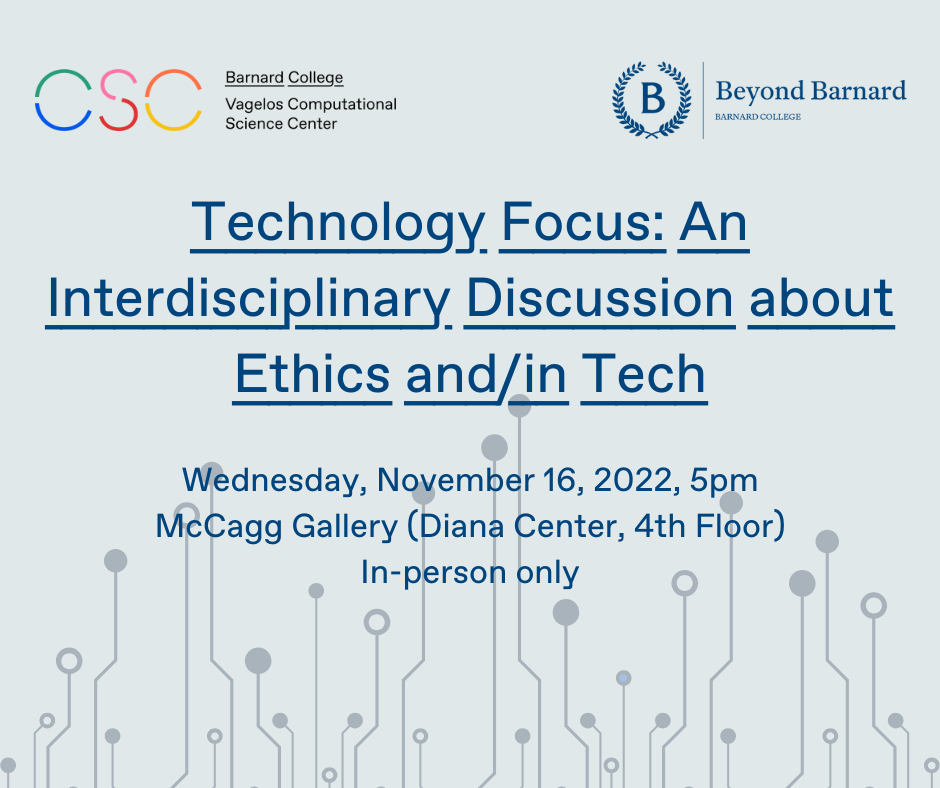
November 16, 2022 | 5:00pm - 6:15pm
McCagg Gallery (Diana Center, 4th Floor)
Questions about the role that ethics plays with respect to technological advances have grown more urgent as tech continues to reshape our interactions with one another and our understanding about ourselves. From data privacy/misuse of personal information, to cybersecurity, inclusive design, data transparency, and the implications of artificial intelligence — and so much in between — stakeholders across industry, government, higher education, and advocacy spaces have important roles to play in these complex conversations.
Join a distinguished panel of Barnard alums working at the intersection of tech and ethics, moderated by Saima Akhtar, Associate Director of the Vagelos Computational Science Center.
We talk about ethics, technology, career paths, and your questions!
Panelists include:
- Reena Jana, English, Head of Content & Partnership Enablement, Responsible Innovation at Google
- Regina Flores Mir, Founder, Data X
- Clare Garvie '09, Human Rights and Political Science; Training & Resource Counsel at the National Association of Criminal Defense Lawyers (formerly at the Center on Privacy & Technology)
This event is a collaboration between the Vagelos Computational Science Center (CSC) and Beyond Barnard.
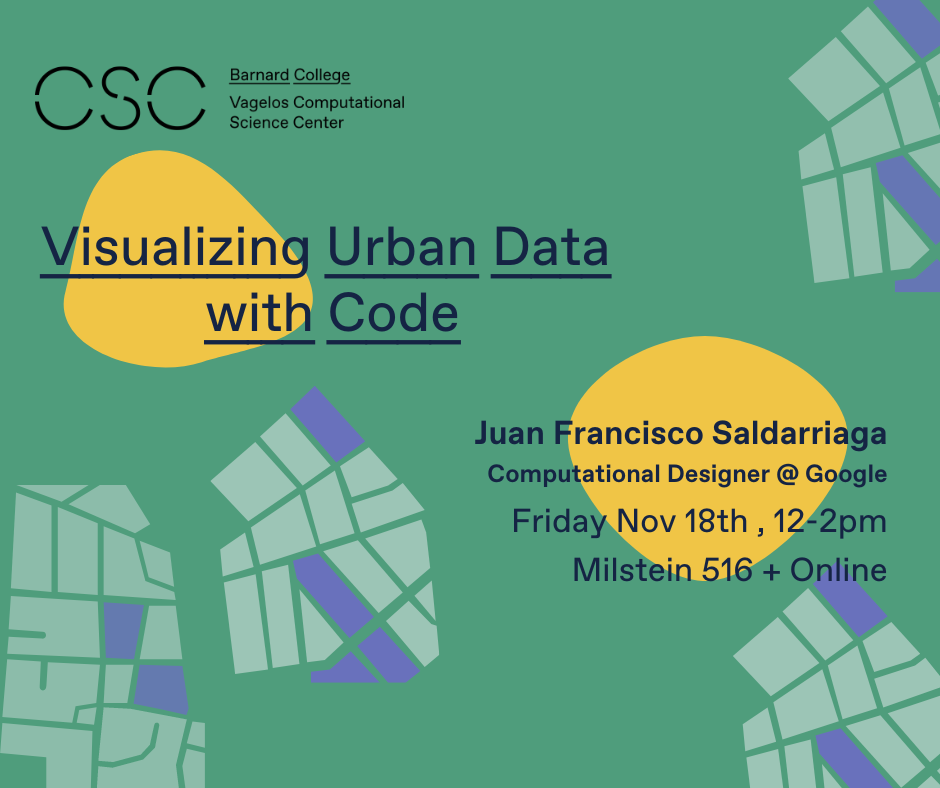
November 18, 2022 | 12:00pm - 2:00pm
Hybrid / 516 Milstein + Zoom
We’ve all seen the energy grades posted at the entrances of large buildings in New York City. But how does one building compare to its neighbor, or to buildings in other parts of the city? And how is the city doing overall? Are grades improving from year to year? Are there any interesting stories buried in the data?
Join Computational Designer Juan Francisco Saldarriaga for a workshop on mapmaking through programming. Python is our language of choice, and we introduce powerful packages like Pandas, Geopandas and Altair to explore geographic data. Our final product is a Colab Notebook (similar to a Jupyter Notebook) with maps and graphs exploring the distribution of energy grades from 2020 and 2021 across the city and highlighting specific investigative leads.
No prior programming experience is required.
This workshop takes place in person (516 Milstein) and on Zoom.
For more information about the Barnard CSC, go to https://www.csc.barnard.edu or follow us on Instagram and Twitter (@barnard_csc).
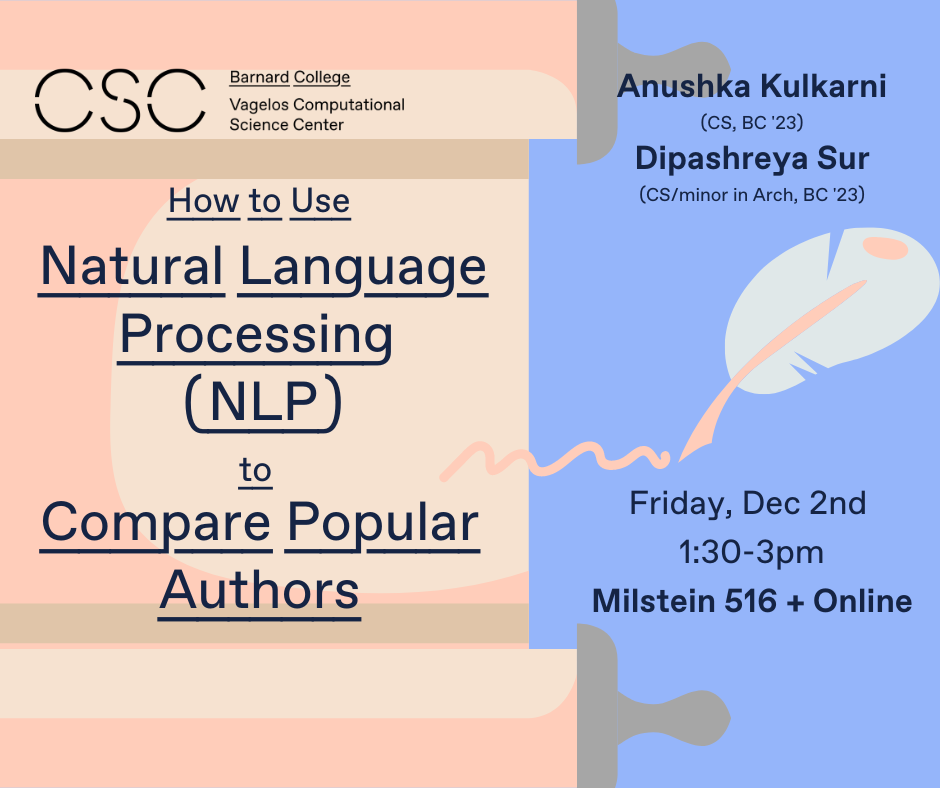
December 2, 2022 | 1:30pm - 3:00pm
Hybrid / 516 Milstein + Zoom
In this workshop, participants learn common Natural Language Processing (NLP) techniques using a dataset of popular works from Project Gutenburg. We review basic NLP methods including: data cleaning (removing stop and filler words, lemmatization, tokenization), extracting lexical features (word frequency, most common n-grams, etc.), and conducting topic modeling and sentiment analysis using Python. Participants can choose which author to collect these features for and by the end of the workshop, we compare the writing styles of various authors in the dataset. This is an introductory level workshop. No prior coding experience required - come ready to experiment and have fun!
Taught by CSC Computing Fellows, Anushka Kulkarni (CS, BC '23) and Dipashreya Sur (CS with a minor in Arch, BC '23)
This workshop takes place in person (516 Milstein) and on Zoom.
For more information about the Barnard CSC, go to https://www.csc.barnard.edu or follow us on Instagram and Twitter (@barnard_csc).
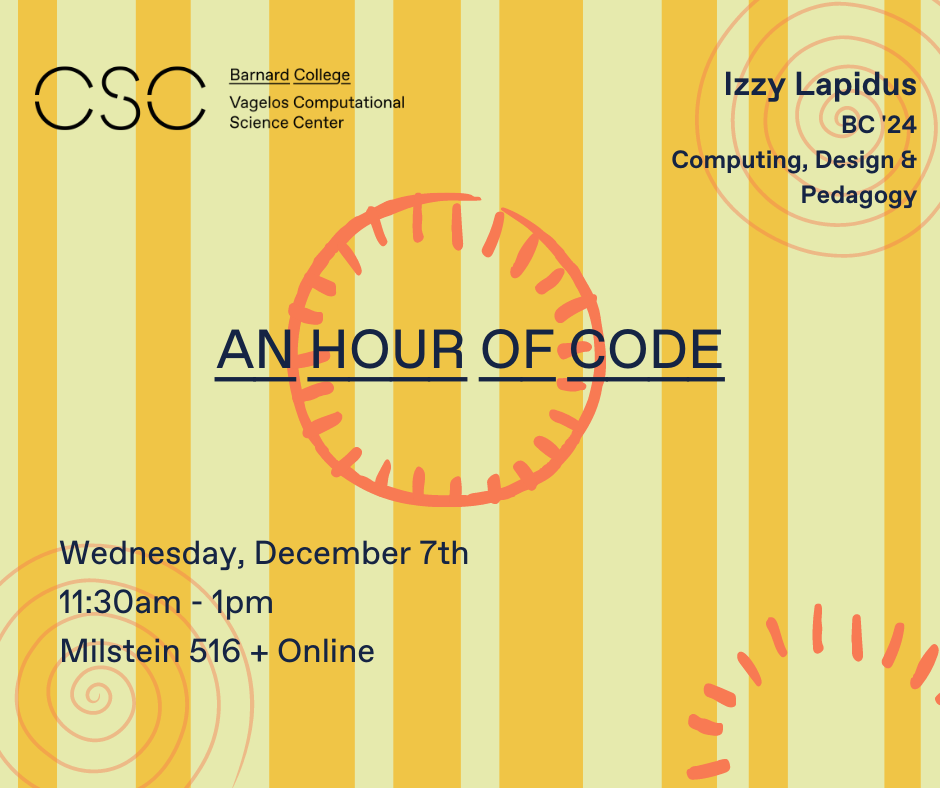
December 7, 2022 | 11:30am - 1:00pm
Hybrid / 516 Milstein + Zoom
Join Izzy Lapidus (BC '24, Computing, Design and Pedagogy) for An Hour of Code event -- a one-hour coding tutorial designed for students across all disciplines. This workshop is a celebration of Computer Science Education Week, which is a yearly call to action to inspire K-12 students to learn about computer science, advocate for equity, and celebrate the contributions of students, teachers and partners to the field.
No prior programming experience is required.
This workshop takes place in person (516 Milstein) and on Zoom.
For more information about the Barnard CSC, go to https://www.csc.barnard.edu or follow us on Instagram and Twitter (@barnard_csc).
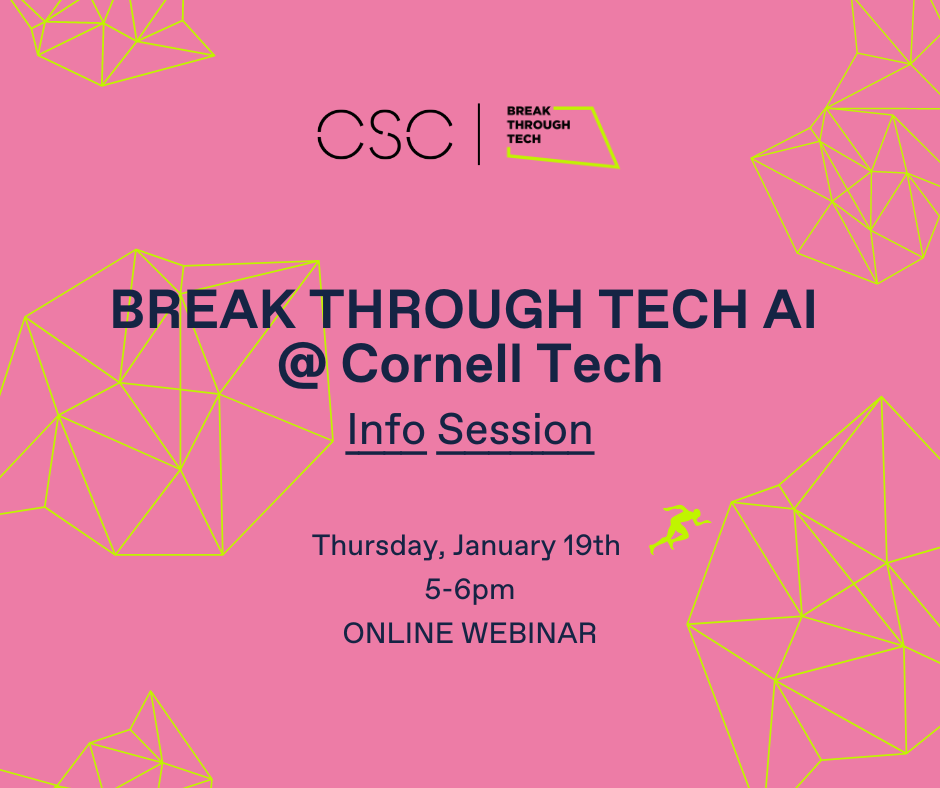
January 19, 2023 | 5:00pm - 6:00pm
Zoom
Break Through Tech AI is a free, 18-month extracurricular program hosted at Cornell Tech that helps college women (trans and cis), nonbinary, and other underrepresented groups in tech gain the skills they need to get jobs in the fastest-growing areas of tech: data science, machine learning, and artificial intelligence. Applications for the 2023-24 cohort open in January. Join the Break Through Tech AI team to learn more about this unique program and hear key details about the application process.
Panelists:
- Abby Kawola, Recruitment and Placement Coordinator
- Erika Bramwell, AI Studio Lead
- Veronica Sirotic, Career Services Lead
- Akshara Mahalingam, BC '24 (Computer Science)
This workshop takes place on Zoom only.
For more information about the Barnard CSC, go to https://www.csc.barnard.edu or follow us on Instagram and Twitter (@barnard_csc).
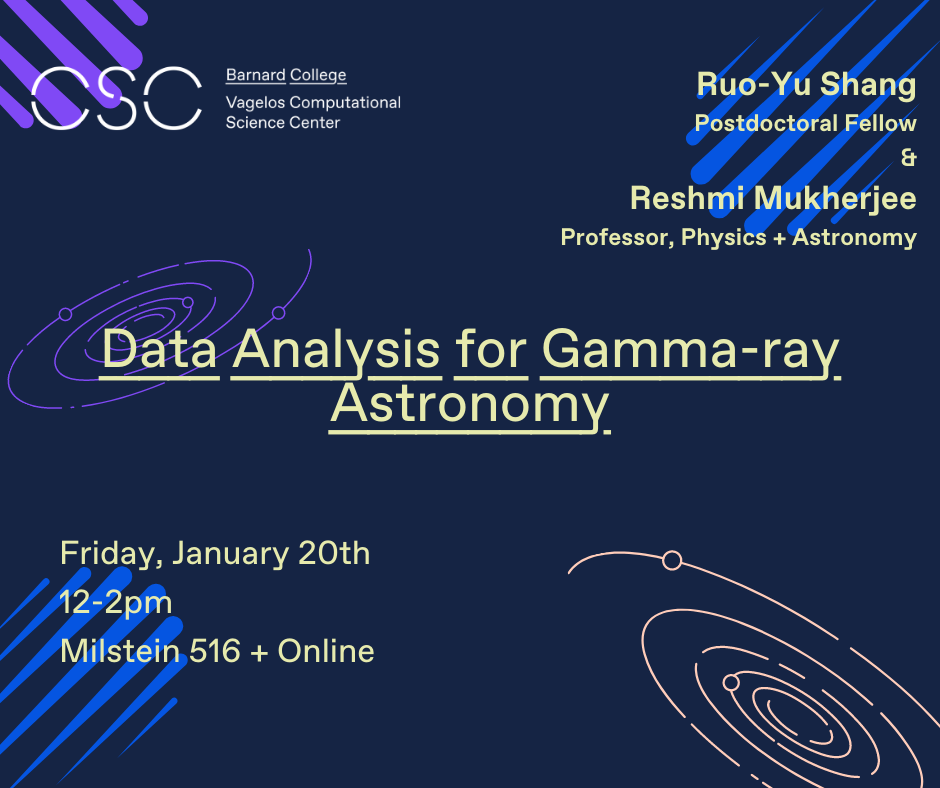
January 20, 2023 | 12:00pm - 2:00pm
Hybrid / 516 Milstein + Zoom
Gamma-ray astronomy studies the most energetic events in the Universe, from searching for primordial black holes to detecting the giant molecular clouds illuminated by ultra-high energy particles.
In this workshop, we learn the applied mathematical and computational techniques in gamma-ray astronomy, including gamma-ray shower reconstruction, background estimation, and physical model fitting.
We also discuss how this knowledge is being applied in other fields of large data.
Together we use Python to engage in a short exercise of a simplified gamma-ray analysis to give participants a first-hand experience of gamma-ray astronomy.
This workshop is taught by Ruo-Yu Shang, Postdoctoral Fellow, and Reshmi Mukherjee, Professor of Physics and Astronomy, Barnard College.
This workshop takes place in person (516 Milstein) and on Zoom.
For more information about the Barnard CSC, go to https://www.csc.barnard.edu or follow us on Instagram and Twitter (@barnard_csc).
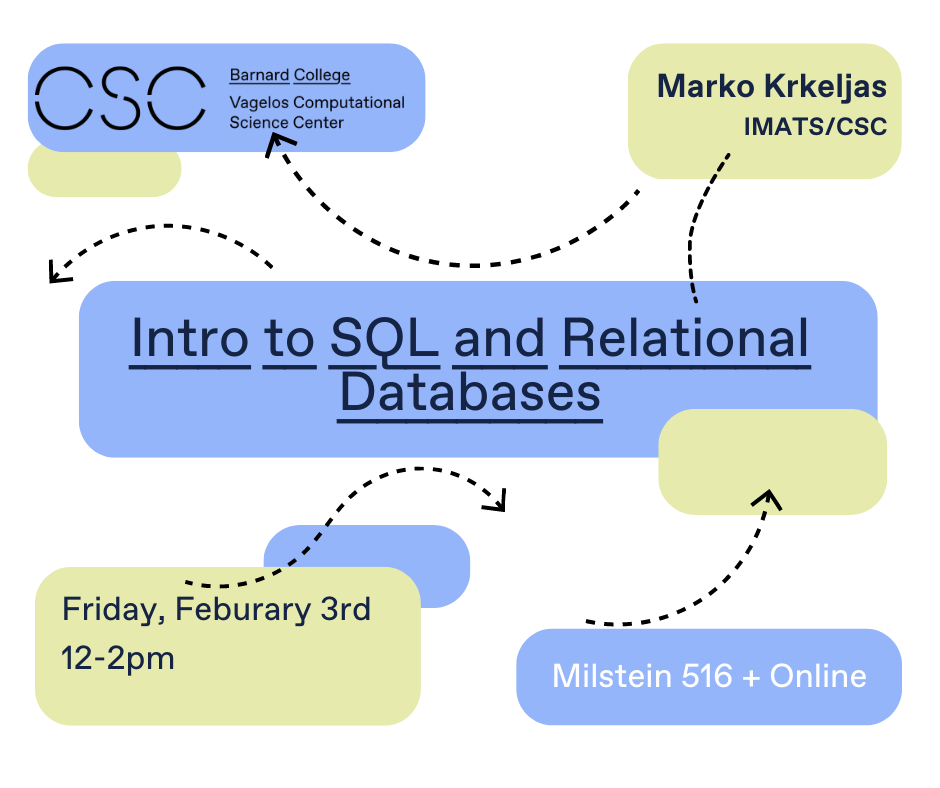
February 3, 2023 | 12:00pm - 2:00pm
Hybrid / 516 Milstein + Zoom
This workshop is a primer on SQL and relational databases, covering basic SQL commands and operations, schema design, database normalization, and interfacing with external applications.
This workshop is taught by Marko Krkeljas (IMATS/CSC).
This workshop takes place in person (516 Milstein) and on Zoom.
For more information about the Barnard CSC, go to https://www.csc.barnard.edu or follow us on Instagram and Twitter (@barnard_csc).
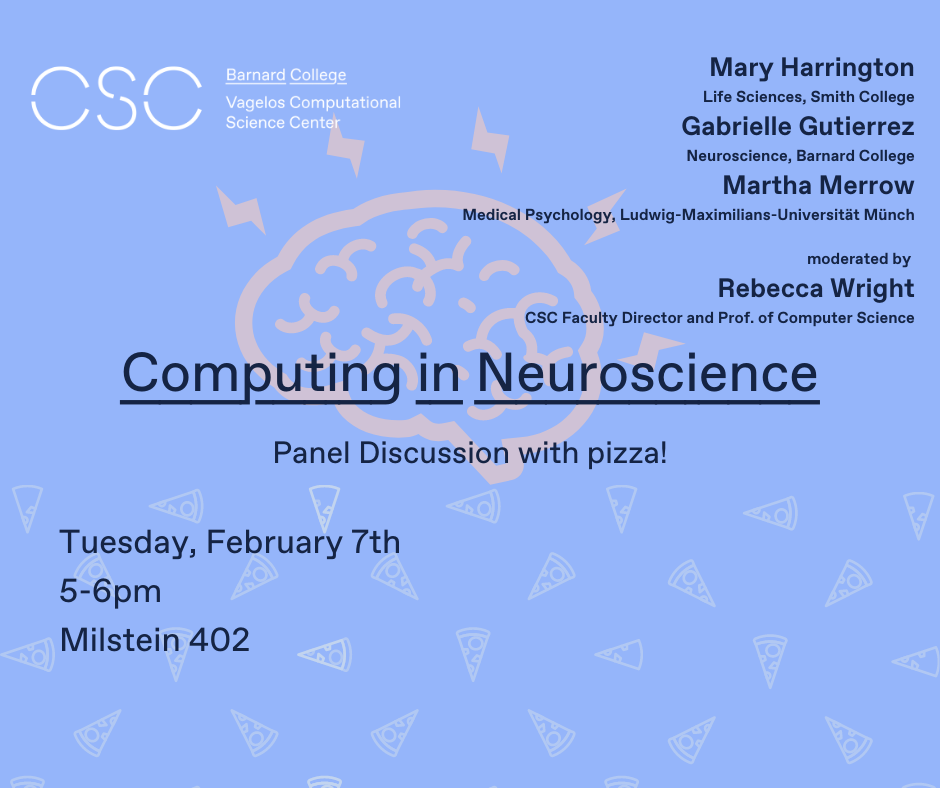
February 7, 2023 | 5:00pm - 6:00pm
402 Milstein
Join three neuroscience faculty and researchers in a conversation about how computing, mathematical modeling, and data analysis are used and could be used in neuroscience to advance cutting-edge research.
CSC faculty director Rebecca Wright will lead the panel discussion with:
- Mary Harrington (Tippit Professor in the Life Sciences, Smith College)
- Mary Harrington trained in chronobiology with Ben Rusak while working towards her PhD from Dalhousie University in Halifax Nova Scotia. She then took a position teaching at Smith College, where she has been since 1987. Mary teaches courses in neuroscience, experimental methods in neuroscience, and a seminar on race and gender in neurological disorders. Her research is on negative health impacts associated with disruption of circadian rhythms.
- Gabrielle Gutierrez (Department of Neuroscience, Barnard College)
- Gabrielle Gutierrez is an Assistant Professor at Barnard College and an affiliate of the Center for Theoretical Neuroscience at Columbia University. As a computational neuroscientist, her research is focused on modeling neural circuits and developing theories about how they do the computations that enable us to function and to interact with the world around us. Her research has led her to investigate various neuronal systems - from visual processing in the retina to circadian rhythms in the fruit fly. Gabrielle Gutierrez has a PhD in Neuroscience from Brandeis University. She did her graduate work in Eve Marder’s lab. She received her bachelor's degree from Barnard College where she majored in Physics and minored in Applied Mathematics.
- Martha Merrow (Institute for Medical Psychology, Ludwig-Maximilians-Universität München)
- Martha Merrow graduated from Middlebury College with a B.A. in Biology in 1979. She earned her Ph.D. in immunogenetics in 1991 before turning to molecular genetic approaches to understand circadian clocks, a relatively new field. She absolved a first post-doctoral fellowship at Dartmouth College followed by a second at LMU Munich. She was recruited to the University of Groningen on a women-only program leading to Professorships. In 2012, Merrow was recruited back to her old Institute at LMU Munich, the Institute of Medical Psychology where she serves as its ’Teaching Chair’ until September of this year. Her main scientific contributions have been on the timing of human behaviour using a novel questionnaire, conceptual models of the circadian clock and the discovery of new clock model systems. She has also contributed to the community, forming networks of women scientists in Groningen and Munich and currently serving as President of the European Biological Rhythms Society. She has taught in over 20 Chronobiology Training schools starting in 1996.
We have pizza -- come and bring your appetites and questions!
This panel takes place in person only (402 Milstein).
For more information about the Barnard CSC, go to https://www.csc.barnard.edu or follow us on Instagram and Twitter (@barnard_csc).
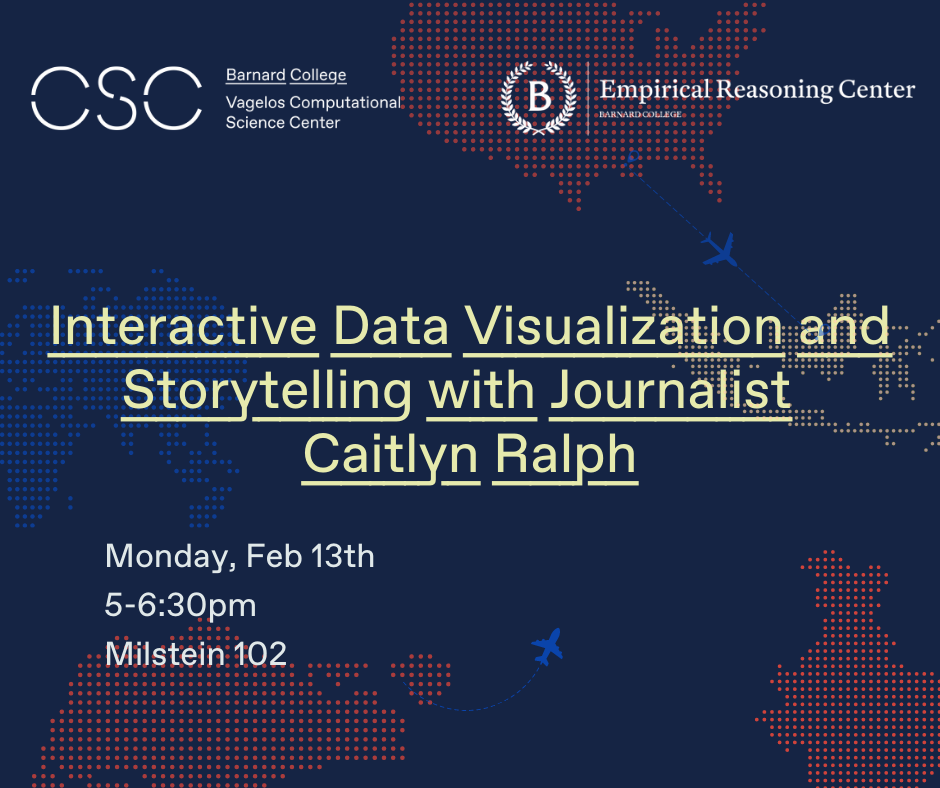
February 13, 2023 | 5:00pm - 6:30pm
Hybrid / 102 Milstein + Zoom
This is the first of a two-part series co-sponsored by the Computational Science Center (CSC) and Empirical Reasoning Center (ERC) on Interactive Data Visualization and Storytelling!
Join us for a talk with Caitlyn Ralph, Studio Director at Polygraph, The Pudding's in-house data and visual storytelling agency. There, she manages data creation and visual storytelling. Caitlyn speaks about her background in computer science, journalism, and music and how that informs her work at The Pudding.
Email us at erc@barnard.edu or csc@barnard.edu if you have any questions!
This event takes place in person (102 Milstein) and on Zoom.
For more information about the Barnard CSC, go to https://www.csc.barnard.edu or follow us on Instagram and Twitter (@barnard_csc).
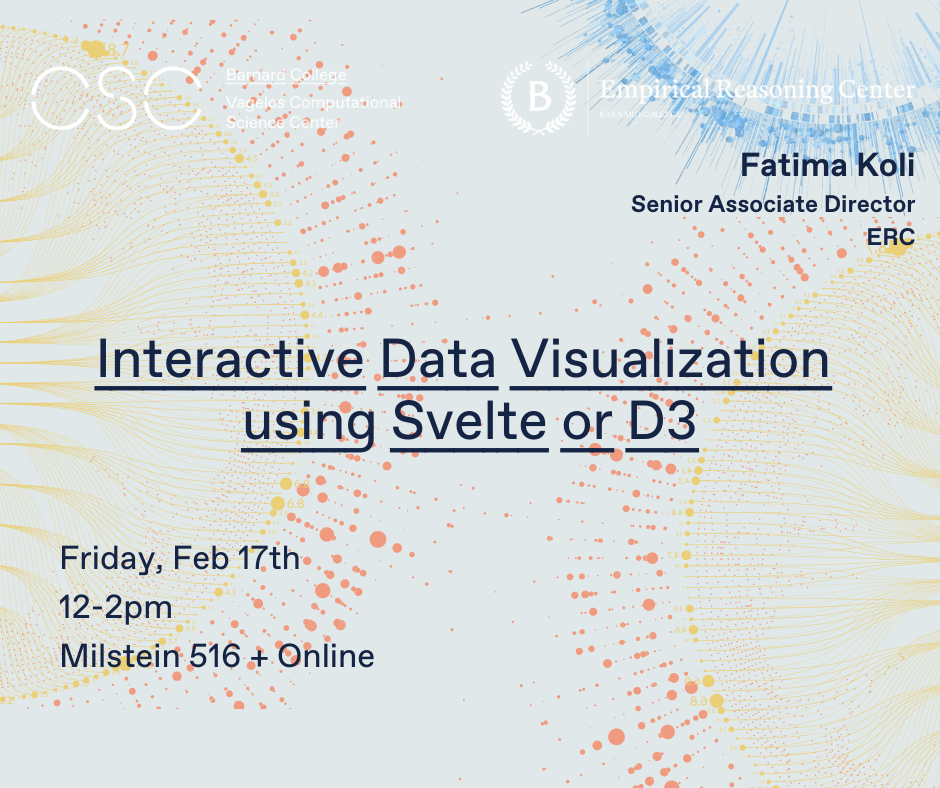
February 17, 2023 | 12:00pm - 2:00pm
Hybrid / 516 Milstein + Zoom
This is the second of a two-part series co-sponsored by the Computational Science Center (CSC) and Empirical Reasoning Center (ERC) on Interactive Data Visualization and Storytelling!
We've all seen cool visualizations featured on websites that are interactive and engaging. We're able to engage with the data in a completely different way than when they're static charts/graphs/maps on paper or even on a website. Come join us to learn how to create beautiful and interactive data visualizations like those using Svelte and D3!
Some familiarity with HTML, CSS, or JavaScript would be helpful, but is not required.
This workshop is led by Fatima Koli, Senior Associate Director of the Empirical Reasoning Center (ERC) at Barnard College.
This workshop takes place in person (516 Milstein) and on Zoom.
For more information about the Barnard CSC, go to https://www.csc.barnard.edu or follow us on Instagram and Twitter (@barnard_csc).
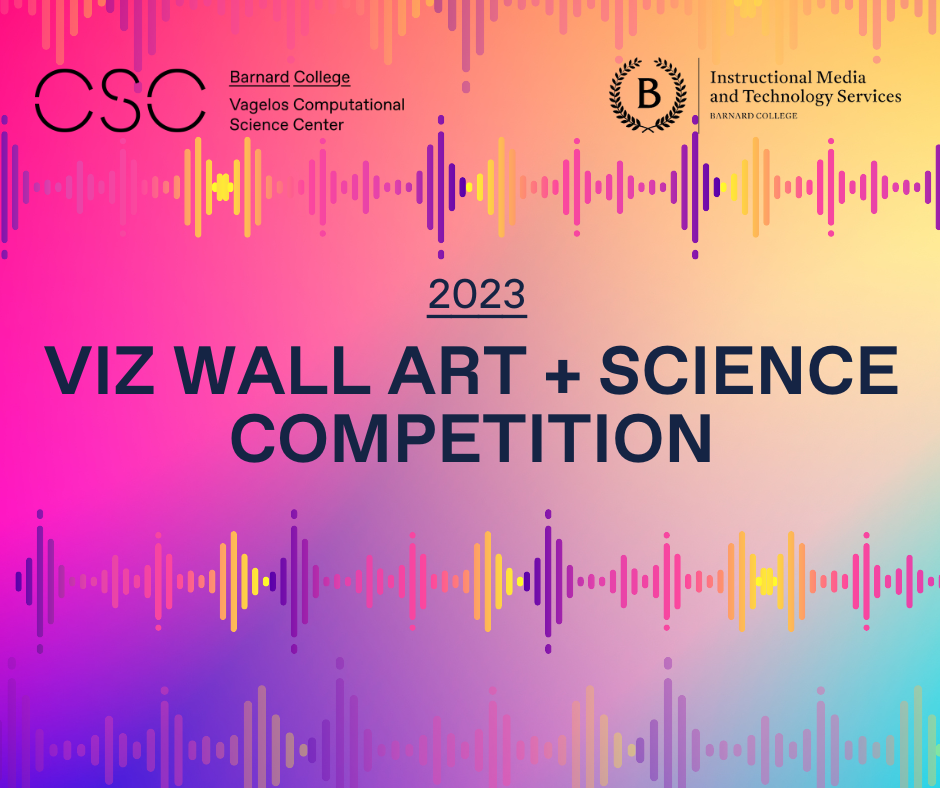
February 17, 2023 | 11:59pm
Overview
For a second year, Barnard IMATS and the Vagelos Computational Science Center (CSC) are holding a competition for proposals that use the Cyber Visualization Wall in Milstein 516 - this year the theme is art + science! This competition is open to all undergraduate students in all disciplines at Barnard and Columbia – the top four winning submissions will receive a $500 grant to develop their proposals. Show us what you’ve got!
We want to see proposals that embrace the medium and capabilities of the Visualization Wall - remember it’s touch sensitive! Winning submissions should engage directly with the medium (the Visualization Wall) and theme (art + science). You can use design programs, filmmaking, coding, and more to make artistic interventions that explore the relationship between art and science, or explore a question of interest to you in a scientific way. You can submit digital art, maps, a game design, or utilize the interactive/touch aspects of the panels, or find clever ways to subvert our expectations.
Cyber Visualization Wall Details:
- 6 interconnected (3x2), touch enabled panels
- Panels can also be used individually, e.g. up to 6 discrete devices can be projected at a time
- Windows 10 operating system
- Speakers/sound enabled
To watch the Spring 2022 Art + Tech showcase, click here.
How to enter
Fill out this form by 11:59 pm ET on Friday, February 17, 2023.
Grants
The top submissions will receive $500 to develop their projects in preparation for a showcase on April 28, 2023.
Timeline
You must upload your proposal by 11:59 pm ET on February 17, 2023.
Winners will be announced on February 24, 2023. Winning submissions will be awarded $500 to troubleshoot and develop their proposals in preparation for a showcase on April 28, 2023.
Questions? Email csc@barnard.edu.
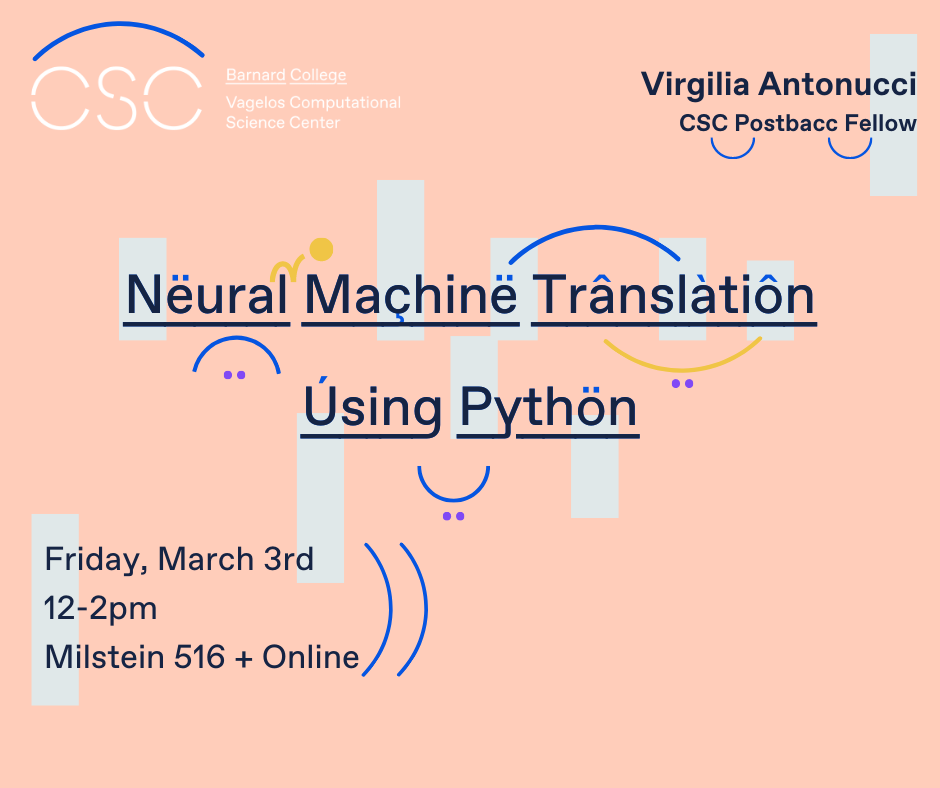
March 3, 2023 | 12:00pm - 2:00pm
Hybrid / 516 Milstein + Zoom
This workshop explores the relationship between machine learning and language translation, with a focus on sequence to sequence models. Participants learn how to consider a basic character-level recurrent sequence-to-sequence model, how it can be applied across varying languages, and how differences in language representation impact aspects of the model. This workshop is taught in Python. No prior experience is required!
This workshop is taught by Virgilia Antonucci, CSC Postbacc Fellow.
This workshop takes place in person (516 Milstein) and on Zoom.
For more information about the Barnard CSC, go to https://www.csc.barnard.edu or follow us on Instagram and Twitter (@barnard_csc).
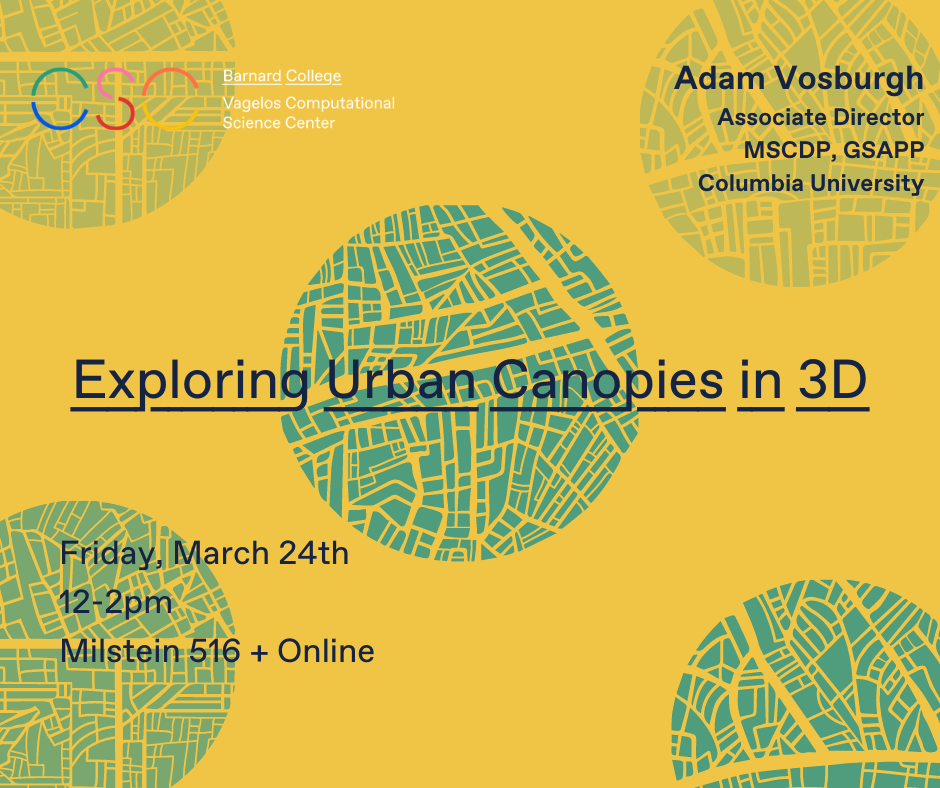
March 24, 2023 | 12:00pm - 2:00pm
Hybrid / 516 Milstein + Zoom
Using the 2017 NYC LiDAR survey, this workshop explores visualizing the city in three dimensions. Participants learn how to import 3d mapping data, make sense of and analyze complexity, and export their models onto the web. No prior coding experience needed, open to beginners!
This workshop is taught by Adam Vosburgh, Assistant Director, MS Computational Design Practices, GSAPP at Columbia University.
This workshop takes place in person (516 Milstein) and on Zoom.
For more information about the Barnard CSC, go to https://www.csc.barnard.edu or follow us on Instagram and Twitter (@barnard_csc).
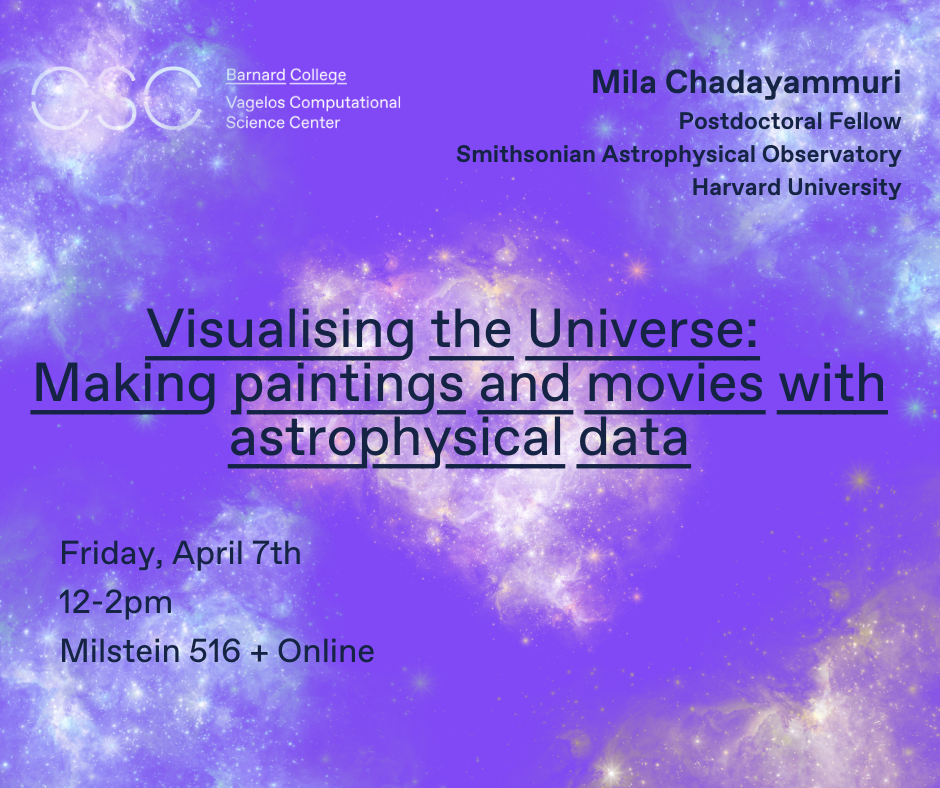
April 7, 2023 | 12:00pm - 2:00pm
Hybrid / 516 Milstein + Zoom
From planets to stars to galaxies and galaxy clusters to the filamentary structure of the entire Universe, the topics in astronomy span an incredible range. And a tremendous amount of this data lives available online! In this workshop, we review the largest online archives of astrophysical simulations and observations, learn about the science behind them, and produce some beautiful visualizations and movies in Python that should be equally at home in your academic work, museums, or art galleries.
This workshop is led by Mila Chadayammuri, Postdoctoral Fellow and Computational Cosmologist in the Smithsonian Astrophysical Observatory at Harvard University.
This workshop takes place in person (516 Milstein) and on Zoom.
For more information about the Barnard CSC, go to https://www.csc.barnard.edu or follow us on Instagram and Twitter (@barnard_csc).
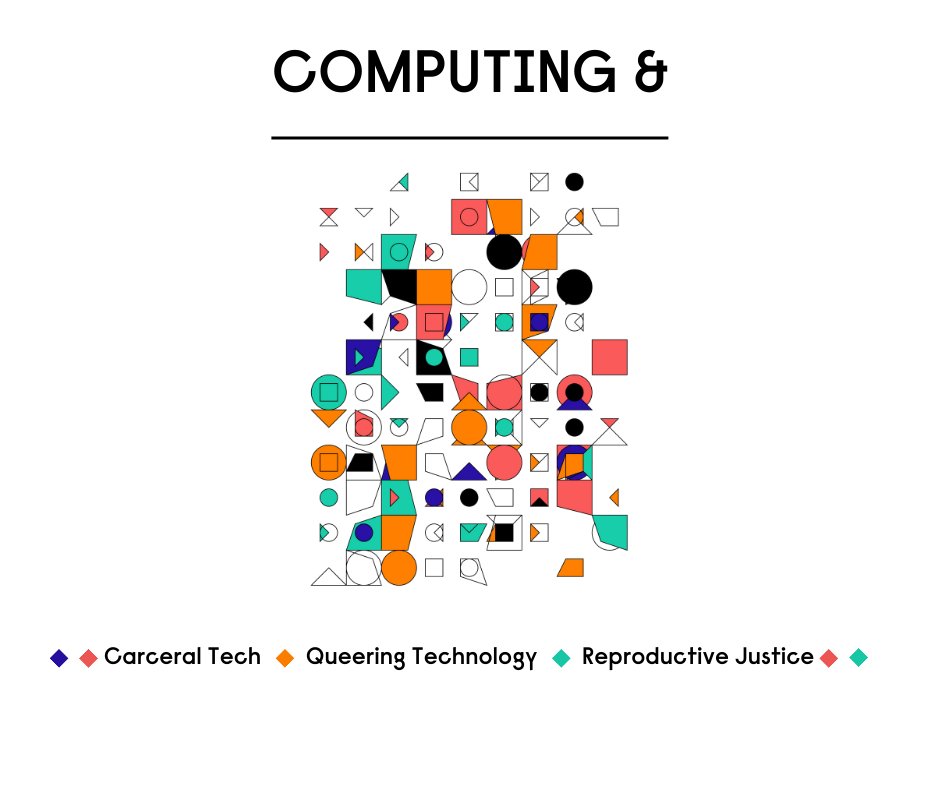
April 20, 2023 | 12:00pm
Online
Are you interested in writing about the relationship between tech and society? Would you like to learn how to critically leverage data and technology to tell stories?
We love to hear from Barnard and Columbia undergraduate and graduate students who are interested in attending this event and pitching a journalistic style-piece or op-ed based on a topic discussed at Computing &: A conversation on computing and storytelling, taking place on Friday, April 21st. Selected students are invited to attend dinner with the panelists, and receive mentorship around developing their journalistic piece, along with a small seed grant.
Application form here.
Deadline to apply: April 20, 2023 @ noon EST.
Questions? Email csc@barnard.edu
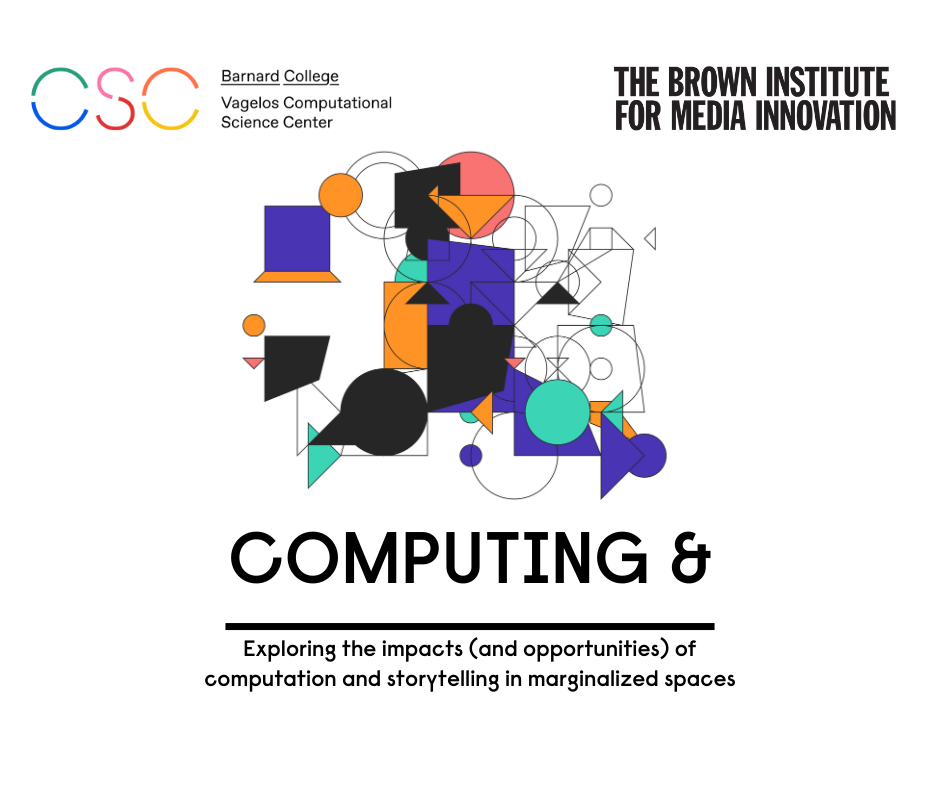
April 21, 2023 | 2:00pm - 6:00pm
The Brown Institute, Pulitzer Hall, Columbia University School of Journalism
The Vagelos Computational Science Center (CSC) at Barnard College in partnership with The Brown Institute at Columbia Journalism School welcome you to Computing &, a series of panels exploring the complex and multifaceted role of computing in spaces of public life.
Framed around the theme of 'Computing &', we rotate through three crucial subtopics, each representing an area where computation directly impacts vulnerable communities and the stories told about them. The discussions highlight the oppressive and surveillant aspects of technology, as well as the innovative ways individuals and groups have leveraged technology and journalistic reporting to counteract these effects. This event is in-person only.
We also love to hear from Barnard and Columbia grads and undergrads who are interested in producing a journalistic piece based on one or more topics covered at the event. You can apply to receive mentorship and a seed grant to develop the piece. Apply here.
Event Schedule:
2:00pm - 3:15pm: Computing & Carceral Technology
A deep dive into the role of computation on communities pre-, during, and post-incarceration, exploring carceral technologies and alternative information networks. Featuring Sylvia Ryerson, Dan "April" Feng, Clarence Okoh, Martin Garcia, and moderated by Adam Iscoe.
3:30pm - 4:45pm: Computing & Queering Technology
A discussion on the role of queer communities in the design and implementation of internet technologies, examining the challenges and opportunities presented by the digital world. Featuring Afsaneh Rigot, Christina Dragon, Colleen Macklin, and a Tech Learning Collective instructor.
5:00pm - 6:15pm: Computing & Reproductive Justice
An exploration of how technology intersects with reproductive rights and justice. Featuring Anna Louie Sussman, Runa Sandvik, Dr. Kameelah Philips, and moderated by Saima Akhtar.
Participant Bios
- Sylvia Ryerson is a PhD Candidate in American Studies at Yale University, with a Master’s concentration in the public humanities. Prior to graduate school she worked as an independent radio producer and at the Appalshop media arts and education center in Whitesburg, Kentucky. There, she served as a reporter and the director of public affairs programming, and co-directed Appalshop/WMMT-FM’s Hip Hop from the Hilltop & Calls from Home radio show, a nationally recognized weekly radio program broadcasting music and toll-free phone messages from family members to their loved ones who are incarcerated.
- Dan “April” Feng is the Chief Operating Officer at Ameelio. She holds a Masters degree in Philosophy and Public Policy from the London School of Economics. An economist by training and curious by nature, she had dedicated her work to solving the hardest challenges at the most critical time. Her previous experiences include solving social loneliness with Freakonomics author, Steven Levitt, working at the UK Parliament during Brexit, and managing public transportation innovations under then Mayor Pete Buttigieg.
- Clarence Okoh is Senior Policy Counsel in Youth Policy at the Center for Law and Social Policy.
- Martin Garcia, who is the Manager of News Inside, the print publication of The Marshall Project, and the Associate of Inside Story, The Marshall Project’s new video series, both of which are distributed in hundreds of prisons and jails throughout the United States. Martin is also one of the co-chairs of The Marshall Project’s Diversity, Equity and Inclusion Committee. He is a Mercy College graduate and well versed in Department of Corrections policy.
- Afsaneh Rigot is a scholar and researcher covering issues of law, technology, LGBTQ, refugee, and human rights. She is a senior researcher at ARTICLE 19 focusing on MENA LGBTQ and Tech issues, an Affiliate at the Berkman Klein Center for Internet and Society, Advisor to the Cyberlaw Clinic at Harvard University, and a Technology and Public Purpose Fellow at Harvard Kennedy School’s Belfer Center for Science and International Affairs. She is the founder of the Design From the Margins tech design methodology.
- Christina Dragon (she|her) serves as the Measurement and Data Lead in the NIH Sexual and Gender Minority Research Office. Previously she served as the Sexual and Gender Minority Data Lead in Medicare’s Office of Minority Health and as the data analyst for the Health People 2020 LGBT Health topic area at the National Center for Health Statistics, CDC, and has over a decade’s experience working on federal SGM data.
- Colleen Macklin is a game designer and an Associate Professor in the school of Art, Media and Technology at Parsons School of Design. She’s interested in how games model and reveal ideologies through systems.
- The Tech Learning Collective is an apprenticeship-based technology school for radical organizers founded in New York City that provides a security-first IT infrastructure curriculum to otherwise underserved communities and organizations advancing social justice causes.
-
Anna Louie Sussman is a journalist who writes on gender, economics, and reproduction. She is working on her first book, about the relationship between capitalism and reproduction, for Dey Street Books.
-
Runa Sandvik is the founder of Granitt, a company focused on security for journalists and other at-risk people. Her work builds upon experience from her time at The New York Times, Freedom of the Press Foundation, and The Tor Project. Originally from Oslo, she now lives in New York.
-
Dr. Kameelah Phllips is a board certified Obstetrician and Gynecologist, wife, mother, and lifelong women’s health advocate. She is an educator, mentor, and expert in women’s health issues and has been involved in local, national, and international organizations aimed at advancing women’s health care issues through advocacy and direct patient care. Dr. Phillips graduated from Stanford University with a degree in Human Biology with an emphasis in Women’s Health and Human Sexuality. As a Real World Alumnae, she has used this platform to travel nationwide to discuss domestic violence, smoking cessation, and other health-related issues.
-
Saima Akhtar is the Senior Associate Director of the Vagelos Computational Science Center (CSC) at Barnard College.
-
Adam Iscoe is a writer and editor from Austin, Texas. His work has appeared in The New Yorker, Harper’s Magazine, Texas Monthly and McSweeney’s Quarterly Concern. Iscoe is an editor at Lapham’s Quarterly. In 2019, he worked as a Visiting Scholar at The University of California, Berkeley. He has also taught journalism at Solano State Prison, in Vacaville, California; and edited The San Quentin News, an award winning newspaper produced by incarcerated journalists at San Quentin State Prison.
Computing & is a unique series of talks that engage area experts, scholars, technologists, and journalists working to expose and challenge harms often invisible to the masses.
__________________________________________________________________________________
This event takes place in person at the Brown Institute in Pulitzer Hall (Columbia Journalism School). Refreshments are served.
For more information about the Barnard CSC, go to https://www.csc.barnard.edu or follow us on Instagram and Twitter (@barnard_csc).
For more information about the The Brown Institute at Columbia Journalism School, go to https://brown.columbia.edu or follow them on Twitter (@BrownInstitute).
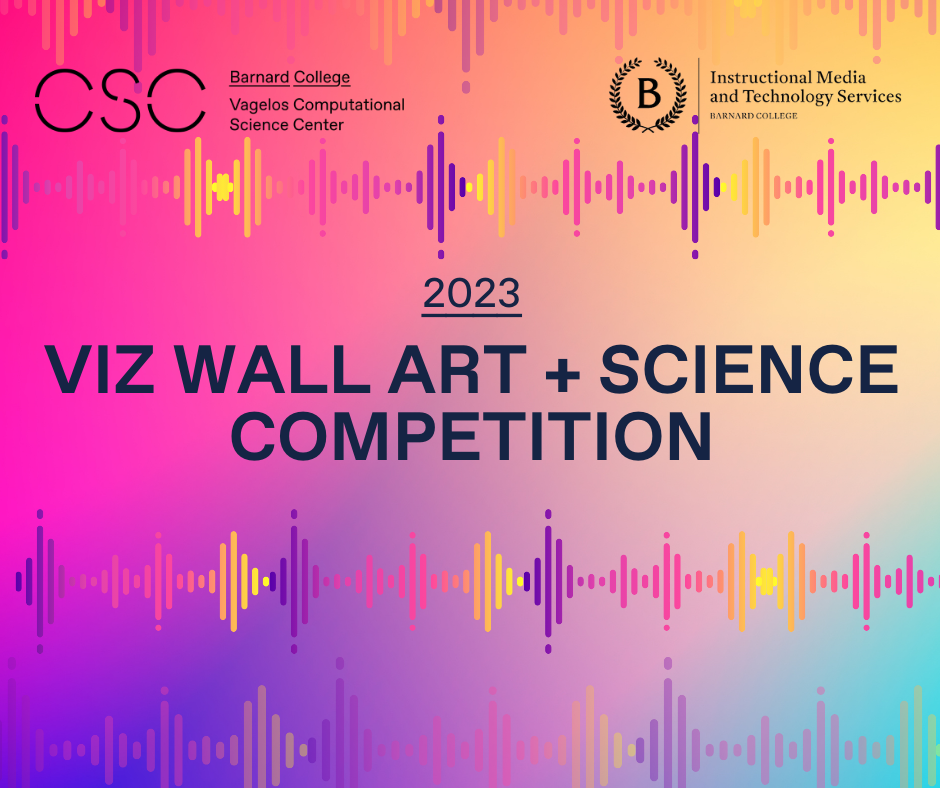
April 28, 2023 | 12:00pm - 1:00pm
516 Milstein
Barnard IMATS and CSC Art + Tech Viz Wall Showcase
Join us in person as the Art + Science finalists present their interactive projects. The finalists are Eris Gao (BC '24, CS and Architecture), Skylar Li (CU '23, Biomedical Engineering), Elijah Zulu (CU '23, CS), Aaron McKeever (CU '23, Information Science), and David Lee (CU ' 25, CS).
Winning proposals include:
- Simulations of pathogenic bacteria and human heartbeats
- Generating flowers and plants that repond to real-world deforestation
- The sonification of art
- Visualizing and documenting traditional flora
- Simulating slime molds
Come by, ask questions, interact with the wall, and eat some snacks!
__________________________________________________________________________________
This event takes place in person only (516 Milstein).
For more information about the Barnard CSC, go to https://www.csc.barnard.edu or follow us on Instagram and Twitter (@barnard_csc).
2021-2022 Academic Year
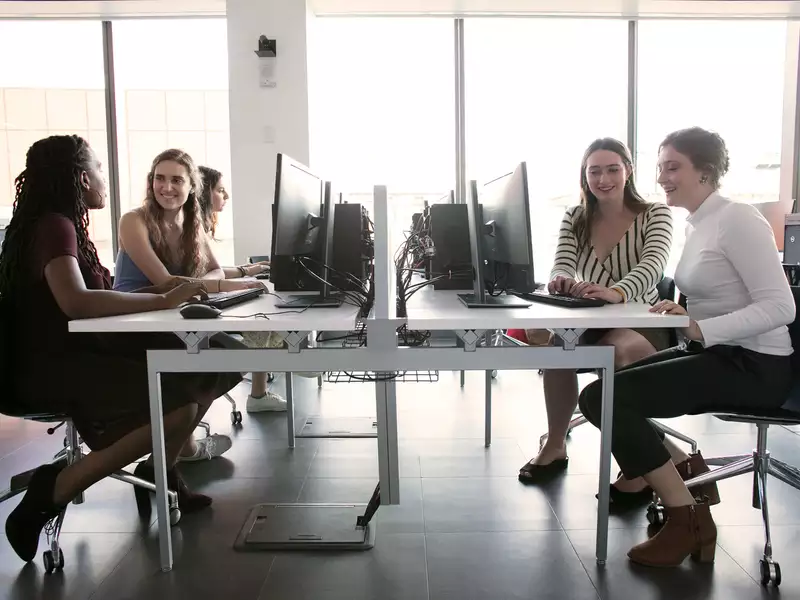
September 10, 2021 | 12:00pm - 2:00pm
Hybrid / 516 Milstein + Zoom
Welcome back! The Vagelos Computational Science Center (CSC) is excited to kick off another series of computational workshops for the Fall 2021 semester.
We begin with an exciting introductory workshop featuring Barnard faculty from across the sciences, social sciences, arts, and humanities. Each presenter gives a 30-minute overview of how and why they use computation in their work.
Topics and presenters include:
Matching Algorithms in Economics, Rajiv Sethi, Professor of Economics
Prof. Sethi discusses how computing is used to solve matching problems in economics and beyond: matching buyers and sellers in financial markets, drivers and riders in ride-hailing apps, children and schools in systems with school choice, voters and candidates in ranked-choice elections, students and classes in colleges, kidney donors and recipients with compatible blood types, medical residents and hospitals, and people seeking life-partners with each other.
Computational Sound, Mark Santolucito, Assistant Professor of Computer Science
Prof. Santolucito develops techniques to provide programmers and non-programmers alike new ways to interface with code. To do this, his team of researchers works on the theory side to understand the nature of computation, and on the applications side to build program synthesis-enabled computer music tools.
Spatializing Student Demographics, Erika Kitzmiller, Term Assistant Professor of Education
Prof. Kitzmiller demonstrates how to use yearbook data and ancestry.com to create a database of student demographics from a Philadelphia high school. Participants consider how to use GIS technologies to plot these demographic data points against citywide census data.
Big Data from Small Cells, JJ Miranda, Assistant Professor Biology
Prof. Miranda gives a brief overview of computational methods to study how populations of cancer cells behave like diverse individuals.
Workshop participants are encouraged to follow along and ask questions! No prior experience in coding or computation is needed.
This workshop takes place in person (516 Milstein) and on Zoom.
For more information about the Barnard CSC, go to https://www.csc.barnard.edu or follow us on Instagram and Twitter (@barnard_csc), and Facebook.
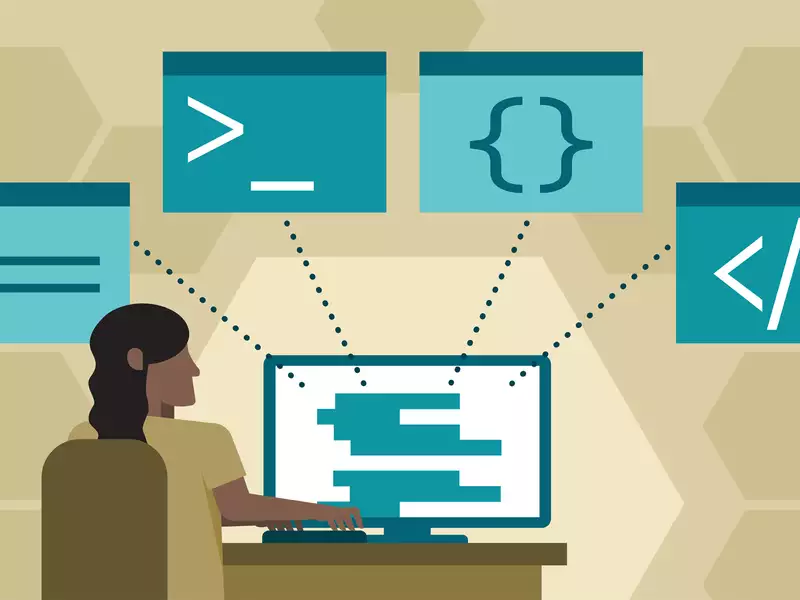
September 24, 2021 | 12:00pm - 2:00pm
Hybrid / 516 Milstein + Zoom
Learn the basics of HTML, CSS and web design by creating your own personal website! In this workshop, we walk through the process of structuring your website content through HTML and adding style with CSS. We also introduce concepts about web design best practices. Leave this workshop with the start of a website that you can build on and a list of resources to continue learning more.
This workshop is aimed at beginners, and absolutely no coding experience is necessary!
Led by Elana Altman, Associate Director for UX & Academic Technologies at IMATS.
This workshop takes place in person (516 Milstein) and on Zoom.
For more information about the Barnard CSC, go to https://www.csc.barnard.edu or follow us on Instagram and Twitter (@barnard_csc), and Facebook.
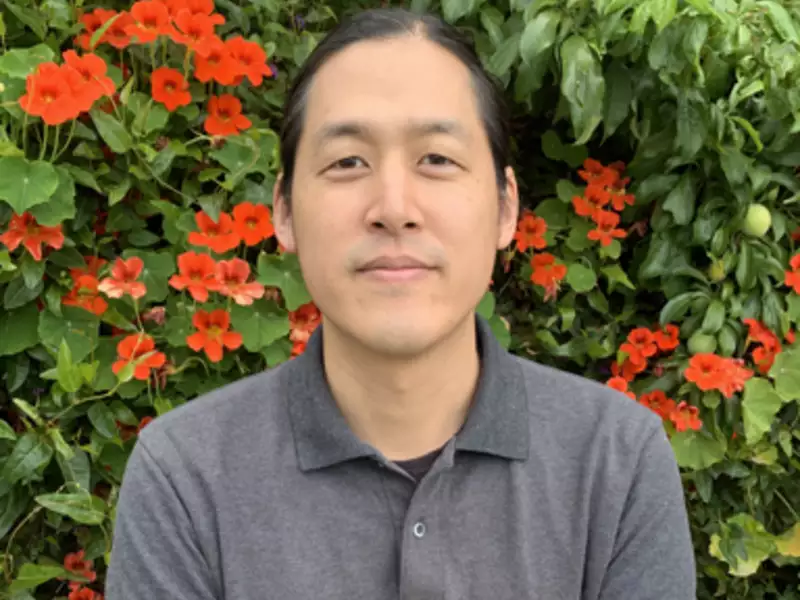
September 27, 2021 | 6:00pm
Zoom
The Barnard CSC is excited to kick off our first Diversity in Computing Speaker series with Dr. Theodore Kim, Associate Professor of Computer Science at Yale University.
Watch it here on our Youtube Channel!
Anti-Racist Computer Graphics Research
Many of the basic research problems we take for granted in computer graphics contain insidious assumptions about race. These troubling issues pre-date computer graphics, and can be traced back to the film technology and techniques from the analog era. Far from being incidental, they directly determine the physical formulations and numerical algorithms we use to depict virtual humans today. Instead of perpetuating the prejudices of previous eras, can we engage in anti-racist research that works to dismantle it?
Theodore Kim is an Associate Professor in Computer Science at Yale University, where he investigates biomechanical solids, fluid dynamics, and selected topics in geometry. Previously, he was a Senior Research Scientist at Pixar Animation Studios. He is the recipient of the NSF CAREER Award, multiple Best Paper awards, and a Scientific and Technical Academy Award (SciTech Oscar). His algorithms have appeared in over 20 films, and he has screen credits for Cars 3, Coco, Incredibles 2, and Toy Story 4. His first (uncredited) work appeared on-screen on the Sorting Hat in Harry Potter and the Sorcerer’s Stone.
_________________________________________________________________________________________
As part of the Year of Science @ Barnard College, the Vagelos Computational Science Center (CSC) is excited to announce our first Diversity in Computing Speaker Series. This series runs for the 2021–2022 academic year and features talks from scholars and practitioners in computational fields who explore what DEI (diversity, equity, and inclusion) looks like in STEM.
There is an urgent need to more fully consider the ethical and social implications of computing and its applications: for example, in designing addictive social media platforms or in using AI for facial or name recognition, which can lead to housing discrimination, racial biases in job hiring, or restrictions on personal freedoms through public and private surveillance.
To better understand how to counter these biases, this series rethinks STEM disciplines from the inside out. We invite one leader in a STEM field every month to speak about the work they are doing to diversify and broaden inclusion in their fields by either sharing their research, their experiences and initiatives in industry or academia, or their thoughts on how power structures within computing disciplines should be transformed to create more equitable systems.
This event takes place on Zoom only.
For more information about the Barnard CSC, go to https://www.csc.barnard.edu or follow us on Instagram and Twitter (@barnard_csc), and Facebook.

October 8, 2021 | 12:00pm - 2:00pm
Hybrid / 516 Milstein + Zoom
What is Version Control? What is Git? Why is it important?
This workshop concerns the fundamentals of version control using Git and GitHub and gives an overview of basic functions, commands, and uses in a project workflow. The first half of this workshop is a lecture followed by a live line command demonstration.
Led by Sarah Morrison-Smith, Roman Family Teaching and Research Fellow in the Department of Computer Science.
This workshop takes place in person (516 Milstein) and on Zoom.
For more information about the Barnard CSC, go to https://www.csc.barnard.edu or follow us on Instagram and Twitter (@barnard_csc), and Facebook.
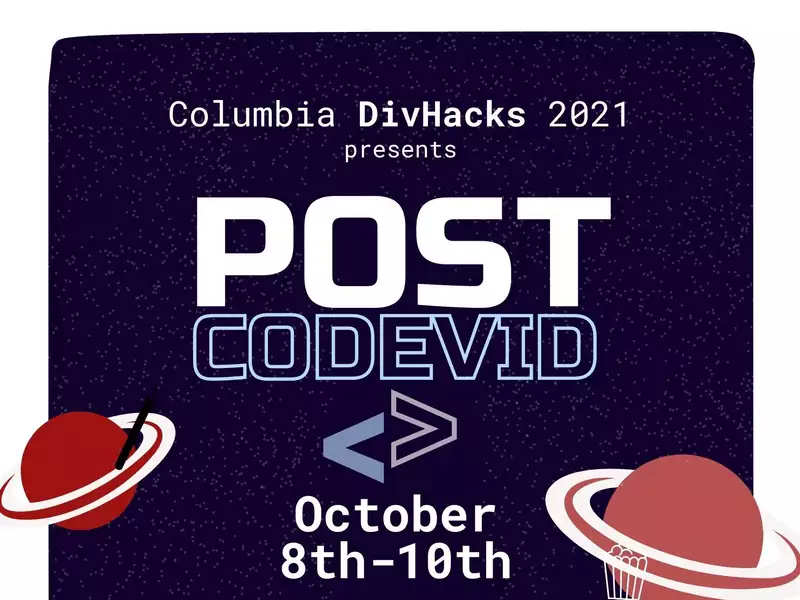
October 8, 2021 - October 10, 2021 | 8:00am - 9:00pm
Computer Science at Barnard College and the Vagelos Computational Science Center are proud sponsors of the Fall 2021 Diversity Hackathon (DivHacks) on October 8-10, 2021. DivHacks is Columbia University's premier student-led annual diversity hackathon. DivHacks was founded in the spring of 2017 as a collaboration between three student tech organizations at Columbia University to promote diversity in computer science, specifically gender and racial diversity. Over the past four years, DivHacks has welcomed attendees from all over the tri-state area.
This year's theme is focused on how we can use technology to reimagine and influence a future post-COVID world.
Learn more at www.columbiadivhacks.com
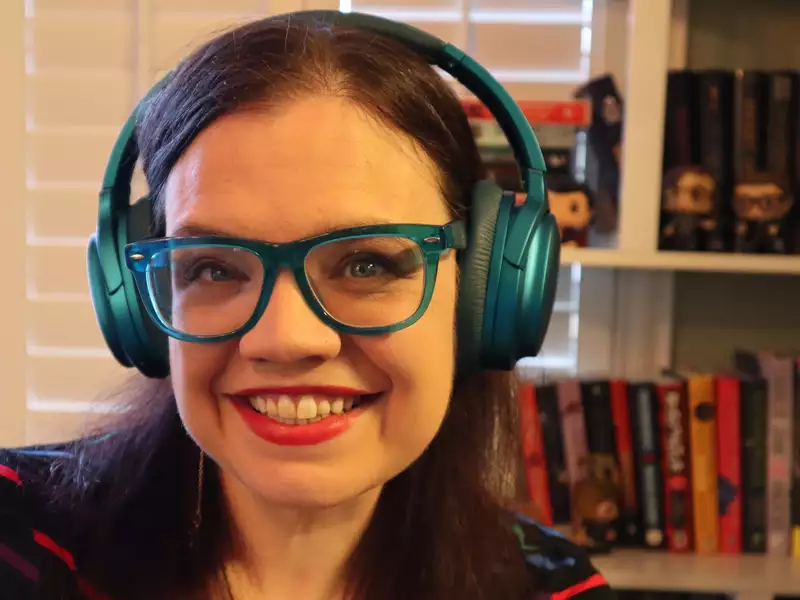
October 12, 2021 | 6:00pm - 7:00pm
Zoom
The Barnard CSC is excited about our second Diversity in Computing Speaker, Dr. Casey Fiesler, Assistant Professor of Information Science at University of Colorado Boulder.
Watch it here on our Youtube Channel!
Three Lessons Towards Ethical Tech
Hardly a day passes without a new technology ethics scandal--from privacy violations on social media platform to biased algorithms to controversial data collection for training facial recognition systems. In computing practice and research, good intentions sometimes still lead to negative consequences. This talk describes three lessons from my research that inform ethical practices in studying, building, and teaching about technology: (1) empirical work towards best practices for research ethics in data science, including understanding possible harms from data collected without consent; (2) ethical debt (as a parallel to technical debt) in technology design and research as the precursor to the types of unintended consequences that underly ethical controversies; and (3) the importance of empowering everyone to not just create but to critique technology.
Casey Fiesler is an assistant professor in Information Science (and Computer Science by courtesy) at University of Colorado Boulder, as well as a Fellow in the Silicon Flatirons Institute for Law, Technology, and Entrepreneurship at University of Colorado Law School. She researches and teaches in the areas of technology ethics, internet law and policy, and online communities. Her work on research ethics for data science, ethics education in computing, and broadening participation in computing is supported by the National Science Foundation, and she is the recipient of an NSF CAREER Award. Also a public scholar, she is a frequent commentator and speaker on topics of technology ethics and policy, and her research has been covered everywhere from The New York Times to Teen Vogue, but she's most proud of her TikToks. She holds a PhD in Human-Centered Computing from Georgia Tech and a JD from Vanderbilt Law School.
As part of the Year of Science @ Barnard College, the Vagelos Computational Science Center (CSC) is excited to announce our first Diversity in Computing Speaker Series. This series runs for the 2021–2022 academic year and features talks from scholars and practitioners in computational fields who explore what DEI (diversity, equity, and inclusion) looks like in STEM.
There is an urgent need to more fully consider the ethical and social implications of computing and its applications: for example, in designing addictive social media platforms or in using AI for facial or name recognition, which can lead to housing discrimination, racial biases in job hiring, or restrictions on personal freedoms through public and private surveillance.
To better understand how to counter these biases, this series rethinks STEM disciplines from the inside out. We invite one leader in a STEM field every month to speak about the work they are doing to diversify and broaden inclusion in their fields by either sharing their research, their experiences and initiatives in industry or academia, or their thoughts on how power structures within computing disciplines should be transformed to create more equitable systems.
This event takes place on Zoom only.
For more information about the Barnard CSC, go to https://www.csc.barnard.edu or follow us on Instagram and Twitter (@barnard_csc), and Facebook.
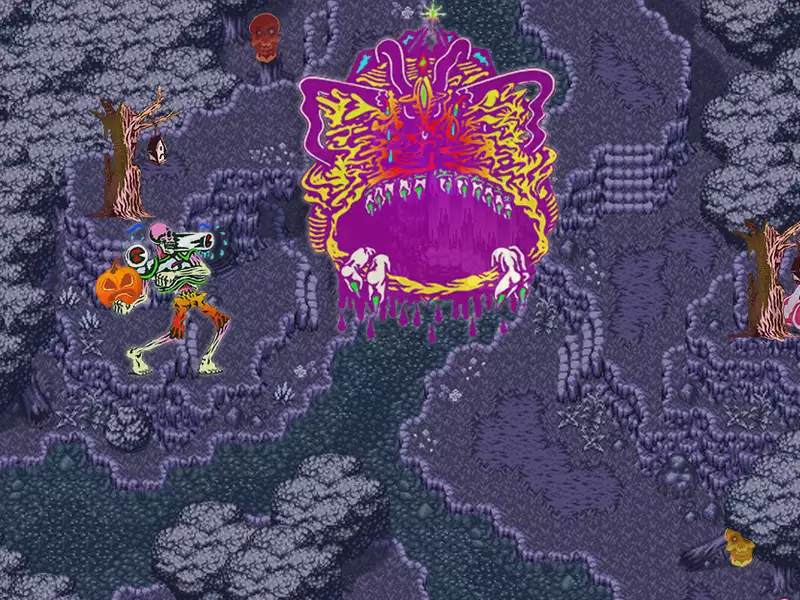
October 22, 2021 | 12:00pm - 2:00pm
Hybrid / 516 Milstein + Zoom
Learn how to design a Spooky game using Unity and C#! This workshop covers the basics of using Visual Studio Code and Unity’s object-oriented interface to create a 2D game using art, graphics, sound, and interactive elements. We have a monster-making toolkit ready for you to make your own scary ghouls and ghosts, or you can get creative and animate your own hand drawings!
Don’t be scared! No prior experience in coding, C#, or Unity is necessary. This is an introductory workshop covering game design basics (including the design of 2D or FlatGames), animation, and entry-level coding for game-making.
For a less frightening sneak preview, watch the inventor of Super Mario Brothers, Shigeru Miyamoto, talk about his game design philosophy: here.
Led by artist and designer, Aude Jomini and CSC Associate Director, Saima Akhtar.
This workshop takes place in person (516 Milstein) and on Zoom.
For more information about the Barnard CSC, go to https://www.csc.barnard.edu or follow us on Instagram and Twitter (@barnard_csc), and Facebook.
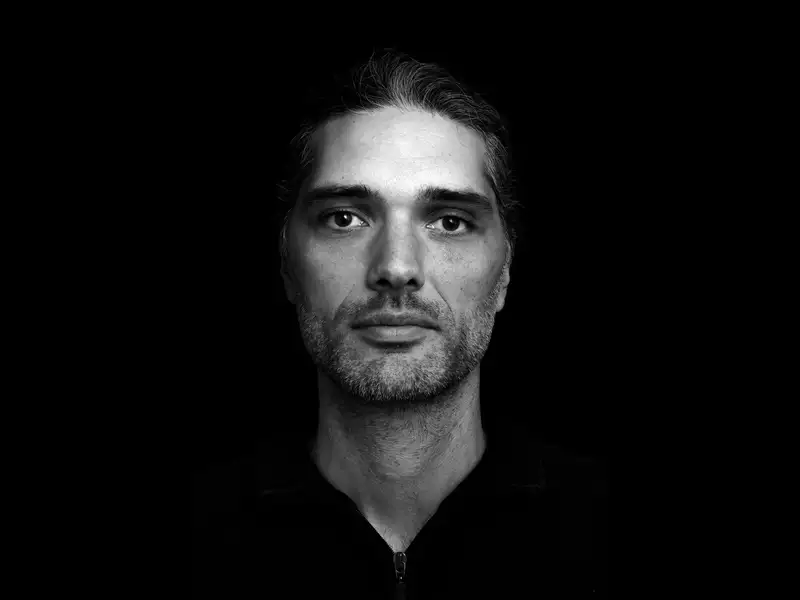
October 27, 2021 | 12:00pm - 1:00pm
Zoom
The CSC and program in Computer Science are excited to host a talk with Berlin-based artist and technologist Jan Nikolai Nelles. This talk takes place as part of the Arts and Computing in NYC course offered between Barnard and the Fashion Institute of Technology (FIT). We're also grateful for support from Barnard's Digital Humanities Center.
Watch it here on our Youtube Channel!
Preserving A Future: Technoheritage and the Politics of Digital Preservation
What do Queen Nefertiti's bust, dinosaur skeletons, and the culturally fracked Buddha's head have in common? In a version of an artist's talk, Berlin-based artist and technologist Jan Nikolai Nelles asks: Do digital versions of these objects exist separately from the physical artifacts and their disputed histories?
Relegated to temperature-controlled museum spaces, prehistoric life-forms and colonial objects are dying a second death. For example, religious artifacts collected largely by Western museums often spend their afterlives in warehouses, justified under the guise of "scientific" preservation practices that mandate finely controlled environments.
The advent of 3D printing and scanning has enabled institutions to create digital copies of these objects, which often replicates fraught colonial relationships of ownership and belonging. With these technologies now widely available via discrete hand-held devices and more advanced scanning instruments, this talk asks how the dynamics of ownership and control are made digital and what this might have to do with the use of computing as an artistic medium.
Jan Nikolai Nelles is a multidisciplinary media artist based in Berlin, Germany. His work pursues approaches in the traditions of institutional critique and decolonial practices. His art counteracts dominant narratives and the condition of cultural fracking by a majority society. Generating challenges for cultural institutions, including public museums, through civil disobedience and creating techno heritage. His practice reflects on technology's potential to contribute to collective imaginaries. Overall, his practice attends to the absurdity of the human condition.
He has received grants for his work from the Haus der Kulturen der Welt, Goethe- Institut, Institut für Auslandsbeziehungen, German Federal Foreign Office European Cultural Foundation, and the Berlin Senate. He has exhibited in the Victoria and Albert Museum’s Applied Arts Pavilion at La Biennale di Venezia, the 3rd Istanbul Design Biennial, ZKM Karlsruhe, Dublin’s Science Gallery, NRW Forum, Space Fundacion Telefonica, Berliner Herbstsalon – Gorki Theater, Ars Electronica, Abandon Normal Devices, The Influencers, and Gray Area Festival Art & Technology, among others.
His work has been featured in The New York Times, BBC, The Times, Artnet, Wired, Le Monde Afrique, Financial Times, Arte TV, The Independent, New Statesmen, Hyperallergic, Smithsonian, Al Ahram, Egypt Today, Vice, Hürriyet, Frankfurter Allgemeine Sonntagszeitung, Spiegel Online, Heise, The Boston Globe, Dezeen, Archdaily, Polska, La informacion, De Volkskrant, Gizmodo, New Scientist, Popular Science and The Verge among others.
This talk takes place on Zoom only.
For more information about the Barnard CSC, go to https://www.csc.barnard.edu or follow us on Instagram and Twitter (@barnard_csc), and Facebook.
For more information about the Barnard CS, go to https://cs.barnard.edu/ or follow us on Instagram and Facebook.
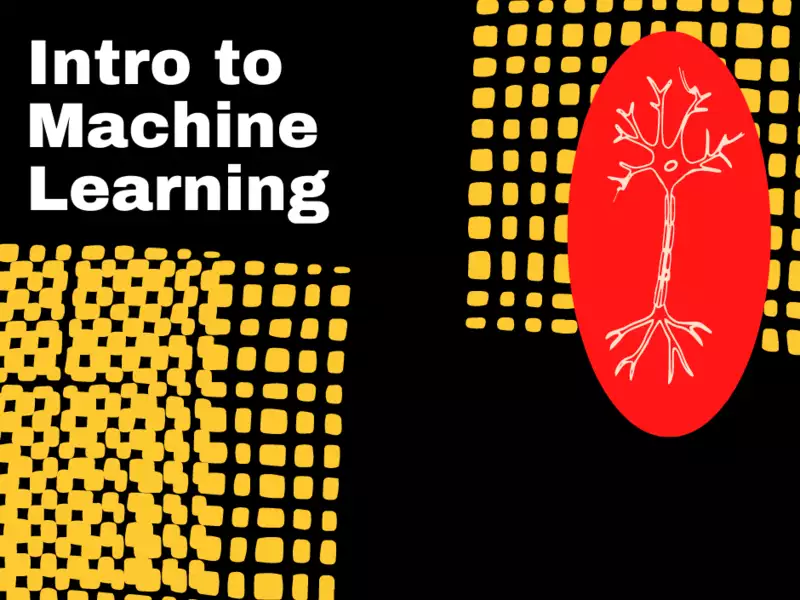
November 5, 2021 | 12:00pm - 2:00pm
Hybrid / 516 Milstein + Zoom
This is an introductory workshop on machine learning using Python, scikit-learn, and PyTorch. It covers data pre-processing, classification, clustering, and regression.
Some experience in Python is helpful, though not necessary.
Led by Senior Software & Applications Developer and CSC Technical Manager, Marko Krkeljas.
This workshop takes place in person (516 Milstein) and on Zoom.
For more information about the Barnard CSC, go to https://www.csc.barnard.edu or follow us on Instagram and Twitter (@barnard_csc), and Facebook.
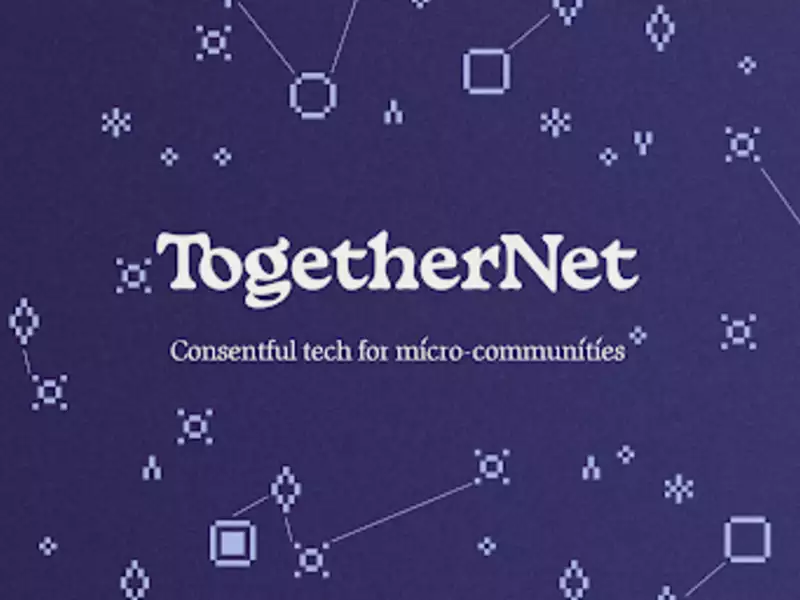
November 12, 2021 | 2:00pm - 4:00pm
Hybrid / 516 Milstein + Zoom
Consentful Software Design
The CSC and Design Center are excited to host interdisciplinary artist and community organizer, Xin Xin, who demonstrates Togethernet, an open-source software that invites groups of 10 or less participants to build community archives through practices of consent.
Consentful Software Design is a hybrid lecture and an in-person workshop that breaks down the design process of Togethernet, an open-source software that invites groups of 10 or fewer participants to build community archives through practices of consent. Designed around the ethos of data transparency and consent, Togethernet's goal is to transform digital rights policies such as the right to be forgotten into an embodied practice through reimagining software architecture and user experience. This tool and initiative stands on the shoulders of Consentful Tech Zine by Una Lee and Dann Toliver and Design Justice Network Principles — by considering transparency and consent every step of the way, the source code serves as both a technical and a moral document that seeks to uncover systems of power and uncertainties embedded in network technologies.
This is a great opportunity for those who hope to learn more about Togethernet through participation. We cover basic HTML / CSS editing to customize alternative designs of Togethernet. This is a hybrid talk and workshop that takes place in person (516 Milstein) and on Zoom. In-person attendance is limited to 24 participants.
Schedule:
2-3pm ET: Talk and overview of Togethernet
3-4pm ET: Workshop demonstration
Complimentary Readings
- Consentful Tech Zine, Una Lee & Dann Toliver
- Data Healing, Yaa Addae
- Design Justice Network Principles, Design Justice Network
- The Consent Checklist, Meg-John Barker
- Ask: Building Consent Culture, Kitty Stryker
- Dark Patterns, Alexander Darlington and Harry Brignull
- Privacy Framework Comparisons (Dec. 2018), Center For Democracy & Technology
Talk and Workshop led by Xin Xin, Assistant Professor of Interaction and Media Design at the Parsons School of Design.
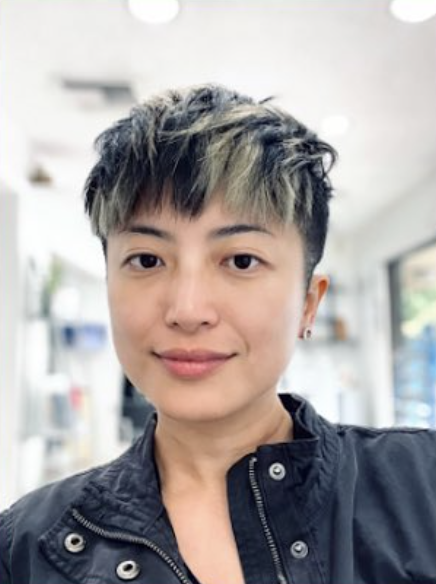
Xin Xin is an interdisciplinary artist and community organizer currently making socially-engaged software that explores the possibilities of reshaping language and power relations. Through mediating, subverting, and innovating modes of social interaction in the digital space, Xin invites participants to relate to one another and experience togetherness in new and unfamiliar ways.
As an artist, their work has been exhibited internationally at Ars Electronica, DIS, Gene Siskel Film Center, Tiger Strikes Asteroid and Machine Project. Most recently their project Togethernet was selected for the 2020 Rapid Response for a Better Digital Future Fellowship at Eyebeam. They are also an 2021 Art of Practice Fellow and Community Leader at the Sundance Institute. As an organizer, Xin co-founded voidLab, a LA-based intersectional feminist collective dedicated to women, trans, and queer folks. They were the Director for Processing Community Day 2019 and they serve on the advisory board for the Processing Foundation.
Born in Taipei, Taiwan and raised in Massachusetts, United States. Xin identifies as a cross-cultural, non-binary, anarcho-feminist and will probably always have a genre-nonconforming practice. Xin received their M.F.A from UCLA Design Media Arts and teaches at Parsons School of Design as an Assistant Professor of Interaction and Media Design.
_____________________________________________________________________________________________
This event takes place in person (516 Milstein) and on Zoom. In person attendance is limited to 24 people (Columbia-affiliates only).
For more information about the Barnard CSC, go to https://www.csc.barnard.edu or follow us on Instagram and Twitter (@barnard_csc), and Facebook.
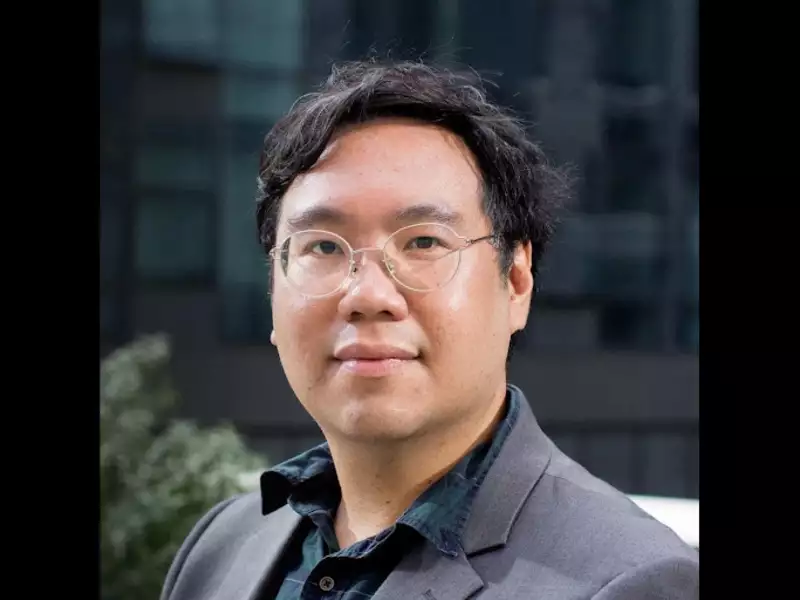
November 15, 2021 | 6:00pm - 7:00pm
Zoom
The Barnard CSC is excited about our third Diversity in Computing Speaker, Dr. Jiahao Chen, Chief Technology Officer of Parity AI.
Watch it here on our Youtube Channel!
Practicing what you Publish: From Academia to an Anti-Racist AI Startup
Dr. Chen discusses how his thinking on diversity, equity and inclusion (DEI) is informed by his work on fairness and ethics in algorithmic decision making, which has evolved throughout his nontraditional career path. He's gone from academia and research software engineering, to industrial positions in large companies and startups. He shares some challenges he has encountered in taking ideas from research to concrete practical code and policy, like ethical harms assessments, privacy risks like deidentification, and difficulties faced in measuring outcomes and errors. These factors come together to complicate practices that measure inclusivity and mitigate bias. This motivates Parity AI's work, which is to build anti-racist, responsible AI solutions for enterprises, particularly in highly regulated industries like finance, healthcare, and hiring.
Jiahao Chen is the incoming Chief Technology Officer at Parity AI (getparity.ai), a startup focused on AI ethics and bridging the translation gap between risk, legal, and data teams. He is an outgoing AI Research Director at JPMorgan AI Research in New York, with research focusing on holistic design of responsible AI systems, incorporating fairness, explainability, privacy, governance, etc. as first-class considerations. He was previously a Senior Manager of Data Science at Capital One focusing on machine learning research for credit analytics and retail operations. When still in academia, Jiahao was a Research Scientist at MIT CSAIL where he co-founded and led the Julia Lab, focusing on applications of the Julia programming language to data science, scientific computing, and machine learning. Jiahao has organized JuliaCon, the Julia conference, for the years 2014-2016, as well as organized workshops at NeurIPS, SIAM CSE, and the American Chemical Society National Meetings. Jiahao has authored over 120 packages for numerical computation, data science and machine learning for the Julia programming language, in addition to numerous contributions to the base language itself, and has published over 50 peer-reviewed papers.
As part of the Year of Science @ Barnard College, the Vagelos Computational Science Center (CSC) is excited to announce our first Diversity in Computing Speaker Series. This series runs for the 2021–2022 academic year and features talks from scholars and practitioners in computational fields who explore what DEI (diversity, equity, and inclusion) looks like in STEM.
There is an urgent need to more fully consider the ethical and social implications of computing and its applications: for example, in designing addictive social media platforms or in using AI for facial or name recognition, which can lead to housing discrimination, racial biases in job hiring, or restrictions on personal freedoms through public and private surveillance.
To better understand how to counter these biases, this series rethinks STEM disciplines from the inside out. We invite one leader in a STEM field every month to speak about the work they are doing to diversify and broaden inclusion in their fields by either sharing their research, their experiences and initiatives in industry or academia, or their thoughts on how power structures within computing disciplines should be transformed to create more equitable systems.
This event takes place on Zoom only.
For more information about the Barnard CSC, go to https://www.csc.barnard.edu or follow us on Instagram and Twitter (@barnard_csc), and Facebook.
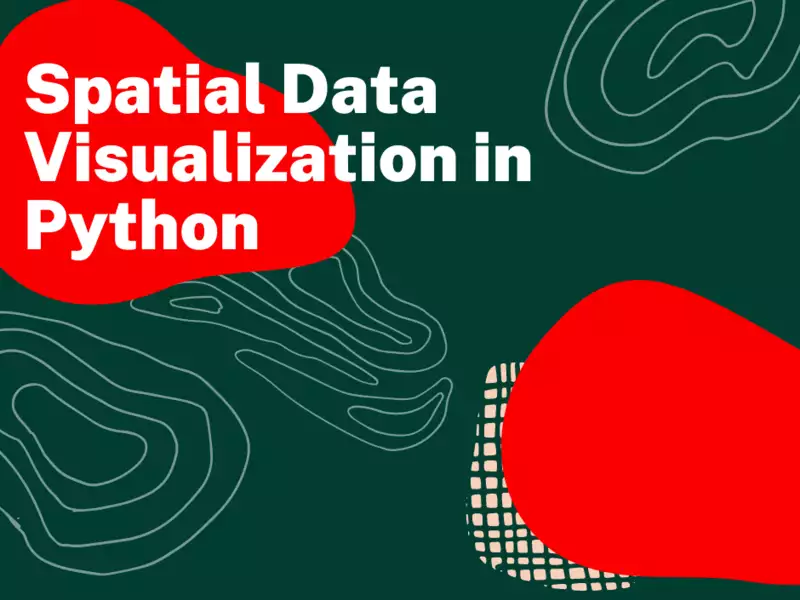
November 19, 2021 | 12:00pm - 2:00pm
Hybrid / 516 Milstein + Zoom
This workshop is an introduction to spatial data manipulation and visualization in Python. It covers loading spatial data, working with projections, merging data, and creating a choropleth map.
This workshop is open to anyone, but some experience with either GIS or Python is helpful!
Led by Associate Director for the Empirical Reasoning Center, Fatima Koli.
This workshop takes place in person (516 Milstein) and on Zoom.
For more information about the Barnard CSC, go to https://www.csc.barnard.edu or follow us on Instagram and Twitter (@barnard_csc), and Facebook.
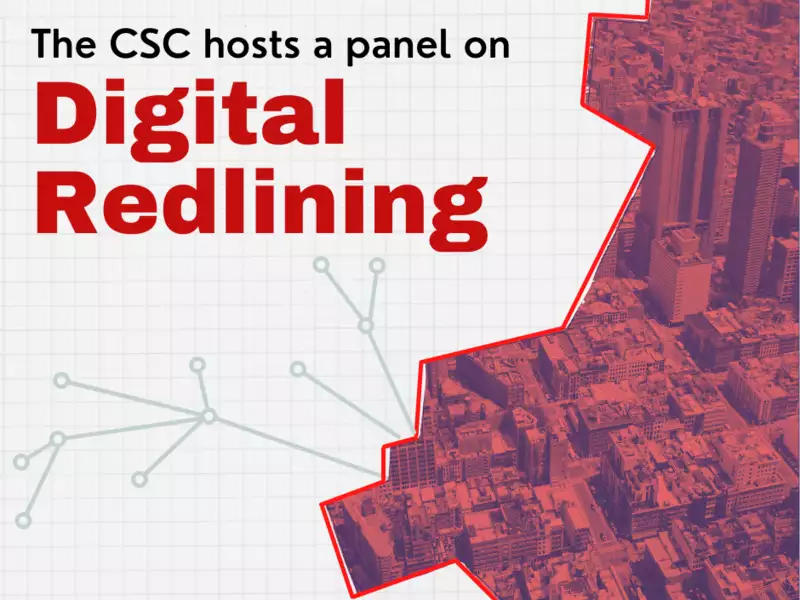
November 19, 2021 | 2:30pm - 3:30pm
Zoom
The CSC, in collaboration with the Undesign the Redline team, is excited to host a panel discussion on Digital Redlining. This panel takes place as part of the ongoing exploration of the Undesign the Redline exhibition, displayed on the first floor of the Milstein Center at Barnard College.
Watch this talk here!
Digital Redlining: A Panel Discussion
The Undesign the Redline exhibit at Barnard College explores the history of structural racism and inequality and how these designs compounded each other from the 1938 Redlining maps until today. This Digital Redlining panel convenes community organizers and experts on the effect that technology has had on exacerbating these century-old redlining tools via broadband accessibility, biases in mortgage lending, and more. Panelists include Emmanuel Martinez, Investigative Data Journalist at The Markup, Chris Gilliard, Visiting Research Fellow, Harvard Kennedy School Shorenstein Center and a Detroit-based writer, professor and speaker on digital privacy, and Greta Byrum, program director for the Social Science Research Council’s Just Tech program. The panel is moderated by CSC Associate Director Saima Akhtar.
This panel takes place on Zoom only.
For more information about the Barnard CSC, go to https://www.csc.barnard.edu or follow us on Instagram and Twitter (@barnard_csc), and Facebook.
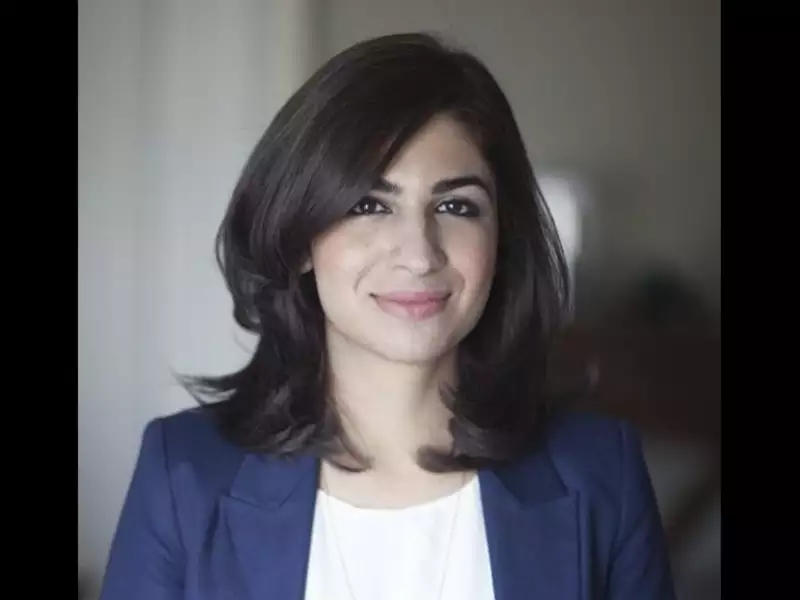
December 6, 2021 | 6:00pm - 7:00pm
Zoom
The Barnard CSC is excited about our fourth Diversity in Computing Speaker, Saba Gul, technologist and entrepreneur.
Watch it here on our Youtube Channel!
One-Size-Fails-All: Building Socially Scalable Tech
Product development at tech startups often abides by the doctrine that technology is neutral with respect to geography and culture because all users are the same. When digital platforms neglect to build teams with diverse social experiences and multi-disciplinary training that can inform product impact and anticipate risks, they can cause profound harm in the world. The effects of these harms are disproportionately borne by the most vulnerable users.
In this talk, Saba Gul draws from her wide-ranging work around the globe as a Pakistani, female technologist to explore the concept of ‘social scalability’—building products that carry an awareness of the social systems they will become a part of, and that can respond to society-level needs, not only user-level ones. Using her own experience building products and startups as case studies, she discusses technology and business solutions to mitigate the harm perpetuated by tech platforms and their growth-at-all-costs approach—from features and algorithms, to product design, incentive structures and startup culture. She asks the question: How can technology startups create economic and societal value without wreaking havoc on users, public infrastructure, and economies?
Saba Gul is a technologist and entrepreneur who has built digital products and startups across geographies, including the US, Europe, South Asia, and East Africa. Previously, she was the Founder & CEO of Popinjay, an e-commerce startup with a supply chain spanning Pakistan, Vietnam and China. She has been part of two teams that built the engineering core for billion-dollar companies, and helped launch companies in diverse sectors such as health, ecommerce, mobility and logistics. In 2019, she led the design and development of a first-of-its-kind, AI-driven platform for the Gates Foundation to reduce South Asian infant mortality. Saba was also a graduate researcher in the Genesis group at MIT’s Computer Science and Artificial Intelligence Lab, where she built computational models of how humans tell, perceive, and understand stories. She is a World Economic Forum Global Shaper, a US State Department Generation Change Fellow, and speaks frequently on entrepreneurship and gender at forums like the UN, World Bank, Harvard Business School, and TEDx events. Saba was raised in Pakistan, and holds Bachelor of Science and Master of Engineering degrees from MIT.
As part of the Year of Science @ Barnard College, the Vagelos Computational Science Center (CSC) is excited to announce our first Diversity in Computing Speaker Series. This series runs for the 2021–2022 academic year and features talks from scholars and practitioners in computational fields who explore what DEI (diversity, equity, and inclusion) looks like in STEM.
There is an urgent need to more fully consider the ethical and social implications of computing and its applications: for example, in designing addictive social media platforms or in using AI for facial or name recognition, which can lead to housing discrimination, racial biases in job hiring, or restrictions on personal freedoms through public and private surveillance.
To better understand how to counter these biases, this series rethinks STEM disciplines from the inside out. We invite one leader in a STEM field every month to speak about the work they are doing to diversify and broaden inclusion in their fields by either sharing their research, their experiences and initiatives in industry or academia, or their thoughts on how power structures within computing disciplines should be transformed to create more equitable systems.
This event takes place on Zoom only.
For more information about the Barnard CSC, go to https://www.csc.barnard.edu or follow us on Instagram and Twitter (@barnard_csc), and Facebook.
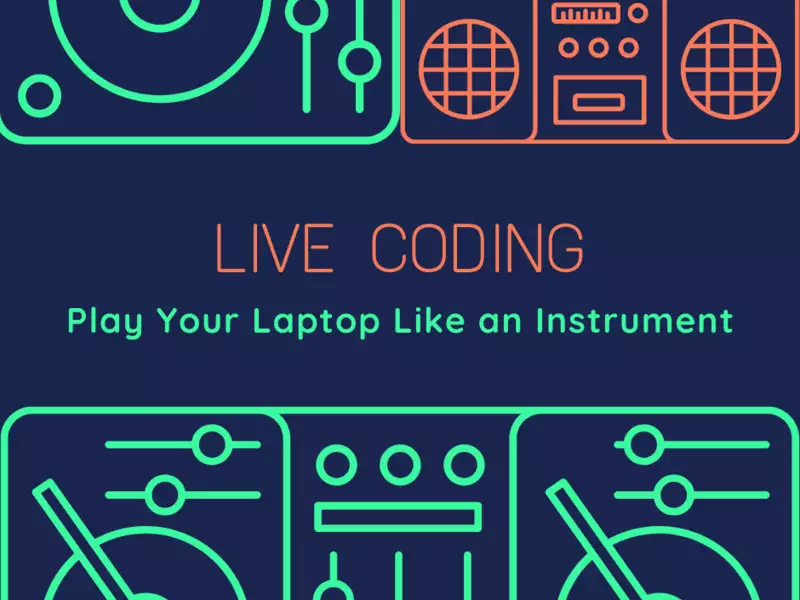
December 10, 2021 | 12:00pm - 2:00pm
Hybrid / 516 Milstein + Zoom
Learn how to turn your laptop into a musical or visual instrument. This workshop covers the basics of Live Coding - the artistic exploration of turning the act of programming into a performative practice.
Prereqs: No coding (or musical) background needed - just an interest!
Co-led by Kat Pompermayer BC '22, Catherine Ji BC '24, Avighna Suresh BC '25, Justin Kim CC '22, and Mark Santolucito, Assistant Professor of Computer Science at Barnard College.
This workshop takes place in person (516 Milstein) and on Zoom.
For more information about the Barnard CSC, go to https://www.csc.barnard.edu or follow us on Instagram and Twitter (@barnard_csc), and Facebook.
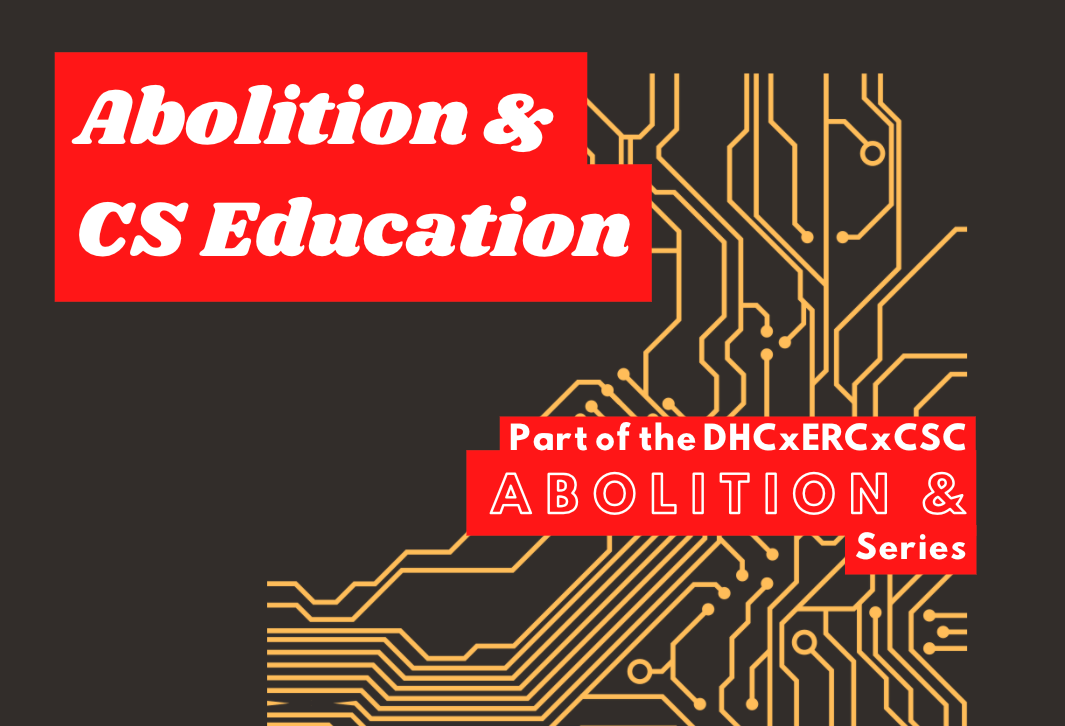
January 28, 2022 | 12:00pm - 2:00pm
Zoom
As part of the Abolition & ______ series co-hosted by the Barnard CSC, ERC, and DHC, we are excited to host this talk and coding workshop on abolition in computer science education.
In this workshop, Stephanie Jones and Natalie Araujo Melo review their recent paper We Tell These Stories to Survive: Towards Abolition in Computer Science Education to illuminate connections between abolition and computing education. They highlight how computing itself isn't neutral, and how what we think and teach within the computing field shapes what we produce. They also discuss the potential role(s) technology plays in abolition, and walk attendees through examples of everyday tech and the software underpinnings.
Led by Stephanie Jones and Natalie Araujo Melo, PhD students at in the Computer Science and Learning Science Program at Northwestern University.
This workshop takes place on Zoom only.
For more information about the Barnard CSC, go to https://www.csc.barnard.edu or follow us on Instagram and Twitter (@barnard_csc), and Facebook.
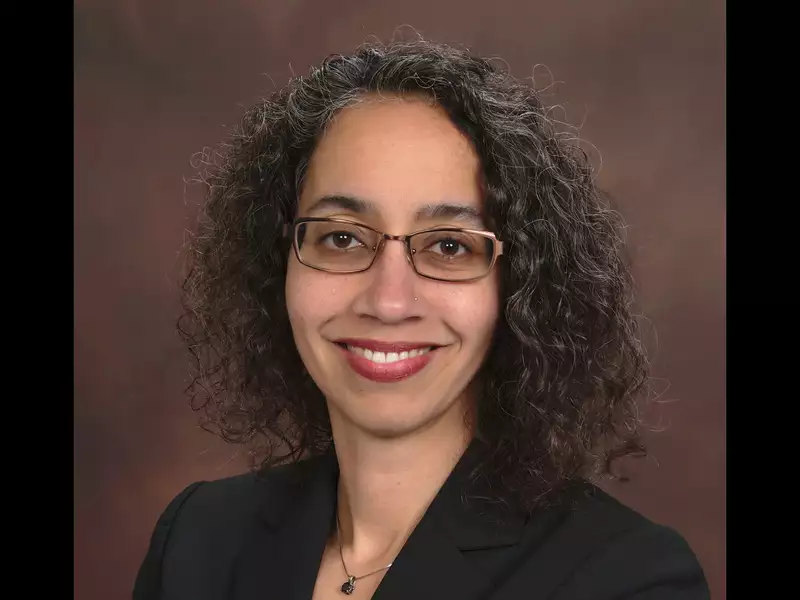
February 7, 2022 | 6:00pm - 7:00pm
Zoom
The Barnard CSC is excited about our Diversity in Computing Speaker, Dr. Talitha Washington, Professor of Mathematics at Clark Atlanta University.
Watch it here on our YouTube Channel!
Empowering Data Science for Social Justice
Data science impacts every facet of our lives: from marketing to finance to voting to facial recognition to medical care. What happens if data science develops technology that amplifies societal biases and blatant racism? Talitha Washington shares her vision on how the STEM community might unite to bring true validity into data science.
Dr. Talitha Washington is the Director of the Atlanta University Center Data Science Initiative and a Professor of Mathematics at Clark Atlanta University. As Director, she oversees and provides strategic direction of data science across Clark Atlanta University, Morehouse College, Morehouse School of Medicine, and Spelman College to increase the number of African Americans with expertise in data science. Washington is a former Program Director at the National Science Foundation (NSF) and a Fellow of the American Mathematical Society and the Association for Women in Mathematics.
As part of the Year of Science @ Barnard College, the Vagelos Computational Science Center (CSC) is excited to announce our first Diversity in Computing Speaker Series. This series runs for the 2021–2022 academic year and features talks from scholars and practitioners in computational fields who explore what DEI (diversity, equity, and inclusion) looks like in STEM.
There is an urgent need to more fully consider the ethical and social implications of computing and its applications: for example, in designing addictive social media platforms or in using AI for facial or name recognition, which can lead to housing discrimination, racial biases in job hiring, or restrictions on personal freedoms through public and private surveillance.
To better understand how to counter these biases, this series rethinks STEM disciplines from the inside out. We invite one leader in a STEM field every month to speak about the work they are doing to diversify and broaden inclusion in their fields by either sharing their research, their experiences and initiatives in industry or academia, or their thoughts on how power structures within computing disciplines should be transformed to create more equitable systems.
This event takes place on Zoom only.
For more information about the Barnard CSC, go to https://www.csc.barnard.edu or follow us on Instagram and Twitter (@barnard_csc), and Facebook.
February 11, 2022 | 12:00pm - 2:00pm
Hybrid / 516 Milstein + Zoom
Part one of a two part workshop on using React JS for building user-interfaces.
This workshop is the first of a two-part workshop dedicated to teaching an accessible way to learn ReactJS, a JavaScript framework for building user interfaces. Students build a custom web application and learn about state management, functions, and common UI/UX patterns.
Led by Marko Krkeljas, Senior Software & Applications Developer and CSC Technical Manager
This workshop takes place in person (516 Milstein) and on Zoom.
For more information about the Barnard CSC, go to https://www.csc.barnard.edu or follow us on Instagram and Twitter (@barnard_csc), and Facebook.
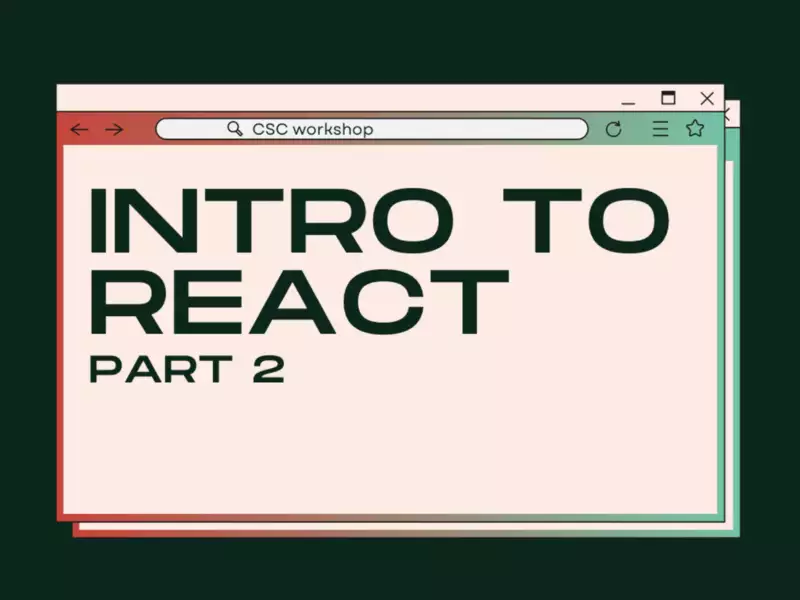
February 25, 2022 | 12:00pm - 2:00pm
Hybrid / 516 Milstein + Zoom
Part two of a two-part workshop on using React JS for building user-interfaces. You can find the documentation for Part I of this series here.
This workshop builds on the Introduction to ReactJS workshop and explores data-fetching, side-effects, and techniques for handling asynchronous operations using promises & async/await.
Led by Marko Krkeljas, Senior Software & Applications Developer and CSC Technical Manager
This workshop takes place in person (516 Milstein) and on Zoom.
For more information about the Barnard CSC, go to https://www.csc.barnard.edu or follow us on Instagram and Twitter (@barnard_csc), and Facebook.
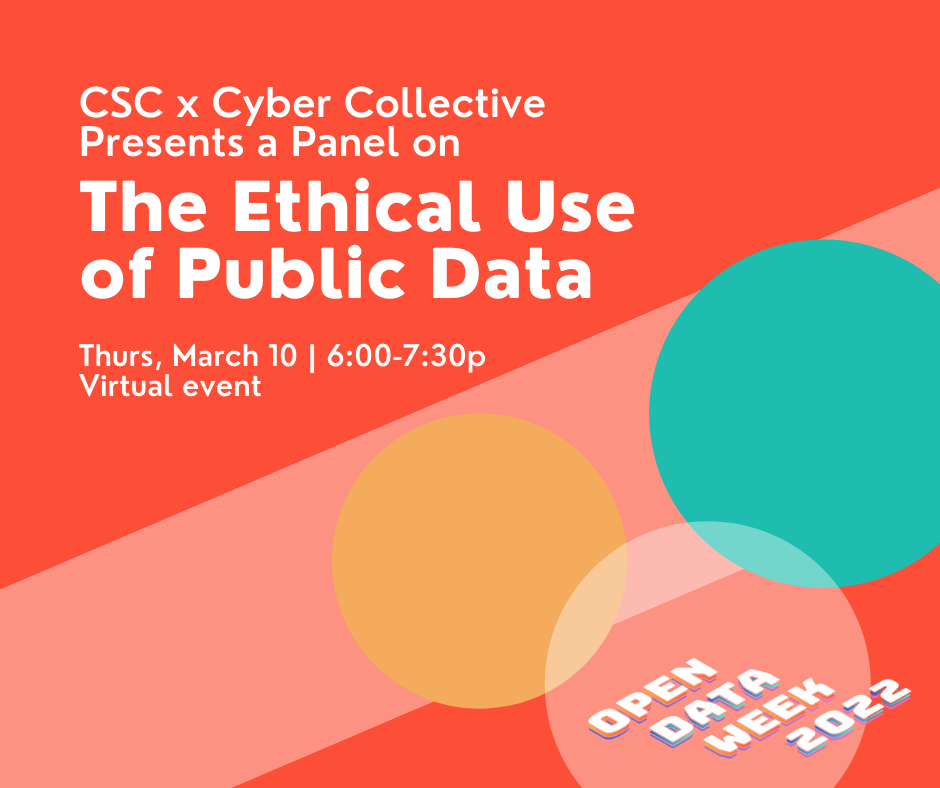
March 10, 2022 | 6:00pm - 7:30pm
Zoom
This panel is taking place as part of NYC Open Data Week. Learn more here.
Barnard CSC x Cyber Collective on the Ethical Use of Public Data
While we celebrate public data and its use for good, we also acknowledge that some use cases of public data can have harmful, unintended consequences. For example, someone can socially engineer, reverse engineer, or develop narratives about neighborhoods or communities that create inferences around sets of data that aren’t accurate or representative. The goal of this panel and discussion is to co-create and arm attendees with sets of questions to ask themselves when working with public data sets. As part of NYC Open Data week, this event brings together members from the Barnard College Computational Science Center (CSC) and Cyber Collective to think through the ethics of using public data. We begin with a panel discussion dedicated to understanding: 1) language and how data are categorized and described and 2) using deductive reasoning to identify unintended consequences when using publicly available data. The second half of the session is dedicated to guiding participants through a dataset in the NYC Open Data database and co-creating a set of questions rooted in principles of racial justice and ethics, which people can ask themselves when sifting through public data.
Panelists // Speakers:
Idalin Bobé is a Philly Native residing in Harlem. She is the founder of TechActivist.Org, Co-founder TechIntersections.Org, and a Human Rights Activist with the Poor People's Campaign: A National Call for Moral Revival. She is currently Head of Ops at Meroxa, focused on building data infrastructure and supporting open source data movement.
Tricia Wang is Co-founder of Sudden Compass and CRADL, The Crypto Research and Design Lab, is a tech ethnographer obsessed with designing equity into systems. Follow her on twitter or instagram @triciawang. www.triciawang.com
Tazin Khan is founder and CEO of Cyber Collective is illuminating the intersection of tech, ethics and democracy through style, humor and authenticity.
Saima Akhtar is the Associate Director of the Vagelos Computational Science Center (CSC) at Barnard College, Columbia University.
This workshop takes place on Zoom only.
For more information about the Barnard CSC, go to https://www.csc.barnard.edu or follow us on Instagram and Twitter (@barnard_csc), and Facebook.
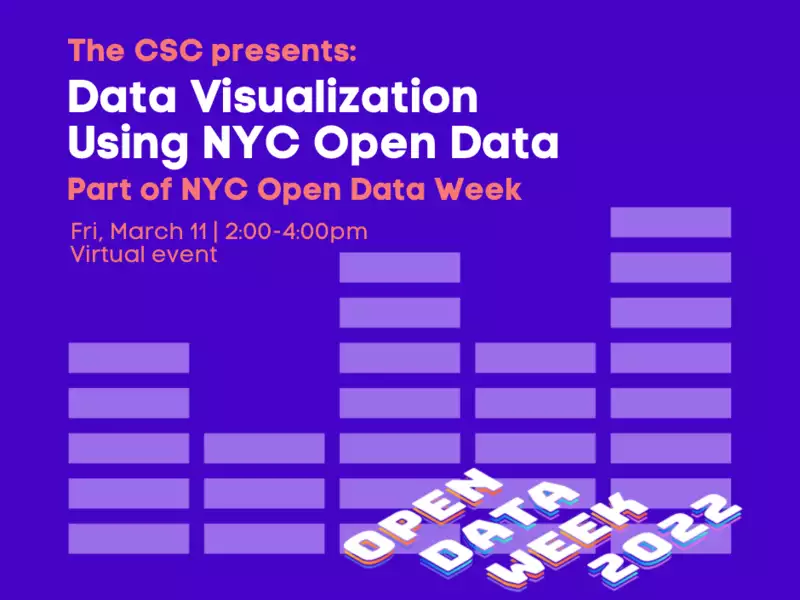
March 11, 2022 | 2:00pm - 4:00pm
Zoom
This panel is taking place as part of NYC Open Data Week. Learn more here.
This workshop gives attendees the tools they need to create complex and beautiful data visualizations with NYC Open Data using the Altair library, while also serving as an introduction to coding in Python. We cover Python basics before diving into DataFrames and data visualizations.
We welcome anyone who wants to create simple to make, yet beautiful and professional-looking data visualizations. No prior coding experience needed.
Led by CSC Postbacc fellow Zoë Webb-Mack and CSC Computing Fellows Pranathi Srirangam and Xueqing Ma.
This workshop takes place on Zoom only.
For more information about the Barnard CSC, go to https://www.csc.barnard.edu or follow us on Instagram and Twitter (@barnard_csc), and Facebook.
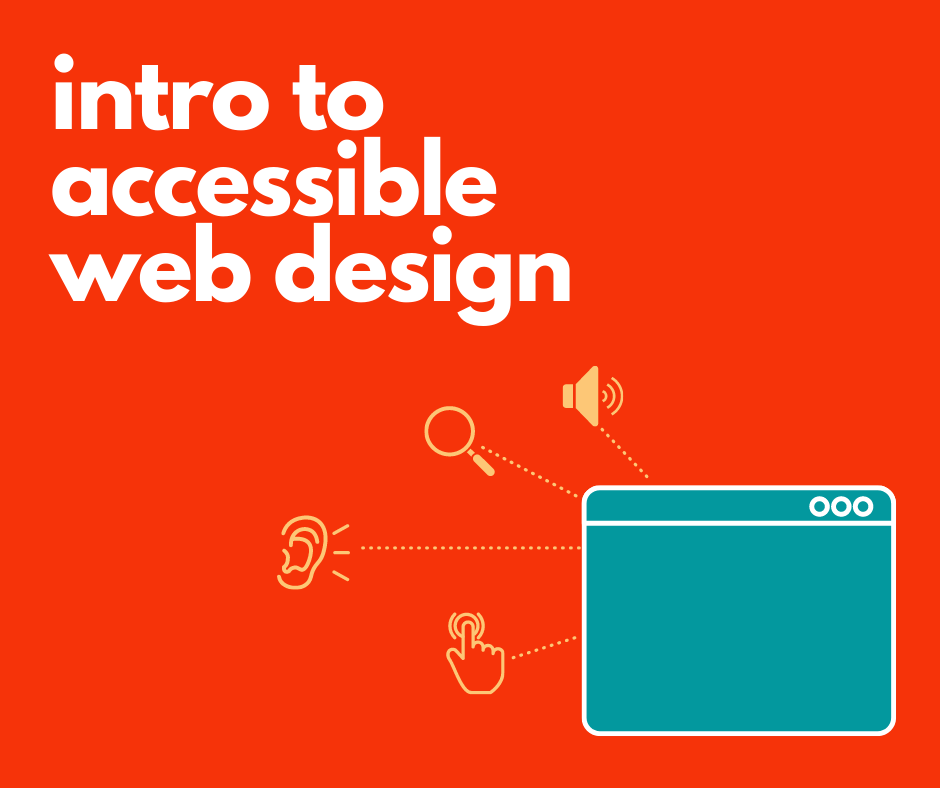
March 25, 2022 | 12:00pm - 2:00pm
Hybrid / 516 Milstein + Zoom
This workshop provides an overview of basic accessibility concepts, such as why digital inclusion matters, as well as a high-level introduction to the Web Content Accessibility Guidelines 2.1 (WCAG). The first half of this workshop is a lecture followed by a live demonstration on how to quickly assess the usability of a website.
Led by Sarah Morrison-Smith, Roman Family Teaching and Research Fellow at Barnard College.
This workshop takes place in person (516 Milstein) and on Zoom.
For more information about the Barnard CSC, go to https://www.csc.barnard.edu or follow us on Instagram and Twitter (@barnard_csc), and Facebook.
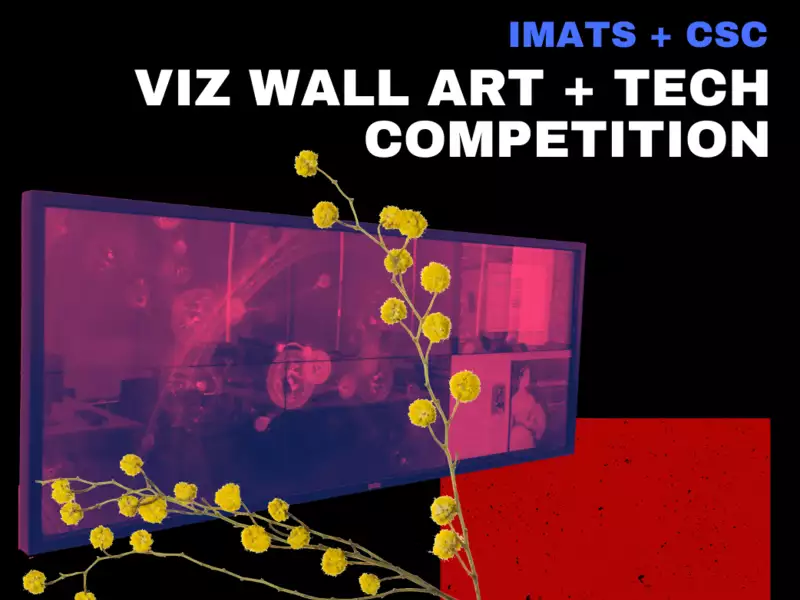
March 25, 2022 | 11:59pm
Barnard IMATS and CSC Launch Art + Tech Competition for $500 Development Grants
Barnard IMATS and the Computational Science Center (CSC) are holding a competition for art + tech proposals that use the Cyber Visualization Wall in Milstein 516. This competition is open to all undergraduate students in all disciplines at Barnard and Columbia – winning submissions will receive a $500 grant to develop their proposals. Show us what you’ve got!
We want to see proposals that embrace the medium and capabilities of the Visualization Wall - remember it’s touch sensitive! Winning submissions should engage directly with the medium (the Visualization Wall) and theme (technology). You can use technology (through design programs, coding, or digital art) to create art or make artistic interventions and/or you can use art as a medium to explore technology, the impact of technology on society, or technological concepts. You can submit digital art, a game design, utilize the interactive/touch aspects of the panels, or find clever ways to subvert our expectations.
Cyber Visualization Wall Details
- 6 interconnected (3x2), touch enabled panels
- Panels can also be used individually, e.g. up to 6 discrete devices can be projected at a time
- Windows 10 operating system
- Speakers/sound enabled
How to enter
Fill out this form by 11:59 pm ET on March 25th.
Grants
The top submissions will receive $500 to develop their projects in preparation for a showcase on April 25, 2022.
Timeline
You must upload your proposal by 11:59 pm ET on March 25th.
Winners will be announced on April 1, 2022. Winning submissions will be awarded $500 to troubleshoot and develop their proposals in preparation for a showcase on April 25, 2022.
March 28, 2022 | 6:00pm - 7:00pm
Zoom
The Barnard CSC is excited about our Diversity in Computing Speakers, members of the Cyber Collective!
Watch it here on our YouTube Channel!
How Personal Narratives Can Fuel the Responsible Tech Movement
Join us to hear the Cyber Collective speak about how they put personal narratives at the center of their research. Cyber Collective, founded in 2020 as the only women of color owned and operated community-centered research organization that focuses on data ethics, privacy, and cyber security research, directly tackles the clear tension between business interests and society’s well-being. In this talk, members share how personal identities and narrative sharing are central to the impact technology has on society and vice versa. They speak about the collective’s Creative Research Sessions, the role of identity and culture in computational research, and its relationship to policy making.
Tazin Khan, Founder of Cyber Collective
Fara Islam, Creative Research and Development Manager
Rebecca Richard, Creative Research and Development Manager
Callie Rojewski, Director of Programs and Marketing
As part of the Year of Science @ Barnard College, the Vagelos Computational Science Center (CSC) is excited to announce our first Diversity in Computing Speaker Series. This series runs for the 2021–2022 academic year and features talks from scholars and practitioners in computational fields who explore what DEI (diversity, equity, and inclusion) looks like in STEM.
There is an urgent need to more fully consider the ethical and social implications of computing and its applications: for example, in designing addictive social media platforms or in using AI for facial or name recognition, which can lead to housing discrimination, racial biases in job hiring, or restrictions on personal freedoms through public and private surveillance.
To better understand how to counter these biases, this series rethinks STEM disciplines from the inside out. We invite one leader in a STEM field every month to speak about the work they are doing to diversify and broaden inclusion in their fields by either sharing their research, their experiences and initiatives in industry or academia, or their thoughts on how power structures within computing disciplines should be transformed to create more equitable systems.
This talk takes place on Zoom only.
For more information about the Barnard CSC, go to https://www.csc.barnard.edu or follow us on Instagram and Twitter (@barnard_csc), and Facebook.
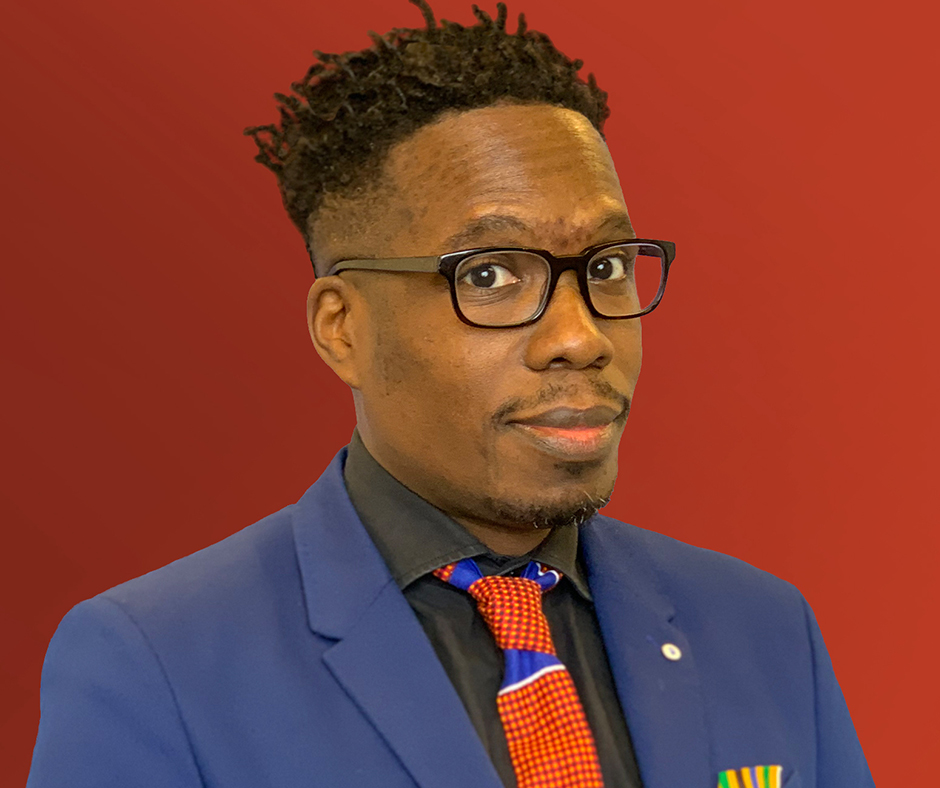
April 5, 2022 | 6:00pm - 7:00pm
Zoom
The Barnard CSC is excited about our Diversity in Computing Speaker, Matt Mitchell, Founder of CryptoHarlem and Technology Fellow at the Ford Foundation.
Watch it here on our YouTube Channel!
SOLVED: Easy Fixes for Algorithmic Bias
One of the most impactful and concrete solutions to algorithmic bias is having a diverse team of researchers, analysts, critics, to conduct the work. This is something that is quickly glanced over but in this conversation we will focus on this inconvenient truth.
Matt Mitchell is a hacker, founder CryptoHarlem, and tech fellow to the BUILD program at the Ford Foundation. In his work there, Matt develops cybersecurity strategy for the foundation's grantee partners. In 2021, Matt graced the cover of Newsweek magazine and was named one of America's Greatest Disruptors. That year he was awarded a Pioneer Award by the Electronic Frontier Foundation, in 2020 named a WIRED25 by Wired magazine, and in 2017 named a Human of The Year by Vice Motherboard.
Mitchell is also a well known security researcher, operational security trainer, and data journalist. His organization CryptoHarlem (https://cryptoharlem.com), hosts impromptu workshops teaching basic cryptography tools to the predominately African American community in upper Manhattan. Matt worked as an independent digital security/counter surveillance trainer for media and humanitarian focused private security firms. His personal work focuses on marginalized, aggressively monitored, over-policed populations in the United States. Matt sits on the Network Investment Council of Reset Tech (https://www.reset.tech/people/#network-investment-council), and the board of Action Squared Inc. (https://actionnetwork.org/about).
Photo credit: Event cover by Naomi Wax / Ford Foundation
As part of the Year of Science @ Barnard College, the Vagelos Computational Science Center (CSC) is excited to announce our first Diversity in Computing Speaker Series. This series runs for the 2021–2022 academic year and features talks from scholars and practitioners in computational fields who explore what DEI (diversity, equity, and inclusion) looks like in STEM.
There is an urgent need to more fully consider the ethical and social implications of computing and its applications: for example, in designing addictive social media platforms or in using AI for facial or name recognition, which can lead to housing discrimination, racial biases in job hiring, or restrictions on personal freedoms through public and private surveillance.
To better understand how to counter these biases, this series rethinks STEM disciplines from the inside out. We invite one leader in a STEM field every month to speak about the work they are doing to diversify and broaden inclusion in their fields by either sharing their research, their experiences and initiatives in industry or academia, or their thoughts on how power structures within computing disciplines should be transformed to create more equitable systems.
This talk takes place on Zoom only.
For more information about the Barnard CSC, go to https://www.csc.barnard.edu or follow us on Instagram and Twitter (@barnard_csc), and Facebook.
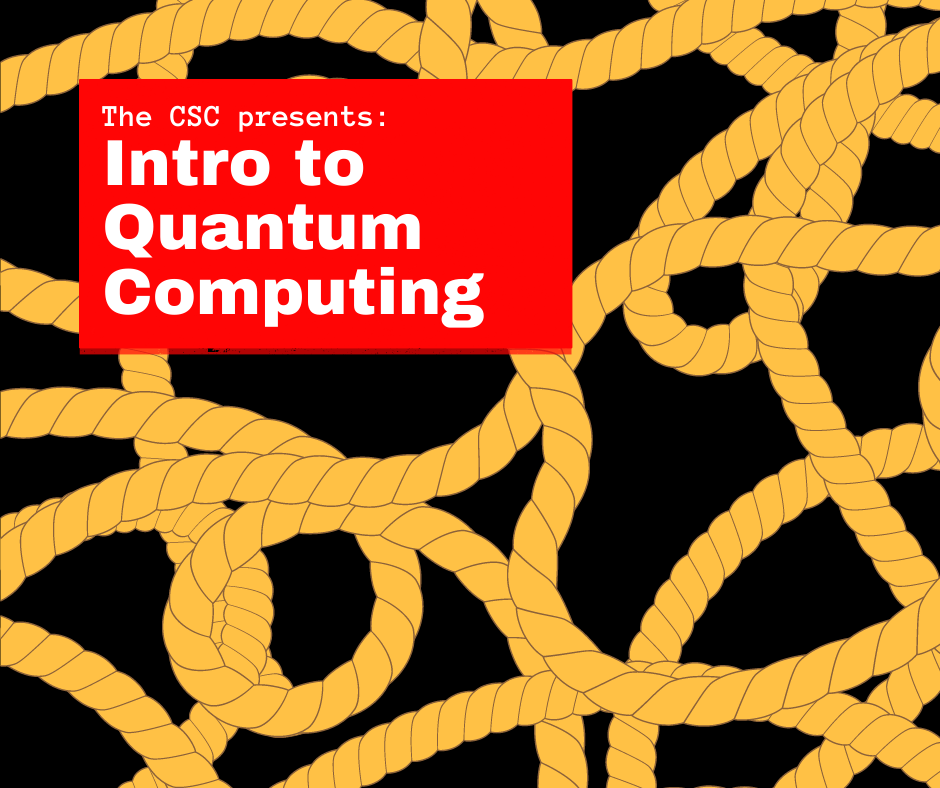
April 8, 2022 | 12:00pm - 2:00pm
Hybrid / 516 Milstein + Zoom
Flashy headlines about quantum computing are all over the news. But if you've ever heard of quantum computing and wondered "What does that mean?" this workshop has you covered. The workshop is in two parts: a lecture-style presentation and a live coding workshop. During the first part, we talk about how quantum computers work and what they're good for, and we also dispel some myths about quantum computing. In the second half of the workshop, we use IBM's quantum computer simulator to practice encoding algorithms as quantum circuits that make use of special features of quantum logic.
Led by Zoë Webb-Mack, Post-baccalaureate Fellow at the Vagelos Computational Science Center.
This workshop takes place in person (516 Milstein) and on Zoom.
For more information about the Barnard CSC, go to https://www.csc.barnard.edu or follow us on Instagram and Twitter (@barnard_csc), and Facebook.
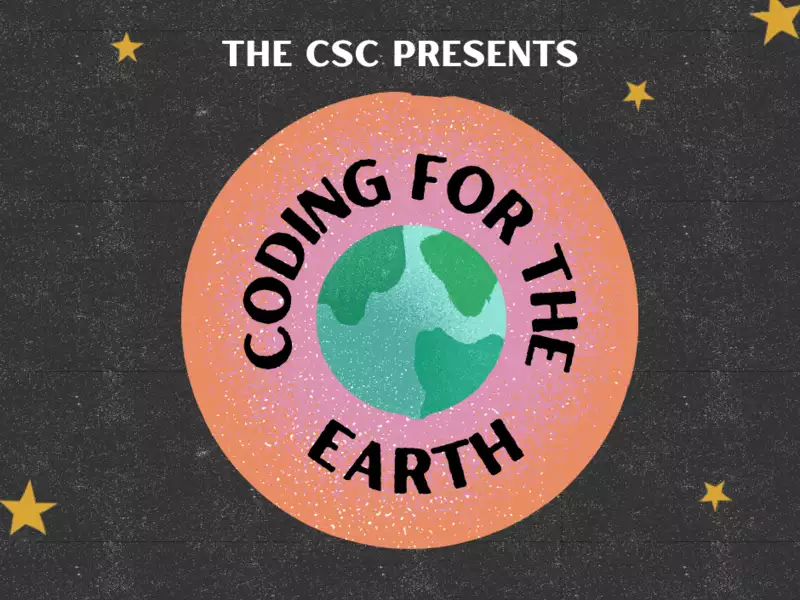
April 22, 2022 | 12:00pm - 2:00pm
Hybrid / 516 Milstein + Zoom
This is an Earth Day-themed introductory workshop on working with environmental datasets using Python.
Led by CSC staff and Computing Fellows.
This workshop takes place in person (516 Milstein) and on Zoom.
For more information about the Barnard CSC, go to https://www.csc.barnard.edu or follow us on Instagram and Twitter (@barnard_csc), and Facebook.
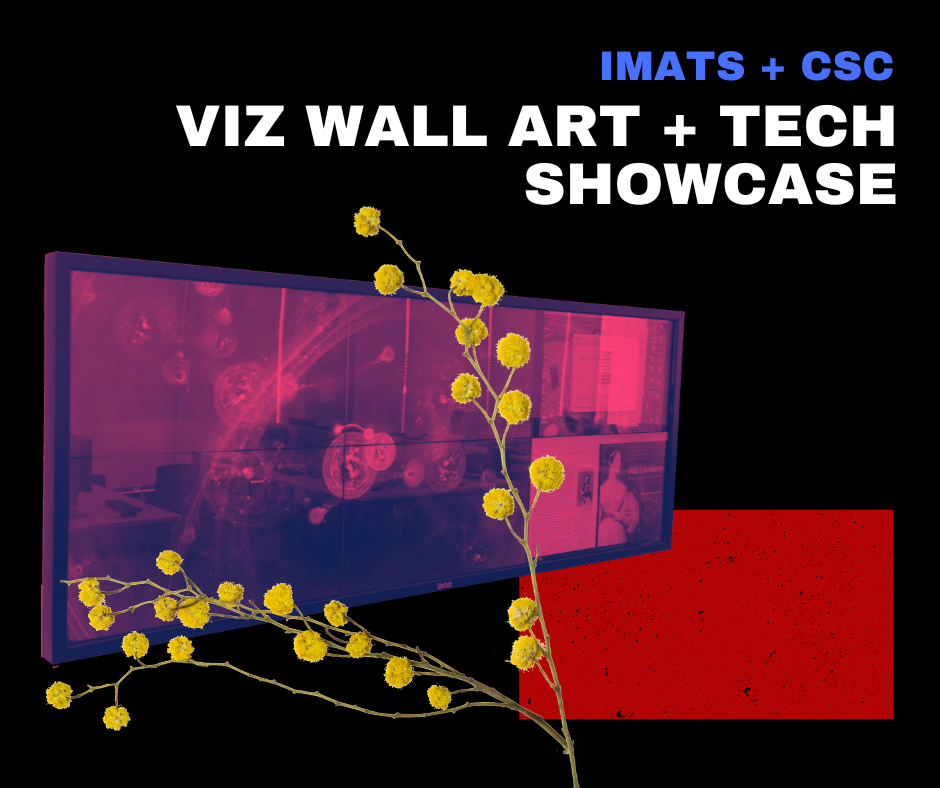
April 25, 2022 | 12:00pm - 1:00pm
Hybrid / 516 Milstein + Zoom
Barnard IMATS and CSC Art + Tech Viz Wall Showcase
We're very pleased to announce four winners for the Art + Tech competition:
- Cate Mok, BC '25, Computer Science & Architecture
- Lindsey Weiskopf, BC '22, Computer Science.
- Hannah Zeng, BC '23, Cognitive Science
- Zekai Zhang, Columbia '24, Computer Science & Architecture
Congratulations! Join us in person as the Art + Tech finalists present their winning proposals, which include an interactive heat map of NYC, an artist's notebook for storytelling, an interactive wall for collective memories, and an artistic commentary on the relationship between human emotions and technology. Ask questions, interact with the wall, and eat some snacks (COVID-permitting)!
This event takes place in person (516 Milstein) and on Zoom.
For more information about the Barnard CSC, go to https://www.csc.barnard.edu or follow us on Instagram and Twitter (@barnard_csc), and Facebook.
May 2, 2022 | 2:00pm - 4:00pm
Hybrid / 516 Milstein + Zoom
Tasha Pais, freelance blockchain developer, offers a first-principles take on blockchain. Join for a discussion about all the things wrong (and right) about web3 and an introductory workshop on building on-chain applications. This workshop is for anyone who already knows what the blockchain is but wants a first-principles take on why it's important. Come for a discussion and hands-on workshop where you can learn the basics of how staking mechanisms work for generating passive income and an introduction to building on-chain applications. Crypto-natives and crypto-curious are both welcome!**
**Any information shared in this workshop should not be considered financial advice.
Led by Tasha Pais, freelance blockchain developer.
This workshop takes place in person (516 Milstein) and on Zoom.
For more information about the Barnard CSC, go to https://www.csc.barnard.edu or follow us on Instagram and Twitter (@barnard_csc), and Facebook.
May 4, 2022 | 1:00pm - 2:00pm
Milstein 516 + 5th Floor Lounge
Leave your textbooks behind and join the CSC for a study break and snacks! From 1-2pm, we have snacks in the CSC lounge (on the fifth floor of Milstein). Swing by to grab a snack, play a relaxing game on the Viz Wall, and say hi to your peers!
This event takes place in person only.
For more information about the Barnard CSC, go to https://www.csc.barnard.edu or follow us on Instagram and Twitter (@barnard_csc), and Facebook.
2020-2021 Academic Year
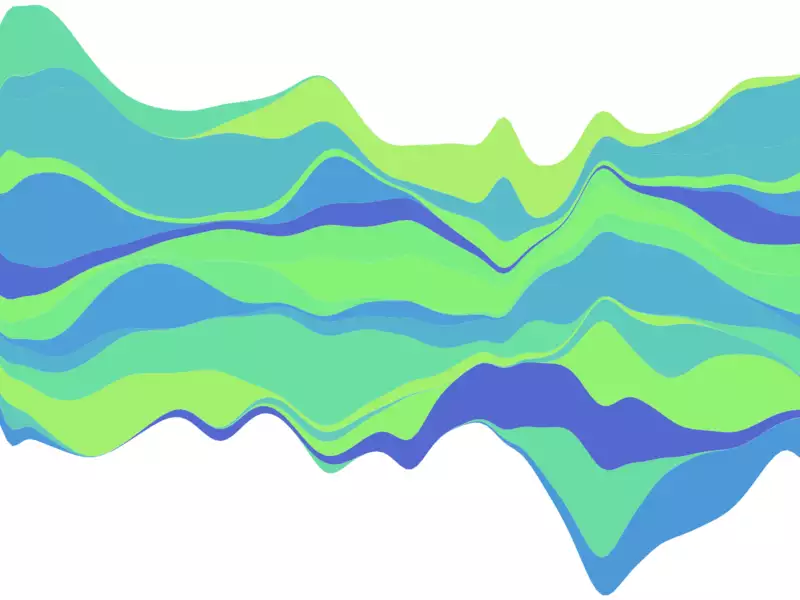
October 2, 2020 | 2:00pm - 4:00pm
Zoom
An introductory workshop on data visualization using Python. Open to all levels and no prior coding experience necessary. This workshop gives you the tools you need to create complex and beautiful data visualizations with the Altair library. We cover Python basics before diving into DataFrames, HTTP requests, JSON, and data visualizations. We use data from NYC Open data, along with COVID data from an external API.
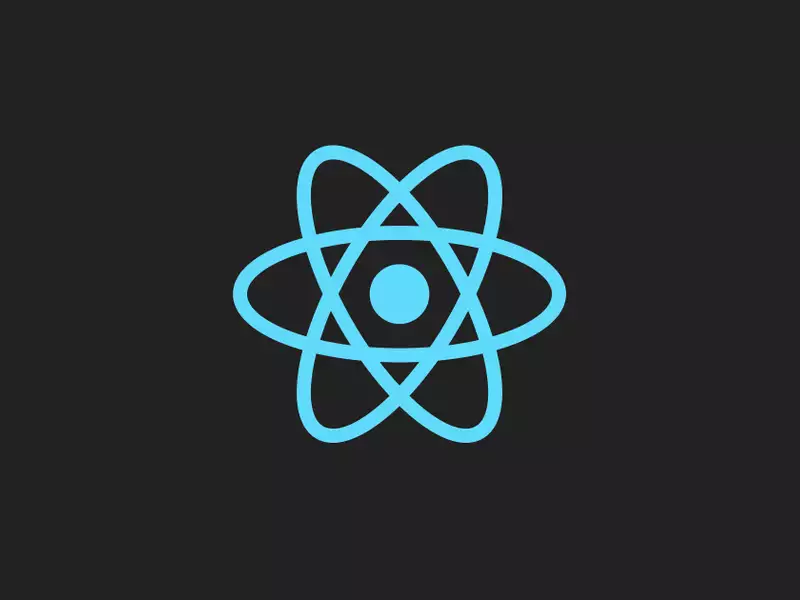
October 16, 2020 | 2:00pm - 4:00pm
Zoom
An intermediate level workshop in ReactJS that covers state management, hook patterns, and integrating with external libraries. If you are new to ReactJS or JavaScript and are interested in participating, please work through this intro workshop first.
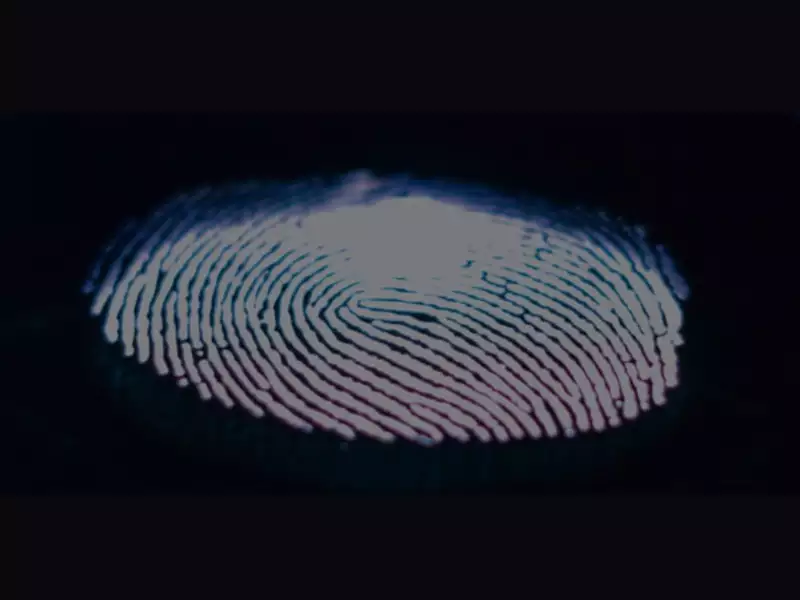
October 22, 2020 | 6:00pm - 8:00pm
Zoom
To celebrate Cybersecurity Awareness Month, the Vagelos Computational Science Center, in collaboration with the Cybersecurity Center at the Data Science Institute and Beyond Barnard, is hosting a Cybersecurity Career Panel.
We cover many topics, including pathways to cybersecurity careers, followed by a Q&A session. The panel is moderated by award-winning IT Security Reporter and Data Journalist, Fahmida Y Rashid, Barnard ’99 and CJS ’05. Our panelists are Edna Conway Barnard ’79, VP of Global Security, Risk & Compliance, Azure at Microsoft, Melanie Gersten, Director of Product Development and Cyber and Intelligence Solutions at Mastercard, and Jae Young Kim, Reverse Engineer on FireEye's FLARE team.
October 23, 2020 - October 25, 2020
Computer Science at Barnard College and the Vagelos Computational Science Center are proud sponsors of the Fall 2020 Diversity Hackathon (DivHacks) on October 23-25, 2020. DivHacks is Columbia University’s only student-led diversity hackathon, centered around celebrating underrepresented students in tech and entrepreneurship.
This year, for the first time ever, we are happy to offer 36 hours of hacking, workshops, speakers, prizes, and swag shipped right to your doorstep! We have workshops and prizes for hackers of all levels and especially want to extend an invitation to beginner hackers. Join us *virtually* in reshaping the tech industry!
Learn more at www.columbiadivhacks.com

October 30, 2020 | 2:00pm - 4:00pm
Zoom
To celebrate Cybersecurity Awareness Month, the CSC is collaborating with Christine Whalley, Director of Information Security at BCIT, and Columbia Data Science Institute’s Cybersecurity Center for a Halloween workshop!
We teach you how to protect yourself from spooky, unauthorized access of your personal information and present methods for improving your cyber-safety around your activism efforts, including protests. You learn how your data can be connected to re-identify you, and how that data can also be used to identify the people around you. We walk you through implementing a variety of tools and settings for your devices and applications to protect your community, your friends, and your own privacy.

November 20, 2020 | 2:00pm - 4:00pm
Zoom
An introductory workshop on data analysis for the social sciences using Pandas, Python's data analysis library. Ideal for those with no Python experience.
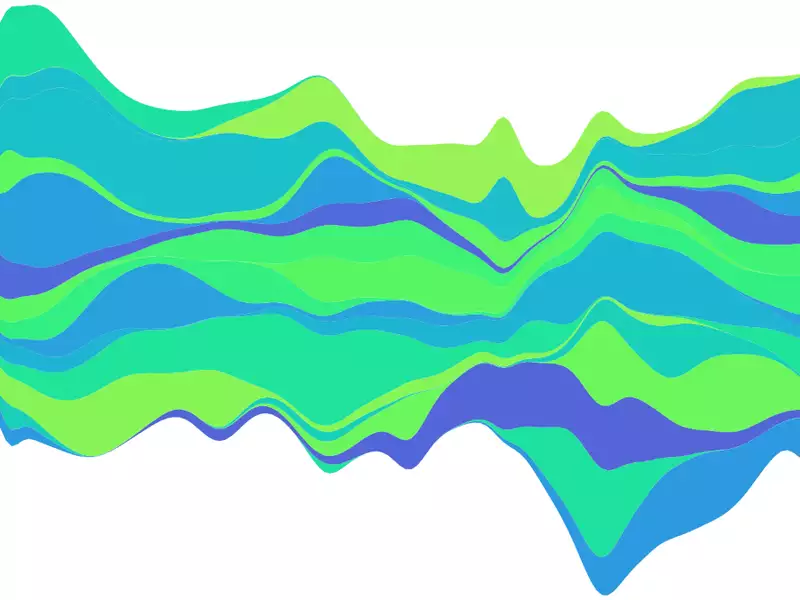
December 4, 2020 | 2:00pm - 4:00pm
Zoom
This workshop gives you the tools you need to create complex and beautiful data visualizations with the Altair library. We cover Python basics before diving into DataFrames, HTTP requests, JSON, and data visualizations. We use data from NYC Open data, along with COVID data from an external API. This the perfect workshop for those with no Python experience.

January 29, 2021 | 2:00pm - 4:00pm
Zoom
Chat with peers and friends while sharpening your coding skills with fun, online coding games. This event is open to everyone, and there are coding games for all coding levels and in various languages.
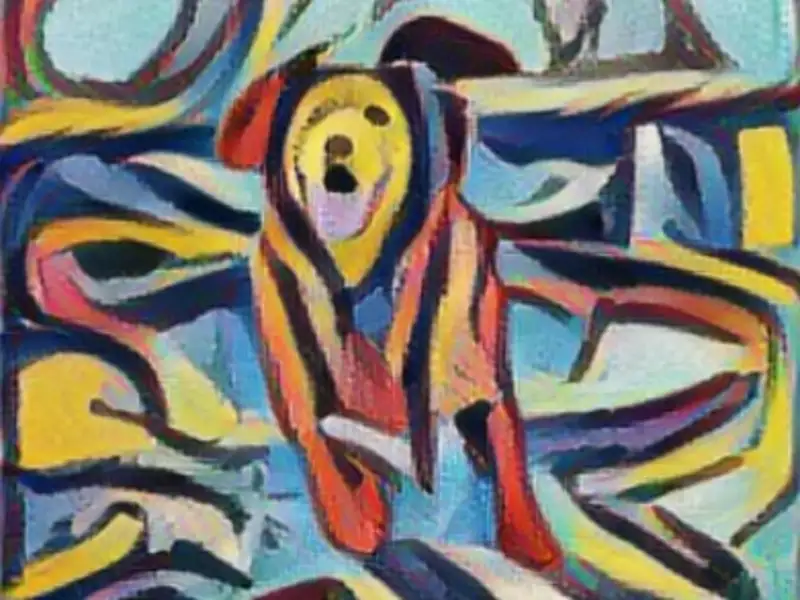
February 5, 2021 | 2:00pm - 4:00pm
Zoom
This workshop requires zero coding abilities. With only one line of code, you learn how to leverage an open source neural network to transfer the style of one image to another image. Think making a photo of your dog or favorite flower look like a Picasso! You can use this workshop to make Valentine’s Day cards, a birthday card, or an awesome collage for your desktop background. Participants leave this workshop with a basic understanding of neural networks, style transfer, how to use Google Colab Notebook, and with a work of art!

February 12, 2021 | 2:00pm - 4:00pm
Zoom
Learn HTML and CSS, languages used for designing on the web, to create cards or memes for friends and family. Participants leave this workshop having sent out a card or meme via email, and with the ability to apply their skills toward making more cards or toward designing web pages.
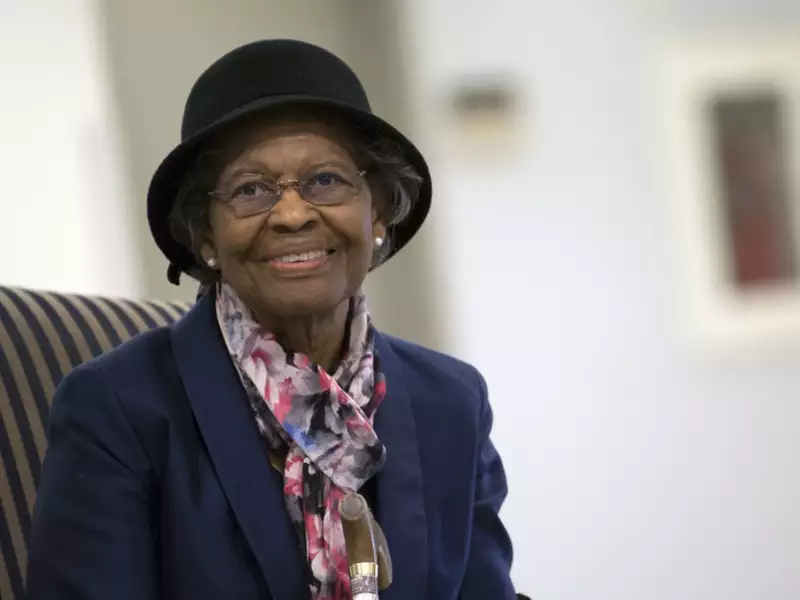
February 26, 2021 | 2:00pm - 4:00pm
Zoom
We would be lost (literally) without the contributions of Gladys West. West is a mathematician who helped construct a geoid, a mathematical model of the Earth’s shape, making the invention of the GPS possible. She worked at the Naval Surface Warfare Center Dahlgren Division as a mathematician and programmer, where she and her husband were two of only four black employees at the time. West was inducted into the United States Air Force Hall of Fame in 2018.
The celebration includes watching a short video and learning about West, as well as exploring her contributions more closely by working directly with satellite data.
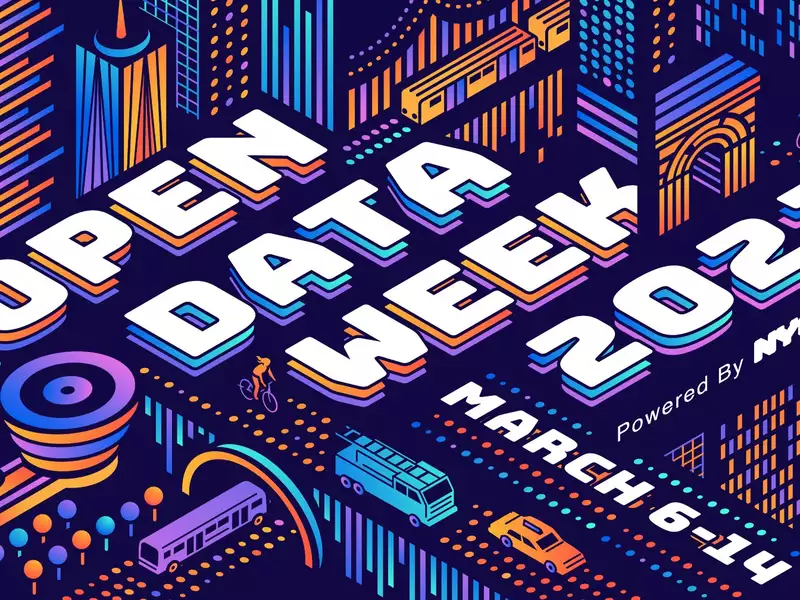
March 9, 2021 | 4:00pm - 6:00pm
Zoom
The workshop gives attendees the tools they need to create complex and beautiful data visualizations with NYC Open Data using the Altair library, while also serving as an introduction to coding in Python. We cover Python basics before diving into DataFrames, HTTP requests, JSON and other data storage styles, and data visualizations.
We welcome anyone who wants to create simple to make, yet beautiful and professional-looking data visualizations, no prior coding experience needed. The workshop is ideal for the novice programmer or as a first programming experience.

March 12, 2021 | 4:00pm - 6:00pm
Zoom
This workshop is an introduction to geospatial data analysis and visualization in Python. We work on Python coding skills, present GIS tools, and explore visualizing NYC Open Data. The workshop is more suitable for a programmer with a bit of familiarity with Python or another coding language, though anyone is welcome to attend!
March 19, 2021 | 2:00pm - 4:00pm
Zoom
The Barnard College Vagelos Computational Science Center is offering an introductory workshop on data visualization using Python. We use Altair, a growing data visualization library similar to JavaScript's popular Vega package. This workshop is open to all levels and is particularly suitable for those with little to no coding or Python experience. We use Google Collaboratory Notebooks for the workshop, so there is no need to download Python. The workshop focuses on working with neuroscience and climate science data to create various kinds of visualizations including line graphs, histograms, and maps. The skills garnered in this workshop are applicable beyond neuroscience and climate science, to any field where graphing data is useful.
April 2, 2021 | 12:00pm - 1:00pm
Zoom
Speaker: Saima Akhtar, Independent Researcher
Title: What is Computing Good For? Building a More Inclusive World through Empowerment and Play
Event Video link: https://youtu.be/YwxwowGl6m0
What counts as computing? Where does computational work happen? Through a series of professional and personal projects, this talk explores how computing can bridge disciplines, advance science, and generate new spaces for inclusivity and imaginative thinking. Through her experience in architecture and software engineering, Saima also speaks about what feminist computational science looks like, including thinking critically about the harm and 'good' that computing brings to building equitable social and virtual worlds.
Saima Akhtar is an interdisciplinary researcher with a background in architecture and software engineering. As a trained social scientist and programmer, the questions that drive her are at the intersection of technology and design -- whether she’s building user-friendly applications or writing about the ethical implications of integrating technology into our everyday lives. Dr. Akhtar graduated with degrees in architecture from University of California, Berkeley (Ph.D.) and MIT (SMArchS), and majored in psychology and architecture at the University of Michigan - Ann Arbor. She was a postdoctoral associate at Yale University in the Department of Computer Science, where she managed cultural heritage preservation projects between the fields of computer science and architecture. She also completed a certificate in Full Stack engineering from the Flatiron School.
April 2, 2021 | 2:00pm - 4:00pm
Zoom
Having trouble focusing while studying, or just want to spice things up? Join the CSC and the Barnumbia community to co-work on Pairstudy.com. Whether you are writing a final paper, studying for an exam, or applying for opportunities, at PairStudy, you are paired with a partner to hold each other accountable to get the work done. While being motivated to do your work, you meet someone new or see a classmate or friend. Plus, you get to check out some of your peers' awesome projects since PairStudy.com is made by a few of our very own Columbia undergraduate students.
June 1, 2021 | 7:00pm - 8:00pm
Zoom
The CSC is hosting an event where students have the chance to learn about tech journalism from an award-winning tech journalist and Barnard alumna, Fahmida Rashid.
Registration Link:
https://docs.google.com/forms/d/e/1FAIpQLSfRukrBWmafumbqIjg6XBH6UGlHH7fbpc6MSTKRAK0BmOm3Ng/viewform
As the senior managing editor at Decipher, her goal is to discuss cybersecurity topics without fear-mongering and in a way that empowers readers. She takes an interdisciplinary approach and draws on ideas from various fields, including psychology, economics, and political science, to give context to security stories. She also experiments with different storytelling formats, such as using data to explain security concepts. Before becoming a journalist, she spent fifteen years in IT, working as a network administrator, software developer, management consultant, and product manager. Her experiences at PricewaterhouseCoopers and IBM help her frame her writing in a way her readers understand. Prior to launching Decipher, she wrote for various business and tech trade publications, including InfoWorld, PC Magazine, the Daily Beast, and the Christian Science Monitor. She graduated from Barnard College in 1999 with a major in Psychology and minor in Political Science. She received her Master of Science from the Graduate School of Journalism at Columbia University in 2005 and completed her course in computational journalism in 2019.
2019-2020 Academic Year

September 27, 2019 | 10:00am - 12:00pm
Milstein 516, CSC Classroom
The Barnard College Computational Science Center is offering a workshop in D3, a javascript library for creating dynamic data visualizations. This workshop starts with HTML, moving onto basic vector graphics and JavaScript, and ending with the basics of D3. This workshop is the foundation for future workshops to create more advanced visualizations in D3.
You do not need to be an expert in HTML, CSS, JavaScript, or D3 - this workshop is for beginners! If you have experience with HTML and CSS, but not D3 specifically, this is still helpful to those wanting to learn and use D3.
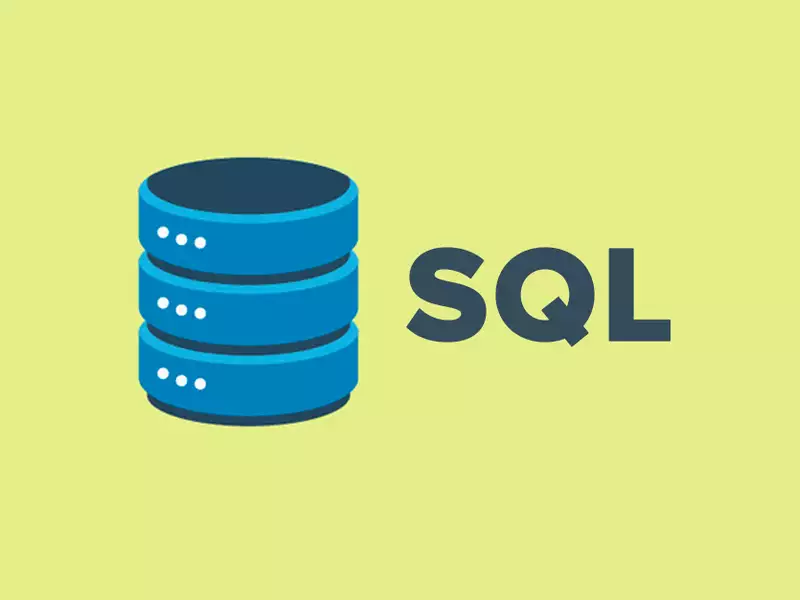
October 4, 2019 | 10:00am - 12:00pm
Milstein 516, CSC Classroom
Barnard College's Vagelos Computational Science Center is offering a workshop in data engineering. We discuss database structure, work through the ETL process (extract, transform, load), query data in SQL, and look at ways to interface with our database in Python.
No experience is necessary, but some programming experience would be helpful.
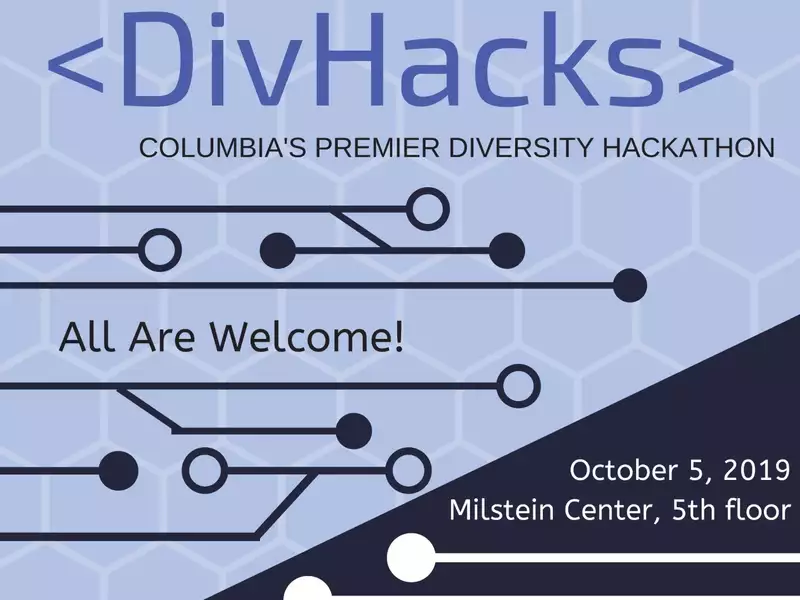
October 5, 2019 | 8:00am - 9:00pm
The Milstein Center
Computer Science at Barnard and the Vagelos Computational Science Center, in collaboration with Columbia University Women in Computer Science, are hosting DivHacks on October 5th from 8am to 9pm at Barnard College in the Milstein Center. DivHacks is Columbia's premier diversity hackathon with an objective to create an empowering and inspirational space for underrepresented students in entrepreneurship and technology. For too long, the technology sector has prioritized the voices of the privileged at the expense of diverse peoples and points of view.
DivHacks introduces a space for disenfranchised communities to create technologies that reflect our diverse backgrounds and narratives. This year, the theme is education for all! DivHacks is open to everyone regardless of gender or experience.
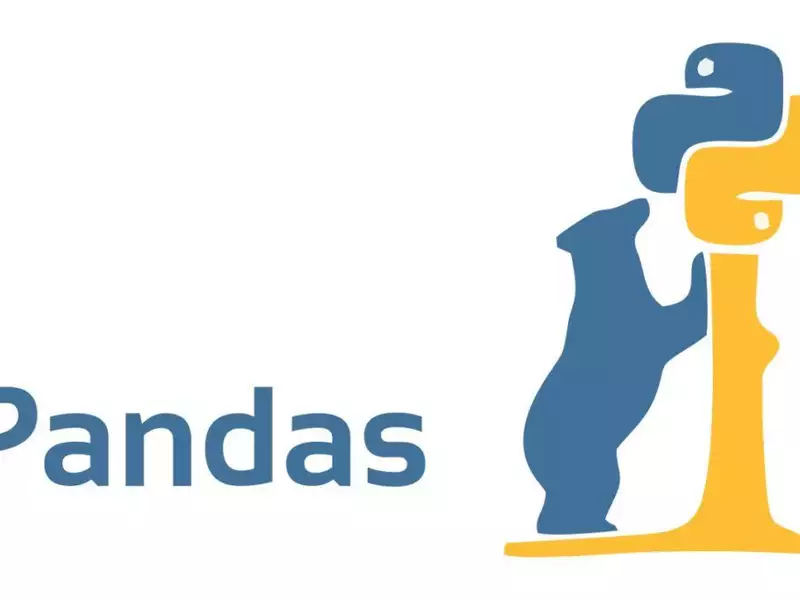
October 11, 2019 | 10:00am - 12:00pm
Milstein 516, CSC Classroom
Barnard College's Vagelos Computational Science Center is offering a series of two workshops in Pandas, Python's data analysis library. The first workshop covers data cleaning and preparation using Pandas. It is not required to attend both workshops, though that would be best.
No experience is necessary, but some experience with data analysis would be helpful.

October 18, 2019 | 10:00am - 12:00pm
Milstein 516, CSC Classroom
Barnard College's Vagelos Computational Science Center is offering a series of two workshops in Pandas, Python's data analysis library. The second workshop covers data analysis using Pandas. It is not required to attend both workshops, though that would be best.
No experience is necessary, but some experience with data analysis would be helpful.
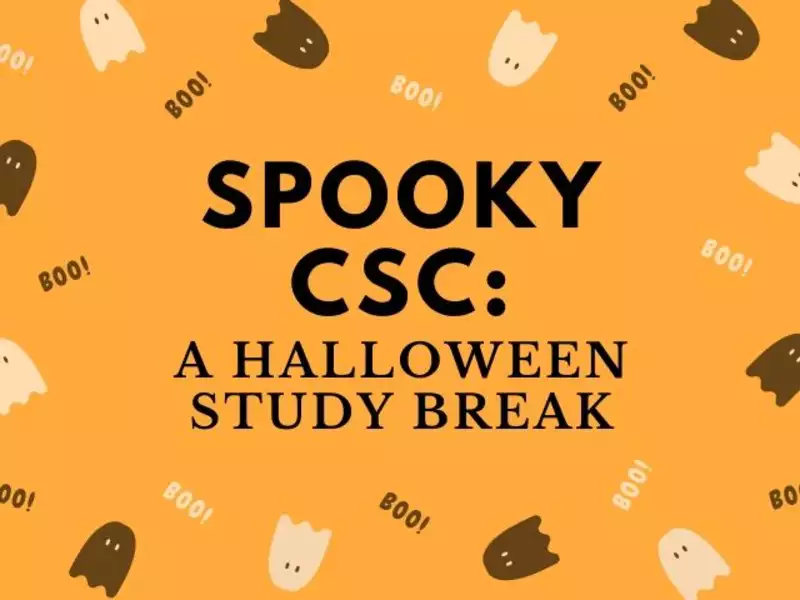
October 31, 2019 | 12:30pm - 2:00pm
CSC Lounge, Milstein 5th Floor
Bust the ghosts of midterms past, stop by the CSC and have a blast! We have activities, music, and spooky treats. Come for the themed food, stay for the computation-lite mood. Feel free to stop by any time between 12:30pm and 2 pm.

November 8, 2019 | 10:00am - 12:00pm
Milstein 516, CSC Classroom
Barnard College's Vagelos Computational Science Center is offering an introductory workshop in ReactJS, a JavaScript framework for building user interfaces. To learn more about React, see reactjs.org. We cover ReactJS, HTML/CSS basics, and best practices when creating modern web apps. No prior experience necessary.

November 22, 2019 | 12:30pm - 2:00pm
Milstein 516, CSC Classroom
Barnard College's Vagelos Computational Science Center is offering a workshop on Machine Learning with Python, an open source high-level programming language. The workshop requires no experience with python, but some experience with programming and statistics is helpful.
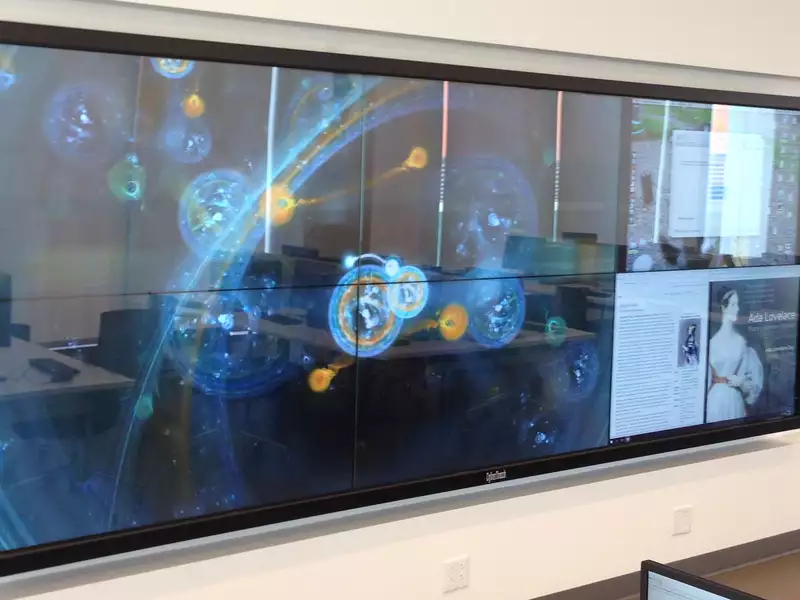
December 12, 2019 | 1:00pm - 3:00pm
Milstein, Floors 4 & 5
Take a break from studying and destress by joining us for the third day of our event 'On Every Level: Winter Edition.'
On floor 4: Shange cookbook zine - more info here: https://shangeworlds.barnard.edu/shange-magic/upcoming-shangemagic-events/
On floor 5: Wipe away your stress with an interactive display on the visualization wall in the Computational Science Center

January 28, 2020 | 6:30pm - 7:30pm
Diana 203
Student activists and their allies at Barnard and Columbia are invited to an interactive cybersecurity training to learn how to protect themselves from and respond to cyberharassment. The training addresses the technical, legal, and emotional aspects of cyberharassment. Laptops encouraged.
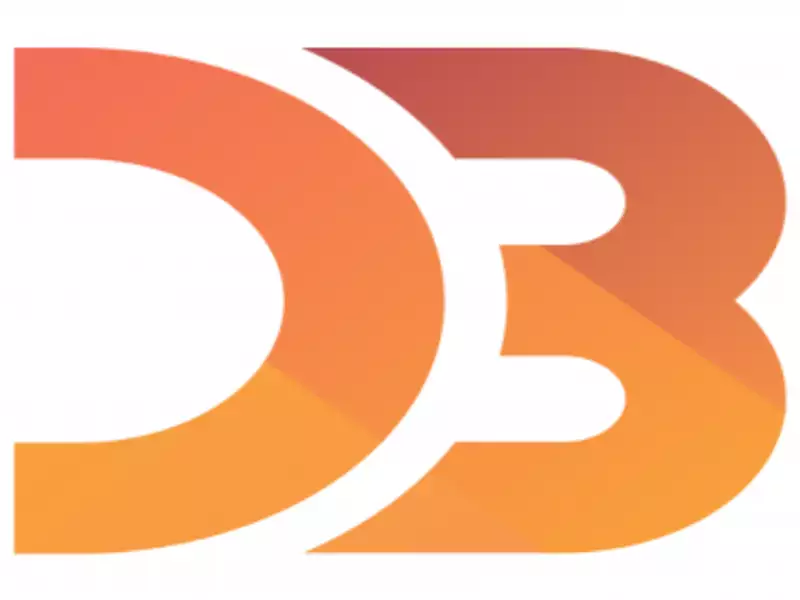
February 7, 2020 | 10:00am - 12:00pm
Milstein 516, CSC Classroom
The Barnard College Computational Science Center is offering an intermediate workshop in D3, a javascript library for creating dynamic data visualizations.This workshop builds on past introductory D3 workshops to create more advanced visualizations in D3.
Previous completion of our Intro to D3 workshop or experience with HTML is helpful for this workshop.

February 14, 2020 | 10:00am - 12:00pm
Milstein 516, CSC Lounge
Show your ❤️ and stop by the CSC to make valentines cards for your favorite people! Enjoy themed snacks while you’re here. No coding involved, all are welcome!
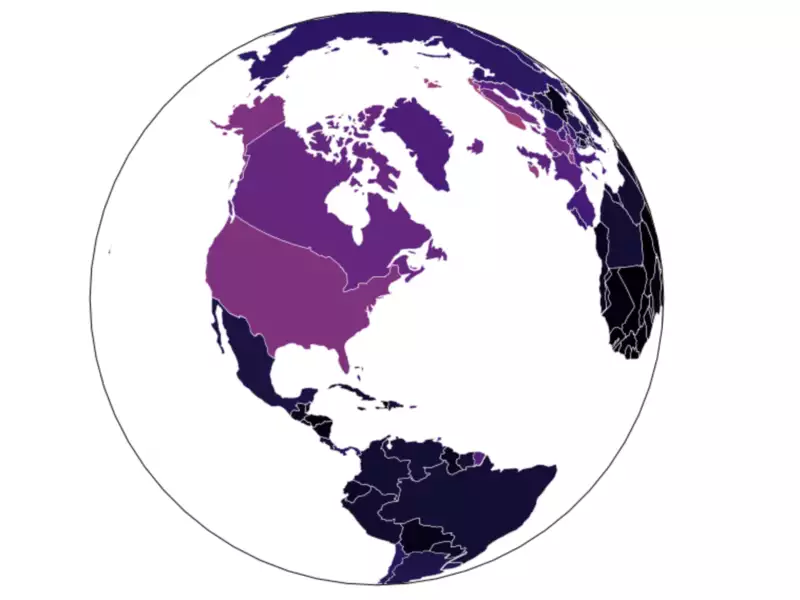
February 21, 2020 | 10:00am - 12:00pm
Milstein 516, CSC Classroom
The Barnard College Computational Science Center is offering an introductory workshop on open-source spatial data manipulation and visualization in Python. Some experience with GIS or python are helpful for this workshop, but all levels are welcome.

March 6, 2020 | 10:00am - 12:00pm
CSC Classroom, Milstein 516
The Barnard College Computational Science Center is offering an introductory workshop on creating and manipulating databases using SQL and python. All levels welcome.

April 3, 2020 | 2:00pm - 4:00pm
Zoom
An introductory workshop on data analysis for the social sciences using Pandas, Python's data analysis library. Ideal for those with no Python experience.
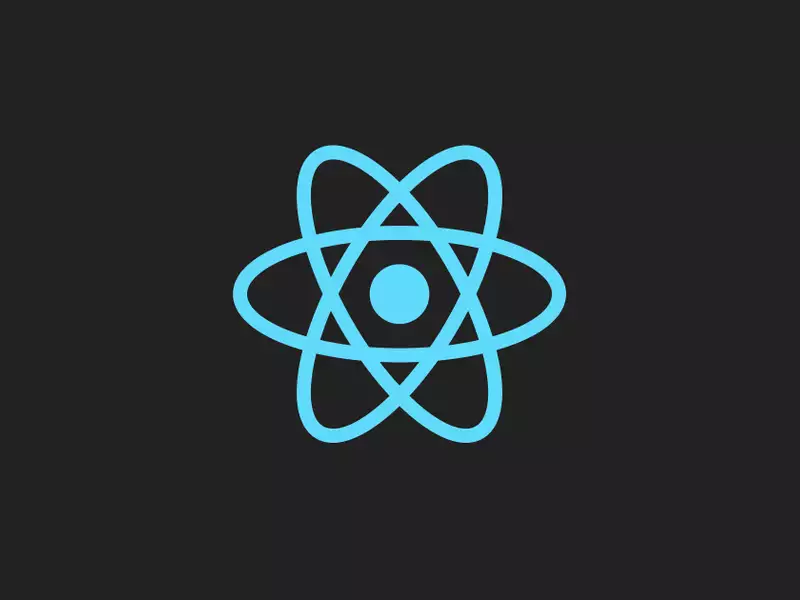
April 24, 2020 | 10:00am - 12:00pm
Zoom
Introductory workshop on building an interactive web application using React.js. Ideal for anyone interested in web development. There is a troubleshooting session an hour before the workshop (9 am) to help you install Jupyter notebooks on your machine.
2018-2019 Academic Year

October 3, 2018 | 2:30pm - 5:30pm
Milstein Center for Teaching and Learning
On October 3, the Milstein Center for Teaching and Learning is having its Grand Opening.
You may be wondering, how is it a Grand Opening if I've already been in the Milstein Center, drank the coffee, and locked myself in the stairwell several times?
Well, the Grand Opening of the Milstein Center provides an opportunity for current and future BLAIS visitors to explore and interact with our dynamic spaces and collections, and to meet the staff who activate them! Visitors are greeted by our long-anticipated library-curated exhibition, Open Doors, featuring Barnard alums who were groundbreakers in their fields and communities.
While the BLAIS Departments may be familiar, now is your chance to get even cozier with them and learn how they've evolved with the new year.
BLAIS has stations for Operations, Collections, Personal Librarians, Archives, Zines, and AV & IMATS. There is a lot of library swag, including tea, postcards, and the debut of the 2018-2019 Library Calendar.
Don't miss it!
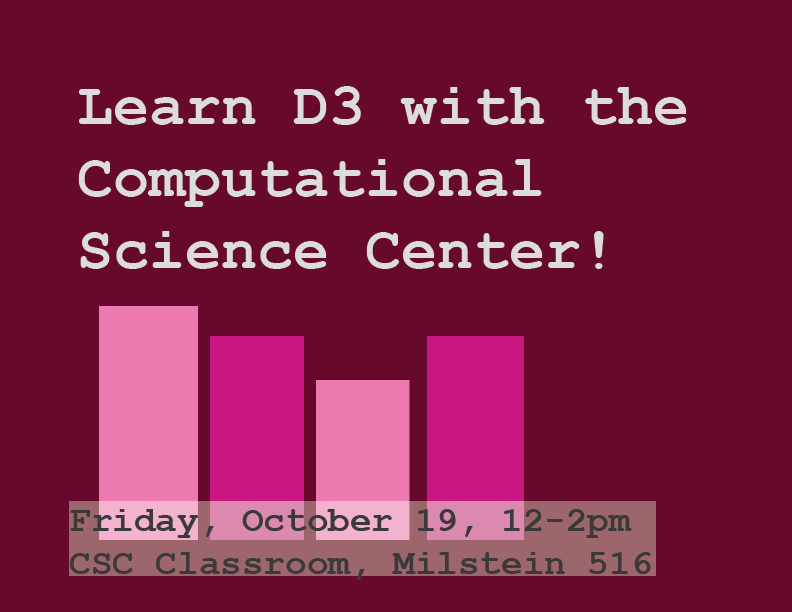
October 19, 2018 | 12:00pm - 2:00pm
Computational Science Center Classroom, Milstein 516
The Vagelos Computational Science Center is offering a series of workshops in D3, a javascript library for creating dynamic data visualizations. This first workshop starts first with HTML, moving onto basic vector graphics and JavaScript, and ending with the basics of D3. This workshop is the foundation for future workshops to create more advanced visualizations in D3.
You do not need to be an expert in HTML, CSS, JavaScript, or D3 - this workshop is for beginners! If you have experience with HTML and CSS, but not D3 specifically, this is still helpful to those wanting to learn and use D3.

November 9, 2018; November 30, 2018 | 11:00am - 1:00pm; 12:00pm - 2:00pm
Computational Science Center Classroom, Milstein 516
The Vagelos Computational Science Center is offering a series of workshops in Python, an open source high-level programming language. Both Machine Learning and Data Cleaning workshops require no experience with python, but some experience with programming and statistics is helpful.

November 14, 2018 | 5:30pm - 7:30pm
Milstein 102
Join us in celebrating GIS Day: a night of maps, cookies, and prizes! The ERC is hosting a treasure hunt along with the CSC, DHC, Media Center, and Design Center. The program includes decorating NYC shaped cookies, button-making, and a talk on interactive map visualizations. There are free snacks, mocktails, and hot chocolate.
We are also holding a map competition! Maps should be emailed to us at erc@barnard.edu by 12pm on GIS Day, November 14. The winner is announced during the GIS Day Event and is able to get their map or any map of their choice laser cut/carved into wood!
Map Guidelines:
- Maps should be static, interactive maps are not accepted.
- Maps can be hand drawn or made using software.
- Maps should be 8.5 x 11. They can be oriented in any direction.
- Maps are judged based on aesthetics and their communicative ability (how informative they are). This does not mean your map has to visualize a variable. Even maps that show landforms or contextualize an area are communicative.
- The most important thing is that it should be a map that you're proud of!!
Follow us on Instagram, @barnarderc, to stay updated. Facebook Event: https://www.facebook.com/events/352328435329183/
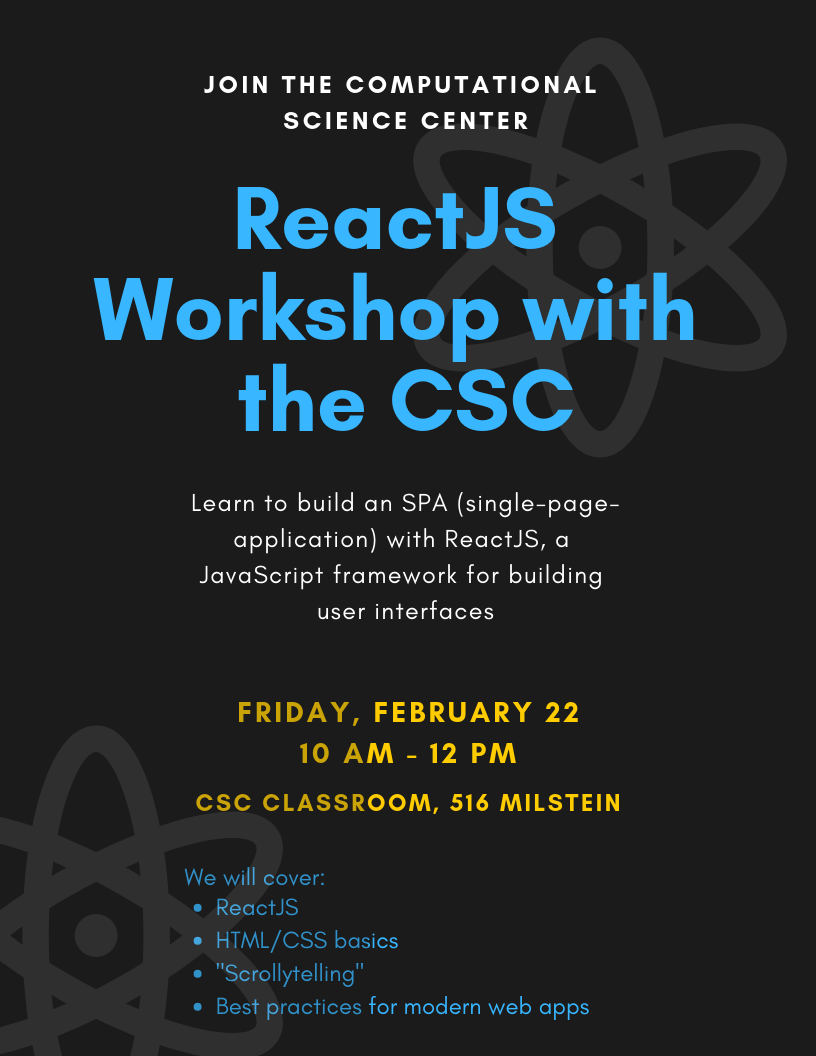
February 22, 2019 | 10am - 12pm
Computational Science Center Classroom, Milstein 516
The Vagelos Computational Science Center is offering an introductory workshop in ReactJS, a JavaScript framework for building user interfaces. We cover ReactJS, HTML/CSS basics, “scrollytelling”, and best practices when creating modern web apps. No prior experience necessary.
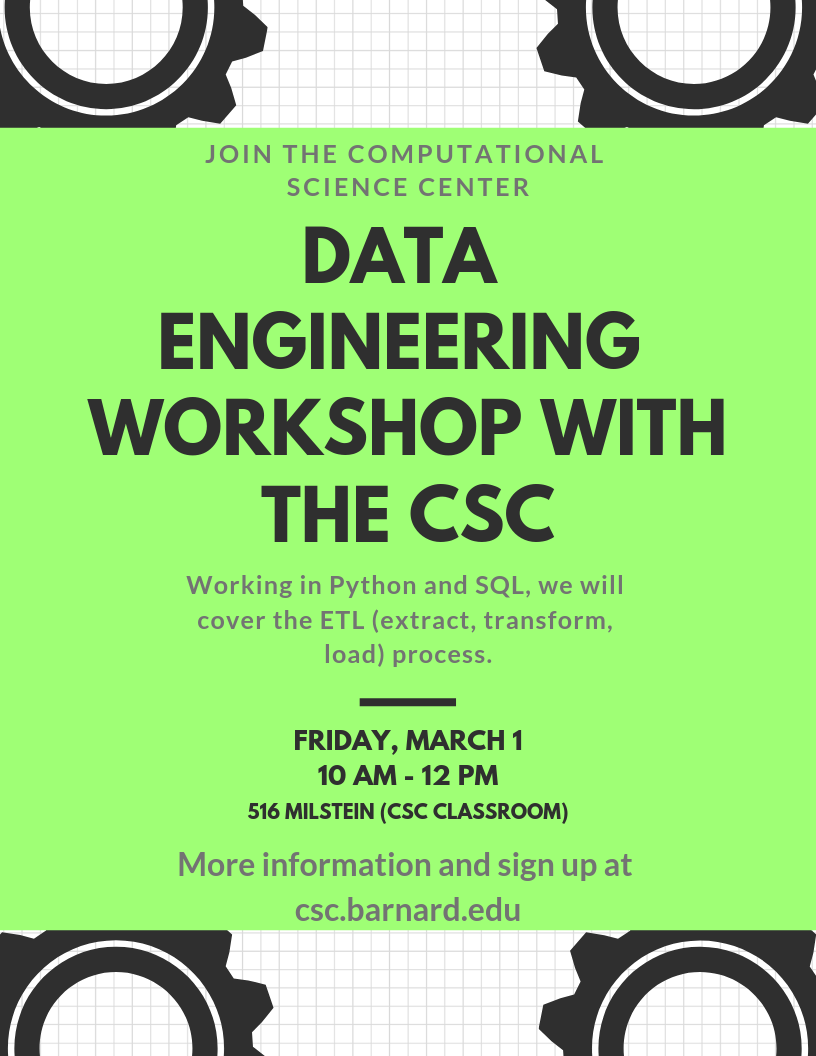
March 1, 2019 | 10am - 12pm
Computational Science Center Classroom, Milstein 516
The Vagelos Computational Science Center is offering an introductory workshop in Data Engineering. We are going through the ETL (extract, transform, load) process, pushing our data to a database, querying it with SQL, and ways to automate this process via scheduled “jobs”. We work in Python, SQL, and various command-line interfaces (CLI). No experience is necessary, but some programming experience would be helpful.
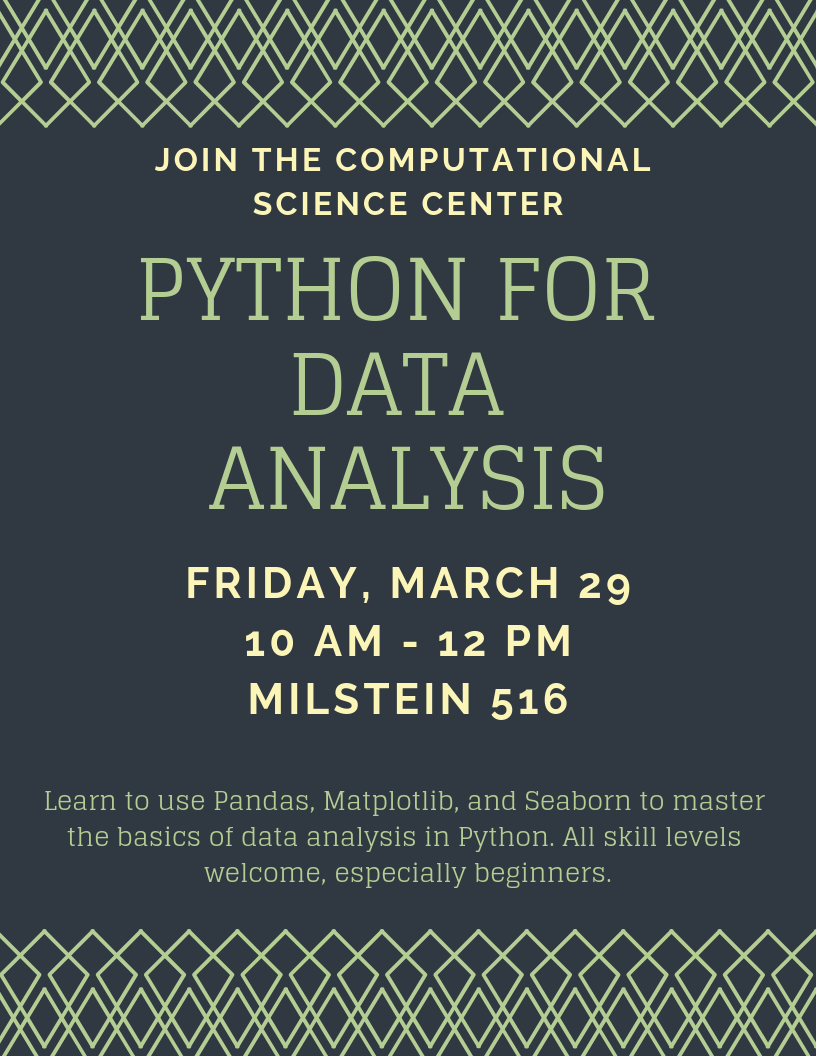
March 29, 2019 | 10:00am - 12:00pm
Milstein 516, the CSC Classroom
The Vagelos Computational Science Center is offering a workshop on data analysis in Python. Learn to use Pandas, Matplotlib, and Seaborn to master the basics of data analysis in Python. All skill levels welcome, especially beginners looking for a strong foundation in Python. No computer necessary, we are working on lab computers in Jupyter notebooks.
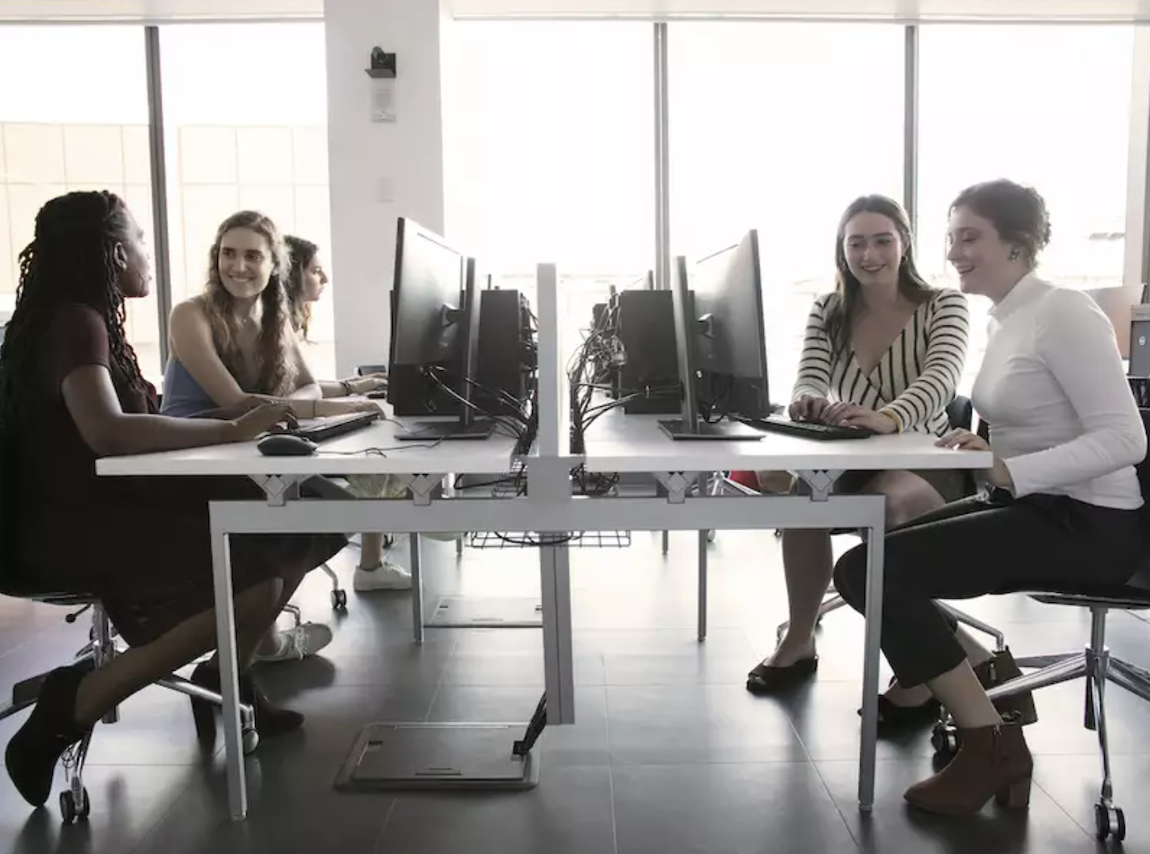
April 17, 2019 | 6:45pm - 8:30pm
Sulzberger Parlor
From software development to design research, there are career paths in tech for any major or passion. Join us for dinner & discussion as women working in tech demystify what they do, share their successes and challenges, and answer your questions!
Panelists include:
- Monica Powell, Full-Stack Engineer at MeetUp, BC '16
- Rachel Farber, UX Research Program Manager at Google, BC '11
- Kat Crisante, Interactive Designer at SyFy Universal, BC alum
- Erica Dohring, Software Engineer at WeWork
Event format
- 6:45 to 7:00pm: Doors open, food is served
- 7:00 to 8:00pm: Panel discussion starts, first moderated and then opened up to the audience for Q&A
- 8:00 to 8:30pm: Optional time for snacking and chatting
This event is open to the entire Barnard/Columbia community.
Presented by IMATS, with support from the Athena Digital Design Agency and the Vagelos Computational Science Center.

April 25, 2019 | 10:00am - 12:00pm
Milstein 516, the CSC Classroom
The Vagelos Computational Science Center is offering a workshop in building neural networks in Python. We start with a single perceptron and work our way up to a multi-layer neural network. We are working in Python and Pytorch. Some programming experience is encouraged, in addition to basic familiarity with Calc I. No computer necessary, we are working on lab computers in Jupyter notebooks.
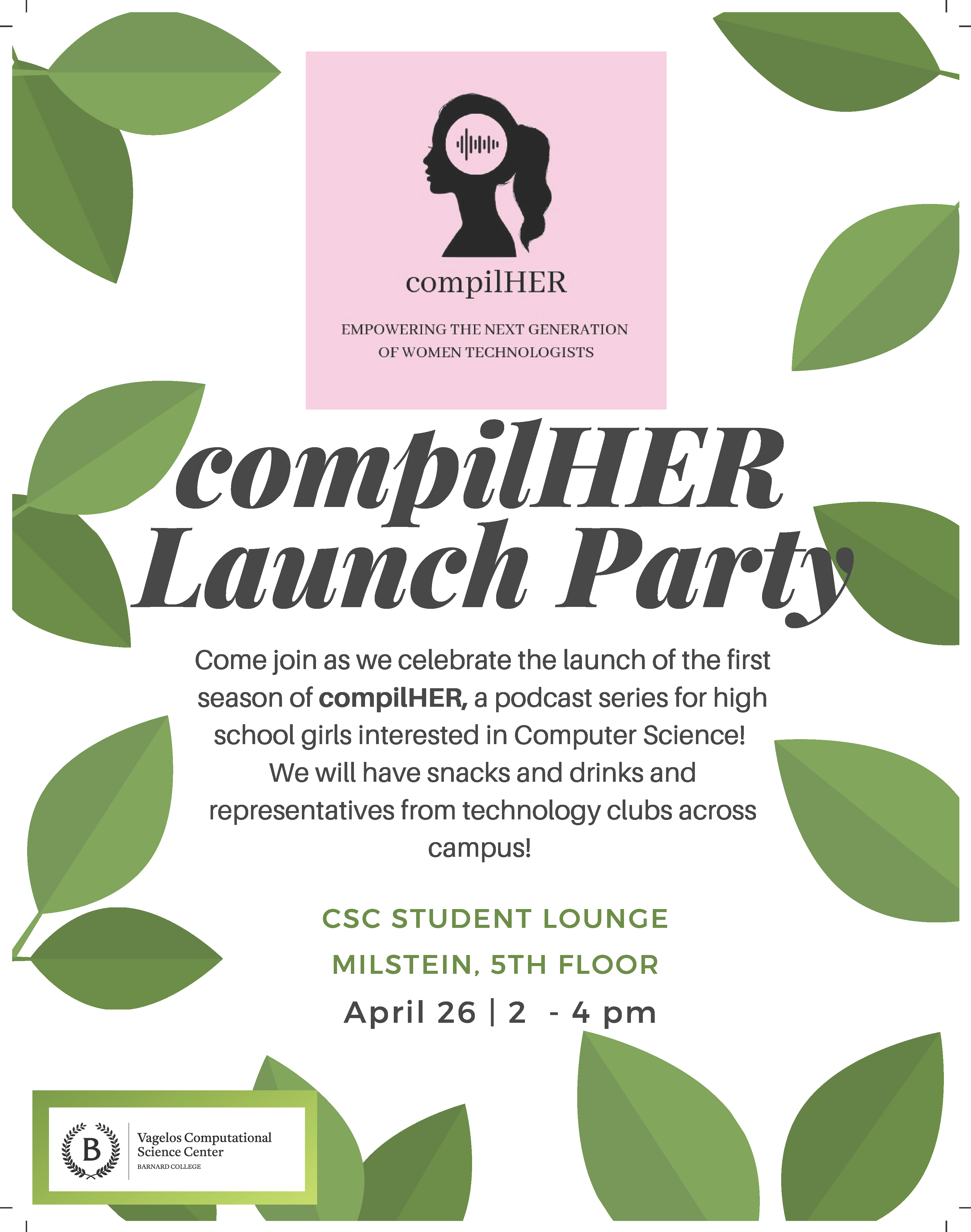
April 26, 2019 | 2:00pm - 4:00pm
CSC Lounge, Milstein 5th Floor
CompilHer is an educational technology podcast with the aim of encouraging high school girls to pursue studying computer science in college and beyond. On CompilHer, we interview women in CS & technology of various backgrounds about topics like how to get started with computer science, what it’s like to be a CS major, and how to land an internship or job in the tech industry! You can check out our podcast at https://anchor.fm/compilher or on Spotify as well!
In addition, we are hosting a Launch Party on Friday, April 26th from 2-4 PM in the CSC Student Lounge on Milstein 5! We would love to see everyone there to come network and mingle with our podcast guests and other Columbia CS & technology clubs and also indulge in plenty of snacks and drinks and a TOTE GIVEAWAY for everyone that stops by! Here's the FB event: https://www.facebook.com/events/551162988739680/

May 13, 2019 | 3:00pm - 4:30pm
Digital Humanities Center, Milstein 103
The Center for Engaged Pedagogy (CEP) in collaboration with BLAIS and Beyond Barnard invites the Barnard Community to come celebrate a successful first year of the Milstein Center for Teaching and Learning with an exhibit of student work in the Digital Humanities Center (DHC).
Post-Baccalaureate Fellows Anna Carlson, Sylvia Korman, Ruby Mastrodimos, and Zoe Ross present highlights from their respective centers, followed by an opportunity for participants to ask questions about the centers and the Post-Bacc program. The presentations run from 3:00-3:30 followed by an opportunity to view the exhibit and enjoy some food!